

2024 MYOPIA POLO MAGAZINE since 1888 / myopiapolo.org
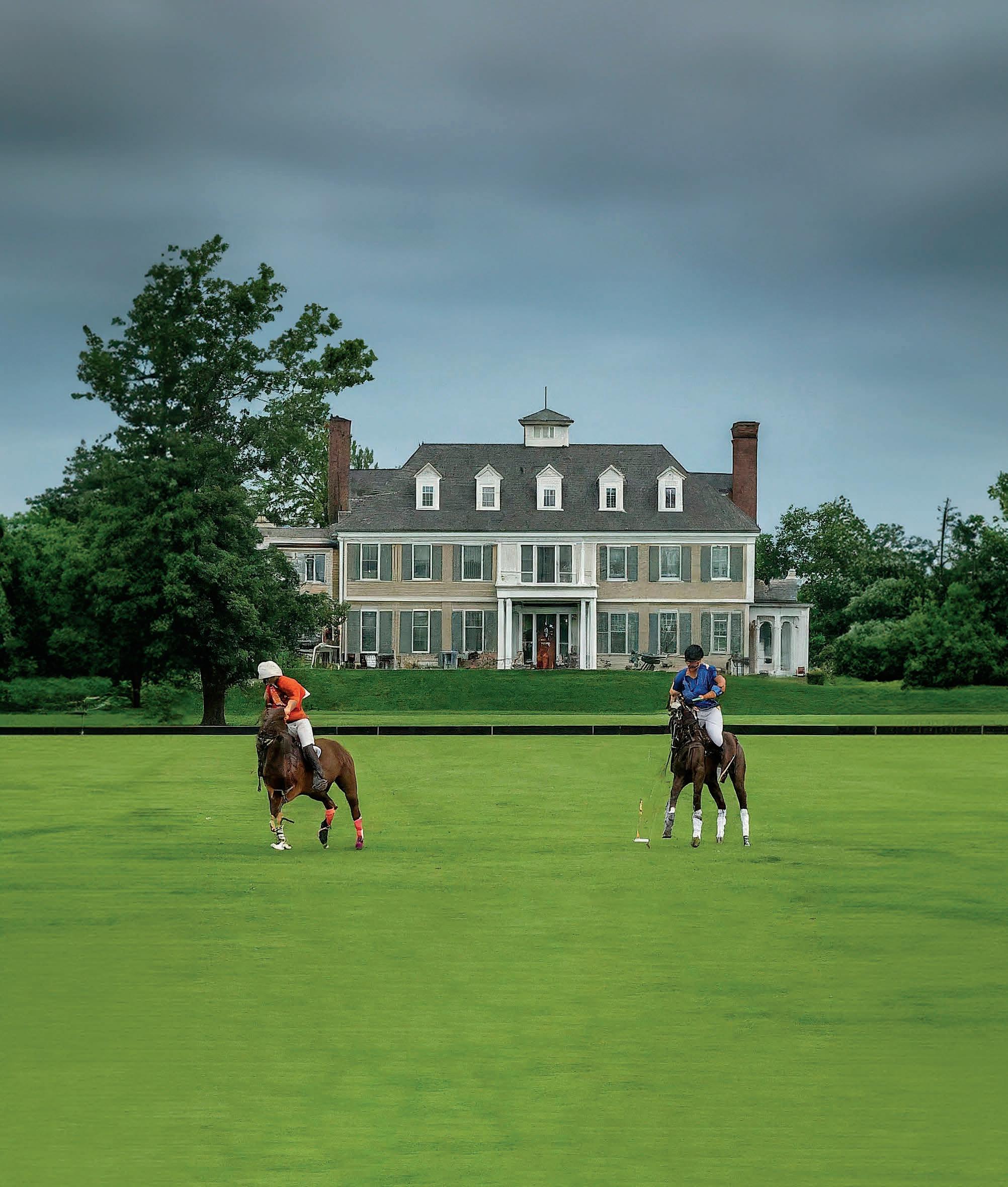
Beverly | Danvers | Gloucester | Hamilton | Manchester-by-the-Sea | Newburyport www.ChurchillProp.com | Info@ChurchillProp.com | 833-668-4649 CHURCHILL PROPERTIES Opening
You TM
you entrust Churchill Luxury Properties with your fine property, we leverage our local and international luxury marketing venues maximizing the return on your investment and equity. Wishing all the Teams & Players a Great 2024 Season!
New Doors for
When
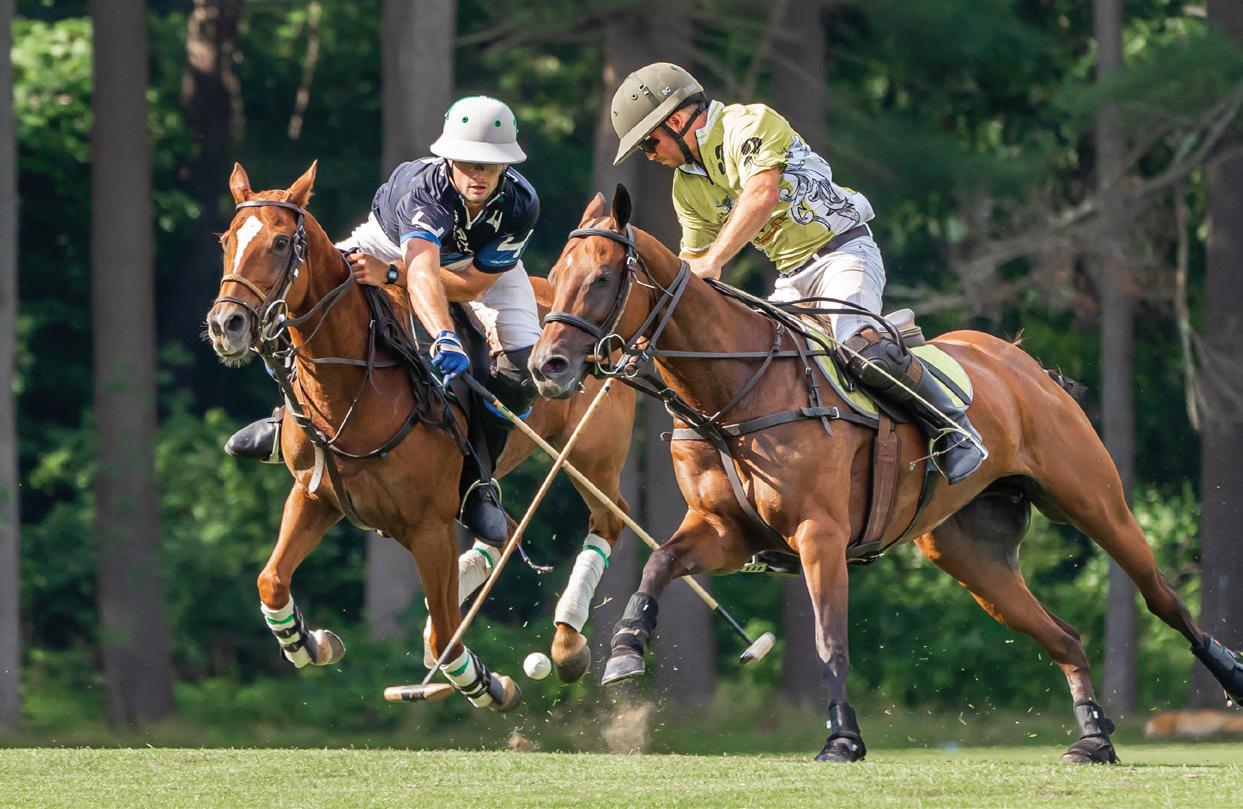
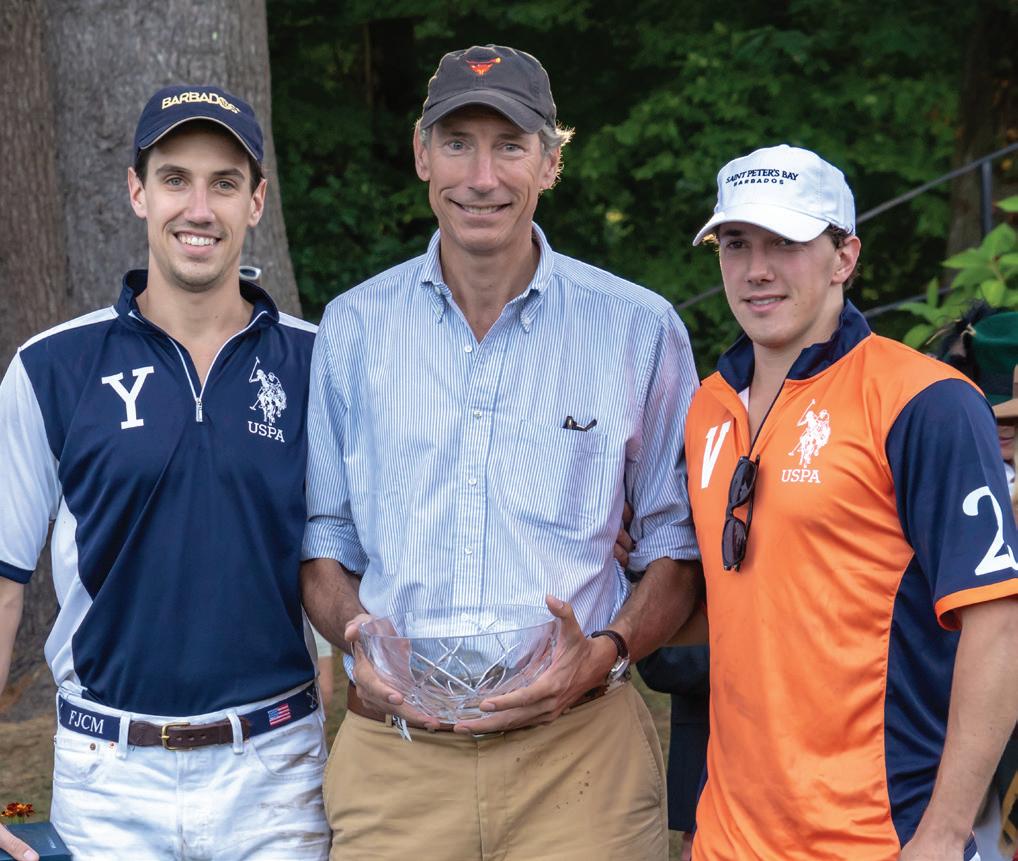
STYLE
25 / INSTAGRAM
Hashtag it: #myopiapolo
26 / FASHION
The right accessories make for a perfect Sunday afternoon look
28 / SCENE
Save the date for the 2024 Myopia Polo Ball
HISTORY
32 / THE HUNT Interview with Hunstwoman Samantha Stevens
34 / U.S. POLO ASSOCIATION
The history of the United States Polo Association
35 / TROPHY SPOTLIGHT
A glimpse at the prestigious Cyril R. Harrison Memorial Trophy
AGENDA
5 / 2024 SCHEDULE
6 / THE PLAYERS
A rundown of the Myopia Polo players
20 / LAW & ORDER
The rules of the game plus Polo 101
22 / MAKE THE MOST OF GAME DAY
An insider’s guide plus What to watch for
30 / EQUINE CARE
The importance of hands-on care
FEATURES
38 / INTRO TO POLO
Opportunities for those wanting to learn to play by brion o’connor
44 / A FAMILY AFFAIR
Generations of polo players define Myopia by brion o’connor
54 / TOURNAMENT SPOTLIGHT
A roundup of the exciting 2023 season by brion o’connor
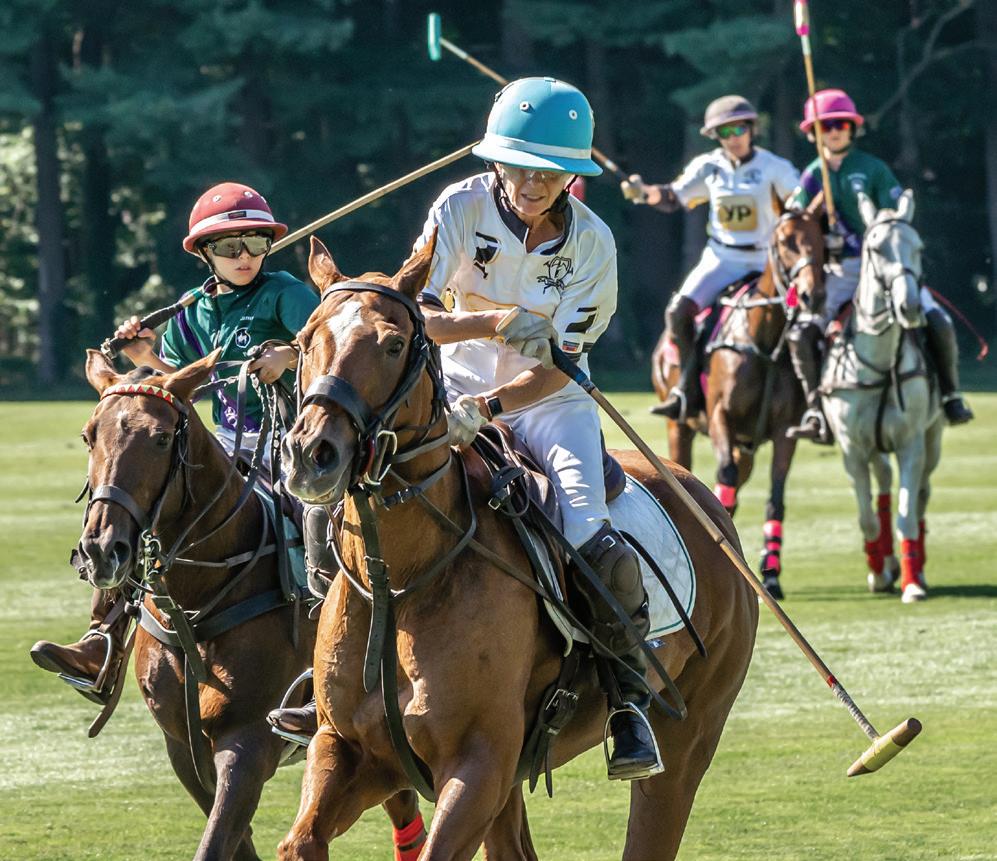
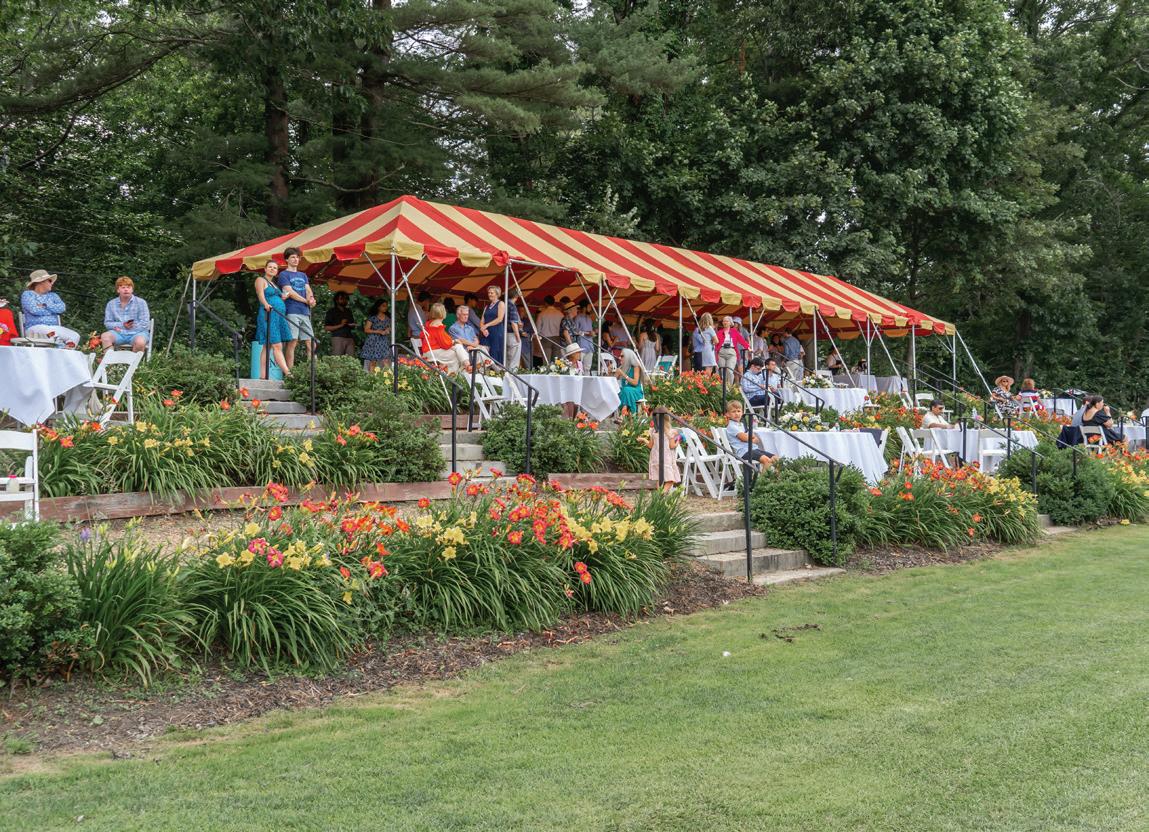
CONTENTS 2024 myopia polo magazine
LETTER 63 / PROFILE: CB SCHERER 2024 myopia polo 1
3 / CAPTAIN’S
38 44 22 54
ON THE COVER: Amanda (Poor) Roberts looks up field during last year’s Rodney O’Connor Divot Cup. Photograph by Jacqueline Miller

Please scan the QR code or visit: https://steinwaypianosboston.com/69co
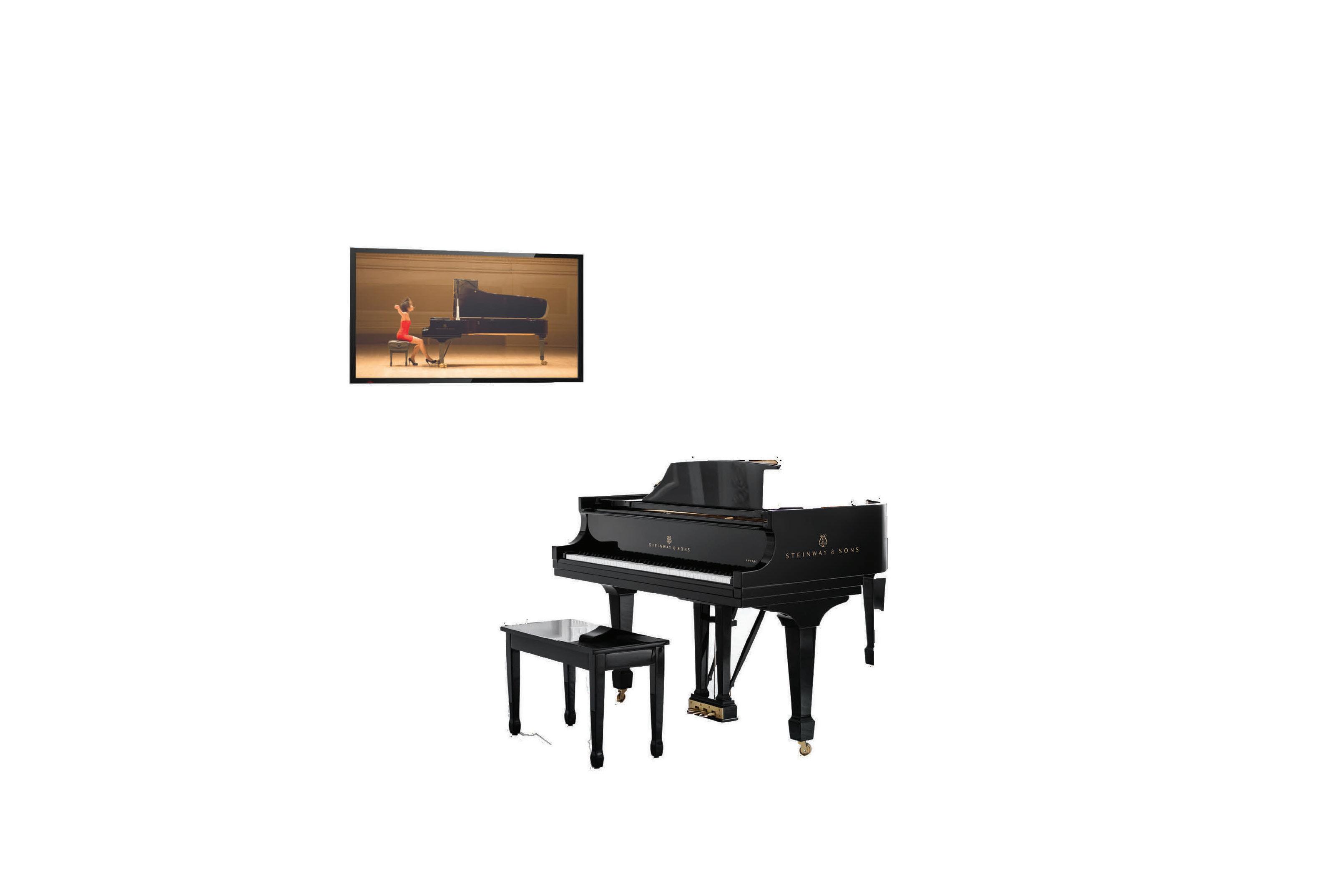
request a steinway grand piano floor template.
Wondering if a piano would fit in your home? Envision a steinway in your home t his complimentary floor template will help you decide on the piano size best for you.
Please scan the QR code or visit: https://steinwaypianosboston.com/zif

THE WORLD’S FINEST HIGH RESOLUTION PLAYER PIANO (617) 426-1900 • 1069 WASHINGTON STREET, NEWTON, MA • MSTEINERT.COM
Length 5' 1" 155 cm, Width 57 ½”/ 146 cm MODEL Length 5' 7" 170 cm, Width 57 ¾” 147 cm MODEL M Length 10 ¾”/ 180 cm, Width 57 ¾” 147 cm MODEL O Length 6' 2" 188 cm, Width 57 ¾”/ 147 cm MODEL Length 6' 11" 211 cm, Width 58" 148 cm
CAPTAIN’S LETTER
Dear Myopia Polo Members, Patrons, Friends and Supporters:
Welcome to the 137th season of Myopia polo. Playing polo or spectating at Myopia is truly a unique and memorable experience, given the rich history of our club. Combining a beautiful setting, watching the stars of the game (which are really the polo ponies), and enjoying a Sunday with friends and families are what polo at Myopia is all about. The highlights of this year’s polo season begin with our opening polo match on June 2, exciting club polo throughout June, our six major tournaments played in July and August, and the Women’s Challenge and Harvard Invitational matches in September.


Behind the scenes, what makes polo work at Myopia is the dedication of our staff, led by manager Erica Kratz. The fields haven’t looked as good or played as well as they did in 2023, thanks to the efforts of head of grounds, Jonathan Wilbur. The voice you hear every Sunday belongs to our volunteer announcer and Myopia player, Patricia Johnstone. Cathy Taylor and Marlene Pippins work tirelessly on Sundays managing the gate and the events held at the polo pavilion. Special thanks to another Myopia player, Terri Campbell, for providing financial expertise to help run the club. The amazing photos you see here and online are produced by Jackie Miller. Supporting me and organizing the Myopia Polo Ball is my wife, Tracy Strouss.
Contrary to popular belief, polo is accessible to a broad range of people. This year’s magazine features stories introducing polo to new players, and how polo is a family sport at Myopia. The club’s licensed instructors provide horses and lessons for beginners, and our Coaching League, led by professional player Estani Puch, offers entry-level playing. Our next level of polo — the Seagull League — pairs new players with professionals to learn strategies prior to advancing to captain’s and tournament matches.
I hope you’ll return on Sunday afternoons from June through mid-October to enjoy polo at Myopia. Visit our website, myopiapolo.org or call 978-468-POLO for information on the match schedule, lessons and polo membership, or follow us on Facebook and Twitter.
Best Regards,
Dave Strouss, captain, myopia polo



Your Vision, Our Expertise: Building Dreams Together since 1988



EDITOR & CONTRIBUTING WRITER
Brion O’Connor
CONTRIBUTING PHOTOGRAPHER
Jacqueline Miller
CREATIVE SERVICES DIRECTOR
Jodie Hall
GRAPHIC DESIGNERS
Nancy Tichanuk, Nicole Huot
MYOPIA POLO COMMITTEE
David Strouss, Captain of Polo, USPA Delegate & Tournament Committee Representative
Erica Kratz, Polo Manager
Stephen L. Willett, Treasurer
Peter Poor, Official Announcer & Tournament Committee Representative
Terri Campbell, Polo Committee & Equine Welfare Committee
Kurt Miller, Polo Committee Member
Jacqueline Miller, Polo Committee Member
Jacek Grotnick, Polo Committee Member
Lyle Graham, Polo Committee Member
Tracy Strouss, Polo Committee Member (Chair, Polo Ball)
Michael D. Ryus, Marketing and Design Director
WEBSITE: myopiapolo.org
FACEBOOK & TWITTER: Myopia Polo
VICE PRESIDENT/PUBLISHER
Ernesto Burden
MANAGING EDITOR, CUSTOM PUBLICATIONS
Sarah Pearson
ADVERTISING SALES MANAGER
Jessica Schooley
603-345-2752, jessicas@yankeepub.com
PROOFREADER
Amanda Andrews
SUBSCRIPTIONS
For additional copies or subscription customer service, email renc@yankeepub.com
PUBLISHED BY
Yankee Custom Publishing
A Division of Yankee Publishing-NH Group, Manchester, NH
250 Commercial Street, Manchester, NH 03101
603-624-1442, yankeecustommarketing.com
Whether you are looking for traditional or organic, standard or custom Gardner Mattress has you covered. SALEM, MA | WOBURN, MA | NEEDHAM, MA BOCA RATON, FL | GARDNERMATTRESS.COM
POLO magazine is published for Myopia Polo by Yankee Publishing, Inc. Every effort has been made to ensure the accuracy of the information contained in the magazine; Yankee Publishing is not responsible for errors or omissions. © Copyright 2024, Yankee Publishing, Inc. All rights reserved. Reproduction in whole or in part without written permission of Yankee Publishing, Inc.s is prohibited. NEW HAMPSHIRE GROUP 100% Employee-Owned
2024 MYOPIA POLO MAGAZINE

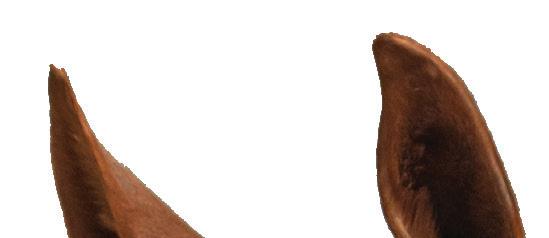
Welcome to the 2024 Myopia Polo Season
Match time is 3 p.m. on Sundays. Gates open at 1:30 p.m.
Friday evening games start at 5 p.m.
JUNE 2 OPENING DAY — Hamilton-Wenham Cup
JUNE 9 Joseph Poor & Stan Bradford Cup
JUNE 16 Neil Ayer Cup
JUNE 23 C.G. Rice Cup
JUNE 29 USPA National Youth Tournament Series
JUNE 30 Agassiz Club Cup 0-2 Goal Intraclub
JUNE 27–
JULY 25 Tuckerman Cup 0-4 Goal
JULY 7 USPA Harrison Cup 6-8 Goal
JULY 14 USPA Harrison Cup Finals
JULY 21 USPA National Chairman’s Cup 8-12 Goal Donald V. Little Cup
JULY 28 USPA National Chairman’s Cup Finals
JULY 30–AUG. 10 USPA Crossman Cup 0-4 Goal
AUG. 4 USPA W. Cameron Forbes Cup 6-8 Goal
AUG. 11 USPA W. Cameron Forbes Cup Finals
AUG. 18 USPA Governor’s Cup 6-8 Goal
AUG. 25 USPA Governor’s Cup Finals
SEPT. 1 Rodney O’Connor Divot Cup
SEPT. 6–8 USPA Northeastern Circuit Women’s Challenge 2-6 Goal
SEPT. 15 Cohiba Cup
SEPT. 22 Harvard Invitational Cup
SEPT. 29 Captain’s Game
OCT. 6 Captain’s Cup
OCT. 13 Last Chukker Cup
photograph by jacqueline miller
CHANGE
SCHEDULE SUBJECT TO
AGENDA the players
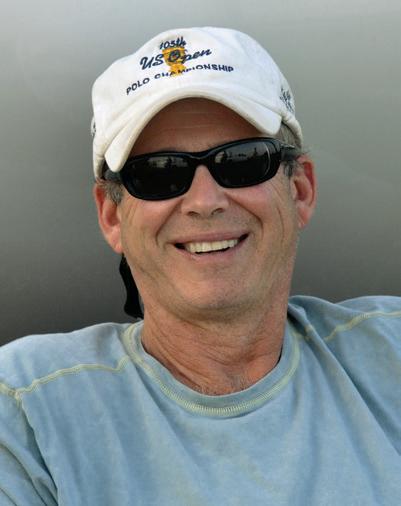
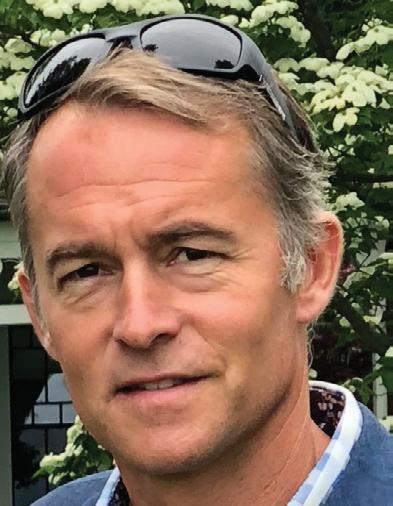
DAVID STROUSS
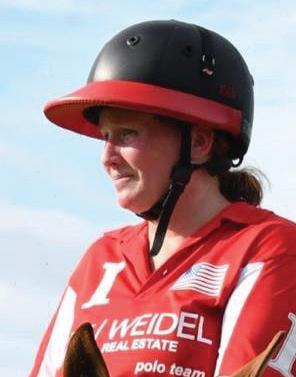
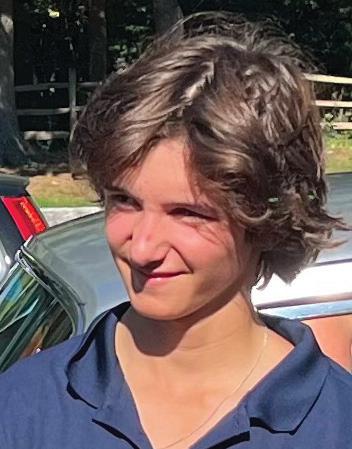
STEPHEN BURR
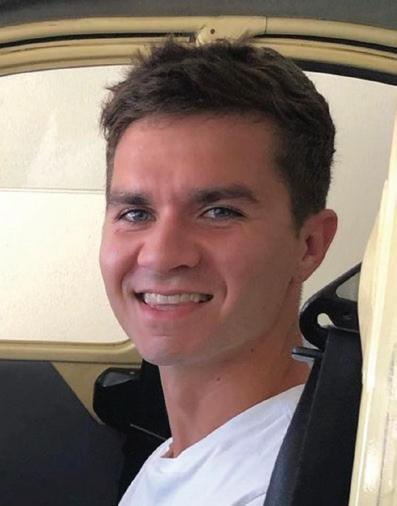
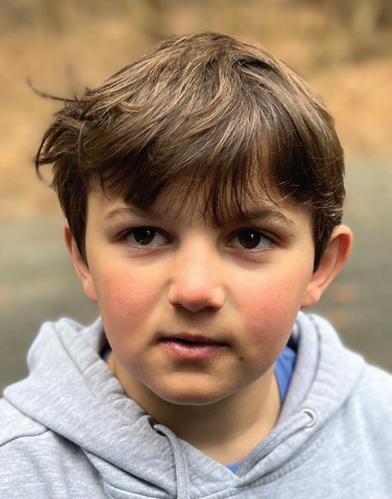
CAPTAIN Dave has played polo most of his life and has been a member of Myopia Polo for the past 28 years. He is now captain of Myopia Polo and serves as the Club’s delegate to the United States Polo Association. He is the sponsor of the Del Rancho Polo team, which has successfully competed in tournament play at Myopia, including winning the 2020 national Chairman’s Cup with co-sponsor Black Oak. Dave lives on his farm in Ipswich with his wife, Tracy, and is a partner at a law firm in Boston. RATED A
ERICA L. AMES
Erica got into polo back in 2013, and never looked back. She now splits her time between Massachusetts and Aiken, South Carolina, where she plays the spring and fall tournament seasons. She has been part of many successful women’s teams, taking home wins in both the 8-goal and 10-goal tournaments during the fall 2023 season. She is a huge supporter of all aspects of the sport and is passionate about sharing the unique Myopia experience with new and returning patrons alike. RATED B (OPEN) / A (WOMEN’S)
Stephen has played polo for about eight years, predominantly at Myopia Polo Club, but also has had the privilege of playing polo in Aiken, South Carolina, and Bighorn, Wyoming. Polo has become a family affair for Stephen and his sister, Juliet, who grooms for him. He is a recent graduate of Northeastern University and founder of a garden design and installation firm, Stephen’s Gardens. 1.5 GOALS
AMELIA CAFLISCH
Amelia started playing polo in January 2020 after driving by a polo club and went in for a look. She started lessons that same week and has been playing regularly since. Her family is from Argentina, so the pull towards polo has always been in her blood. She currently lives in Chestnut Hill with her son, Arthur, and two dogs, and is the owner of a buckskin pony named Bartolo. -1 GOAL / 0 (WOMEN’S)
TERRI CAMPBELL
Terri is a regular at Myopia after playing in Newport for 10 years. The sponsor of the Folly Fields Polo Team, she has played in tournaments in Chile, Ireland and South Africa, and competes
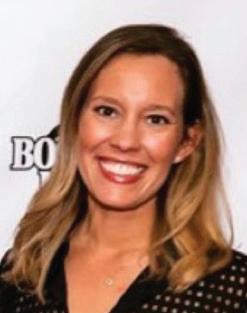

in Florida in the winter. When she’s not with the ponies, she is an investment manager in Boston.
-1 GOAL / 1 (WOMEN’S)
ANDREW CARLETON
Andrew is new to the Myopia Polo scene. He has been learning the game from the coaching league and being drawn in by playing with his family. Andrew lives in Hamilton with his wife, Jennifer, and three children, Drew, Taylor and Gwendolyn. NR
DREW CARLETON
Drew has been playing polo for just over a year after watching a Crimson Interscholastic practice. Although he was not initially on the team, he practiced with them. He then played in the spring as well as in the Myopia Coaching League. He played the NYTS tournament last year and got a taste of playing on Gibney Field at the end of the outdoor season. Drew has just completed his first interscholastic season and is looking forward to getting back out on the grass this summer. Drew is a freshman at St. John’s Prep. He enjoys lacrosse, tennis and skiing.
-1 GOAL
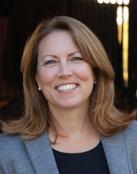
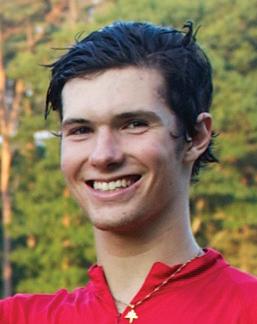
TAYLOR CARLETON
Taylor began playing polo last summer in the coaching league. He has also just completed his first season with the Crimson Interscholastic program. As a fourth-grader, he was not able to compete in any matches but will be one to keep an eye on in a couple years when eligible. Taylor attends Cutler School in Hamilton, plays lacrosse and enjoys skiing and mountain biking.
JAMES COATES
James Coates joins Myopia this year from the U.K. where he completed university and played in the varsity match for Oxford. After taking a break from the saddle for a year to travel and focus on work, he’s keen to hop back on as an associate member. He’s a -1 on grass and lives in the Fenway area.
BARRETT COKE
A Myopia player since the age of 12, Barrett is passionate about the sport. Barrett was a three-time all-star National Youth Polo player, and in 2015 he went on to win the National Youth Polo Championships in Denver, Colo., playing on the Northeast regional team. Barrett plays for the Coke family’s Chanticleer Farm team. He loves competing alongside
6 myopia polo 2024
TERRI CAMPBELL
AMELIA CAFLISCH
DAVE STROUSS
ERICA L. AMES
STEPHEN BURR
ANDREW CARLETON
DREW CARLETON
JAMES COATES
TAYLOR CARLETON
BARRETT COKE
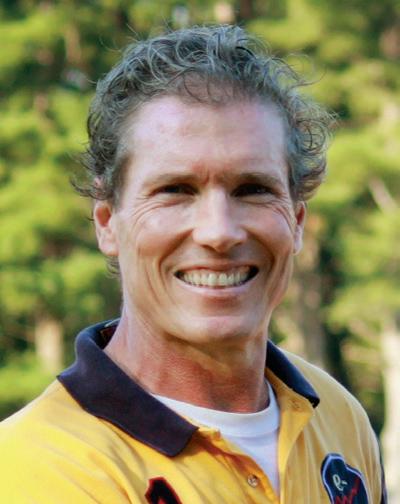
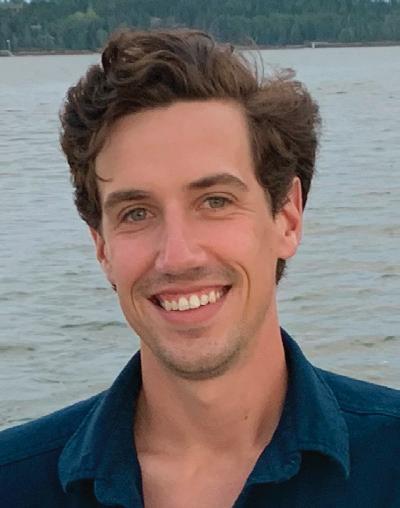

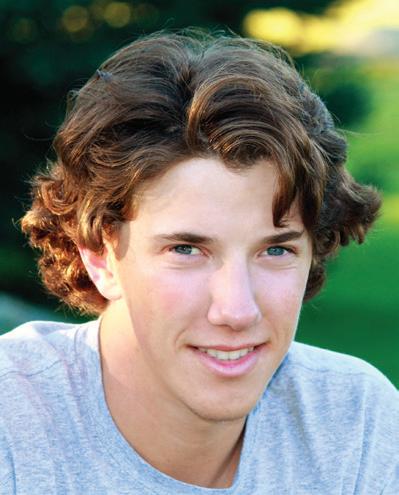
his father and brother. An avid sports enthusiast, Barrett plays soccer, squash, lacrosse and loves freestyle skiing. Barrett graduated from Brooks School in North Andover, Mass. 1 GOAL
BILL COKE
An intense and competitive athlete, Bill has played polo at Myopia for more than 20 years. The sponsor of the Chanticleer Farm Polo Team, Bill is known for his powerful and spirited defensive play. He is thrilled to play with his sons, Hamilton and Barrett. A managing director with J.P. Morgan, Bill lives in Topsfield with his wife, Wendy, and his sons. RATED A
HAMILTON COKE
An engaged and skilled player on his family’s Chanticleer Farm Polo Team, Hamilton graduated from Santa Clara University Engineering School in Silicon Valley, Cali., where he studied computer engineering. Hamilton is happiest when freestyle skiing, mountain biking, surfing, playing rugby, lacrosse, and programming the next big app. RATED A
ANNIE COLLOREDOMANSFELD
Annie is a graduate of the Groton School where she was a varsity
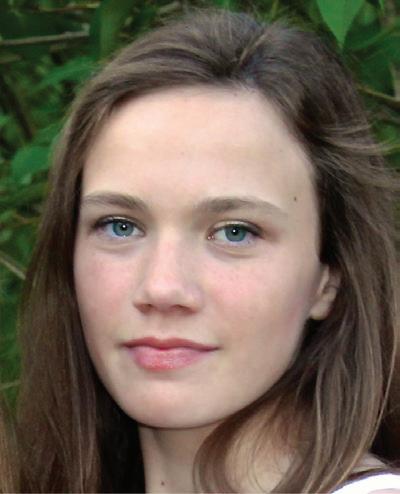
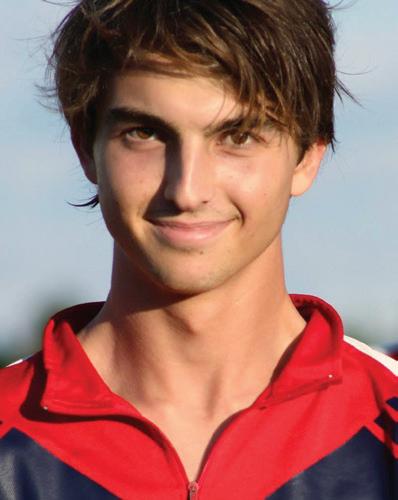
cross-country runner and rower. She is an accomplished young rider and has competed in three phase events in Massachusetts and Vermont. The past few summers she has been playing with her family, and has joined the junior program at Myopia. 0 GOAL / 1 (WOMEN’S)
FRANZ COLLOREDO-MANSFELD
Franz grew up riding and hunting with Myopia. He has won the Myopia Hunter Trials numerous times. Over the past decade, he has enjoyed playing polo with his children. He is the sponsor of the Black Oak Polo team. Franz runs an international real estate investment firm based in Boston. RATED A
JOHANN COLLOREDOMANSFELD
Johann is a graduate of Harvard University, where he was captain of the Harvard Polo Team. Over the past six years, Johann has played in tournaments in China, Italy and France. In 2013, he was selected for the U19 National Championship Tournament Team for the Northeast. Johann plays for the Black Oak and Myopia Teams. 1 GOAL

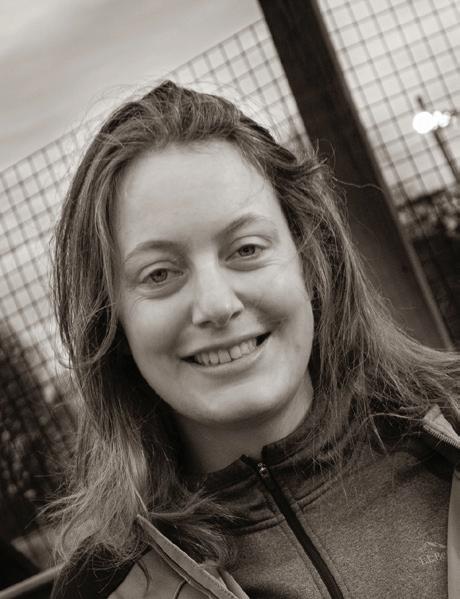
SEPPI COLLOREDOMANSFELD
Seppi grew up riding and playing polo at Myopia, playing for his family’s Black Oak Polo Team. Seppi graduated from Yale University where he was a three-year captain of the men’s polo team. Seppi remains actively involved in the Yale Polo program and currently serves on the board. Seppi lives in Boston with his wife and son, and works for an international real estate investment firm. RATED A
SIMON COLLOREDOMANSFELD
Simon is a graduate of the University of Virginia where he played on the polo team in one of the country’s top-rated college programs. In 2013, Simon was selected for the U19 National Tournament Team for the Northeast. A naturally talented horseman, Simon is a graduate of the junior polo program at Myopia and plays for Black Oak and Myopia. 1 GOAL
BENJI E. DANIELS
A summer resident of Ipswich, Benji played youth polo in Wellington on the Pony Express Polo team under the watchful eye of Tomas Goti and Julian deLusaretta.
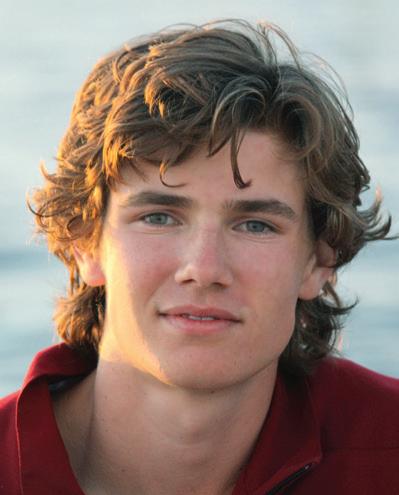
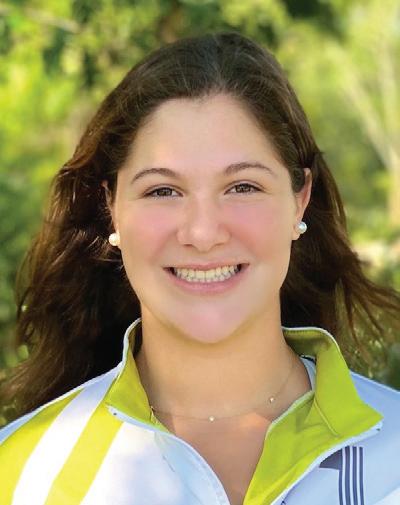
Benji is calm, cool and collected on the field, where he has continuously improved his ability to take the man and hit a solid backhander. His ball control and smooth swing seem to improve with each tournament he plays. 1.5 GOALS
JUSTIN E. DANIELS
A summer resident of Ipswich, Justin has been playing polo for more than a dozen years, and is an excellent rider with a hard-hitting sense of urgency on the field. Justin was selected to play on the first-ever USPA National Youth Tournament for the winning Florida team in 2013. 2 GOALS
LANDEN E. DANIELS
Landen is the youngest of six poloplaying brothers. He has made a name for himself among the polo community in Wellington, Fla. Landen plays travel soccer when he is not on a horse. Playing polo for 11 years (two years without a mallet), Landen has developed a keen understanding of where to be on the polo field. Landen’s potential as a polo player is demonstrated every time he plays competitively in kids’ polo or in a 6-goal competition matched against an opposing young player. RATED A
JUSTIN E. DANIELS
SEPPI COLLOREDOMANSFELD
JOHANN COLLOREDOMANSFELD
ANNIE COLLOREDOMANSFELD
FRANZ COLLOREDOMANSFELD
BILL COKE
HAMILTON COKE
SIMON COLLOREDOMANSFELD
2024 myopia polo 7
MARION DIERICKX
AGENDA the players
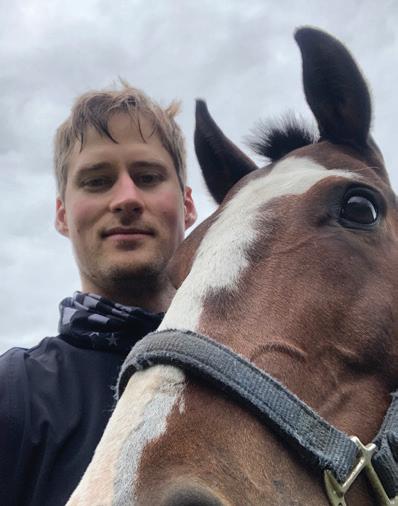
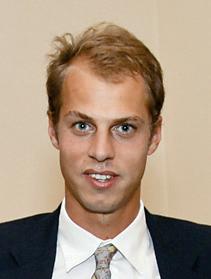
MARION DIERICKX
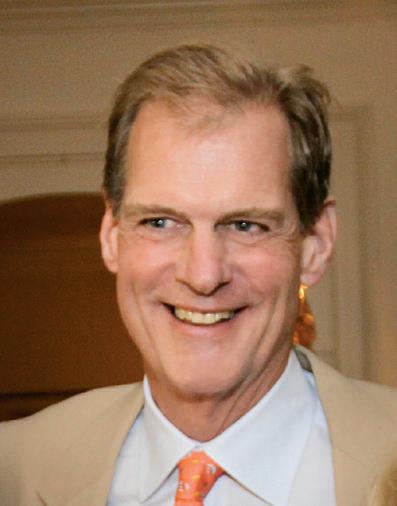

An alumna of the Harvard Polo program, Marion started playing at Myopia after graduating in 2012. She currently serves as co-chair of the Friends of Harvard Polo organization and is a regular volunteer for its partnership with Home Base, a Boston-based nonprofit for veterans and active service members. 0 GOAL / 2 ( WOMEN’S)
ARIANDNE “ARI” DOGANI
Ari started with I/I Arena Polo in 2016, qualifying for Nationals twice and earned the 2020 USPA National Sportsmanship Award. The speed of outdoor fields won her over, and she now plays year-round with her team, AVID Polo, in up to 12-goal tournaments. Ari attends college at the University of New Hampshire. Besides polo, Ari loves showjumping, barn culture, animals and people. In her downtime, she plays piano and violin. 0 GOAL / 3 (WOMEN’S)
DAVID DUNSTAN
David first started playing competitive polo in college for the Cornell Big Red in 2007. David worked his way up to the varsity squad from 2010-11. He has since enjoyed playing both indoor and arena polo in the Northeast. It was a love of working with the horses that initially drew David to the sport, and he currently keeps his two horses
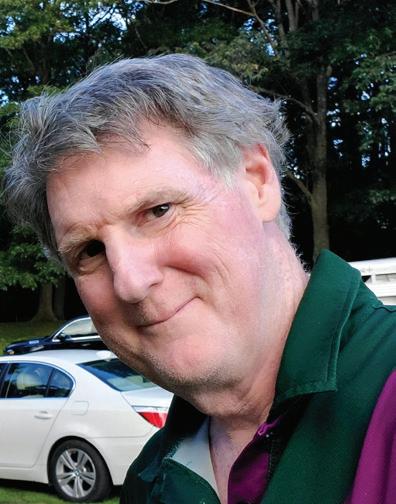
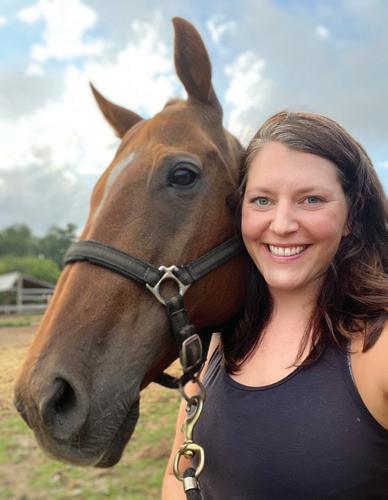
in Rowley. When not on horseback, David can often be found fishing from his kayak. RATED A
ALBERT ELLIS
An experienced horseman, Albert grew up hunting and three-dayevent riding at Myopia before becoming a polo player. Albert served as polo captain from 2007-2011 and has been a longtime fixture on the Myopia fields. He lives in Gloucester with his wife, Anne-Seymour, and their three daughters, Isabella, Caroline and Jane. 1 GOAL
JOHN ELLIS
John first played polo at Myopia at age 12, but foxhunting and eventing became his primary equestrian interest. Having played a handful of seasons over the years, highlighted by participating a few low-goal tournaments, John now returns to play with his son Maverick. -1 GOAL
MAVERICK ELLIS
Mav began riding almost before he could walk. He has been hunting with Myopia since 2019. He has played interscholastic arena polo for three years as well as grass polo with Myopia. When he has time, he actively participates in the Myopia Driving Club. Maverick began playing polo in fall of 2021 with the Harvard Crimson Interscholastic Program.

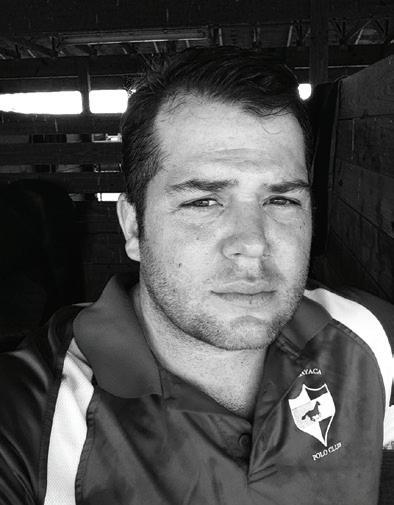
He has played two full seasons with the Myopia Coaching League and last year he played in his first tournament and Captains games. Maverick attends Berwick Academy in South Berwick, Maine. -1 GOAL
WHITNEY ELLIS
Whitney returned to the fields of Myopia last summer with a return to his roots on the North Shore after stints in Ireland, getting his master’s degree in English, and in New York, pursuing journalistic and literary endeavours. 2 GOALS
SCOTT FABYAN
Scott is an avid outdoorsman, skier and licensed captain with the U.S. Coast Guard. He is in his sixth season of polo, playing in both the Winter Arena and Myopia Coaching Leagues. He owns Kinsman Farm in Ipswich, and is a portfolio manager in Boston.
AMY GATLIN
Amy has been playing polo off and on for seven years starting as a beginner with Boston Polo Club. She became a licensed riding instructor in 2017 and has been instructing polo beginners ever since. She is a therapist and adjunct professor at Endicott College in Beverly, Massachusetts. Currently, she lives in Gloucester with her husband and two young children. -1 GOAL / 1 (WOMEN’S)
2024 MYOPIA POLO TEAMS
AVID PONY: The team of Ari Dogani, a rising star in Boston and Florida polo, teaming with Longmeadow and professional players Federico Wulff and Ernesto Trotz.
BLACK OAK: The ColloredoMansfeld family team, Black Oak is anchored by Filipe Viana and a rotating roster of family members. They won the 2022 Chairman’s Cup.
DEL RANCHO: David Strouss’s team has competed at every level of Myopia Polo, including winning the 12-goal championship and 2022 Harrison Cup.
FOLLY FIELDS: Terri Campbell’s team has become a force to be reckoned with, having won the Governor’s Cup 6-goal as well as the Tuckerman Cup 4 goal in conjunction with Stone’s Throw.
HUSARIA: The Grotnik family team features Yaz, Gracie and Augie Grotnik playing with 4-goal pro Manu Mazzocchi. The crew enjoyed success in their first full season of 8-goal, winning the 2022 Forbes Cup 6 goal.
LONGMEADOW: Kurt Miller’s team, Longmeadow, now with son Reed (1 goal) playing alongside pro Federico Wulff, has had a long run at Myopia dating back to the 1980s.
PONY EXPRESS: The Daniels family’s team, Pony Express, teaming up with Walter Eayer in 2021, competes at the highest levels of polo in Florida and at Myopia.
PONY UP: Richard Salter’s team has been a highly successful team at Myopia and in Aiken, S.C. They won the Crossman 4-goal together with Stage Hill.
SEAGULLS: The Snow family’s team, managed by Crocker Snow Jr., has a long and storied history at Myopia. Reconstituted for 2024, the Seagulls will feature Myopia Polo’s Stephen Burr.
STAGE HILL: The Poor family team, led by Peter Poor and now including Alyson and Amanda, is going on 55 years with Myopia. They won the Crossman 4-goal together with Pony Up.
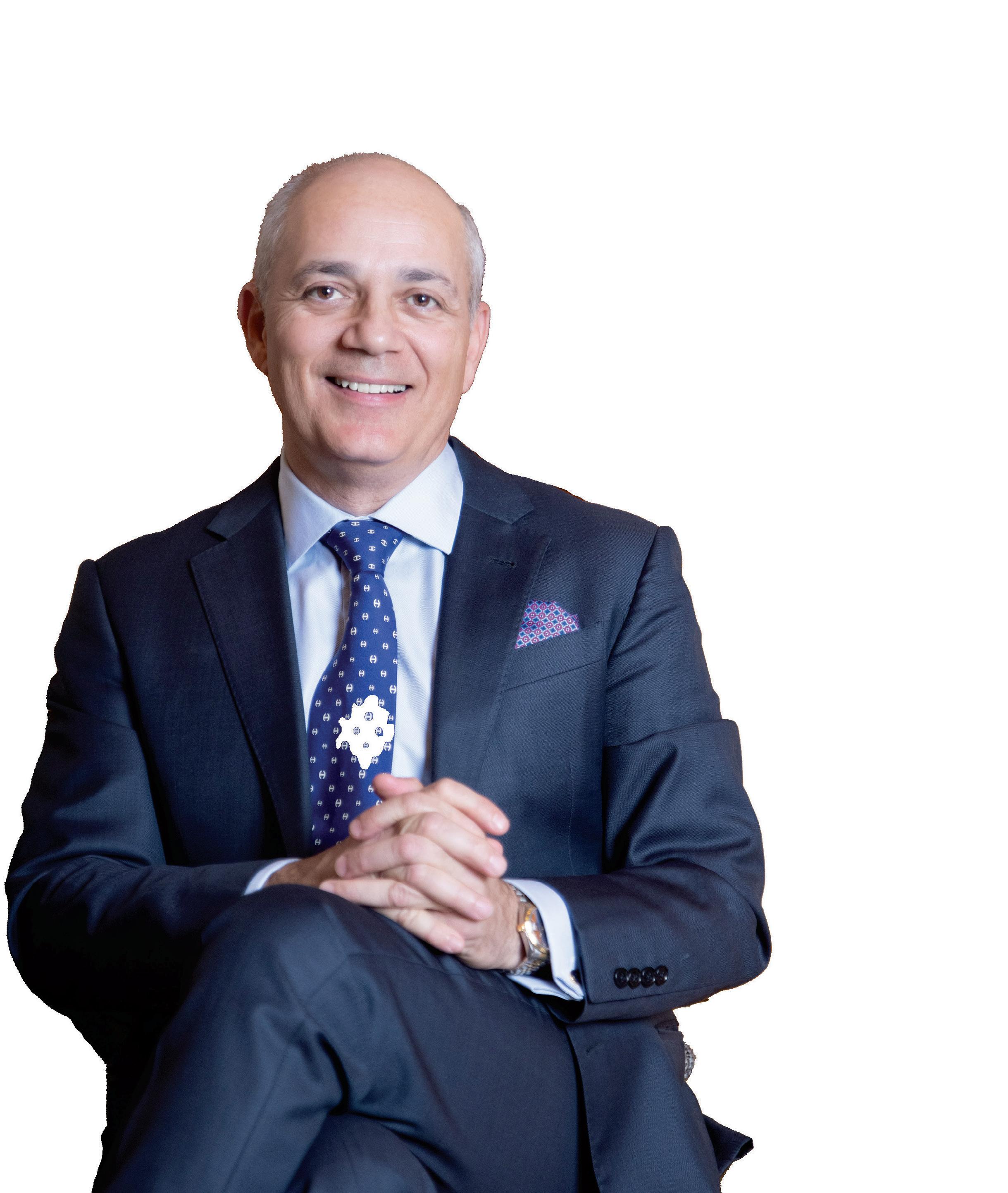
8 myopia polo 2024
AMY GATLIN
DAVID DUNSTAN
JOHN ELLIS
MAVERICK ELLIS
ALBERT ELLIS
SCOTT FABYAN
JONATHAN GRAHAM
WHITNEY ELLIS
The science & art of eyelid surgery.
Trust your eyelids to an oculoplastic surgeon. With more than 15 years of experience and thousands of procedures on his record, Dr Glavas is a board-certified ophthalmologist with international clientele in Boston. Turn back time with the nonscar laser eyelid lift, the latest non-invasive treatments, and skin products to reduce fine lines and reduce lower lid bags.”


Board-certified Ophthalmologist & Oculoplastic Surgeon
Ioannis P. Glavas, MD
Boston: 115 Newbury Street, 5th
Boston, MA | T: 617.262.0070 Beverly: 100 Cummings Center, #106-D, Beverly, MA | T: 617.262.0070
Floor,
AGENDA the players
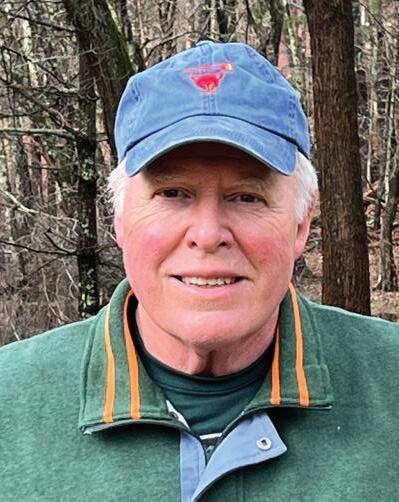
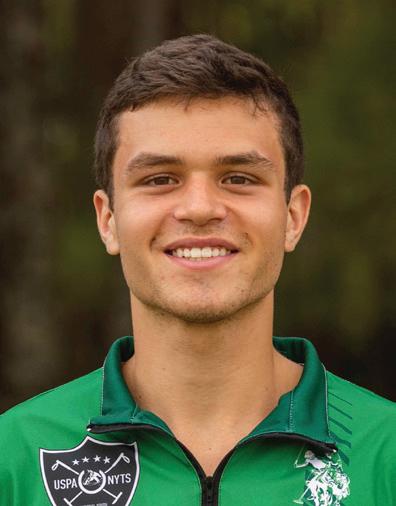
JONATHAN GRAHAM
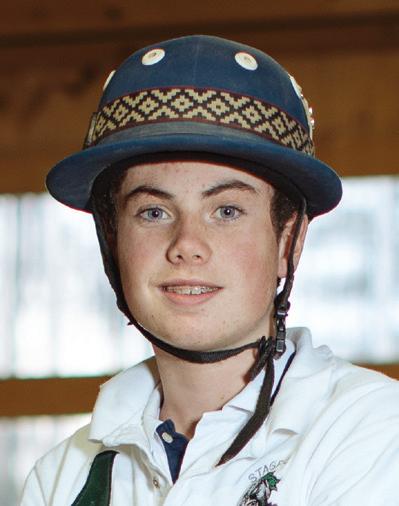

Having started polo in Myopia’s junior program, Jon has played on his father Lyle’s Winter Creek team, captained the Colorado State University team, and played professionally in Aspen and on the East Coast. One of the biggest hitters at Myopia, Jon is always a threat to score from the middle of the game. 2 GOALS
LYLE GRAHAM
Captain of Myopia Polo from 2000 to 2008, Lyle held a 5-goal USPA rating. Forming both the Starpatch and Wintercreek Farm teams to compete at Myopia, polo was a foundational activity for the entire family. Personal highlights were the amazing polo pony experience, player associations and tournament participation at Myopia and host clubs. Now retired from playing polo, life activities are focused on family, grandchildren, hobbies, life on the farm and supporting the Myopia Polo tradition.
JAMES GRAYKEN
James has been playing polo for eight years. He started his polo career at a club just outside London. He now is an active participant of Myopia Polo, playing in the junior program and with the Stage Hill/ Myopia Interscholastic Polo Team. James is a competitive player who
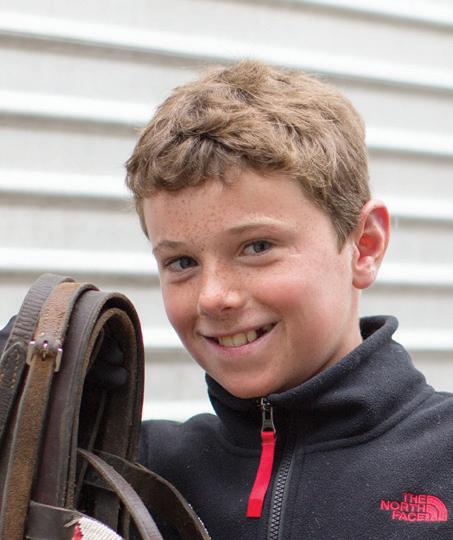
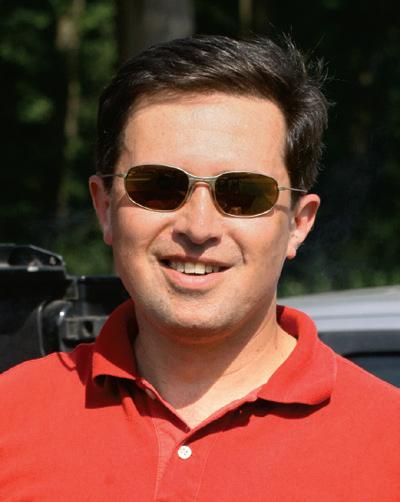
is eager to learn, and plans to play polo through college and for the rest of his life.
WILLIAM GRAYKEN
William’s polo career began eight years ago. Prior to polo, he had been riding for almost three years. His family often went to see polo, and as he watched, he fell in love with the game. He and his brother James were offered the opportunity to ride a polo pony and discovered how different they were from the horses they were used to riding. Since then, he and his brother have taken regular polo lessons in addition to horse-riding lessons.
THOMAS GRIESER
A junior member of Myopia Polo Club, Thomas plays in the Myopia Coaching League and for Crimson Polo when based at home in Newton, Mass. Thomas is a boarding student at Eton College in the U.K., where he competes for Eton Polo during the academic year. -1 GOAL
AUGUSTUS “AUGIE” GROTNIK
Augie started playing polo at the end of 2017, and has five seasons under his belt with the Stage Hill and Myopia Interscholastic Polo Team. He has played polo on grass and in the arena in Arizona, Florida and
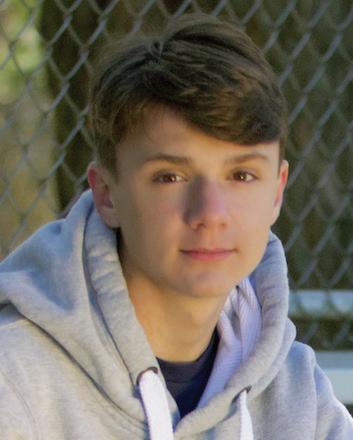
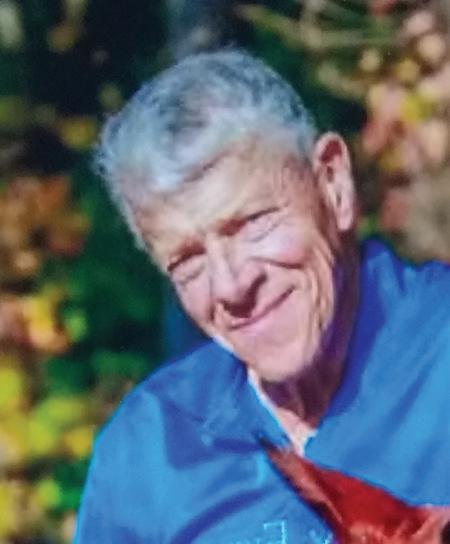
New England. Augie attends Ipswich High School and enjoys skiing and soccer. 0 GOAL
GRACE ELLEN GROTNIK
Grace is one of Myopia’s junior players. Grace was presented the Dr. Billy Linfoot Award and named the Most-Improved Club Player at Myopia in 2016. She plays on the Myopia Interscholastic Varsity Team and was awarded the Sportsmanship Award in 2017 and All Star in 2018 at the USPA Preliminary Regionals and at the BTC NYTS in Arizona. She has won several medium-goal women’s tournaments. Grace attends Southern Methodist University and enjoys skiing, soccer and tennis.
OUTDOOR 0.5 GOAL / 3 (WOMEN’S), ARENA 1 GOAL / 4 (WOMEN’S)
JACEK “YAZ” K. GROTNIK
Yaz started playing polo after a Sunday visit to Gibney Field more than 27 years ago, and has since played across the U.S. and internationally in various low- and medium-goal tournaments up to the 14-goal level. He was captain of the Polish National Polo Team at the 8th Manipur International Tournament in India, and represented the USA Men’s Team in their win of the 2015 Bukovina Polo Snow Masters. In 2016, his team won the USPA Border Circuit
PAST MYOPIA POLO TEAMS
BLACKBURN SUNSET: The Berube family team played competitively at Myopia last season.
CHANTICLEER: The Coke family team has competed successfully since the 1990s.
EFG: Bob Mehm’s team and employer, EFG has sponsored teams around the globe, and now at Myopia.
GALAXY POLO: The Grayken family team, with James and Will Grayken, is successfully competing in Myopia’s 8-goal tournaments, and were winners of the 2021 Harrison Cup.
HOMEWOOD: The Riva family team, Homewood, is led by brothers Nick and Christian Riva and has won numerous championships at Myopia.
LITTLE BOW/BIG FOUR: The Ellis family team, Big Four, draws on the Ellises’ origins in Western Canada. Big Four won the top championship the 12-goal Chairman’s Cup in 2010.
MAPLECROFT: The Raymond family team, once led by Ted Raymond, a former Myopia Polo captain, is now under the leadership of Ted’s son, Jed.
SPARK: Newcomer Addie Politi’s team playing with manager Jennifer Williams made its debut in 2021.
WINTER CREEK: The Graham family’s team, led by former Myopia Polo Captain Lyle Graham, has had a 28-year run at Myopia.
10 myopia polo 2024
GRAHAM THOMAS GRIESER
LYLE
JAMES GRAYKEN
WILLIAM GRAYKEN
ROBERT GUTTMAN
AUGUSTUS “AUGIE” GROTNIK
JACEK “YAZ” K. GROTNIK
GRACE GROTNIK
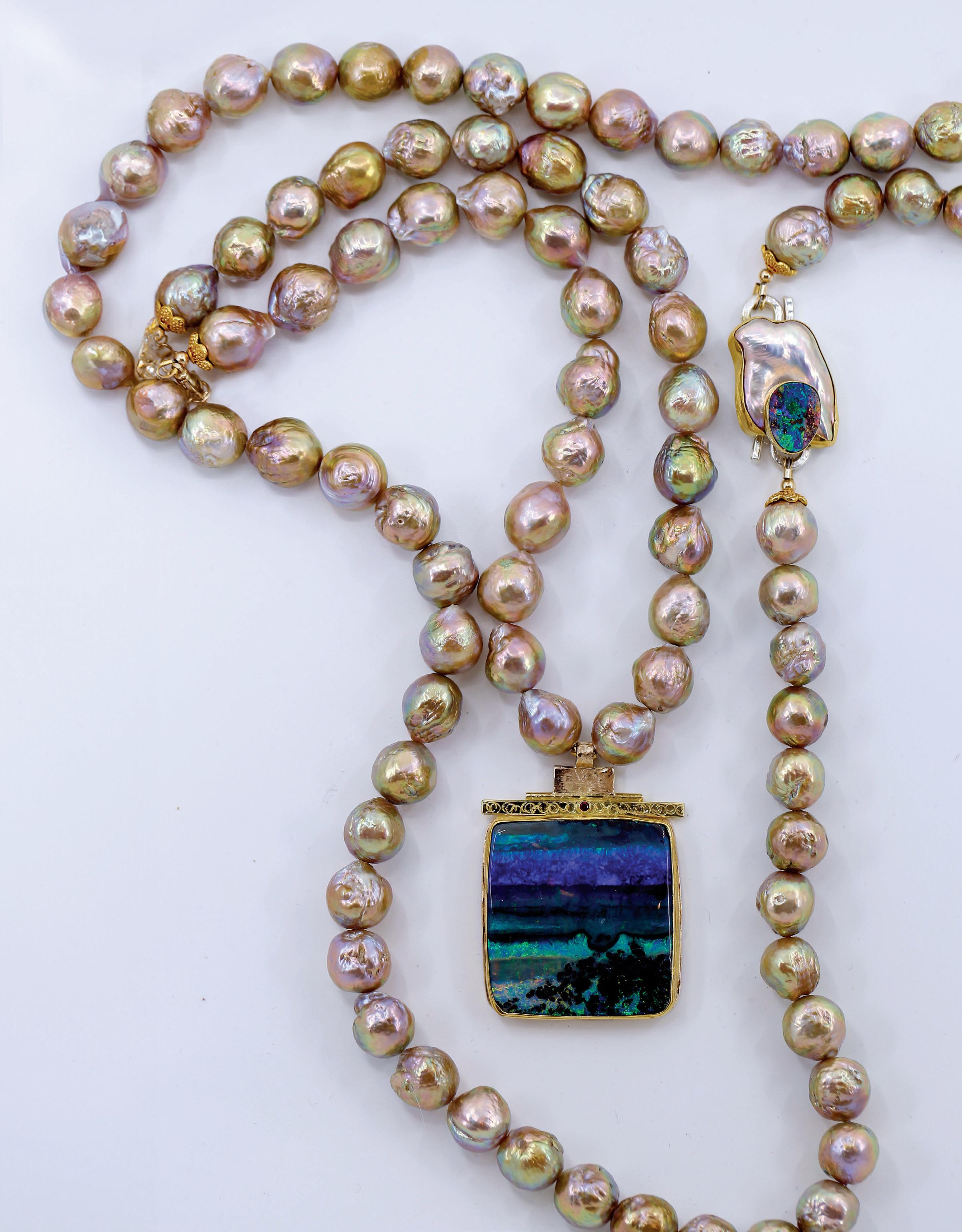
“Many Moons” – Boulder opals and designer pearls set in 22k and 18k gold and sterling silver. Created by artist Jennifer Kalled. Wolfeboro, New Hampshire Santa Fe, New Mexico 603.569.3994 kalledjewelrystudio.com the Kalled Gallery
AGENDA the players
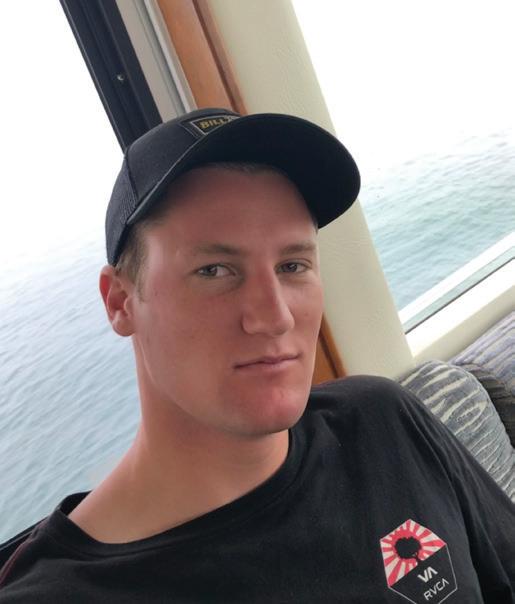
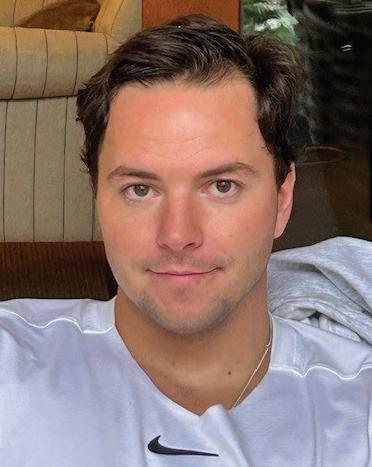
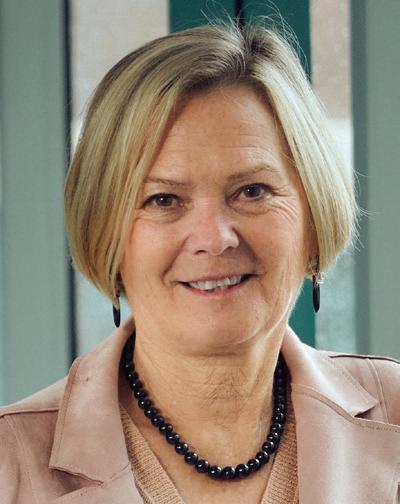
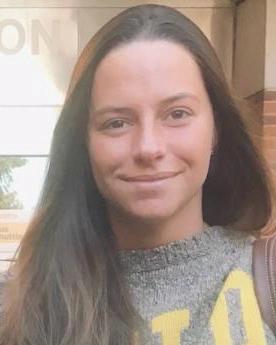
Amateur Cup. He lives at Husaria Farm in Ipswich, and is a patron of Myopia Polo and the Husaria Polo Team. Yaz is the team advisor to the Stage Hill and Myopia Interscholastic Polo Teams and a USPA Certified Umpire. 0 GOAL
ROBERT GUTTMAN
Bob Guttman, at age 71, began playing at Myopia at the end of the 2022 season. He has played and coached as a riding instructor at Stage Hill Polo for about 40 years. He is known locally in Gloucester as a harbor swimmer and to a smaller group there as a writer experimenting on themes of courage that we all implicitly inherit from those who have come before, including our relationship with horses. -1 GOAL
TRISTAN HANLEY
Tristan grew up around the polo fields in Southern California before moving to Hong Kong and London where he spent the summers in Sotogrande. He later rode gymkhana in high school and naturally gravitated towards the polo scene in New England after moving to the East Coast. His aim is to one day be a 4-goal player like his father once was. Tristan currently works in investment banking in downtown Boston.
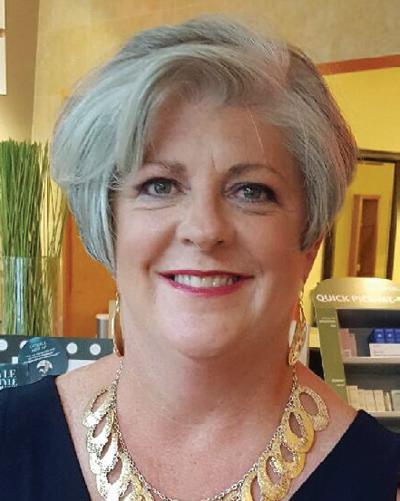
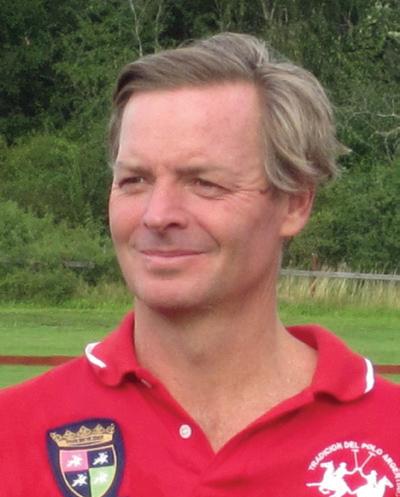
PHOEBE INGRAM
Phoebe came to the U.S. in 1996 from the U.K. and started playing polo at Myopia in 1997. She gained a 1-goal rating and won the East Coast Open at the 20-goal level and the 16-goal level and played in several successful seasons in Florida in the winter with her Mirage team. She continues her interest in and connection to polo by umpiring games.
0 GOAL / 2 (WOMEN’S)
PATRICIA JOHNSTONE
Patricia has had a lifelong passion for horses, which spurred a love for the sport four years ago via Stage Hill Polo. Now she and her husband, Gary, owners of Stones Throw Farm in Ipswich, are enthusiastic supporters of all aspects of the game. She is actively involved in the Myopia Coaching League, Winter Arena League and a supporter of the Myopia Polo Interscholastic Team. -1
GOAL / 0 (WOMEN’S)
MARTIN LUGINBÜHL
Martin began playing polo as a child when his father founded the first Swiss polo club — Polo Club de Veytay — in 1988. He has competed in various countries and had the opportunity to represent Switzerland internationally. Martin has two tenures as president of the Swiss
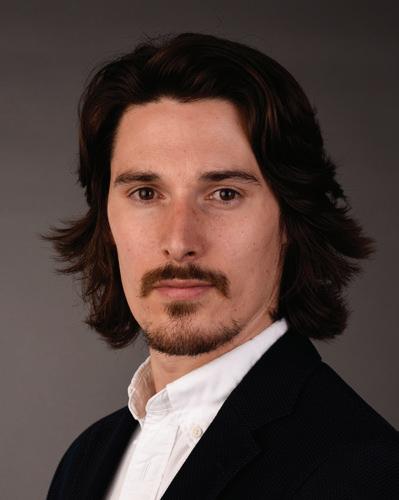
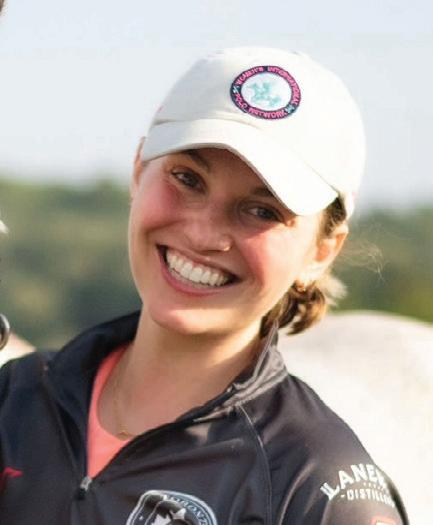
Polo Association. He is a marketing and communications professional and completed a master’s in public administration at Harvard.
MAX MEHM
Max began playing polo at the age of seven in his hometown, Geneva, Switzerland. He participated in the Myopia’s junior summer polo programs, and later played for Myopia’s Interscholastic team. Max captained the varsity squash team at Dennison University. He lives in Montevideo, Uruguay, where he works for an International Commodities Trading company.
OLIVIA MEHM
Olivia began polo at the age of 11 in her hometown, Geneva, Switzerland. During summers, she played in Myopia and Harvard’s junior programs. She was the captain of the Deerfield Academy Interscholastic Polo team. Olivia is an avid tennis player, golfer and marathon runner. She lives in Singapore where she works in international finance.
ROBERT MEHM
Robert was introduced to polo by his father at Myopia in 1979. Along with his brother, Ted, they formed the West Hill Polo Team. Robert has played polo in more than 30 countries from Brazil to
CAPTAINS OF MYOPIA POLO, PAST AND PRESENT
David Strouss
2021-PRESENT
Franz Colloredo-Mansfeld
2011 (CO-CAPTAIN)–2020
W. Albert Ellis
2009–2010, 2011 (CO-CAPTAIN)
Lyle Graham
2001–2008
Michael S. Fawcett
1996–2000
Neil St. John Raymond
1986–1996
Robert A. Wilkinson
1981–1983
Donald V. Little
1968–1981, 1983–1986
Neil R. Ayer
1960–1967
Forrester A. Clark
1937–1940, 1946–1959
Fredrick H. Prince, Jr. 1924–1925
Fredrick Ayer
1921–1923, 1929–1936, 1941–1945
Neil W. Rice
1920
Henry P. McKean, Jr.
1919
Charles G. Rice
1918
James H. Proctor
1917
Q.A. Shaw McKean 1916, 1927–1928
Quincy A. Shaw II 1914
Dudley P. Rogers
1908–1912, 1915, 1926
F. Blackwood Fay 1902–1903, 1907, 1913
Rodolphe L. Agassiz
1893–1901, 1904–1906
R. M. Appleton 1891–1892


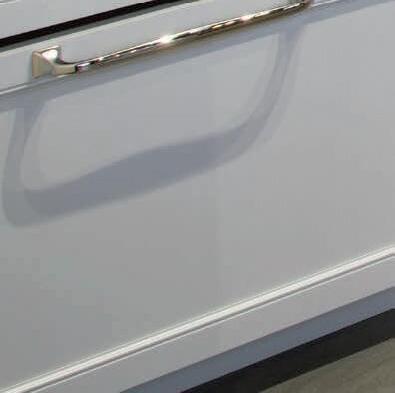

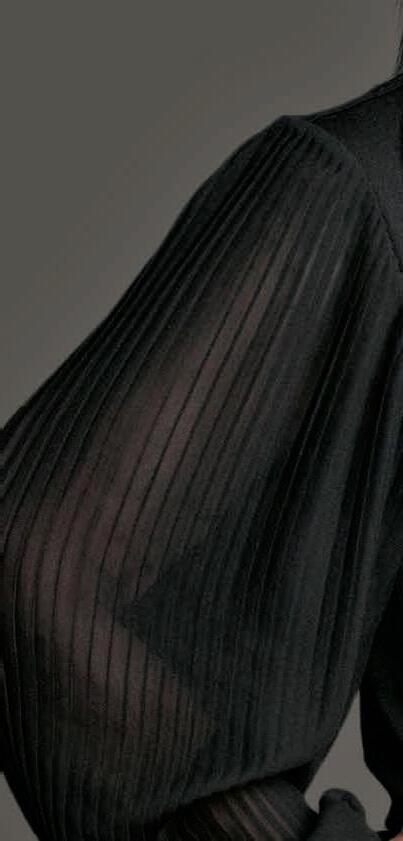

12 myopia polo 2024
PATRICIA JOHNSTONE
MARTIN LUGINBÜHL
CHELSEA MESSINGER
ROBERT MEHM
TRISTAN HANLEY PHOEBE INGRAM







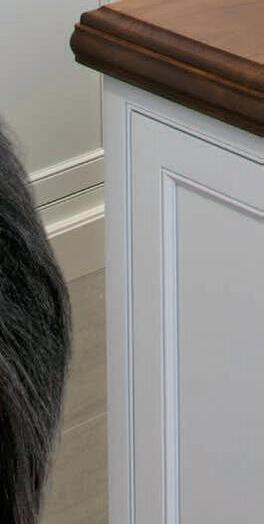
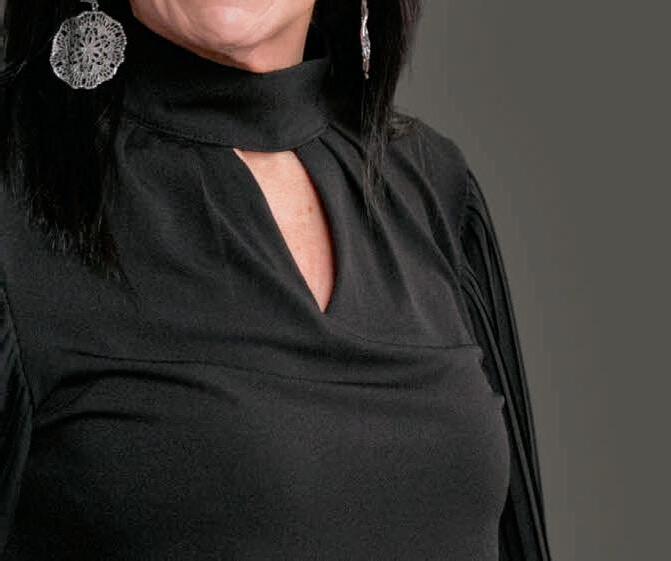





While they’re not designers, these are the people designers call on when it comes






Spend an hour at a Clarke Showroom and one thing is clear: your time with a Clarke Consultant is the most valuable part of your kitchen journey. While they’re not designers, these are the people designers call on when it comes to appliance recommendations. You won’t buy anything at Clarke, so there’s simply no pressure. What you can do is compare more Sub-Zero, Wolf and Cove models than anywhere in New England. Explore a living portfolio of kitchens created by the region’s top designers. You will leave inspired with new knowledge to make your appliance selections with confidence.











Showroom Consultant Lee Maida brings more than 30 years in the appliance industry to every consultation, including a unique knowledge of the ventilation requirements for every space. Her kind, caring, enthusiastic manner makes a visit to Clarke a delight for homeowners and designers. Boston & Milford, MA South Norwalk, CT 800-842-5275 clarkeliving.com

New England’s Official Showroom and Test Kitchen

Without
Lee, it wouldn’t be Clarke.
AGENDA the players
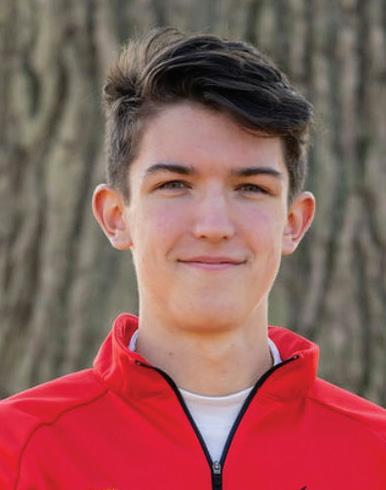
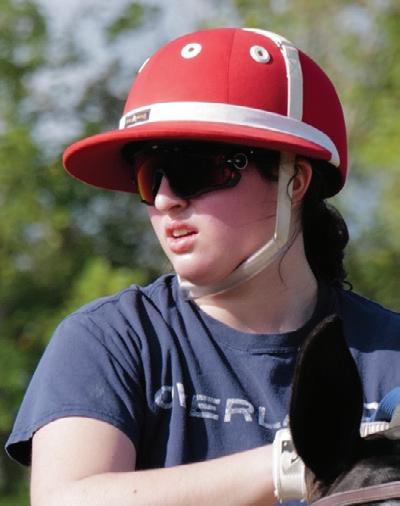

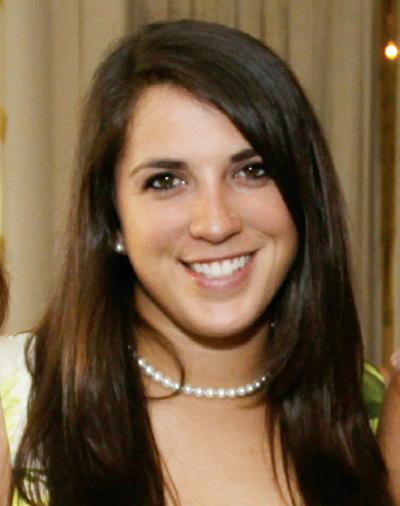
Brunei, India to Indonesia. He is also a two-time Nepal World Elephant Polo Champion. A former 3-goaler, Robert now has a 1-goal arena, and a 0-goal outdoor handicap. 1 GOAL
CHELSEA MESSINGER
Chelsea began playing polo in college at Yale, where she competed on the intercollegiate women’s team. Over the past decade, she has played internationally in China, Malaysia, Pakistan and Canada. Chelsea has played at Myopia since 2019 and competes throughout the Northeast in both women’s and mixed polo. She lives and works in Boston as a physician. 0 GOAL / 2 (WOMEN’S)
SHANE METTERNICK
Shane, a graduate of Hamilton-Wenham Regional High School, started his polo career four years ago. He attends Southern Methodist University, where he plays intercollegiate polo. 0 GOAL
KURT MILLER
A veteran player and horseman at Myopia. Kurt brings steady play and formidable competition to the game. During the winter, he often plays in Chile, where many of his horses are from. Kurt was inspired to follow in the footsteps of his father, who also played at Myopia. This summer,
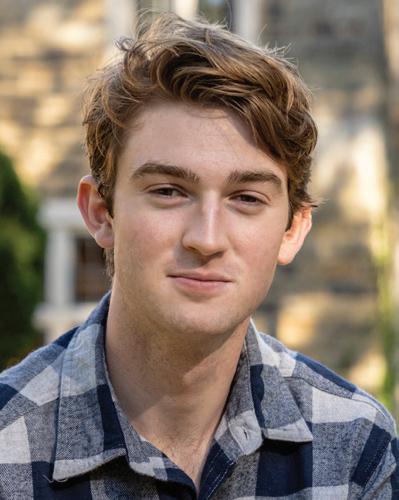
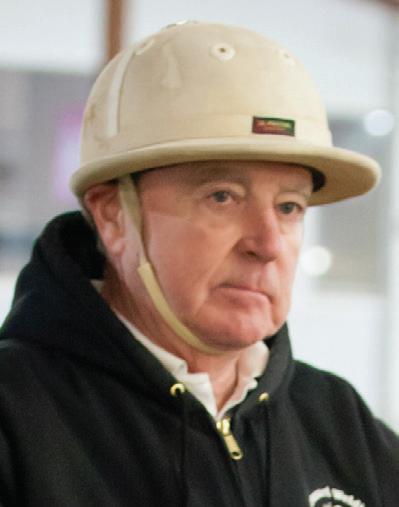
Kurt looks forward to another year at Myopia and joining forces with his son, Reed, on their Longmeadow Team. Kurt’s wife, Jackie, is an active committee member and photographer for Myopia Polo. 0 GOALS
REED PARKER MILLER
A third-generation Myopia player who grew up around the Myopia Polo fields watching his father, Kurt plays as his grandfather played before him. He began with Myopia’s Junior program and Stage Hill Polo. At age 13, Reed played alongside his father on their Longmeadow Team, and won his first USPA tournament. He played on the Myopia Varsity Interscholastic Team and received an All-Star at the USPA Prelim Regionals. In 2019, Reed won the USPA National Youth Tournament Series (NYTS) in Aiken as well as other major tournaments, including Myopia’s Chairman’s Cup 8-12 goal. Reed continues a family tradition of traveling to South America to play polo. 1 GOAL
BRYAN PARROTT
Bryan Parrott, DVM, owner of Parrott Equine Associates LLC, has been practicing equine veterinary medicine for 37 years, and loves the sport of polo and the horses that play. Bryan played polo for 27 years, starting in the coaching league in
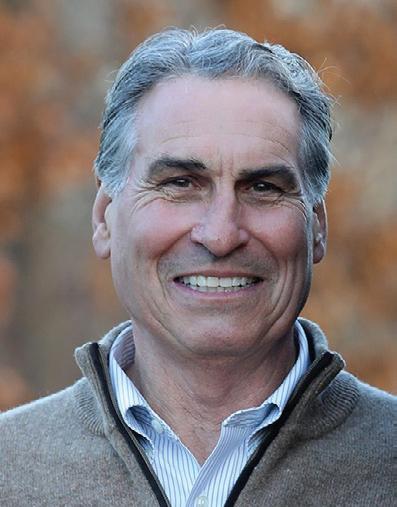
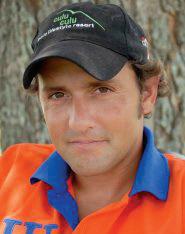
1995. As co-founder of the Myopia Equine Welfare Committee, Bryan’s mission is the health and well-being of the horses.
ADDIE POLITI
Addie started playing polo two years ago after being introduced to the sport by a friend. She’s a graduate of Manchester Essex Regional High School who has played all levels of polo. Her most memorable experience so far was an 8-goal practice. Addie is looking forward to playing more polo this summer. -1 GOAL
ALYSON POOR
Alyson’s career with animals started at age 7, when she began riding and playing polo at her father’s polo school in Hamilton. Alyson graduated with a degree in animal science from the University of Kentucky, where she also played on the polo team. 0 GOAL / 4 (WOMEN’S)
PETER POOR
Peter has played polo at Myopia for more than 60 years, and his two daughters also play. Peter runs Stage Hill Polo School in Newbury and is the Northeast region governor for the USPA. He has been a central figure at Myopia in many capacities and is the announcer of Sunday games. 0 GOAL
JUNIOR PLAYERS
OPEN (BOYS)
Victor Vorbrodt
Nick Zaragoza
Eric Vorbrodt
Drew Carleton
Maverick Ellis
GIRLS
Alexis Atkinson
Skylar Bell
Novah Wali
Alessandra O’Keeffe
Finn O’Keeffe
Jaya Khurama
7TH GRADE AND YOUNGER
Blake Bell
Robin Reyes
Taylor Carleton
MYOPIA COACHING LEAGUE MEMBERS
Alexis Atkinson (Junior)
Skylar Bell (Junior)
Julietta Burr
Andrew Carleton
Taylor Carleton (Junior)
Cory Cochran
Kirstin Costa
Ava Croce
David Dunstan
John Ellis
Maverick Ellis
Thomas Geiser
Francoise Martinolle
Leslie Milne
Alessandria O’Keefe (Junior)
Finn O’Keefe (Junior)
Inessa Palchikova
Sofia Puch (Junior)
Robin Reyes (Junior)
Zöe Sims
Megan Wurden
Caddy Yates
14 myopia polo 2024
ADDIE POLITI
KURT MILLER
PETER POOR
BRYAN PARROTT
ALYSON POOR
REED MILLER
SHANE METTERNICK
ESTANISLAO “ESTANI” PUCH

Boston’s own auction house, assisting New England families with the sale of their fine art and jewelry since 1987. groganco.com 20 charles st. boston ma 617.720.2020
AGENDA the players
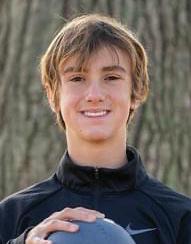
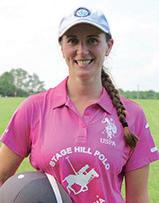
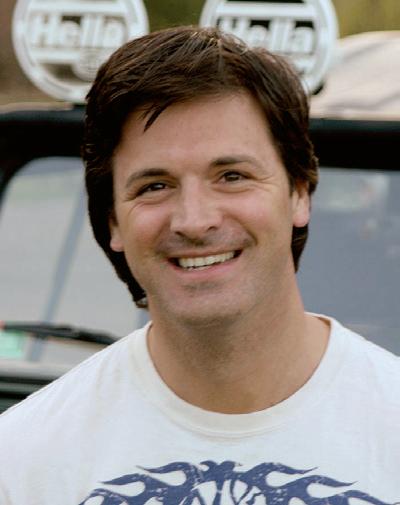
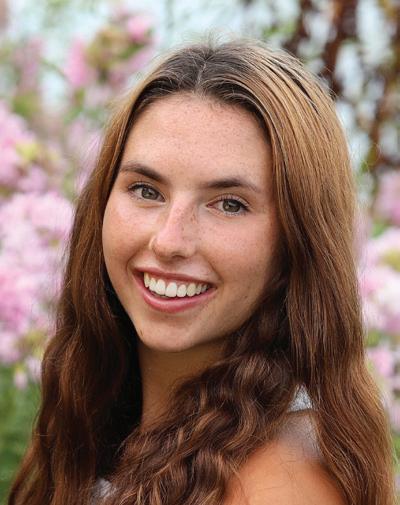
ESTANISLAO “ESTANI” PUCH
With a handicap of 3 in Argentina and 2 in the U.S., Estani has played at Myopia for the last 11 years. He divides his time between the U.S. and Argentina, where he runs El Rincon del Polo Club & School outside Buenos Aires in the winter months. 2 GOALS
ESTANI JAMES PUCH
Estani James is a third-generation polo player, following the steps of his father, Estanislao, and grandfather, Maximo. He loves horses and helping to develop new players at the Myopia Polo Club and at his family’s estancia “Calchaqui” in the pampas of Argentina. Estani is a member of the Crimson-Harvard interscholastic varsity polo team. Estani is an honors student at BC High and also plays for the men’s soccer team. 0.5 GOAL
NEIL “JED” ST. JOHN RAYMOND JR.
Jed grew up playing polo with his dad, former Myopia captain Ted Raymond, for Maplecroft Farms, and has played in the U.S., Argentina and the U.K. Jed is a graduate of Middlebury College and Harvard Graduate School of Design. A gifted athlete, he excelled in lacrosse,
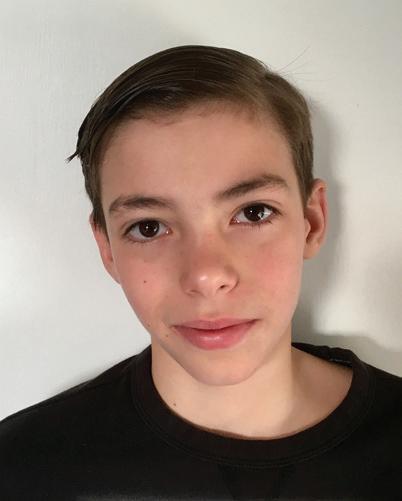

which he played professionally after graduation. 2 GOALS
ROBIN REYES
Robin Philip Reyes, age 11, started swinging a polo mallet on horseback when he was just 5. Robin started playing with the Crimson Interscholastic polo team and the Myopia coaching league in 2023. Robin even got to play in a few Sunday games last year. While still too young to participate on many competitive teams, Robin did represent the Harvard Crimson at a USPA I/I middle school tournament last fall. Robin scored 10 of 14 goals for his team and won the tournament, as well as receiving awards for All-star and Horsemanship.
THOMAS RIZZO
Tom has been playing polo for 10 years and riding for 12. He is an engineer by day and a pilot and sailor by weekend. -0.5 GOAL
AMANDA (POOR) ROBERTS
Amanda has been playing polo since she learned to walk. She learned from her father, Peter Poor, within his successful polo school at Stage Hill Polo. Amanda plays around the country in many women’s tournaments. She is the Northeast
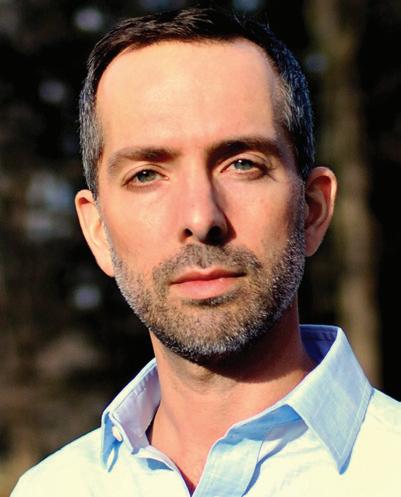
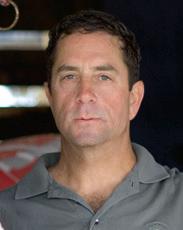
Circuit Handicap Chair of the USPA Women’s Handicap Committee. She lives in West Newbury, Mass., with her husband, Scott, her two stepchildren, Garret and Brynn, and her son, Mason. Amanda is the highestrated Women’s player at Myopia. 1 GOAL / 5 (WOMEN’S)
BRYNN ROBERTS
Brynn started polo in the fall of 2017. She learned to play from her stepmother, Amanda Poor-Roberts. She quickly advanced and now plays regularly with the Stage Hill Polo Club and Myopia Polo Club.
STEVE RUDOLPH
In his 11th season at Myopia Polo, Steve is a lifelong New Englander residing in Newburyport with his wife, Sarah. When not playing polo, Steve is a strategy consultant to telecommunications and media companies in the U.S. and Latin America. -0.5 GOAL
AURELIA RUS
Aurelia has been a playing member at Myopia since 2019. She first learned to play polo while attending Cornell University, and picked it up again with Stage Hill Polo in 2015 after relocating to Boston. Aurelia lives in Medford with her husband and dog. -0.5 GOAL
MYOPIA POLO COMMITTEE
David C. Strouss, Captain
Terri Campbell
Andrew Carleton
John Ellis
Jacek K. “Yaz” Grotnik
Jacqueline C. Miller
John Kurt Miller
Neil Raymond, Jr.
Michael “Denny” Ryus
MYOPIA STAFF AND GROUNDS CREW
MYOPIA POLO MANAGER: Erica Katz
STAFF:
Finn Brophy
Jackson Courtney
Ian Coffey
Aidan Analoro
Cameron Taylor
Wyatt Arvanites
Joe Hughes
Patrick Driscoll
NORTHEAST EDUCATION
CONSORTIUM SOAR:
Ian Graham
Jack Foley
Paul Sylvestre
MYOPIA EVENTS & MARKETING: Cathy Taylor
CORPORATE SPONSORSHIP
Marlene Pippins
GROUNDS SUPERINTENDENT: Jonathan Wilber
STAFF:
Cyle Machia, assistant superintendent
Ben Ayer, assistant superintendent
Quintin McCartney, head mechanic
Noah Tuomi, assistant in training
Jim Gower, seasonal mower

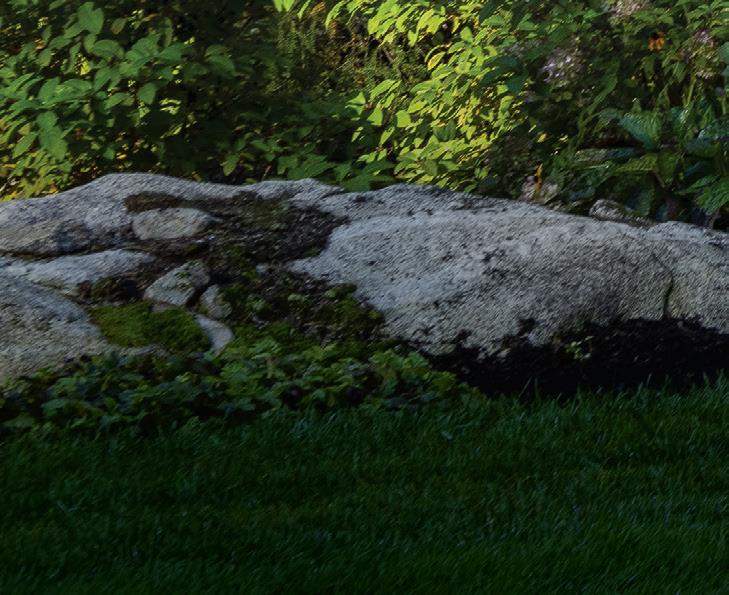
16 myopia polo 2024
THOMAS RIZZO
NEIL “JED” RAYMOND, JR.
RICK SALTER
BRYNN ROBERTS
STEVE RUDOLPH
ROBIN REYES
ESTANI JAMES PUCH
AMANDA (POOR) ROBERTS



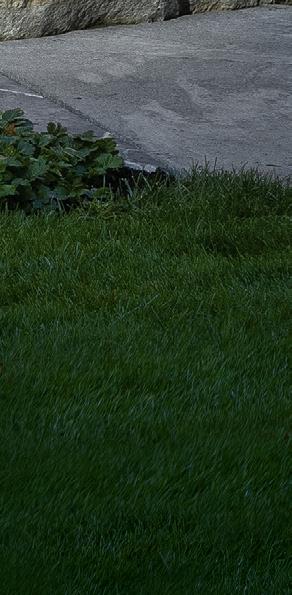
 Rob Karosis Photography
Rob Karosis Photography
AGENDA the players

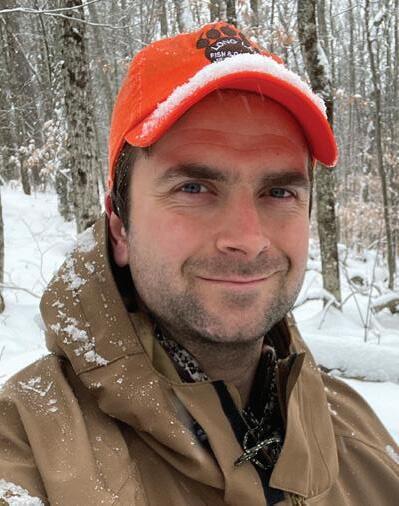
RICK SALTER
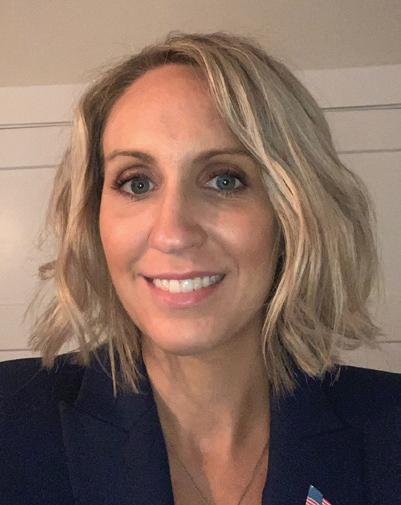
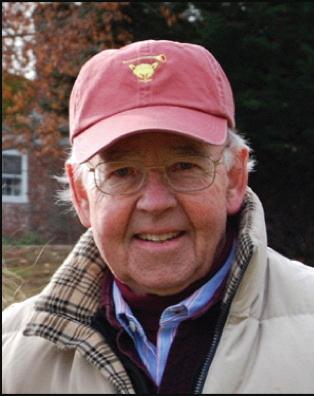
Rick started playing polo at Myopia in 2001. He plays nearly year-round, as he owns a farm in Aiken, S.C., and plays in Florida during the winters and Argentina in the fall. RATED B.5
LIZ SAWICKI
Liz started playing polo with Stage Hill Polo in 2021, and this is her second season at Myopia. She is an Alzheimer’s researcher by day and her biggest supporters are her husband, Dan, a U.S. Air Force Colonel, and her daughter, Sierra. When, they are not at the polo field, Liz and her family enjoy snowboarding and surfing. -1 GOAL / 0 (WOMEN’S)
C.B. SCHERER
C.B. joined Team USPA in 2010 and now works in finance in Boston, but continues his passion for polo and teaching at Myopia. A third-generation polo player from Florida, C.B. played for the UVA squad and was a three-time Men’s National Intercollegiate Champion. In 2012, he was a finalist at the East Coast Open on the Airstream Polo Team, a Harrison Cup winner and MVP and winner of the Eduardo Moore 12-goal. 2 GOALS

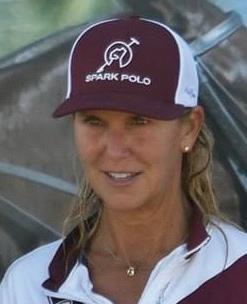
CROCKER SNOW JR.
Myopia’s senior polo veteran, Crocker started playing in college during the rebirth of polo at Myopia in the early 1960s and has played ever since, broken only by years living abroad. Crocker has played in Europe, Africa, Asia, the Middle East and South America. Once rated at 4 goals, he now typically plays the back position and is co-coach of Harvard’s polo team. 1 GOAL
NICK SNOW
The highest-rated homegrown player at Myopia, Nick played with his father and older brothers as a teen and later captained Harvard’s polo team. A big hitter and good horseman, Nick was named to Team USPA and represented the U.S. in the FIP World Championships in Argentina. 4 GOALS
MICHAEL WALES
Michael took his first riding lessons in the Dominican Republic in January 2021 and picked up polo later that spring. He played 4- and 6-goal tournaments in 2022 and looks forward to his third season at Myopia. Prior to Polo, Michael captained the Harvard Lightweight Rowing Team and competed for Team USA
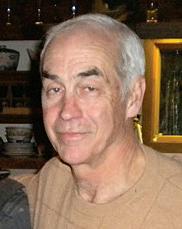
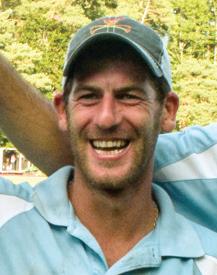
at the World Championships. Michael lives in Boston with his wife, Collier Searle, where he works as an investment manager and enjoys cycling, skiing and other outdoor activities. -1 GOAL
ROB WILKINSON
Rob, a former captain of Myopia Polo, was an active player at Myopia for more than 25 years. He has been an enthusiastic rider for many years and enjoys riding and fox hunting with the Myopia Hunt. Rob is president of New England Trust Services and lives in Topsfield with his wife, Darlyn.
JENNIFER WILLIAMS
A finance professional working as a project manager in the life sciences sector, Jennifer has been playing arena and grass polo for more than 15 years. She has played in 10 countries, including Pakistan, where she won the first-ever women’s polo event at Lahore Polo Club. Coaching, teaching and managing are parts of her passion for the sport. She has played just about every stick sport there is including jai alai, lacrosse and ice hockey. 0 GOAL / 4 (WOMEN’S)
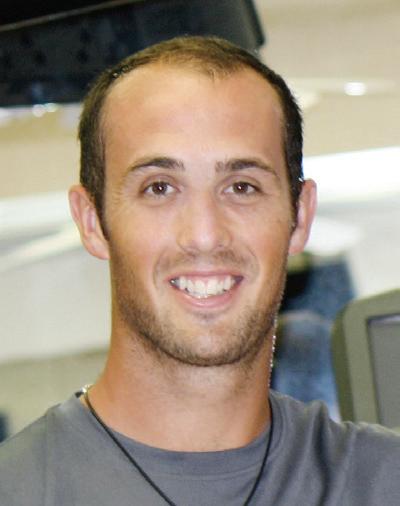
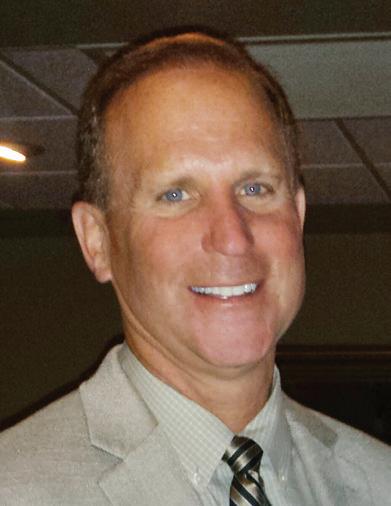
FEDERICO WULFF
Federico grew up playing Polo in Buenos Aires. He has made Myopia Polo his summer home for the past several seasons, and plays for the Longmeadow Polo Team. Federico works to improve the level of beginner and intermediate players of our Myopia Polo Coaching League. Off the field, Federico is the tournament manager, running the tournaments played at Myopia. 3 GOALS
PHILIP ZOCCO
Philip was the recipient of Myopia Polo’s 2015 Most Improved Player and is the sponsor of Team Georgetown Door & Window. His natural athletic abilities, team sport presence and a love for horses have contributed to raising his level of play and overall passion for the sport of polo. RATED A
18 myopia polo 2024
FEDERICO WULFF
PHILIP ZOCCO
MICHAEL WALES ROB WILKINSON
JENNIFER WILLIAMS
CROCKER SNOW, JR.
NICK SNOW
AURELIA RUS
LIZ SAWICKI
C.B. SCHERER

AGENDA the rules
Law and Order
The rules of polo are simple and designed to keep the game flowing and to protect the horses from injury.
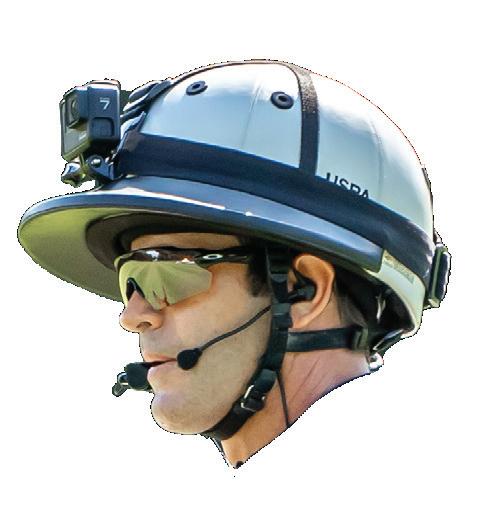
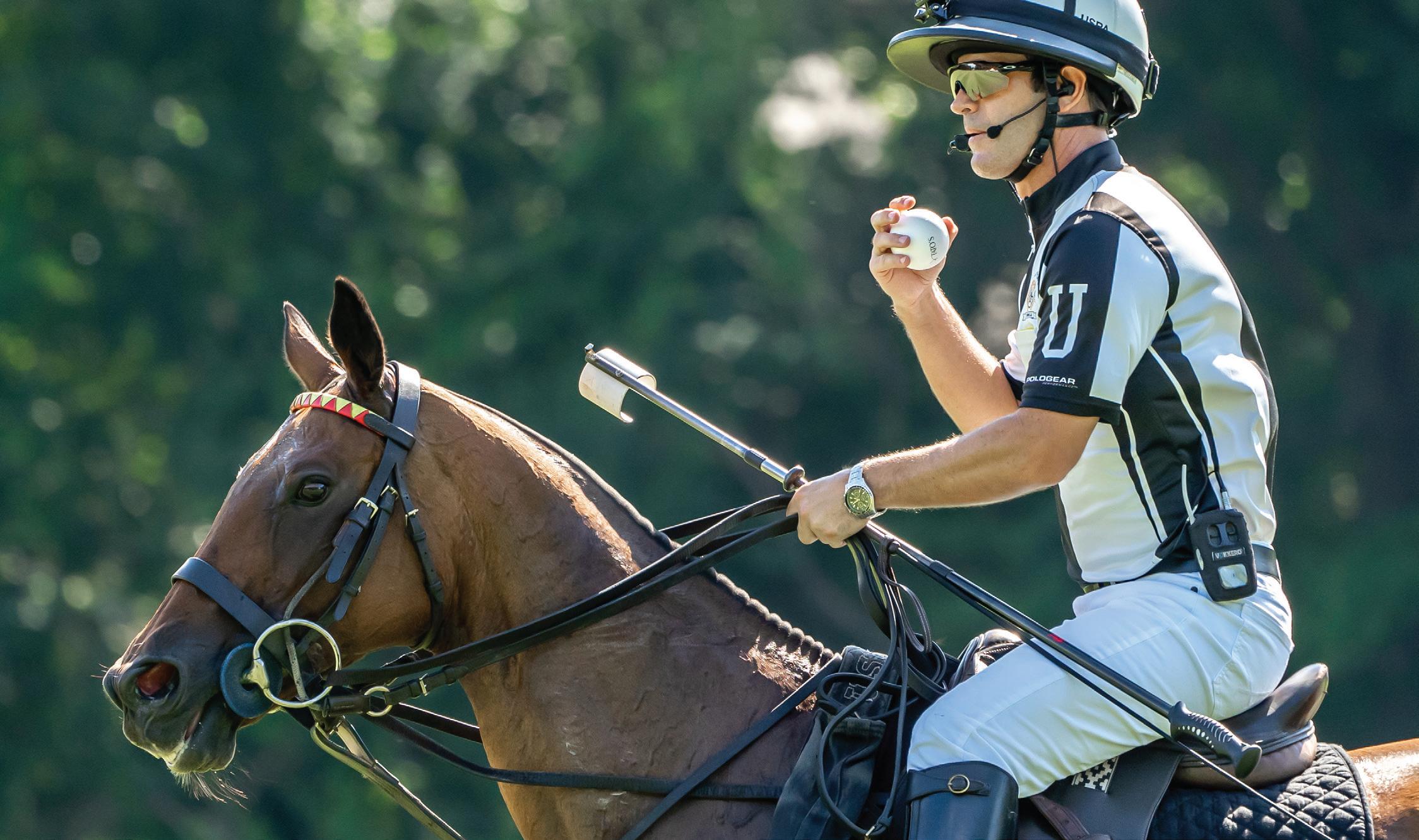
APPEALING FOR A FOUL
Trying to influence the call of an umpire, most often done by lifting the mallet up in the air. Appealing for a foul is itself a foul, though seldom called.
FOUL
A foul is an infraction of the rules. The most common types of fouls are right-ofway infractions, walking the ball, turning the ball, dangerous riding, rough or abusive play, improper use of the mallet and unsportsmanlike conduct.
DANGEROUS RIDING
A foul which occurs when a player executes an improper or dangerous ride-off, zig-zags in front of another player traveling at speed, slides across the back legs of another player’s horse close enough so there is a risk that one or both horses could trip, rides an opponent across the right-ofway of an oncoming player at an unsafe distance, deliberately rides their horse into the swing of another player, or generally exhibits a disregard for the safety of other players and/or their horses.
IMPROPER USE OF MALLET
A foul occurs when a player executes an improper hook, such as high hook (above the shoulder), a cross hook (from the other side of the horse) or a slash hook (excessive force), or uses a mallet in a way that endangers their mount, an opponent, an opponent’s mount, an umpire or a spectator.
PENALTY
The result of a called foul or infraction of the rules. The umpire imposes a penalty to either compensate the other team for the loss of advantage or to sufficiently penalize the fouling team for a rule violation that did not cause a disadvantage to the opponent, such as unsportsmanlike conduct. Penalties range in severity from taking possession of the ball from a team and bowling it in, to ejecting a player from the game.
RIGHT-OF-WAY
The right-of-way is best thought of as a highway, with the line of the ball creating the centerline. The player traveling in the direction of the ball, with the ball on their
offside and at the least angle to it, generally has the right-of-way over the other players. When the player’s progress to the ball within that right-of-way is improperly impeded, a foul is called. Examples of right-of-way violations include entering the right-of-way at an unsafe distance or speed (comparable to cutting in from an on-ramp while driving too slowly), crossing over the line of the ball in front of someone on the right-of-way, stopping on the ball or one player meeting two.
ROUGH OR ABUSIVE PLAY
A foul that occurs when a player abuses their horse, another player or another player’s horse. This can include seizing or striking with the hand, elbow, head, mallet or whip.
SAFETY
When a defending team hits the ball over its own end line. When a safety occurs, the attacking team is awarded a Penalty 6, which is a defended penalty shot from 60 yards out and perpendicular to the end line at the spot the ball went over the end line.
20 myopia polo 2024 photographs by jacqueline miller
TURNING THE BALL
Technically known in the USPA rules as a Quick Line Change, turning the ball is when a player slows down dramatically and changes the line in a very small space. When defended, this is a foul. Until recently, this rule was rarely enforced. In the last several years, all three major associations have begun enforcing the rule to create a more open and flowing game. To distinguish between running a turn, which is not a foul, and turning the ball, which is a foul when the player is defended, look at the distance between the player with the ball and the defender. When running a turn, the distance between the two players does not close. When turning the ball, that distance closes quickly and is considered unsafe.
UNSPORTSMANLIKE CONDUCT
When a player uses vulgar or abusive language; is disrespectful to another player, coach, umpire or spectator; argues with an umpire; delays the game by feigning injury or requesting an unnecessary tack time-out; or appeals for a foul, especially by wind-milling their mallet.
WALKING THE BALL
Carrying the ball while slowed down to a walk. In outdoor polo, this is a foul for delay of game. When called, it results in a throw-in at the spot of the infraction. In arena polo, the player must maintain “reasonable pace” when along the wall. There is no rule governing pace in the arena when not along the walls.
Compiled from USPolo.org.
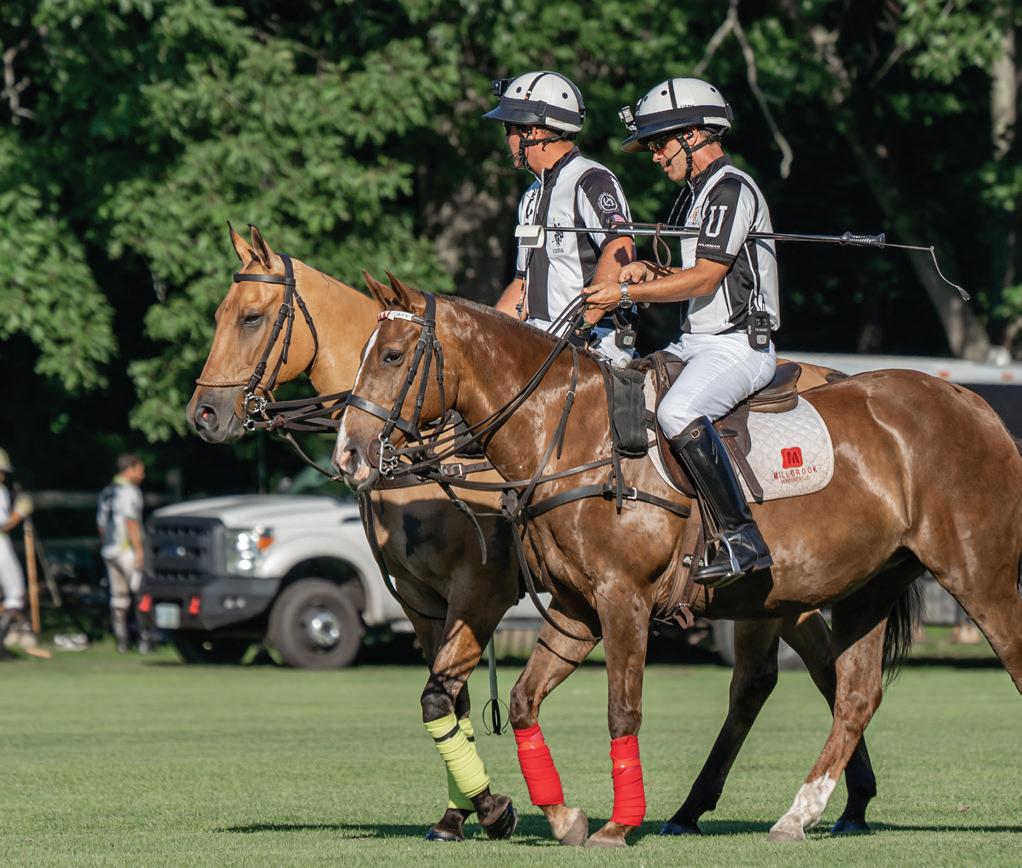
Polo 101
POSITIONS, GLOSSARY OF TERMS AND A FEW OTHER BASICS
POSITIONS
A polo match pits two teams of four players and their ponies against each other. The players on each team are numbered one through four, with each number representing a general role as follows:

1. GOAL SCORER. This player pushes forward aggressively and seeks openings into which teammates can hit. This player also marks the opposing team’s No. 4, or Back.
2. ENERGIZER. The energizer is always involved in play while quarterbacking the offense and neutralizing the opponent’s top player.
GLOSSARY
APPROACH SHOT: A long shot taken to get the ball close to the opponent’s goal.
BACK SHOT: When a player hits the ball backwards, can be played on both the nearside and the offside.
BOARDS: Wooden barriers placed alongside a polo field to keep the ball in the playing area.
BUMP (A.K.A. RIDE OFF): When two riders come into contact with each other with the objective of knocking or pushing the other rider off the line of the ball, so they are unable to hit it.
CENTER LINE: Middle of field where the ball is thrown in after each goal.
CROSSING: When one rider cuts across another player’s right-of-way.
CUT SHOT: When a player makes a stroke that is at an angle to the direction in which they’re riding.
DIVOT STOMP: A halftime tradition in which spectators enter the field to replace divots made by the horses back into the ground.
DRIVE: A player hitting the ball either forward or backward along the same parallel line the horse is taking.
FOREHAND: When a player hits the ball forward, can be played on both the nearside and the offside.
FREE HIT: For certain rule violations, a player will be allowed a free and uncontested hit at the ball.

team and directs the flow of the game.
4. DEFENDER. The defender plays at the back of the game to prevent the other team from scoring.
HANDICAP DESCRIPTIONS. Every player on the field carries a handicap from -2 to 10 goals, based on their skill level and horsemanship, as determined by a national handicap committee. A handicap of 10 represents the highest ranking in the game.
GOAL: When the ball crosses between the two goal posts, resulting in a score.
HOOK: A defensive tactic used when a player makes contact with an offensive player’s mallet before it hits the ball.
KNOCK IN (A.K.A. HIT IN): When the offensive team hits the ball over the back line wide of goal. The defending team then plays the ball from the point at which it went over the back line.
LINE OF THE BALL: The path along which the ball travels after a hit. This line extends beyond the ball as well.
LINE JUDGE: Assists the umpires by signaling whether the ball went between or outside the goal posts.
NECK SHOT/TAIL SHOT: The former is played under the horse’s neck. The latter, beneath and behind the tail.
OFFSIDE/NEARSIDE: When seated on a horse, the offside refers to the player’s right side, and the nearside refers to their left side.
TACK TIME: Stop in play, called by the umpire, if a player’s tack is broken.
TAILGATING: One of the most celebrated polo pastimes, complete with picnic tables and baskets, gourmet snacks and plenty of beverages.
THROW-IN: When an umpire bowls the ball between teams to start play.
2024 myopia polo 21
Opposite page: Umpire Jamie Mirikitani prepares to start play. Above, umpires Brent Mirikitani, foreground, and Jamie Mirikitani discuss a call.
AGENDA
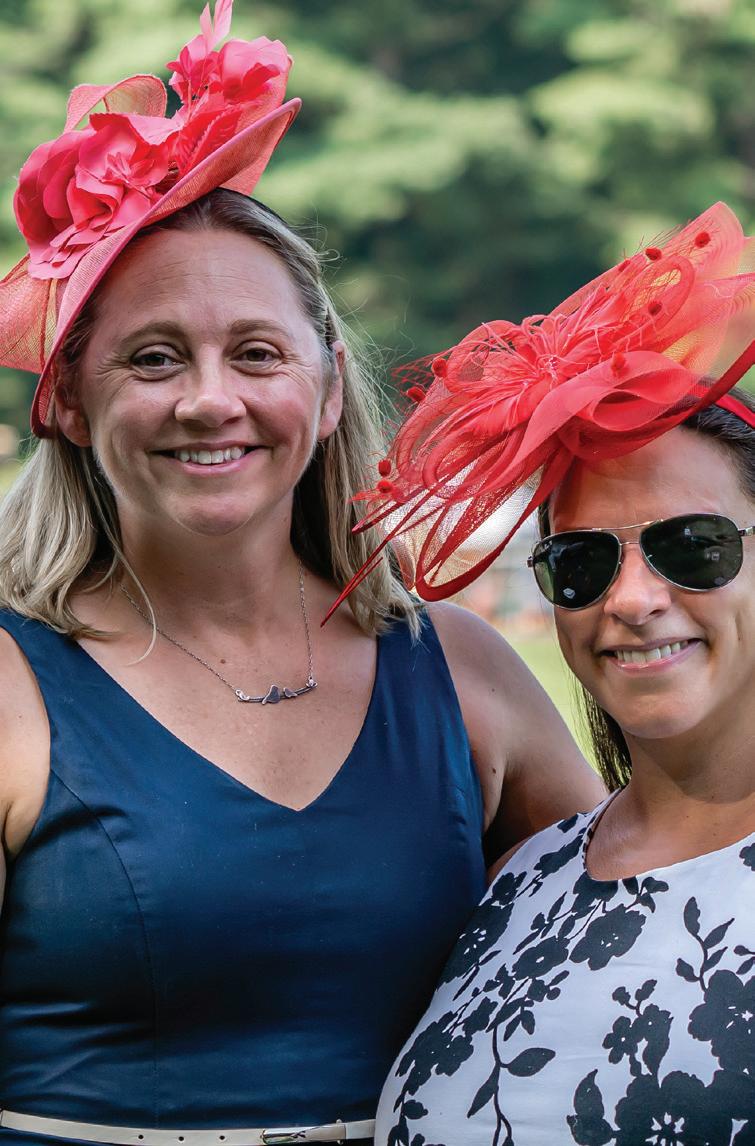
Game day on Sunday afternoons at Myopia allow fans and spectators to display their finest sartorial accouterments, meet the players and the polo ponies, and indulge in a few tailgating culinary adventures.
“If you’re going to go, go big. Do it up in grand style. Be part of the culture for the day.”
sidelines
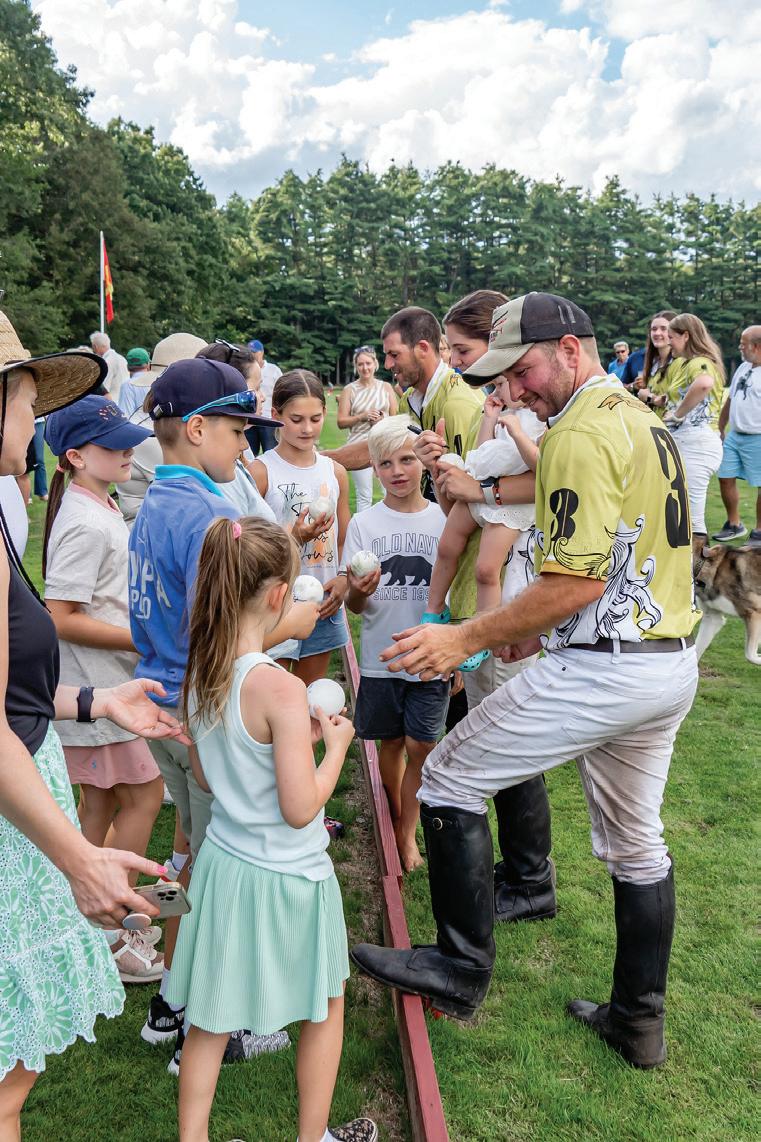
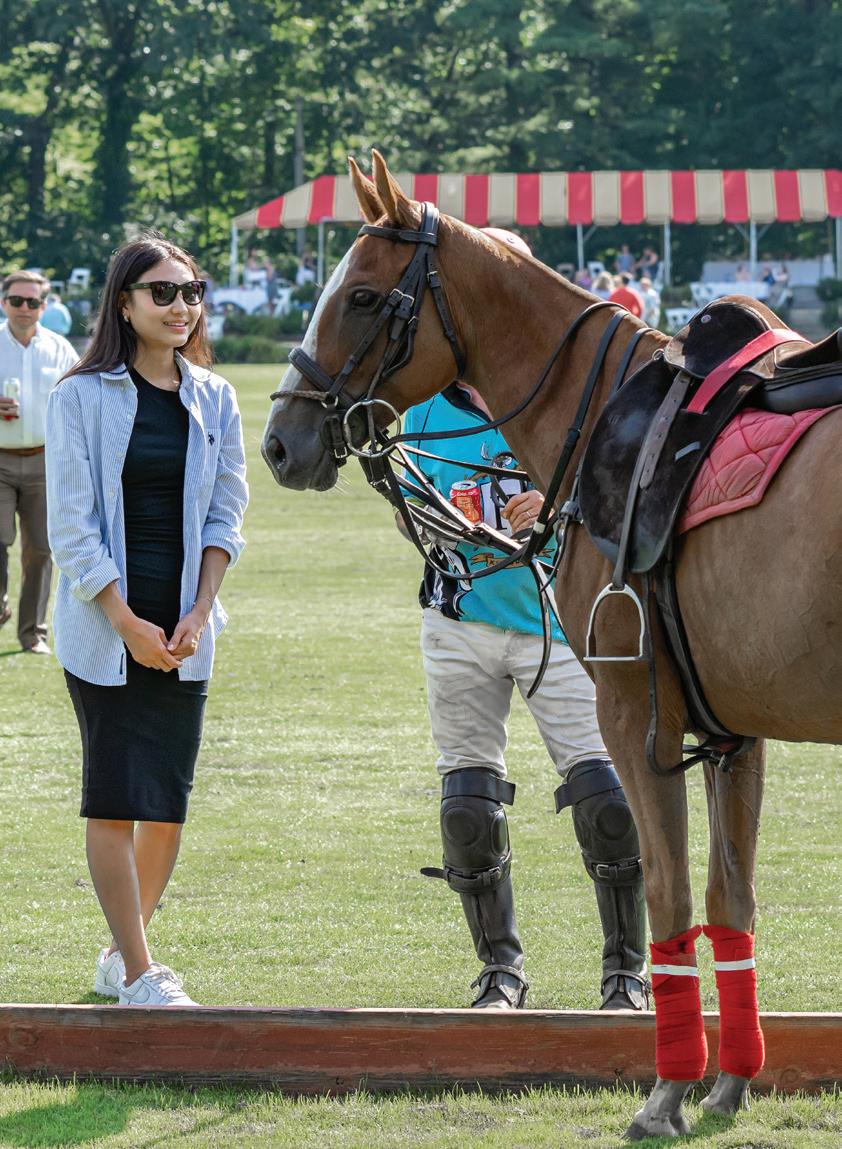
Make the Most of Game Day
An insider’s guide to the where, when and how of Sundays at Myopia / by Brion O’Connor
Sunday matches at Myopia offer top-notch polo that rivals the game’s world-class festival ambiance. Granted, Myopia matches may not draw numbers like a Triple Crown horse race, but the spectators who do attend the games don’t take a backseat to anyone in the tailgating department.
“If you’re going to go, go big,” says photographer Don Toothaker. “Do it up in grand style. Be part of the culture for the day.”
“Each time I go, I see more and learn more about the sport, as well as the culture that surrounds it,” says Toothaker. “The atmosphere is charged with the excitement of a fast-paced sport as well as a fantastic family social event. A few years ago, I brought my family to a match, and we tailgated for the afternoon and enjoyed the match. Even my teenagers liked it.”
According to Dr. Bryan Parrott, a veterinarian, polo player and member of Myopia’s Equine Welfare Committee, polo matches reflect the timelessness of the game, and often speak to a bygone era.
“The Myopia polo matches are a reflection of the Great Gatsby years,” says Parrott. “The games are beautiful to watch. Most people come away from a polo match having met many new acquaintances.
When they come back, they often see those same acquaintances again. Long-term friendships have developed at this venue.”
A polo outing at Myopia is an open invitation to an entertaining afternoon with family and friends in a spectacular setting. To make the most of game day, make sure you’re properly prepared. The 3 p.m. game time on Sunday gives spectators plenty of time to put together their tailgating baskets and coolers, and still get to the field when the gates open at 1:30 p.m.
“As a spectator, if you don’t have a reserved tailgate spot for the season, you need to plan to arrive early enough to save a car spot or open space to place a picnic blanket,” says Hamilton’s Terri Campbell, a Myopia Polo member. “When I come to the game just to watch, I’ll pack a picnic basket with the family favorites, cheese and crackers, fresh fruit that is easy to eat like grapes and berries, cookies or brownies and always a lot of drink options – soda, water, wine and beer.
“If I’m having guests who haven’t seen a polo match before, it may be more elaborate, but mostly simple to serve and clean up,” she says. “And I try to add an elegant touch with a cloth tablecloth, real wine glasses, and maybe fresh flowers in a small vase.”
22 myopia polo 2024
photographs by jacqueline miller
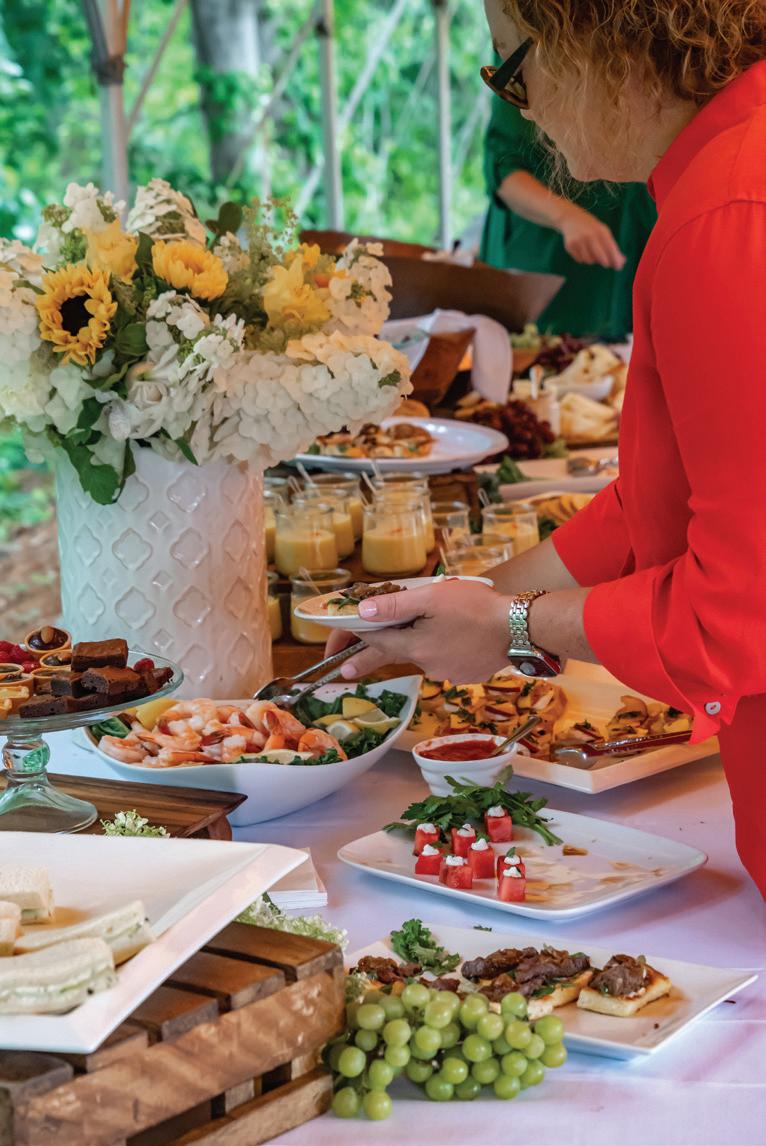
WHAT TO WATCH FOR
OBJECT OF THE GAME. It’s simple: Score as many goals as possible and win by outscoring the opposing team.
PLAYING THE GAME. Because polo involves horses that weigh thousands of pounds, all moving at high speeds toward the same ball, “right-of-way” is the most important concept in the game, and is designed to keep both horse and rider safe.
SEASONAL SCENARIOS
Since matches start in late spring and continue through mid-October, weather conditions can vary dramatically. During the summer months, bug spray, sunscreen with an SPF rating of 30 or higher and plenty of fresh water (and other fluids) are highly recommended. There is no concession stand.
“Setting up a 10-by-10 tent is essential on hot days,” says Campbell. “We often open the back end of the SUV to provide a little extra shade, especially for food set-up and a cooler space for the dogs.”
With the potential of wide temperature swings from the beginning of the polo season to the end, spectators need to be adaptable.
“On cloudy days, either early in the season or late season, it’s good to have an extra jacket in the car for when the wind picks up,” says Campbell. “While Myopia is among the oldest polo clubs in the U.S. and has a long history of traditions, there is flexibility in proper clothing for a polo match.”
The emphasis should be on comfort. Start with polarized sunglasses and the right clothing.
“No one will be out of place with summer dresses for women and lightweight trousers with a linen jacket for men,” says Campbell. “However, polo shirts and khaki shorts are more common.”
Ladies, leave the spiked heels at home, since they’ll sink into the soft turf. Wedges or flats are a better choice, especially when it’s time to stomp divots. Wide-brimmed hats will protect your eyes from the midsummer sun. Baseball caps work for women, men and children, though it’s not unusual to see gentlemen sporting stylish straw fedoras. For added pizzazz, Myopia occasionally hosts hat and tailgating contests during matches. (Visit the Myopia Polo website – MyopiaPolo.org – for details. The annual tailgating contest is set for Sept. 29.)
Of course, you can always put on airs like a Thurston Howell III if you’d like, but it isn’t necessary.
RIGHT-OF-WAY AND RIDING OFF. The rider who is following the ball on its exact line, or who has the least angle to reach the ball and is taking it on the offside without committing a foul, has the right-of-way. A rider can be ridden off the ball. Riding off is also allowed, even if the other player is not playing the ball. But riding off is not allowed if the rider comes in to the other rider at a dangerous angle. When one rider rides off another, they’re not allowed to hit, strike or push off with the hand, forearm, elbow or head, but they are allowed to push off with the upper arm. A rider isn’t allowed to grab another player, their equipment or their horse. A rider is not allowed to weave back and forth in front of another rider, thus forcing the other rider to change the speed at which they’re riding.
CROSSING. A foul will be called if a rider crosses another rider in the right-of-way, if they come close enough to be dangerous, or causes a rider and horse to slow up. A rider in possession of the ball can’t be crossed.
HOOKING STICKS. A rider is allowed to hook another rider’s stick, as long as they and the ball are on the same side of the opponent’s horse and the rider is about to hit the ball. A rider is allowed to hook another rider’s stick if they are directly behind an opponent, but the stick must be below the level of the opposing rider’s shoulder.
STICK MISUSE. A rider may not reach across or under an opposing rider’s horse to hit. A player is not allowed to use a stick in an unsafe way, or in a way that obstructs or hinders another rider or horse. A rider is not allowed to hit the legs of an opposing player’s horse.
BALL OUT OF PLAY. A ball is out of play when it is hit over the boards or sidelines, or is hit over the back line by the opposing team.
STOPPAGE OF PLAY. An umpire will stop play if a rider is hurt or a horse is injured; a rider loses their helmet, provided that no team will gain from a stoppage of play; or a
horse’s equipment becomes damaged, presenting potential danger to other horses or riders. Play is not stopped if a rider falls off their horse and is uninjured.
FOULS AND PENALTIES. Umpires decide the severity of fouls and which penalties are appropriate. One particular foul does not have a specific penalty associated with it. Below are penalties listed in the order of their severity. Team captains are the only players who can discuss issues that arise during a game with an umpire.
PENALTIES. 1) A goal and a penalty 5.b hit is awarded to the fouled team. Given for the most dangerous fouls. 2) A free hit given to the fouled team, taken from 30 yards from the front of the goal. Given for dangerous fouls. 3) A free hit given to the fouled team, taken from 40 yards from the front of the goal. Given for less dangerous fouls. 4) A free hit given to the fouled team, taken from 60 yards out. Given for moderate fouls. 5) Two types of free hits: 5.a from where the ball was fouled and 5.b from the center of the field. This is for mild fouls. 6) A safety, or where the ball is hit from a spot 60 yards from the end line opposite where the ball crossed the end line, but no more than 40 yards from the center of the 60-yard line.
AGENDA

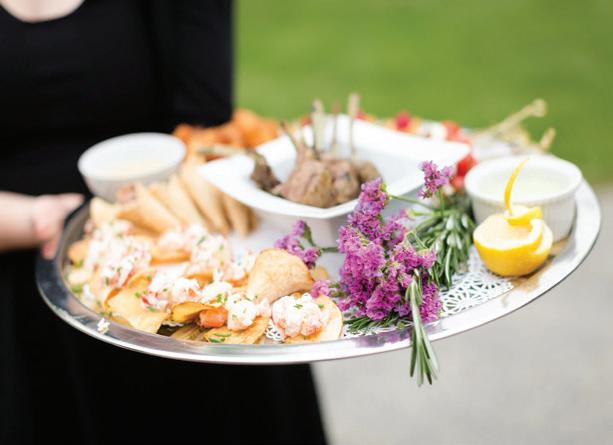
Unique and Fabulous Headwear
Jewels
Portsmouth on the Glitz curates with local, international milliners, jewelers & simply out strolling, at the
“Polo is associated, incorrectly, with the upper class. Polo is for everyone,” says Toothaker. “You don’t have to own a horse or play polo to enjoy it or be part of it.
“Yes, if you tailgate you might be next to a Mercedes Benz SUV with a few people sipping champagne from fluted glasses and eating shrimp cocktail,” he says. “But it’s just as likely the car on the other side is a Honda and those people are eating some deli sandwiches and drinking some local craft beer out of red cups.”
Gibney Field is enormous, with an infamous dip toward the clubhouse. A sturdy chair is advantageous to keep your eye on all the action. Recommended accessories include binoculars and a camera with a telephoto lens.
“I’ve collected pink metal folding chairs and several folding tables, and somehow it all fits in the car,” says Kirsten Alexander of Wenham. “I set the tables with linens, and use vintage tin plates, a silver champagne bucket and a vintage picnic basket. Don’t forget paper towels.”
Spectators should plan on packing out whatever they bring in. Trash bags are a must. And yes, your four-legged friends are welcome, but with restrictions. Dogs are expected to be on a leash at all times. Be sure to bring enough water for them on warm days.
LISTEN UP
Textiles • Bags
While it’s easy to get distracted between the excitement of the match itself and the party atmosphere, spectators can become a student of the game by listening to veteran match announcer Patricia “Trish” Johnstone, a Myopia Polo member. Alexander has attended dozens of matches, and “over time, I’ve learned a lot more about the nuances of the game,” she says.
“The announcers do a great job describing what’s happening on the field,” says Alexander. “The polo ponies are magnificent athletes, and you get a huge rush when they gallop by.”
For Campbell, the primary focus is always about the game.
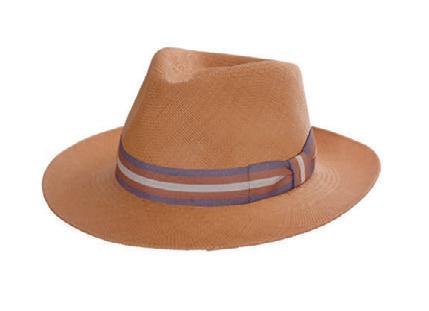
Located in the heart of historic Portsmouth NH., Puttin on the Glitz curates with local, national & international milliners, jewelers & artisans.
“We players love to share the sport and play in front of a crowd, and hopefully the spectators love seeing the beauty of the horses and the skill of the riders playing an ancient sport,” she says. “It’s not about Ralph Lauren, or the British royals or fancy hats. It’s about the horses and team play and sharing what we love.”
Respect the white lines drawn to keep you and your cohorts at a safe distance. Don’t forget, this game features eight large, powerful ponies capable of making the ground shake.
“The first rule of thumb is more about safety than fun,” says Campbell. “Always keep an eye on where the play is, so if the ball is hit in your direction, you can move away quickly. That ball will hurt if you get hit.”
Located in the heart of historic Portsmouth NH., Puttin on the Glitz curates with local, national & international milliners, jewelers & artisans.
jewel and one tilt of a hat, at a time."
Whether simply out strolling, at the beach, at a celebration, derby, polo race or vintage gathering, we offer distinctive headwear, bags & accessories in silk, cashmere & faux fur textiles to suit every person.
There is always something
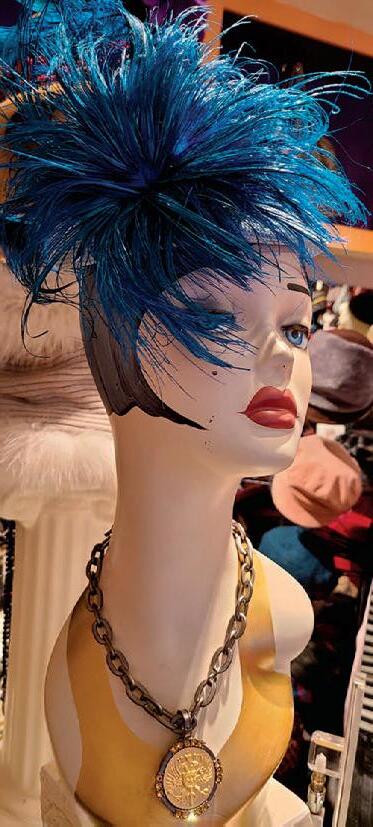
Lizabeth Tompkins
Whether simply out strolling, at the beach, at a celebration, derby, polo race or vintage gathering, we offer distinctive headwear, bags & accessories in silk, cashmere & faux fur textiles to suit every person.
Players and their ponies are typically very approachable, giving fans a chance for a real “hands-on” experience. Just be polite, and respectful. The players and their grooms will let you know if they prefer you keep your distance.
“I love the match itself, but I admit I love the details of the preparation — the horses being groomed, the riders polishing boots, the trailers adorned with saddles, blankets, bridles and everything else that goes along with the days match,” says Toothaker. “And then the traditional pageantry of the introductions, stomping the divots and the camaraderie of a game well played.
“It thrills me to send into the universe ripples of happiness & glimmers of inspiration, one sparkle of a jewel and one tilt of a hat, at a time."
“The match itself is great, but the elements that add the flavor to it all bind it all together in a classy, culturally rich way.”
There is always something new to discover here.
~ Lizabeth Tompkins
jewel and one tilt of
Unique and Fabulous Headwear • Jewels • Textiles • Bags Located in the heart of historic Portsmouth Unique and Fabulous Headwear • Jewels • Textiles • Bags 40 Market St. • Portsmouth, NH 603-436-5600 @puttinontheglitz_nh Located in the heart of historic Portsmouth NH., Puttin on the Glitz curates with local, national & international milliners, jewelers & Whether simply out strolling, at the beach, at a celebration, derby, polo race or vintage gathering, we offer distinctive headwear,
silk, cashmere
textiles
suit
person.
bags & accessories in
& faux fur
to
every
into
universe
of happiness
of inspiration, one sparkle of a
“It thrills me to send
the
ripples
& glimmers
Unique
celebration, derby, polo race
vintage
offer distinctive headwear, accessories
silk, cashmere
faux
suit every person.
new to discover here. ~
and Fabulous • Jewels • Textiles • Bags the heart of historic
beach,
or
we
in
&
to
universe
happiness
inspiration,
sparkle of a
“It thrills me to send into the
ripples of
& glimmers of
one
40 Market St. • Portsmouth, NH
•
•
MYOPIA instagram

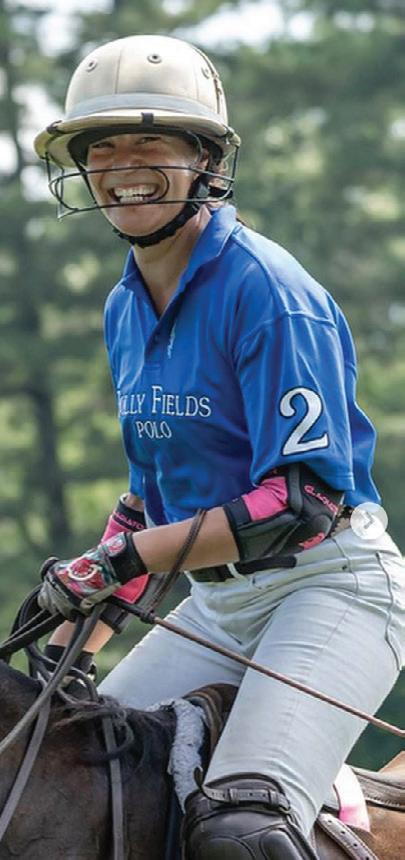
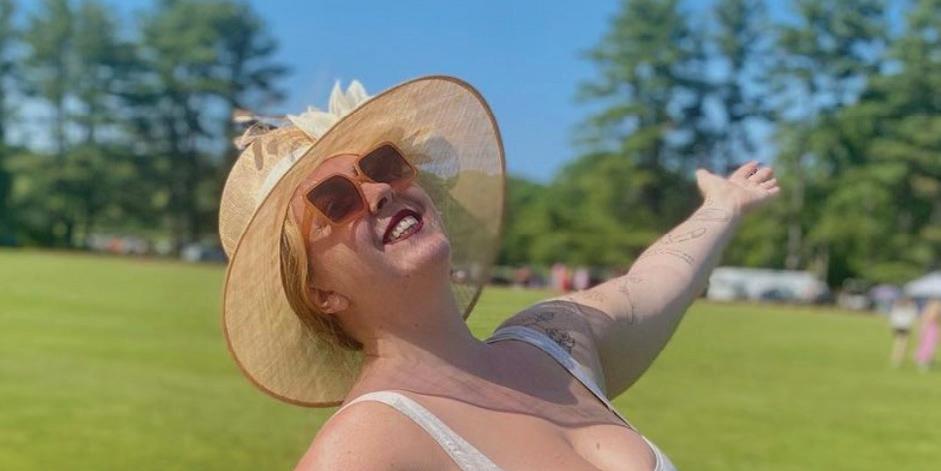
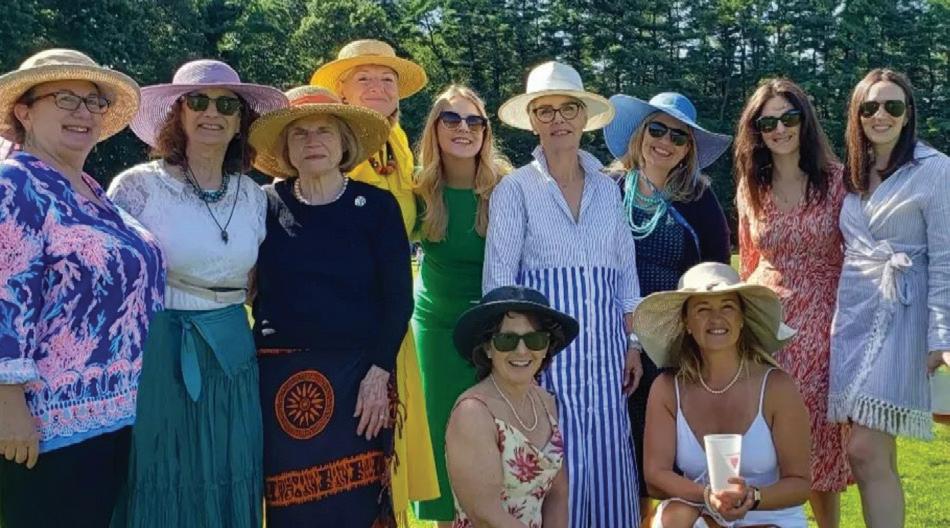
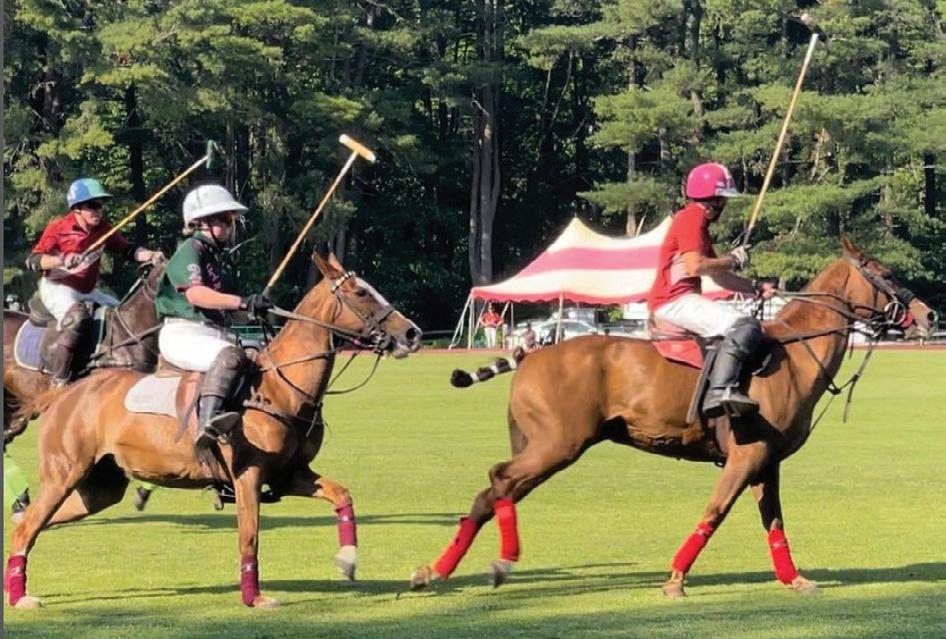
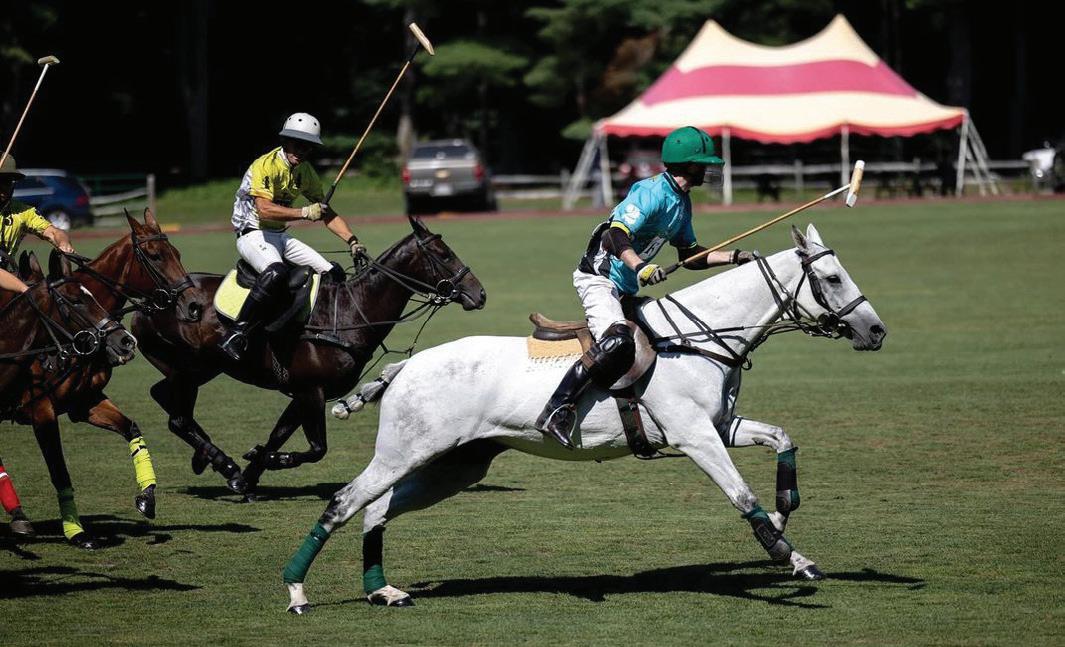
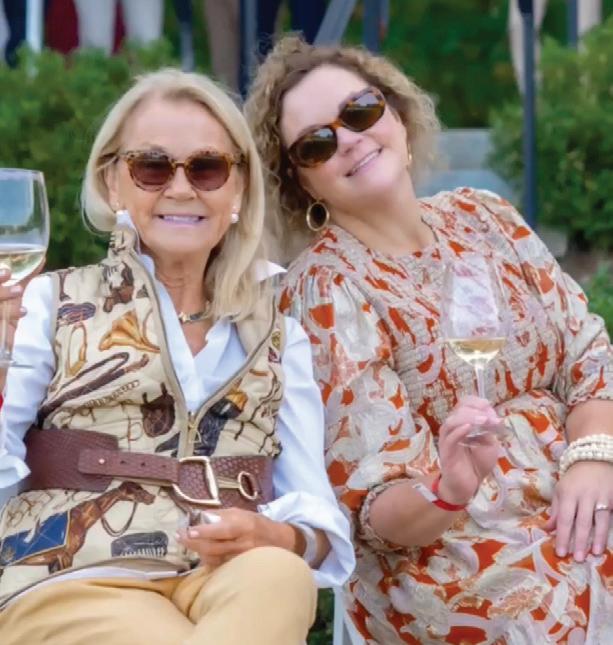
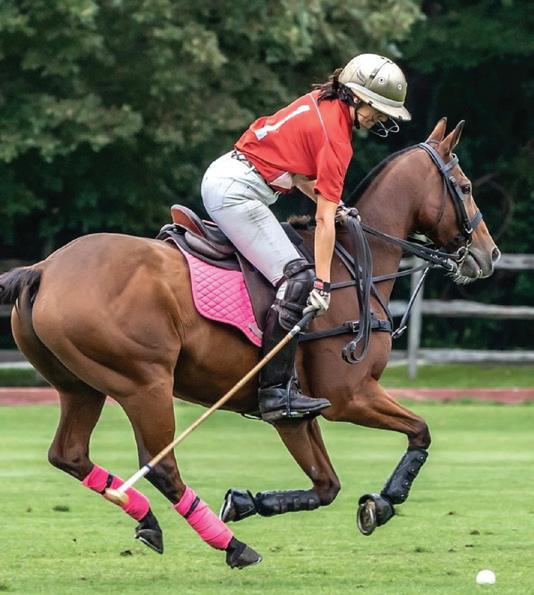
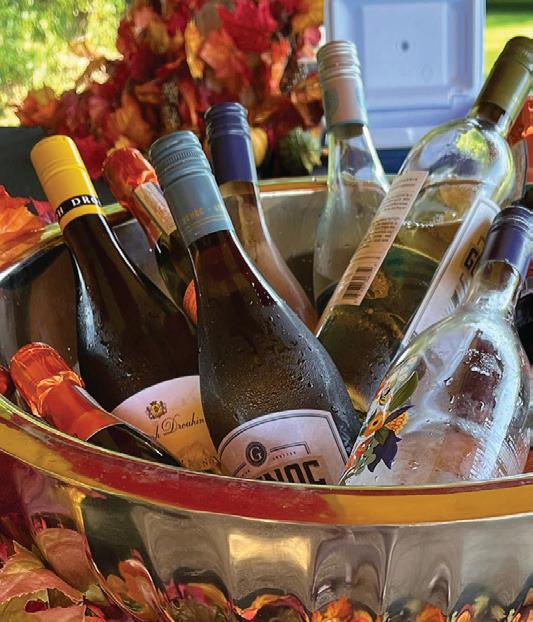
å@dawnferragamophotography
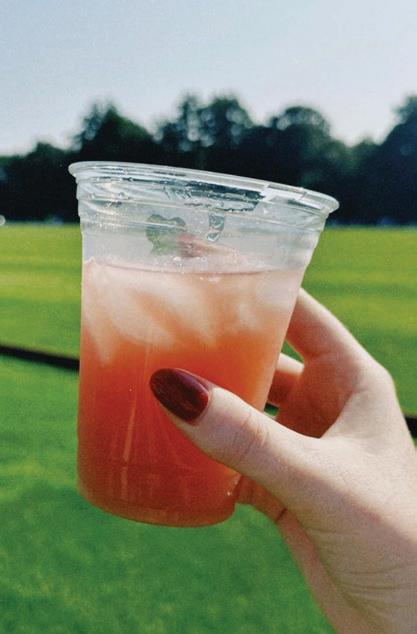
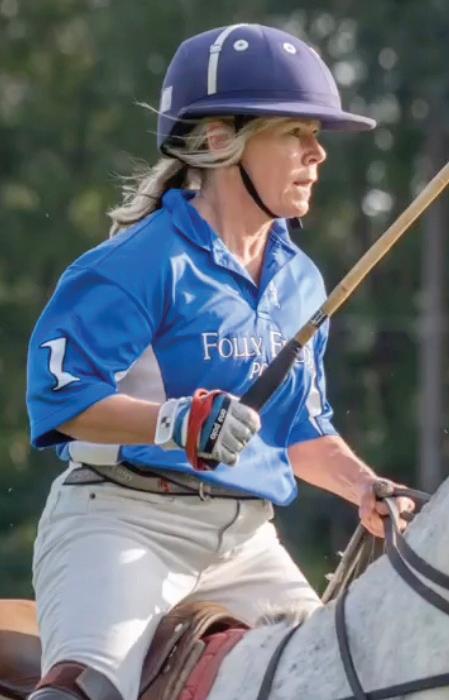
2024 myopia polo 25 #Myopia Polo Shoot it. Share it. Hashtag it.
@jacquelinemillerphoto
@jacquelinemillerphoto
@amrus95
@katrina___e
@tallblondieeats
@bostondames
@jacquelinemillerphoto
@jacquelinemillerphoto
@m.tambone
@ljperettico
STYLE fashion
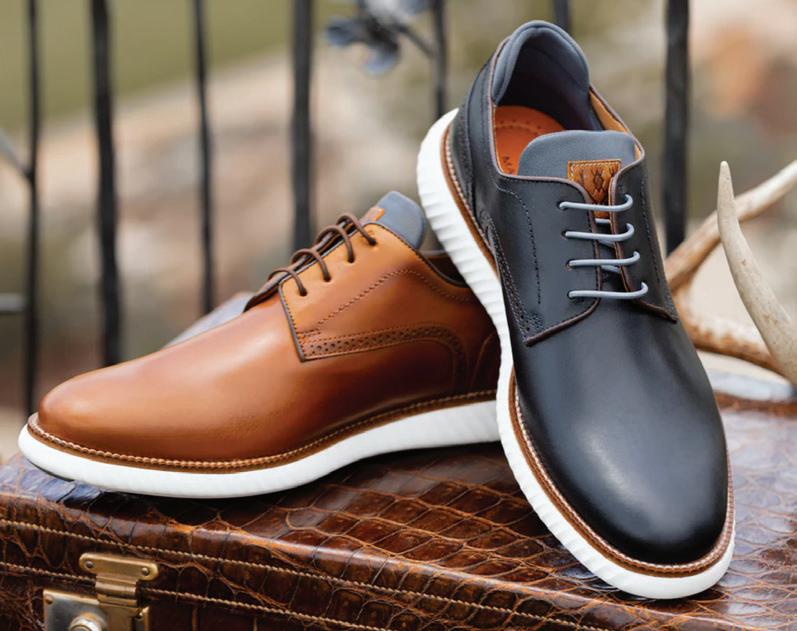
1 The countryaire addle leather plain toe shoe by Martin Dingman – hand-finished saddle leather with a neoprene performance lining makes for easy slip on with non-tie elastic laces. Lightweight and made with an all-season rubber sole.
2 The Blade, by Peter Millar, delivers unwavering comfort and mobility in a modern, casual-sport style. It’s made from an ultra-lightweight Italian performance fabric that delivers four-way stretch, wicking and wrinkle resilience. Where to buy?
Giblees Menswear Danvers, MA (978) 774-4080 • giblees.com
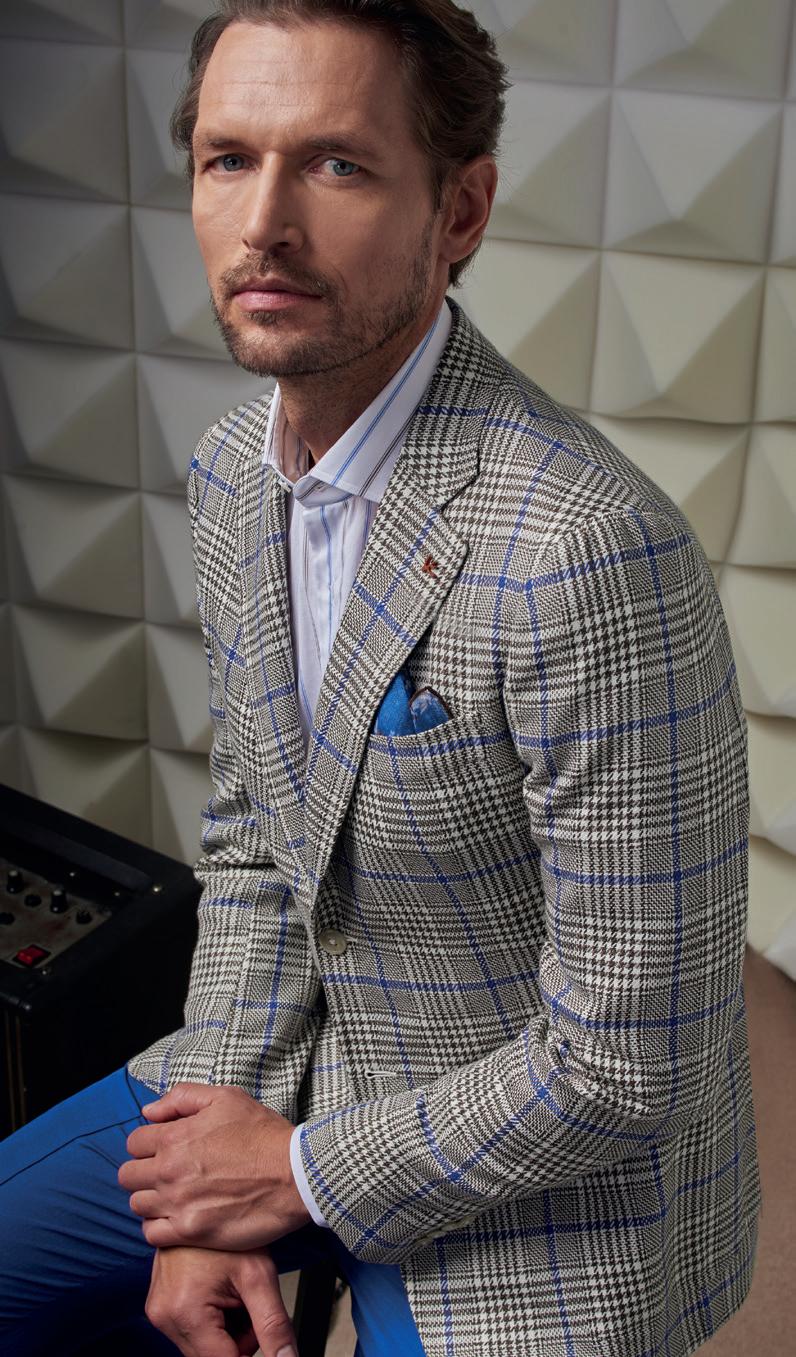
Looking the part
The right apparel and adornments make for a perfect Sunday afternoon look.
Summer fashion at Myopia blends modern color choices with classic pieces. Millennial pink and hues of navy pair with earth tones for an outfit that feels fun but refined. Consider mixing the texture of your pieces: cool linen, smooth leather, course tweed and shining gems. Polo has a rich tradition of summer hats, an
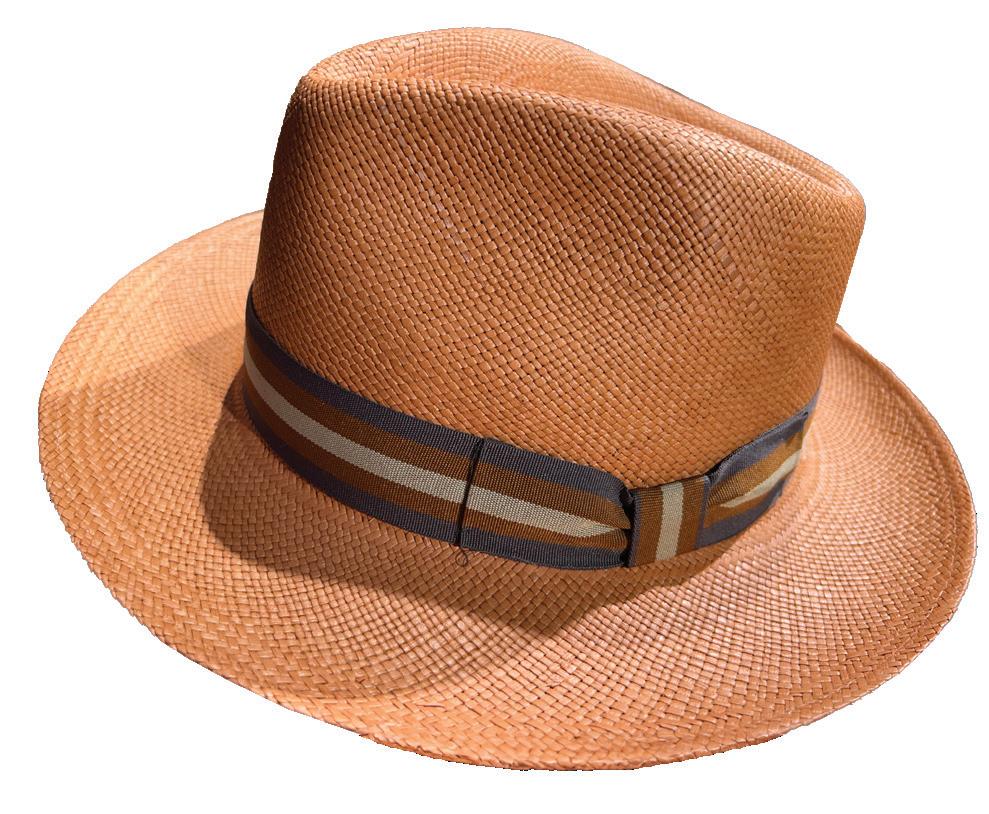
These Panamastyle hats are hand woven by skillfull crafters in Ecuador and are made with authentic Toquilla Straw, one of the finest fibers on Earth.
6 This wide brim flowerpot hat is a great shape that looks good on many face shapes. It is made of hand woven parisisal straw with dyed peacock feathers and a vintage hat band… a truly romantic masterpiece! Where to buy?


Where to buy?
The Kalled Gallery Wolfeboro, NH • (603)
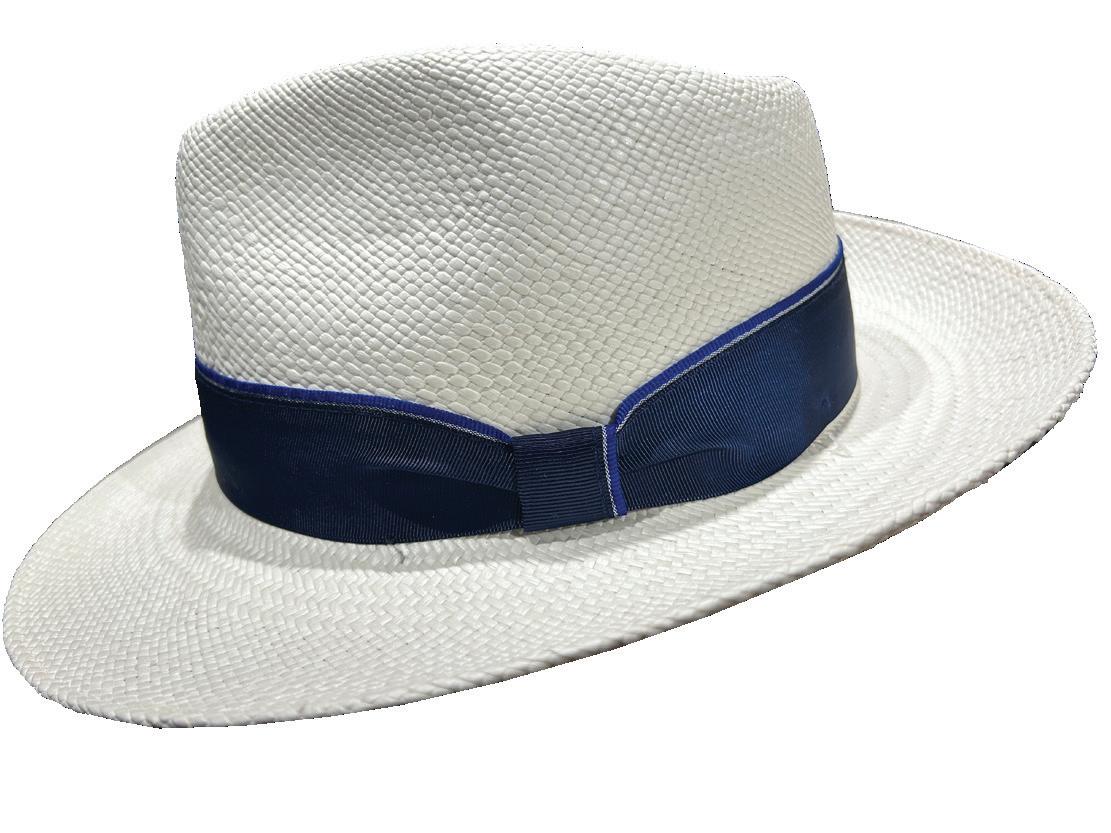
Puttin’ on the Glitz Portsmouth, NH (603) 436-5600 puttinontheglitznh.com
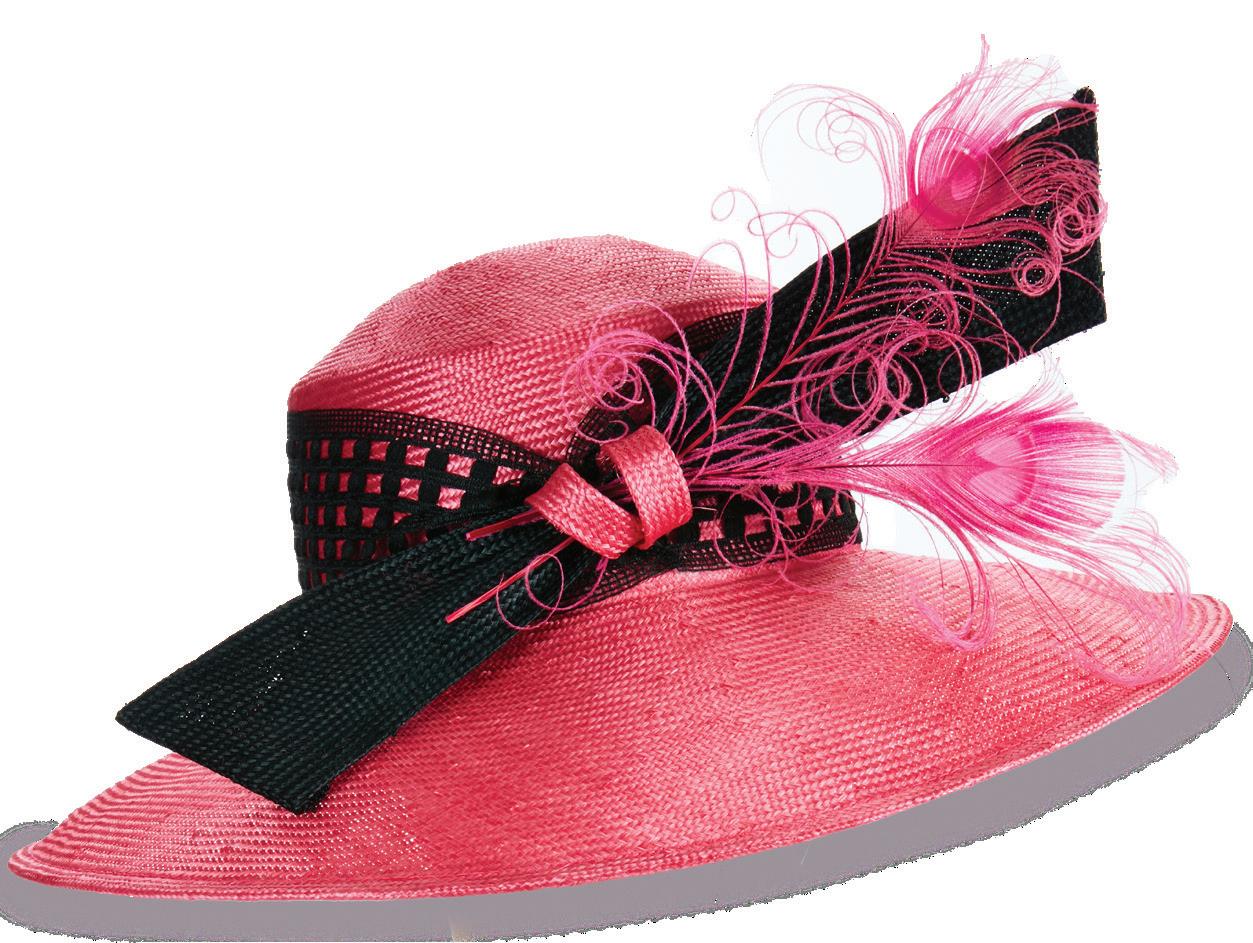
26 myopia polo 2024
Boulder Opal earrings, with ammonite and peridot, in 22k and 18k gold, by Jennifer Kalled.
569-3994
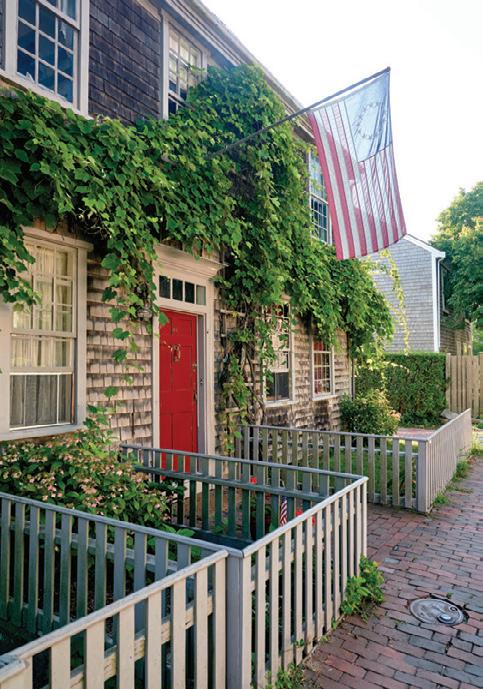
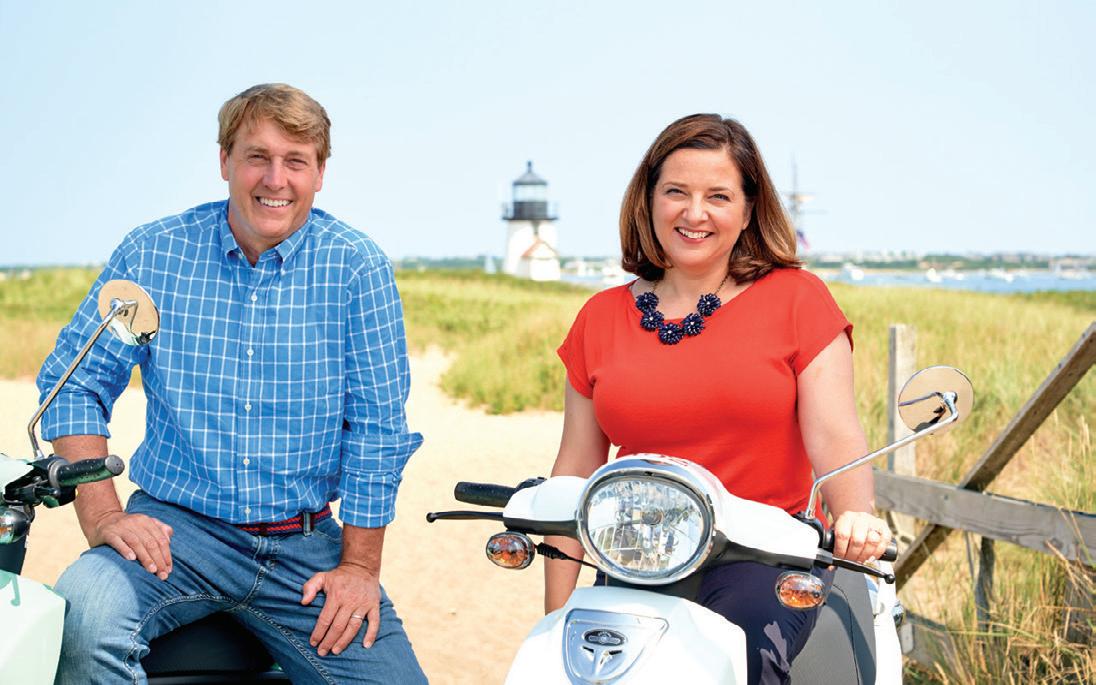
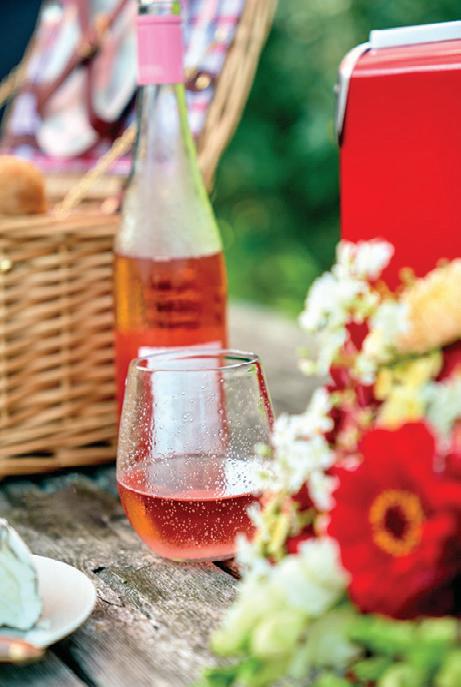

BROUGHT TO YOU BY THE GOOD PEOPLE AT: FUNDED BY: Now Airing on Public Television Stations Nationwide CHECK LOCAL LISTINGS AT WEEKENDSWITHYANKEE.COM CA TC H U P O N E A RL I ER SEASONS ON A N D

MYOPIA scene
Myopia Polo Ball
A Mid-Summer Classic



For more than 40 years, the Myopia Polo Ball has given polo players and members of the Myopia Hunt a chance to dismount and gather together to share a festive evening. The ball was the brainchild of Judith and Donald V. Little Sr., the Myopia Polo captain in the 1970s and ’80s, to expand the club’s world-class polo experience.
According to the Littles’ son, Donald V. “Doo” Little Jr., the early polo balls were typically held the night before the East Coast Open, taking advantage of the players and visitors who came to the club from around the globe, and were lively events from the very beginning.
“The tables had teams intermingled for the camaraderie and sportsmanship that polo always displayed,” says Doo Little. “It was also a big social event, as the dance was open to the socialites of Boston. It was a highlight in Bostonians’ summer schedule.”
The annual ball was the Littles’ “vision to unite the polo players, in the midst of the competitive season, their families, patrons and friends for an evening of celebration,” says Tracy Strouss, the Myopia Polo Ball chairwoman and wife of current polo captain David Strouss.
“Today, Myopia Polo Club continues this annual celebration that has evolved into the social event of the polo season,” she says. “We hope (members) continue to embrace this tradition and create new joy-filled memories at this season’s Myopia Polo Ball.”
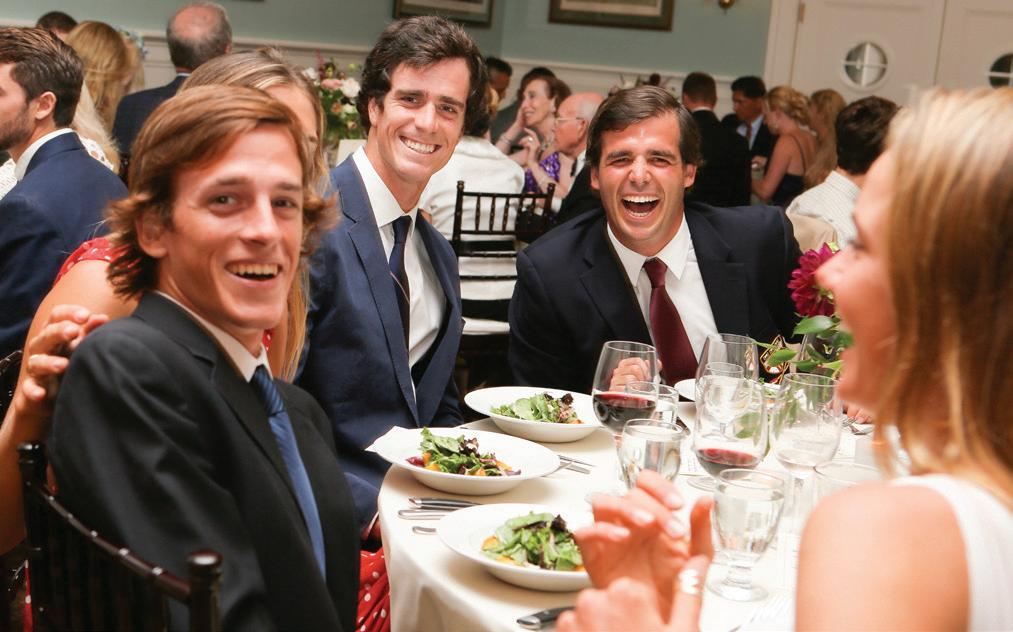
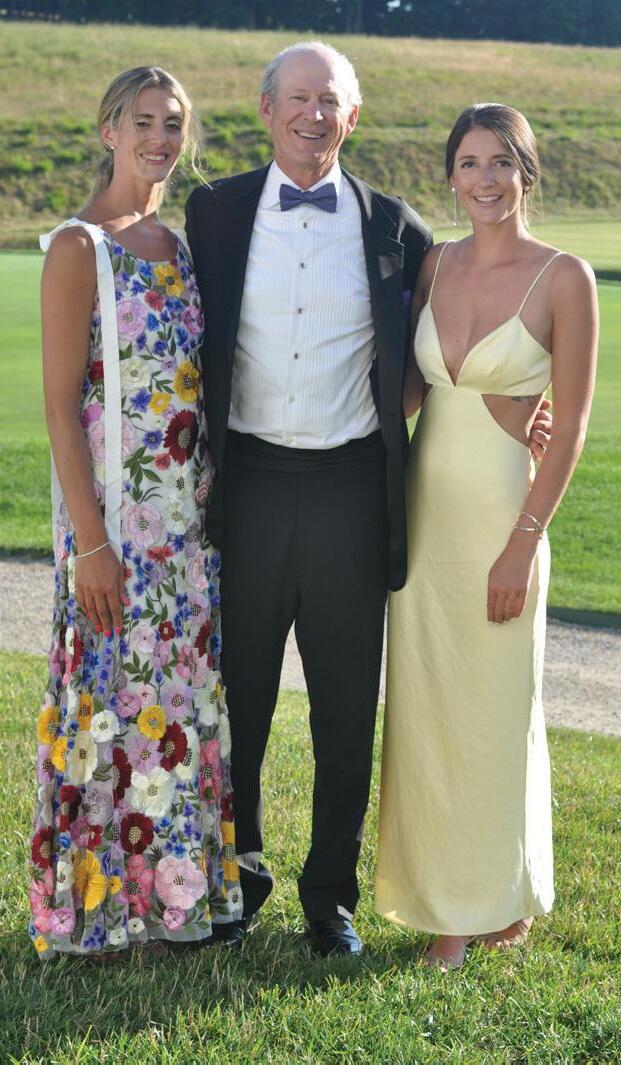
Like a summer wedding with outdoor and indoor spaces, polo ball guests can enjoy cocktails outside before they sit down to a formal dinner. Afterwards, the focus shifts to the dance floor, with a live band performing through the evening.
“It has a nice balance,” says Tracy Strouss. “It is important to me to keep this tradition going and make this investment. It is really important to bring everyone together during the polo season.”
2024 ANNUAL MYOPIA POLO BALL
SATURDAY, JULY 13, PRIOR TO THE HARRISON CUP FINALS ON JULY 14, AT THE MYOPIA POLO CLUB HOUSE.
TICKETS ARE AVAILABLE AT MYOPIAPOLO.ORG. Suggested dress code includes tuxedoes or equestrian formal wear for the men and elegant ball gowns or evening dresses for the ladies.
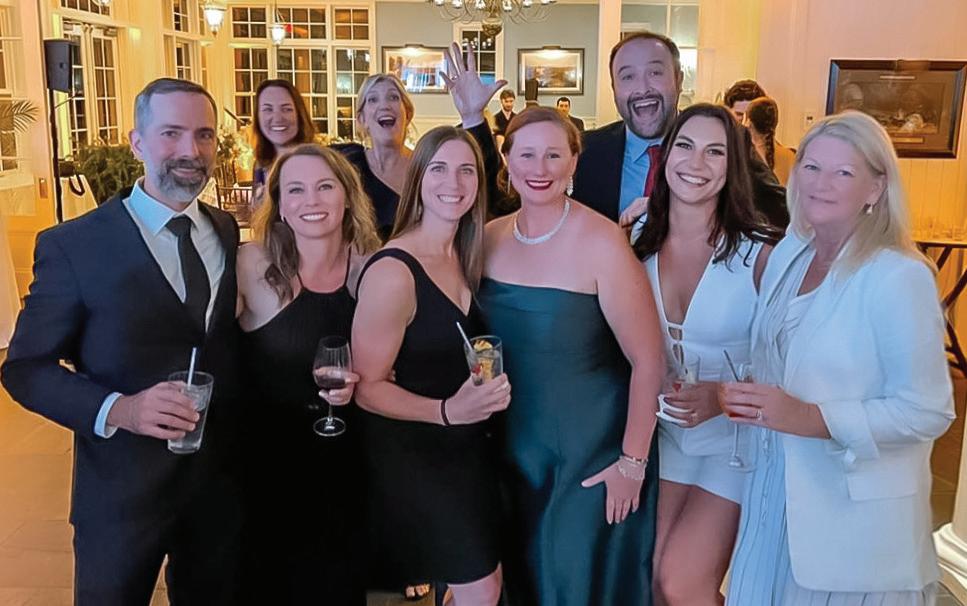
28 myopia polo 2024
Tracy Strouss, Myopia Polo Ball chair.
Scenes from the Myopia Polo Ball from past years.

EQUINE WELFARE COMMITTEE
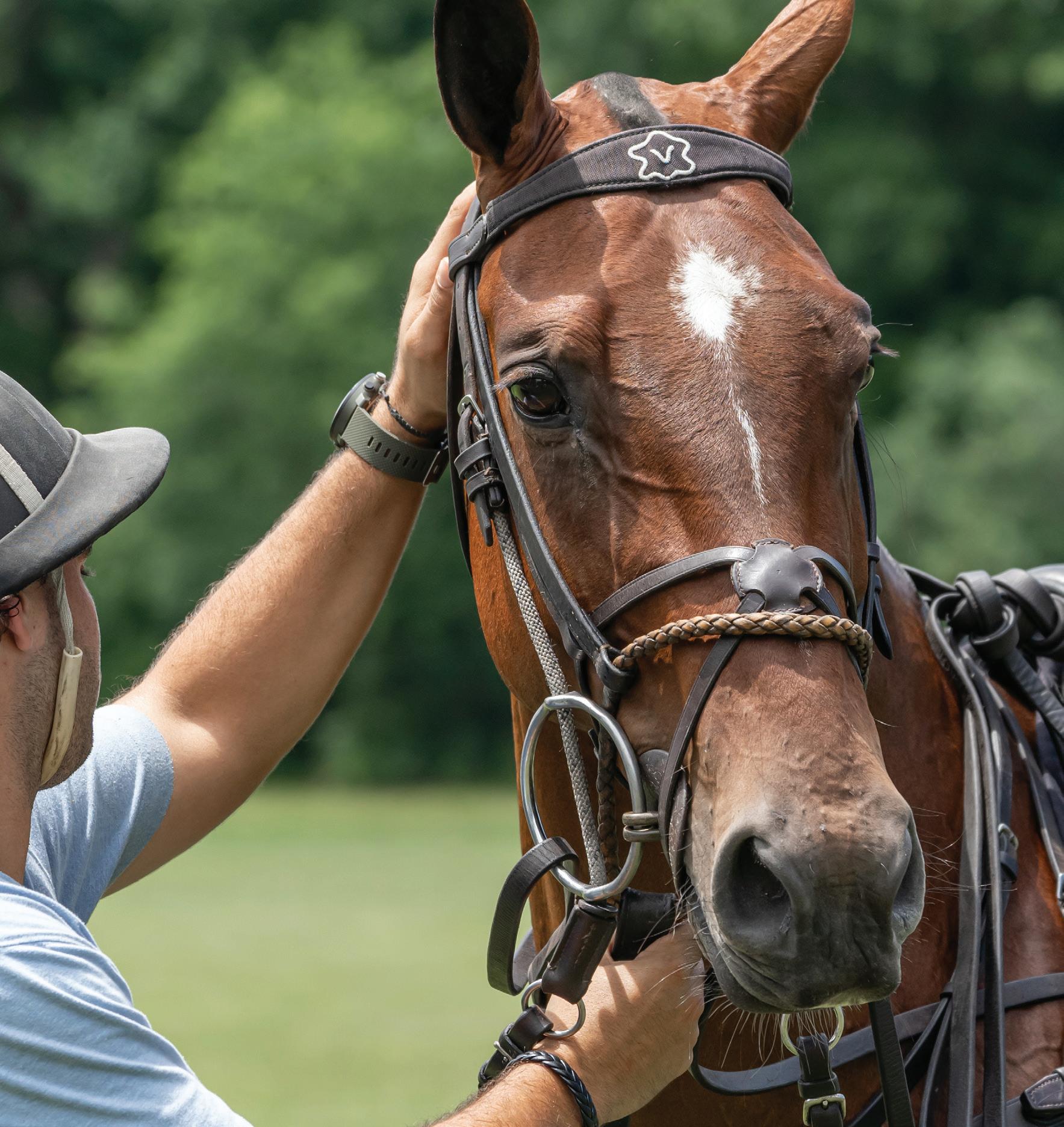
The Importance of Hands-on Care
Ask any polo player, and they’ll tell you that the most important element of the game is their ponies. They recognize these four-legged creatures for the superb athletes they are, and the care they require. For many owners, that means dedicating themselves to hands-on care.
“If you love horses, it’s truly a blessing to have them and care for them,” says longtime Myopia Polo member Patricia Johnstone. “We’re so fortunate to be able to look out our living room window and see them grazing or playing out in the fields in the front yard. It is worth every minute of being with them — working, sweating, playing or just watching them.”
Though well-financed teams can afford a small army of grooms to care for these magnificent mounts, not every player can draw on the same boundless reserves. Many players take great pride in providing more personalized care. That’s particularly true given the very nature of these fabulous animals and the teamwork required to play polo.
“Horses each have unique personalities. Some like a lot of attention and some are more standoffish,” says Myopia Polo member Terri Campbell, who also belongs to Myopia’s Equine Welfare Committee. “You adapt your interaction with the individual horse depending on what they respond to. You build trust with them over time, both while you’re riding and when you’re on the ground caring for them. In comparison to dogs, I think dogs learn to adapt more to you. But with horses, you adapt to them if you want the best outcome.
“The bond with the horses is stronger when you provide your own care to them,” says Campbell. “You interact with them daily and can read them more easily if something is wrong.”
Johnstone agrees, saying the personal touch provided by the owners is essential.
“Each horse has its own personality, shape, size and proclivities, just like humans, and it really makes a difference to be involved in taking care of them yourself,” she says. “These
AGENDA equine care 30 myopia polo 2024
CHAIRMAN Terri Campbell ADVISORY COMMITTEE Dr. Bryan Parrott MYOPIA EQUINE WELFARE MEMBERS C.J. Brown Betty Muise MYOPIA HUNT Wendy Wood
Groom Nico Bai attends to polo pony after a match.
photograph by jacqueline miller
horses are your partners and teammates, and it makes a world of difference to know if they are feeling good or are acting differently from normal. Caring for them as much as you can builds a mutual respect and ability to make decisions for both their and your well-being.”
AROUND-THE-CALENDAR CARE
In addition to the obvious financial investment, polo ponies require a serious time investment. Owning horses, says Myopia Polo member Stephen Burr, “is a significant time commitment if you want them to be playing at a high level. Just like human athletes, they need to be trained and kept fit in order to play well.”
“These horses are your partners and teammates, and it makes a world of difference to know if they are feeling good or are acting differently from normal. Caring for them as much as you can builds a mutual respect and ability to make decisions for both their and your well-being.”
“The relationship is a unique one. At one end, they’re like a friend and you can spend time with them, play with them,” says Burr, who has played at Myopia for the past six years. “At the other end, we ask them to work for us, and polo is basically their job.”
– Terri Campbell
“A lot of horses enjoy the work, but at the end of the day the relationship is one where I’m asking them to do a job and expect a result,” he says. “This usually only happens when there’s a good amount of trust between the horse and rider and a routine so they’re prepared to do the job well.”
Polo, say pony owners, isn’t a sport that anyone can simply dabble in. If not 24/7, it is a 365-days-a-year obligation. “Playing polo is a lifestyle, and not just a sport,” says Campbell. “When the season is over, you still need to take care of the animals.”
“For many years, when I lived and worked in Boston, I paid for boarding my horses on someone else’s farm,” she says. “I was responsible for exercising them, but someone else fed them, cleaned their stalls, and took them in and out to pasture daily. It’s a big job to take care of a string of polo ponies and almost everyone I know has some help to do it.”
“It’s helpful to be at a barn where you can ask questions from more experienced horse owners,” says Campbell. “For someone like me, who didn’t grow up with horses and didn’t start riding until after college, I can’t imagine how difficult it would be to start taking care of horses without the guidance of others.”
OFF-SEASON TO IN-SEASON
In short, there really are no off days when caring for ponies, says Johnstone.
“They do need to be taken care of every day,” she says. “It’s feeding them and cleaning the stalls and paddocks twice a day and providing fresh water. For five horses, it takes about one and a half hours in the morning, including setting up for dinner, and about an hour that evening. Each time, to play and exercise them, plan on at least
three hours.”
During the winter, Johnstone plays in a league at BilleBo Farm in Rowley, owned by Leslie Milne. “We play on Wednesdays and Sundays. In addition, there is a group lesson on Saturdays,” she says. “This keeps the horses moving throughout the winter for their emotional and physical health, not to mention mine.”
Typically, both horses and riders take off the month of April each year.
“Commencing May 1, you start getting them fit again for the upcoming polo season,” says Johnstone. “This is more intense, and typically I participate in the Myopia associates league two days a week, and then play in a tournament per season.
“On average, I’ll ride four to five times a week either at the farm in our outdoor arena or on the Myopia practice fields with one of the visiting pros,” she says. “Then, to relax, I’ll participate in the Myopia Hunt through Thanksgiving. My horses do enjoy the break from polo.”
During the playing season, on days without matches or practices, horses either rest in their pasture or can be ridden in a set (where a rider on one horse holds several others with lead ropes), says Burr.
“This is useful for light exercise as well as some mental stimulation jogging with other horses,” he says. “You can also ‘single’ a horse, which refers to taking one horse out and working on specific things to get them tuned up for the next practice or match.”
GAME DAY
On game days, owners want their horses and tack looking their best, so often the horses get a bath on game day.
“This can include clipping their mane, brushing out their tail, and applying a hoof polish on their hooves,” says Campbell. “All of the tack needs to be in top condition, too. It can take several hours of preparation before even getting to the field.”
According to Burr, most horses spend match day morning relaxing. Then, a few hours prior to game time, they’ll be hosed off to clean them up and cool them off before being transported to the field.
“After the horses have played, they’re once again hosed off, and head back home to be turned out,” he says. Win or lose, all the work can result in a tremendous sense of accomplishment.
“Caring for your own polo ponies is very rewarding, especially when they’re performing really well on the field and the work you’ve put into them ends in a successful product,” says Burr. “Having success with a horse that you’ve cared for yourself, and have built a relationship with, is often more satisfying than one you’re playing for the first time or leasing. You can almost celebrate that horse’s achievements like you would a friend.”
2024 myopia polo 31
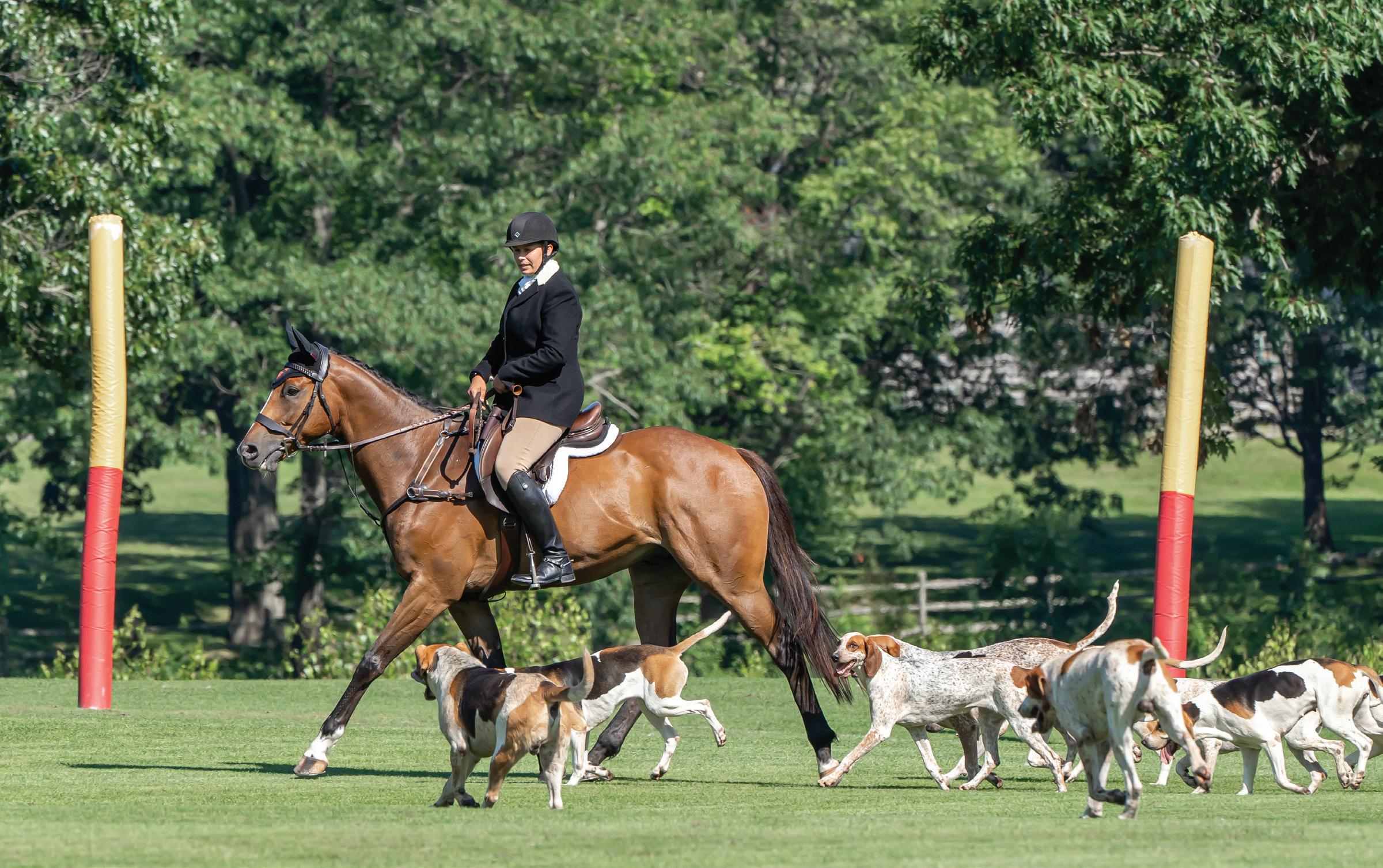
The Myopia Hunt
by Brion O’Connor
Myopia Huntswoman Samantha Stevens , owner of Cedar Tree Stables in Ipswich, knows horses, having ridden “since I was six or seven.” She became familiar with the Myopia Hunt while working for the Colloredo-Mansfeld family at nearby Black Oak Stables.
When longtime Huntsman Phillip Headdon encountered staffing issues, Susanna Colloredo-Mansfeld and her son, Franz, recruited Stevens to whip, “which is basically helping him control the hounds and manage where the hounds are going and to collect up any stray hounds,” she says. “So I said, ‘Sure, why not?’ ”
In the spring of 2023, after two years of whipping under Headdon, Stevens took the reins as huntswoman. Now with a full year under her belt, the 37-year-old Stevens shared a few thoughts on the Myopia Hunt:
Q: WHAT WAS THE ATTRACTION OF BEING HUNTSWOMAN?
A: I really just sort of fell in love with the whole part of the front end of the sport, rather than being in the field part of the sport. I started walking out the hounds with Phillip and learning more about the training and the day-to-day management of the hunt hounds. So, when he announced his retirement, and we didn’t find a suitable candidate, I agreed to step in and see how it went.
Q: DO YOU LIVE ON THE GROUNDS LIKE PHILLIP DID?
A: I’m very lucky because I don’t need to live there. We were able to hire people to help with some behind-the-scenes responsibilities. I have an amazing team supporting me. I have Cherry Victoria, our kennelsman, who’s on-site. He’s in charge of the morning cleaning, evening cleaning, overnight monitoring of the
hounds. He’s the frontman there. I have Devon Sorrentino, who also lives on-site. She’s my second whip and is in charge of helping me walk out the hounds. My responsibility is training, exercising, feeding and medical management of the hounds. I’m the one that does all the grooming. I’m the most touchy-feely of the team, so the hounds look to me for that physical reassurance in stressful situations. Our first whip, Sarah Jacobson, comes down for our big training days. Cherry and Samantha King also do the countryside maintenance, which Phillip was also in charge of. Basically, it’s taking four of us, or five of us, to do one man’s job. That’s how much we lost with Phillip.
Q: DOES IT TAKE THE HOUNDS A WHILE TO ADJUST TO A NEW HUNTSMAN?
A: It was really lovely that I took over in March and Phillip didn’t move out until mid-April. The hounds really did look to Philip as their one and only huntsman. He was the only thing that mattered to them. When I stepped in, they were like, “Hey, you used to be the authoritarian. Why are you now the food lady?” It was
32 myopia polo 2024
MYOPIA hunt club
photograph by jacqueline miller
Myopia Huntswoman Samantha Stevens leads the club’s hounds on an outing.
great to have Philip there, to answer questions, and troubleshoot stuff and to be my training wheels. He still is. He was able to critique as we were going through our daily walks. He was able to help me learn their personalities from a different side, because I’ve always seen them from the backside. I had to learn them from the front side, their faces and how to manage their personalities in a drawing them forward.
Q : WHAT IS IT THAT MAKES THE MYOPIA HUNT SO SPECIAL?
A: One of the amazing parts about Myopia is that it’s a very inclusive community. We’ve had a great success combining polo players and hunt membership. We have the Danielses. We have CB (Scherer) and his whole family. We have the Snows. We have the ColloredoMansfelds. All of them play polo and also hunt. And polo ponies are so, so adaptable. They can really do a good job in the third and second flight. In the hunt, they don’t necessarily have to jump. They’re usually very well mannered.
Q: HOW DO YOU HOPE TO GROW THE HUNT?
A: We’re working really hard, encouraging people that want to try hunting to contact the masters. We’ve relaxed the dress codes. We have this great resource, called the Hunt Closet, at our master Wendy Woods’ farm. It’s literally a building full of britches and boots and jackets, so no one has to feel that they need to have every piece of attire ready to go. You can borrow it. You can buy it. We can outfit you in about 45 seconds flat with everything you need to show up and feel comfortable and
confident. And as long as your horse is clean and well turned out, we want to see you there. We’re just reminding everybody that if your horse can walk, trot and canter on a trail ride, it can hunt.
Q : WHAT ARE SOME COMMON MISCONCEPTIONS ABOUT THE HUNT?
A: A lot of people feel that the hunt is this balls-to-thewall, crazy fast, out-of-control jumping everything experience. And it totally can be that, if you want it to be. But the hunt is divided into three fields. You have the first flight, or the first field, where they gallop along and jump all the jumps. If it’s chaos you want, that’s where you want to be. Second flight is a bit more moderately paced. You’ll expect to walk, trot, canter. Maybe do a little galloping. There are jumps that you can jump, or there are jumps that you can gap, or go around. Then your hill-topping field, which is your third flight, will usually walk, trot and lope. That’s where you start. All the horses start in the third flight, and then as you gain confidence, and your horse gains confidence, then you can move up to wherever you want to be. And some people start at third flight, and that’s where they’re happy and they enjoy the social atmosphere. They enjoy the camaraderie. We work really hard to make sure that each leader, or fieldmaster, for each of the fields knows the territory that they’re in, so that they can help advise the people following them.
Q: DO THE HOUNDS JOIN EACH FLIGHT?
A: The hounds are always
with the hunt staff, and that’s independent of all the flights. Basically, the hounds are always working in the woods, away from the people riding, because we don’t ever want the hounds under or in the way of the riders. So, when I lay the line for the hounds, or where I pick the hounds are going to go, I keep them as far away from the riding people as I can. But everyone can see them and hear them working in the woods.
Q: CAN YOU COMMENT ON THE HUNT’S HISTORICAL SIGNIFICANCE?
A: The Hunt has been here for hundreds of years, and the landowners and the benefactors of the Hunt have done so, so much to keep open space open. Susanna ColloredoMansfeld started the ECTA (Essex County Trail Association) and has been a trailblazer on open space preservation, along with the Donovans, who’ve done a lot to maintain spaces like Sagamore Hill and Blueberry Hill. If you look back to the first people who started thinking about open spaces, it was the people that hunted. Bradley Palmer, when he passed away, literally put in his deed that (his estate) was to be maintained for hunting. Willowdale is also maintained, not for fox hunting, but for the exercising of animals. All of these major families — the Appletons, the Sears — same thing. I wasn’t part of that generation, but here I am continuing to perpetuate this idea of maintaining these open spaces for equestrian activities, mountain biking activities, walking activities. The beautiful thing about the drag hunt is that we can work around all
these other activities and be as unobtrusive as possible so we all can still enjoy the open space.
Q: WHAT ARE SOME OF THE BIGGEST CHALLENGES OF MAINTAINING THE HUNT?
A: Our biggest challenge is appealing to new membership. We’ve worked really hard last year to expand the number of people willing to come out and try. We held true hound exercises, which are a quieter summer activity; it’s a walk/ trot in the Myopia Schooling Fields with hounds. We were able to get up to almost 40 participants. And they just wanted to come and try it. They were scared to come hunting. We’re hoping to create a better retention of those people. We did a lot with social media and a lot with advertising telling people, “Hey, it’s going to be fun.” We want you to have fun. We’re just hoping to keep building on that this year
Q: WHAT’S THE MOST SPECIAL ASPECT OF THE HUNT FOR YOU?
A: It’s seeing the culmination of so many different parts of my life come together in one really fun activity. I’ve been a lifelong horse person, a lifelong dog person, so getting to combine my love with the countryside and my love of horses and this wonderful pack of hounds, it’s really created a very fun brain activity for me. And getting to see people enjoy the countryside — I’m the first one to say I’m learning too, and that makes it a little bit more approachable for new people. It makes it really feel like it’s coming from a learning space for me, that I’m challenging myself.
2024 myopia polo 33
The USPA
More than 130 years of innovation, inclusion and tradition
Polo is generally considered the oldest team sport in known history, dating back thousands of years. The innovations of the past century, however, have transformed it into the fast-paced, exciting game we recognize today. What was once a contest with eight or more players galloping up and down the field for the better part of an afternoon has evolved into a focused, precise sport that highlights horsemanship, physical prowess and intricate team play.
Much of the credit for that organizational progression — at least in the United States — should be given to the United States Polo Association (USPA).
Over dinner in New York City in 1890, H.L. Herbert, John Cowdin and Thomas Hitchcock formally created the Polo Association, now known as the USPA. The group was made up of seven clubs and was headquartered in New York. One hundred handicaps were assigned to members, including future President Teddy Roosevelt. Herbert was elected chairman — a post he would hold for the next 31 years.
“The USPA, our governing body, was developed as an old boys’ club,” Leighton S. Jordan, USPA Northeastern Circuit governor, told Myopia members when he visited the club in 2021. “In the 1890s, players realized they needed an organization to set the governing rules of play.
“This newly formed group funded the USPA management when it was short of cash,” said Jordan. “They did what they had to do to keep the sport alive. Over time, they assigned circuit governors to help manage the sport across the country. They all put their own funds in to oversee the sport.”
The first U.S. Open Championship was played in 1904, and the legendary American team that would become known as the Big Four — Harry Payne Whitney, Devereux Milburn, and Larry and Monty Waterbury — defeated England to win the
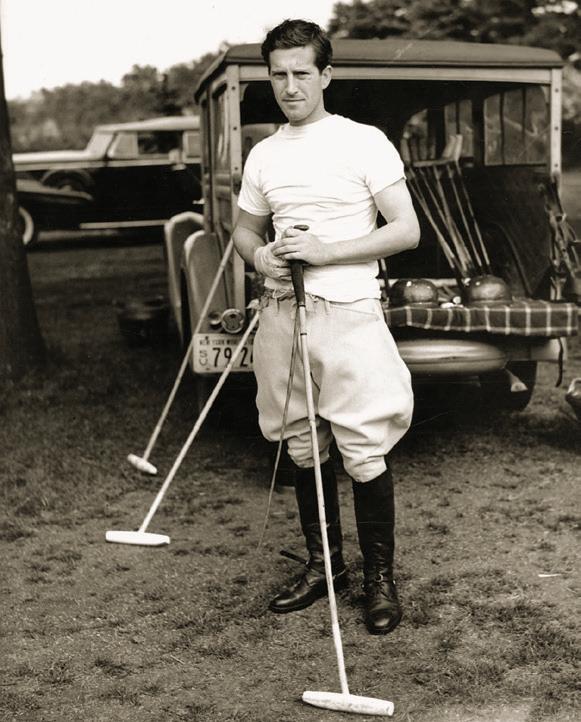
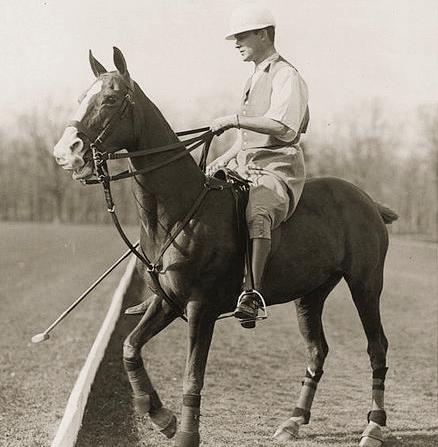
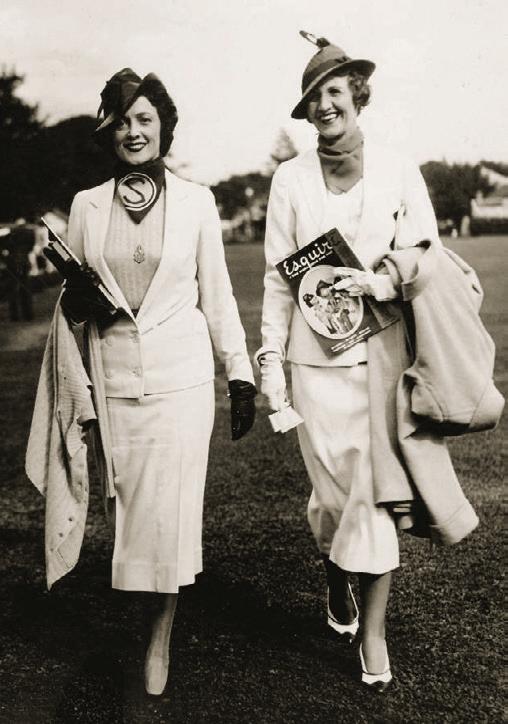


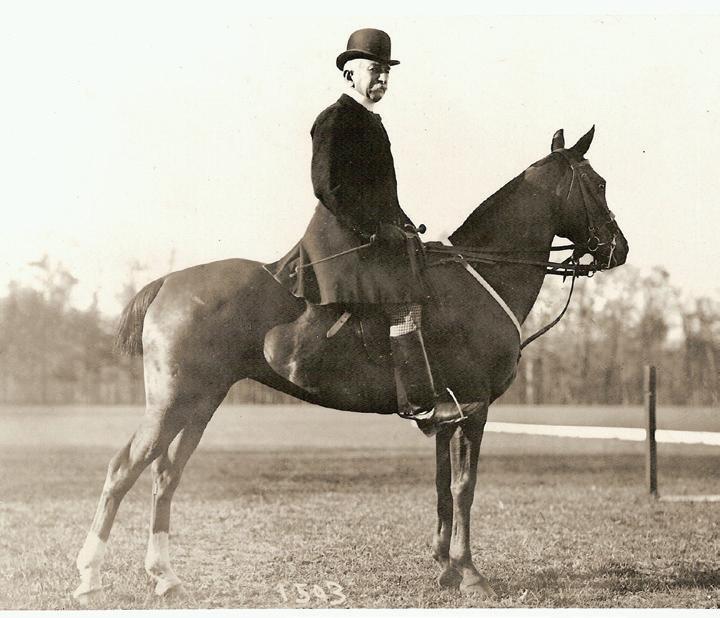
34 myopia polo 2024 u.s. polo association
HISTORY
Clockwise, from top left: Stuart Iglehart, Meadow Brook Club, 1939; Marjorie LeBoutillier, Bostwick Field, 1935; Pacific Coast Open, 1929; H.L. Herbert, the first chairman of the USPA; Mary Duncan Sanford and Babs Tyrrell-Martin, Westchester Cup, 1939; James “Monty” Waterbury, US Open, 1904.
Westchester Cup.
Under the USPA’s guidance, the sport grew in popularity throughout the U.S., expanding south and west. In the 1920s, crowds of more than 35,000 gathered to watch major tournaments, and players began numbering their jerseys 1 through 4 to designate their position and role. According to the Museum of Polo and Hall of Fame, there was an annual need for more than 63,000 polo ponies during this era.
Women began making their mark in the sport during the 1930s, as Cornell fielded an intercollegiate women’s team, and a group of Army officers’ wives formed the Whippettes. The Pacific Women’s Polo Association was formed in 1934. Women now comprise 40% of the USPA’s membership.
The 1940s saw the growth of the sport slow, with record-keeping suspended during World War II. The sport’s recovery took hold over the next 20 years, as the popularity of Arena Polo grew and a surge in the top ranks set the stage for expansion. The fashion world adopted the polo image, high-goal polo was recognized as one of the fastest-moving and exciting spectator sports in the world, and the Palm Beach Polo and Country Club opened in 1979, becoming the foremost center for international high-goal polo. In the 1980s, USPA membership reached an all-time high.
As the millennium drew to a close, the USPA evolves from an all-volunteer organization to one employing a full administrative and executive staff. Broadcasting and streaming tournaments, using drones and instant replay, have all become a normal part of this traditional sport. Today, the USPA includes nearly 300 member clubs in 13 geographic circuits around the United States and oversees 40 national tournaments.
“The USPA’s aim is to provide support to the clubs,” said Jordan. “Not how to manage the clubs or how to grow players. They tried this for years, and it did not work. They now recognize that they must find ways to help the clubs do what they do best.”
THE CYRIL R. HARRISON MEMORIAL TROPHY
A look at the prize awarded at the annual tournament
The Harrison Cup celebrates one of the most talented, and most tragic, players to grace the club’s historic polo grounds. Considered among the country’s finest polo players in the 1920s and ‘30s, and a pioneering polo instructor with the United States Polo Association, Cyril Harrison came to Myopia in 1958 as the club professional and immediately made an impact.
“He was a great guy, a really great guy,” says Peter Poor, a longtime Myopia Polo member. “Cyril came up and whipped everybody into shape.”
At the tender age of 23, Harrison achieved a 7-goal handicap. In 1928, the New Yorker magazine identified him as “polo’s rising star.” Harrison was known for his exquisite hitting style and smart, competitive team play. But his enduring gift to polo was teaching and encouraging others to play. He
organized polo schools for young players throughout the country, becoming one of the USPA’s first instructors of the modern game.
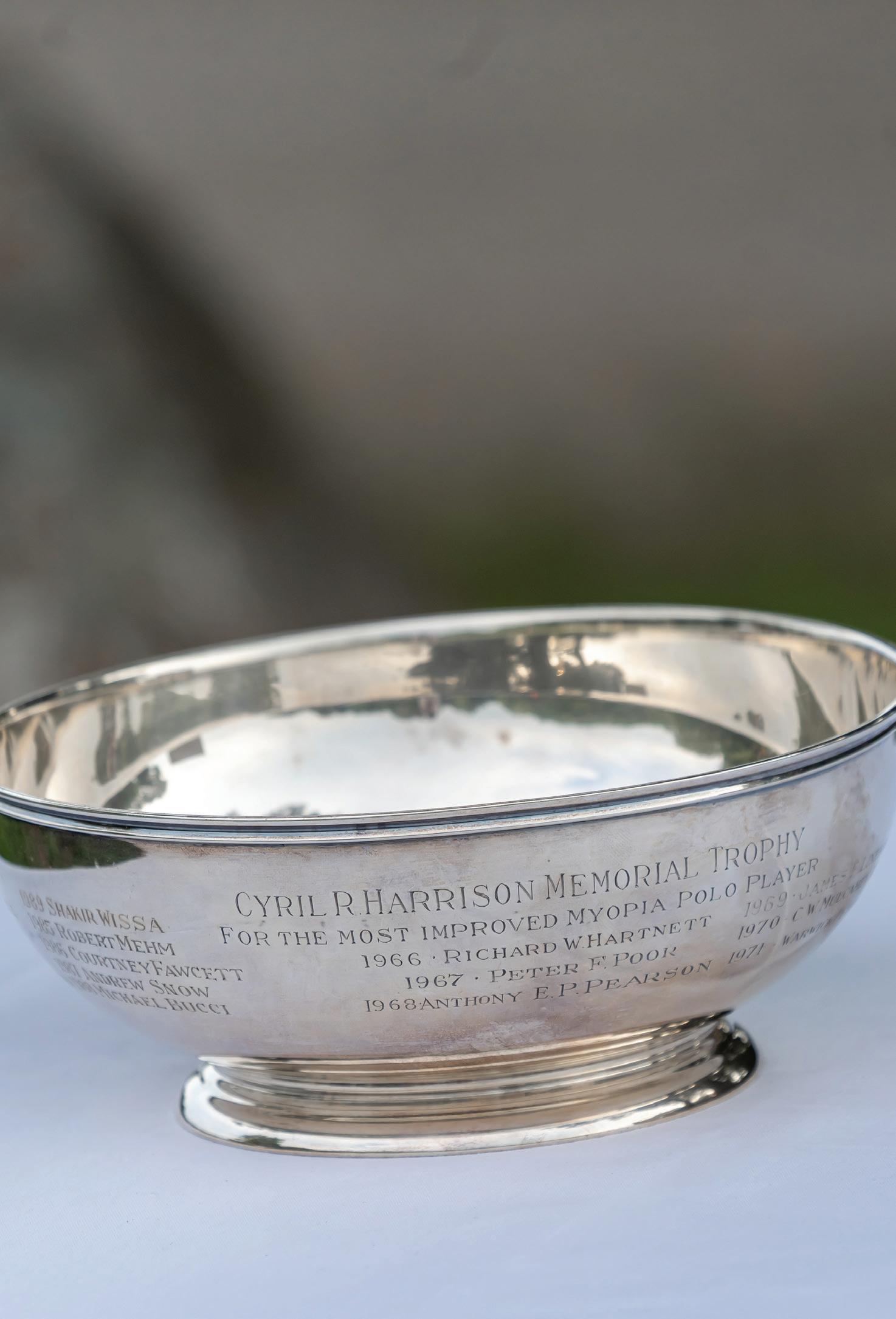
“Cyril was an unbelievable teacher and an unbelievable man. For a couple of years, he took me under his wing,” says Poor. “He had as much influence as my dad did for those four years that I had with him. So, I fell in love with polo and with seeing it grow and trying to talk people into playing.”
Sadly, Harrison suffered a fatal heart attack while playing at Myopia’s arena in early September, 1965. He was only 56. At the 31st annual Museum of Polo’s Awards Gala on Feb. 14, 2020, Harrison was inducted posthumously into the museum’s Hall of Fame. The Harrison Cup has been played in his honor at Myopia Polo Club every summer since 1966.
2024 myopia polo 35
achievement
Photograph by Jacqueline Miller
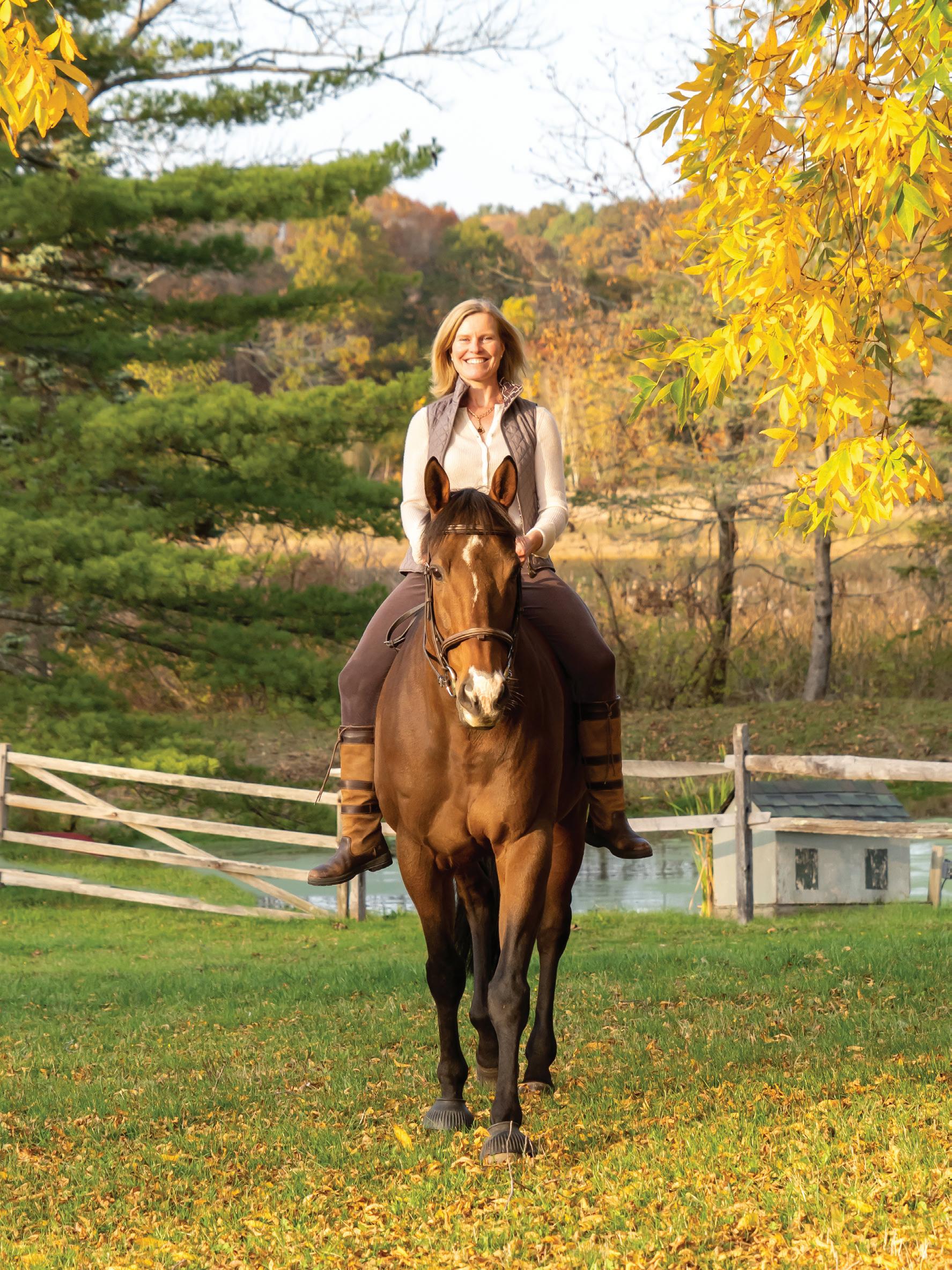
JACQUELINE MILLER PHOTOGRAPHY JacquelineMillerPhoto.com ••• Equestrian Sports | Horse & Rider | Pet Portraits | Wildlife Prints
Learning to Play
OPPORTUNITIES
A Family Affair GENERATIONS OF POLO PLAYERS DEFINE MYOPIA / PAGE 44
2023 Tournament Recap
RESULTS FROM AN EXCITING SEASON / PAGE 52 photograph
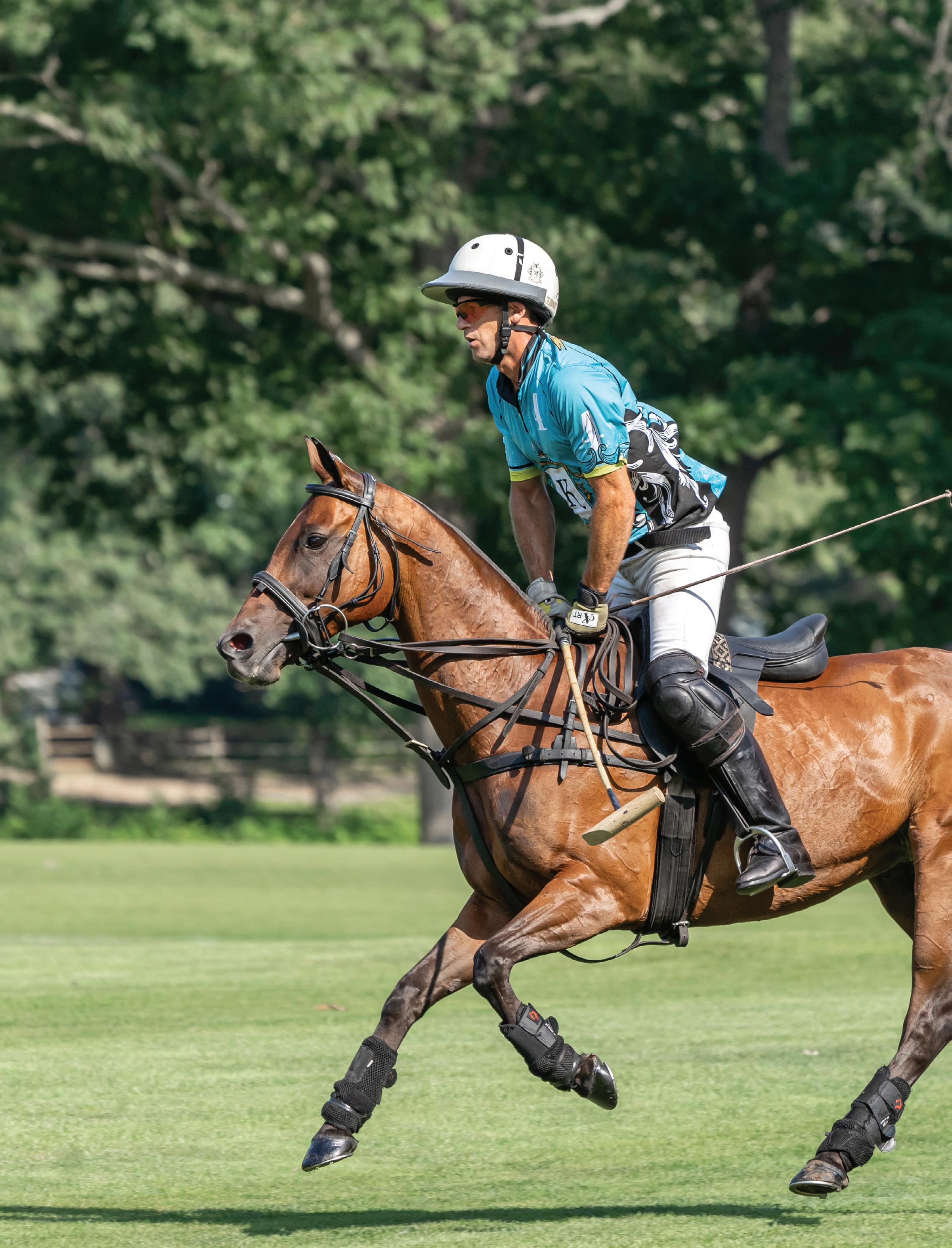

FOR THOSE WHO WANT TO TRY POLO / PAGE 38
by jacqueline miller
Federico Wulff during Tuckerman Cup
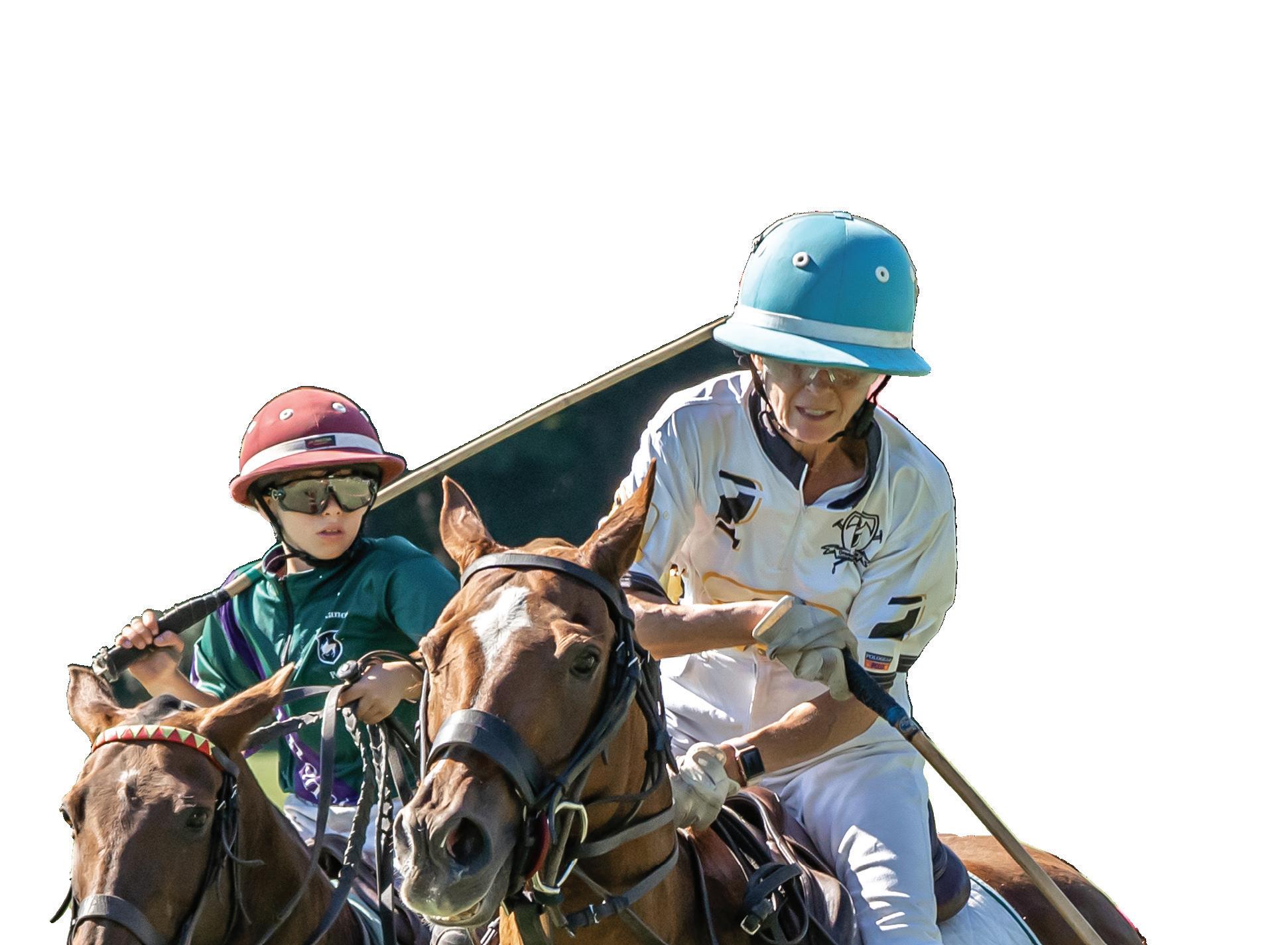
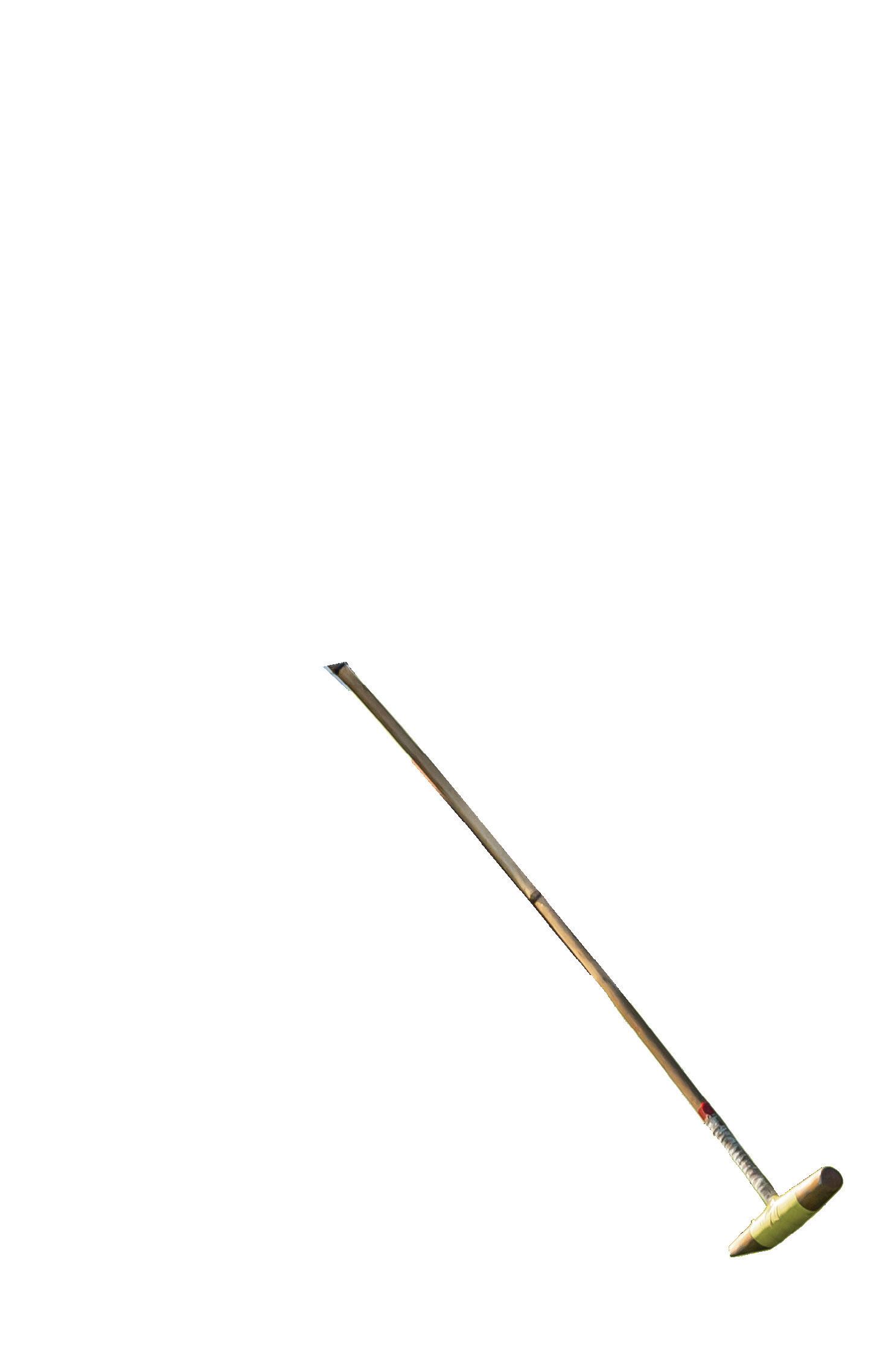
THERE’S A WAY WHERE THERE’S A WILL,
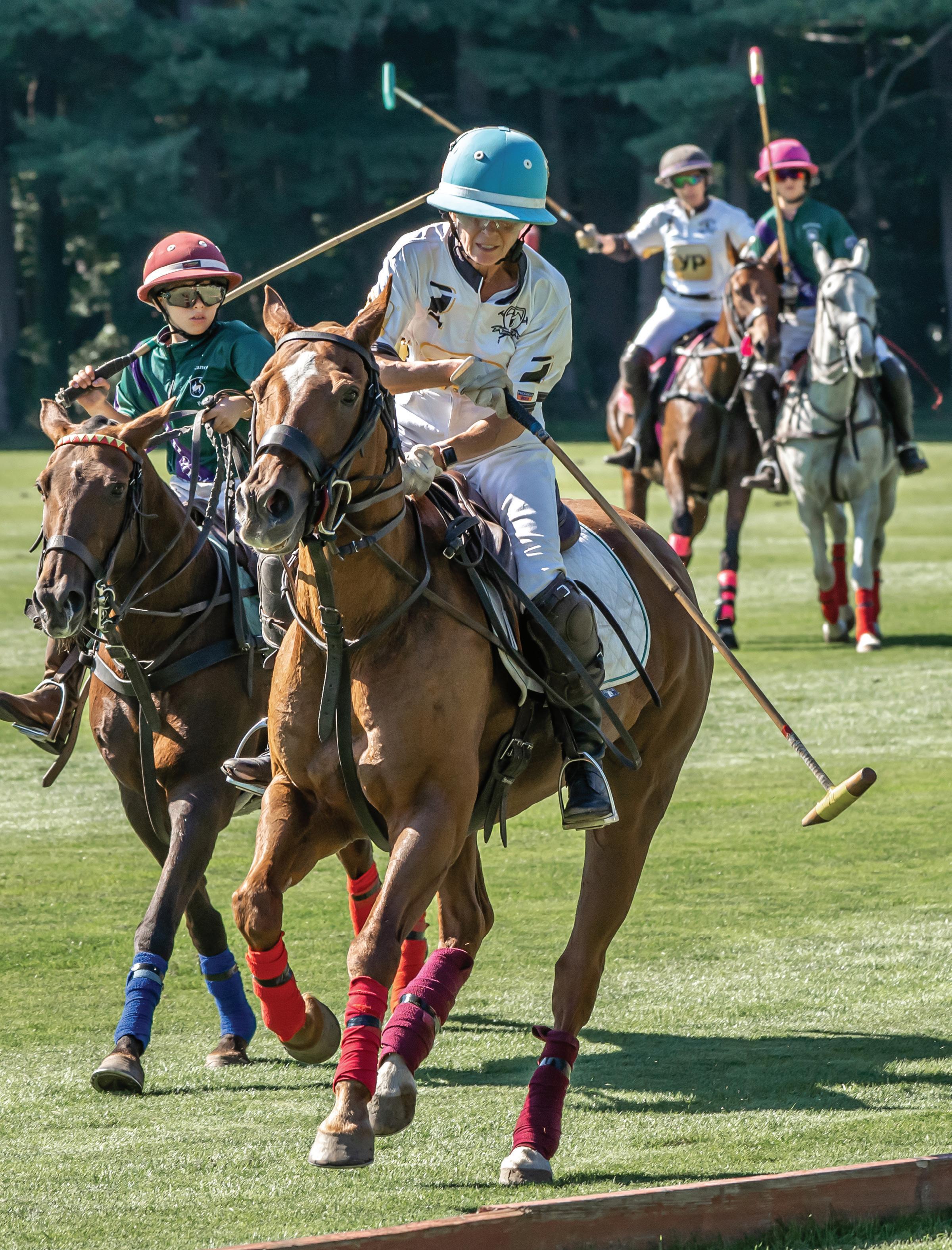
THOSE WHO WANT TO TRY POLO HAVE NUMEROUS OPPORTUNITIES
38 myopia polo 2024
Francoise Martinolle, foreground, and a young Robin Reyes on Gibney Field.
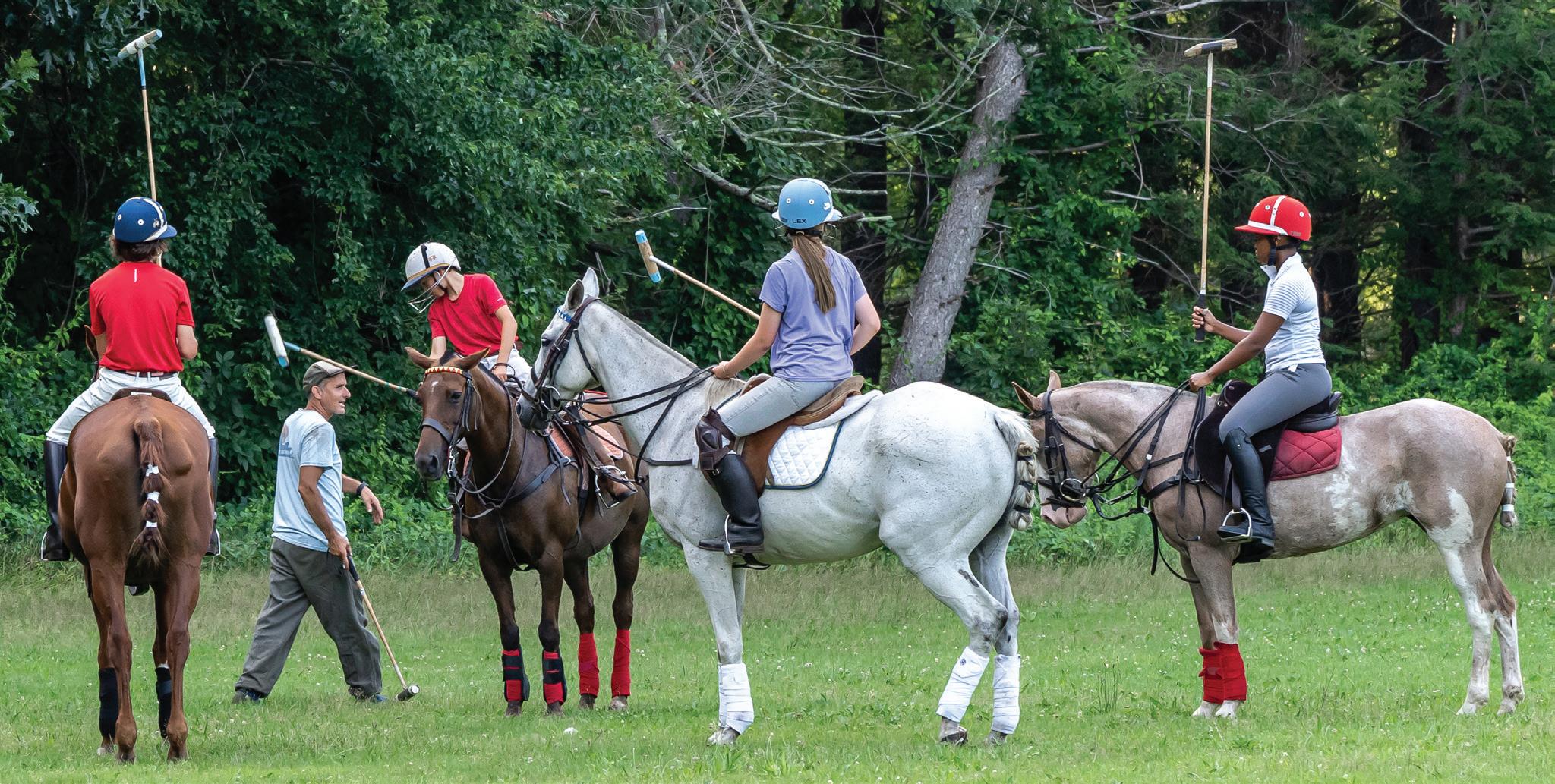 by Brion O’Connor
by Brion O’Connor
Right or wrong, polo has long been considered the private playground of the rich. Often, the very rich. After all, polo has been tagged with the moniker “The Sport of Kings,” though it shares that sobriquet with other sports, notably horse racing. And, during Myopia Polo’s first half-century, the matches were in fact dominated by some of the wealthiest, and most influential, members of Boston high society.
But, as Bob Dylan reminded us 60 years ago, the times they are a changin’. Though the sport is readily available to those with deep pockets and ample free time, the barriers to entry are becoming more manageable.
“To me, polo feels more accessible than ever,” says Amanda (Poor) Roberts of West Newbury, a sales analyst for EBSCO Information Services in Ipswich. “It is no longer solely a sport for the elite. You can play polo and become a member at Myopia without even having to own horses.”
Roberts knows from firsthand experience. She is the daughter of Peter Poor, a longtime Myopia Polo member who has run Stage Hill Polo School and Club in Newbury for the past 45 years, making it one of the longest continuously running polo schools in the country. As a result, Roberts and her sisters grew up with horses, which is still the most common route to learning the game (see “The Families of Myopia Polo,” page 44).
But, more and more, many of the people attending lessons at Stage Hill have not grown up owning horses. Many have never ridden. It’s no longer a requirement to be born into the sport, says Roberts, who continues to work with her father and sister, Alyson Poor, at Stage Hill.
“I encourage anyone to try polo, no matter where you come from, how old you are, what job you have,” she says. “Polo can be as expensive or as affordable as you make it, within reason. There are many different options, depending on your level, and the level you want to be at.”
Myopia Polo player Lauren Contenta says Stage Hill, which advertises classes for players from age 5 to 70, offers the ideal setting for beginners. “Specifically, Stage Hill Polo is special in a way that they are teaching beginners,” says Contenta. “Anyone and everyone, no matter the age or experience, is welcome to give polo a shot.
“Peter (Poor), the owner of Stage Hill, has three daughters that have been playing polo for their whole lives, and I think that he and his daughters care a lot about the opportunities young (people) have in the sport,” she says. “They gave me the opportunity to play at Myopia with some of the other players based out of their barn. The support and sheer joy they displayed the whole season make it that much more enjoyable.”
Poor’s contributions to the sport, and Myopia specifically, can’t be understated, says Jacek “Yaz” Grotnik, patron of the local Husaria team and manager of the Crimson Interscholastic Polo Team. The name of his father, Jospeh Poor, graces
“I encourage anyone to
try polo,
no matter
where you come from, how old you are,
what job you have. Polo can be as expensive or as affordable as you make it, within reason. There are many different options, depending on your level and the level you want to be at.”
–Amanda (Poor) Roberts, Stage Hill Polo School and Club
INTRO TO POLO 2024 myopia polo 39
BY JACQUELINE MILLER
Instructor Estanislao “Estani” Puch Sr., second from left, details the finer points of polo positioning to his students.
PHOTOGRAPHS
the polo arena alongside the Myopia Schooling Fields, and Peter has played the sport since he was eight. He became a member of the United States Polo Association (USPA) in 1967, and was the USPA Northeastern Circuit Governor for more than 12 years.
“The Poor family was instrumental in reviving polo at Myopia, and Peter has started more players in the game than anyone can count,” says Grotnik. “Stage Hill has been the go-to for beginners for over 40 years. They have the most experience in getting folks started and safely introduced to the game.”
According to Peter Poor, the keys for anyone considering polo are fairly simple: be enthusiastic, be open to learning, and be dedicated. Stage Hill provides almost everything else, including ponies, balls, mallets, helmets (though it’s recommended that you bring your own, for better fit) and professional instruction.
Group beginner lessons at Stage Hill are held every Saturday morning, from spring through the fall. The classes typically start with an overview of the sport, a brief introduction to the rules and game strategy, and instruction on how to hold the mallet and how to make each of the four types of swings. Everyone will have time on a pony to practice and play in a scrimmage.
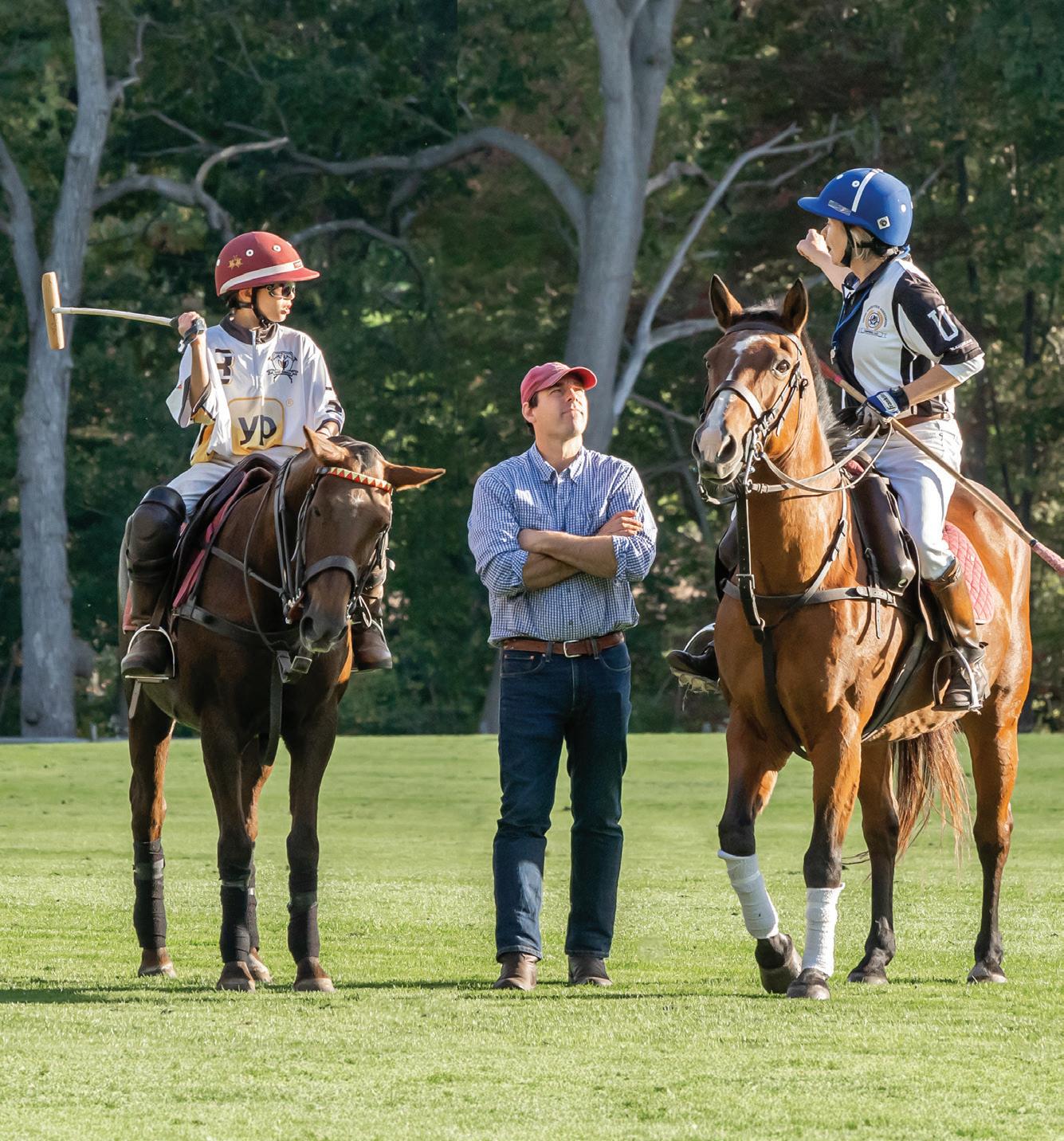
Since there are so many intricacies to the game, sessions start slowly, at a walk or trot, so students can concentrate on building skills.
Stage Hill also operates an “Intermediate Polo Club,” which allows graduates from the beginner lessons to play together. Games are held three times a week, with mid-week games on Tuesday and Thursday in an arena, and Saturday matches held on an open grass field. Again, owning ponies isn’t a requirement.
“All you need is the right attitude,” says Poor. “Just give us a call if you’re interested in learning to play.”
A perfect example is Patricia Johnstone, the “voice of Myopia Polo” who announces the Sunday afternoon matches at Gibney Field. Roughly 10 years ago, Johnstone acted on an urge to try polo, nudged by having a discount coupon.
“I started playing polo at the age of 48, after using a Groupon deal from Stage Hill Polo with Peter,” says Johnstone. “It was amazing, and I was immediately hooked.”
Though Johnstone had partial ownership of two horses at the time, she had no polo playing experience. Stage Hill addressed all of her needs and concerns.
“As part of Stage Hill Polo, I was introduced to Myopia Polo and have played there since,” says Johnstone, a regular in the Myopia Coaching League. “It was a great way to progress and grow in this amazing sport.”
Likewise, Dr. Leslie Milne of Gloucester was also a latecomer to the sport. But once she decided to try it, she was all in. An emergency room doctor at Mass General Hospital, Milne currently plays at Myopia and has her own polo farm, BillyBo Farm in Rowley (which hosts winter polo sessions for Stage Hill).
“I liked the team aspect of polo as opposed to the individual riding I did as a child,” says Milne. “Now I really appreciate the horses. They have a very hard job to do, and I respect their bravery.”
Milne credits local coaches Cissie Snow and Phoebe Ingram with streamlining her entry into the sport, as well as the Myopia Coaching League, which “allows beginners to play at a less competitive level than regular Myopia.”
“I have stayed in the Coaching League as it is more relaxed and less formal than regular club polo,” she says. “I just want to have fun with my horses and the other players. That’s my only aspiration in polo.”
The Myopia Coaching League, coupled with the club’s interscholastic program, is essential to keeping the sport vibrant and viable, says Franz ColloredoMansfeld, a former Myopia polo captain.
“Successful programs need to constantly recruit new players,” says Colloredo-Mansfeld, adding that beginners should “find a club with an active program at all levels of the sport.”
“Myopia, for example, has a very good program for new players,” he says. “There are dedicated
40 myopia polo 2024
Umpire Phoebe Ingram, right, explains a ruling to Robin Reyes, center, and his son Robin, left, during the Last Chukker Cup at Gibney Field last October.
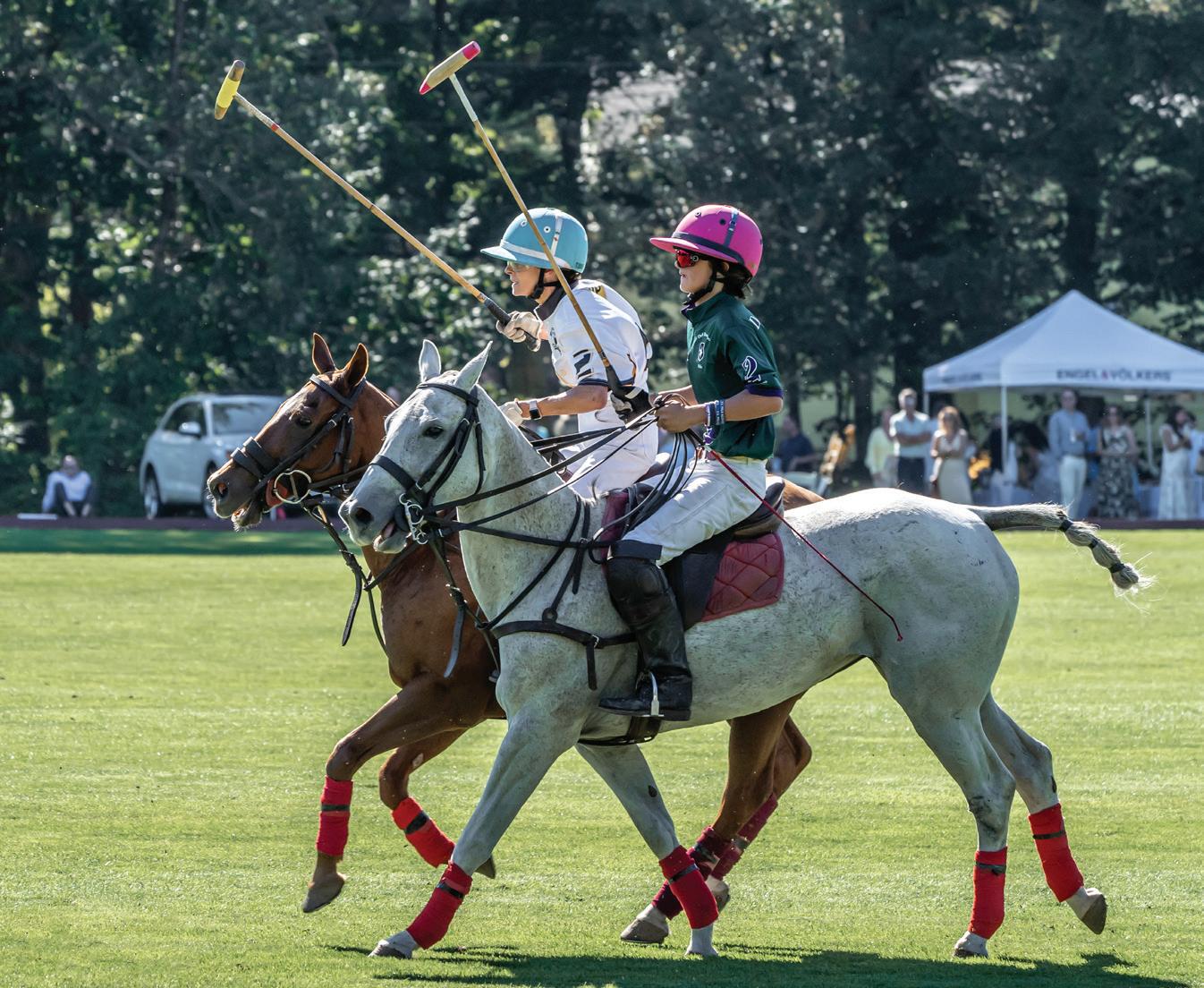
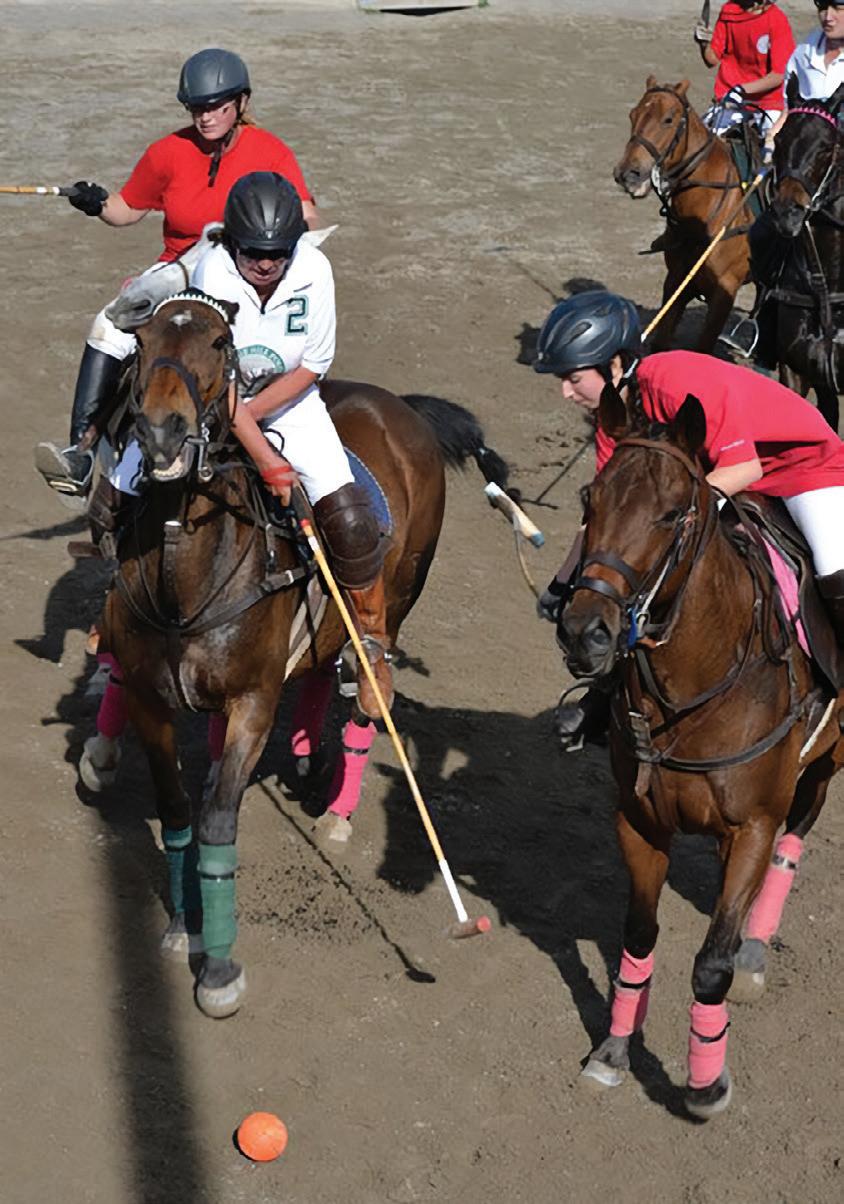
professionals looking to provide advice and coaching. If you love horses and team sports, polo is the game for you.”
Estanislao “Estani” Puch Sr. is the guiding hand behind the Myopia Coaching League. A 49-year-old professional player and instructor originally from Argentina, Puch provides private and group lessons as well as training sessions through the Coaching League for players 11 and older, from beginner to intermediate levels.
“In general, what I recommend (for beginners) is to find a professional instructor who has the
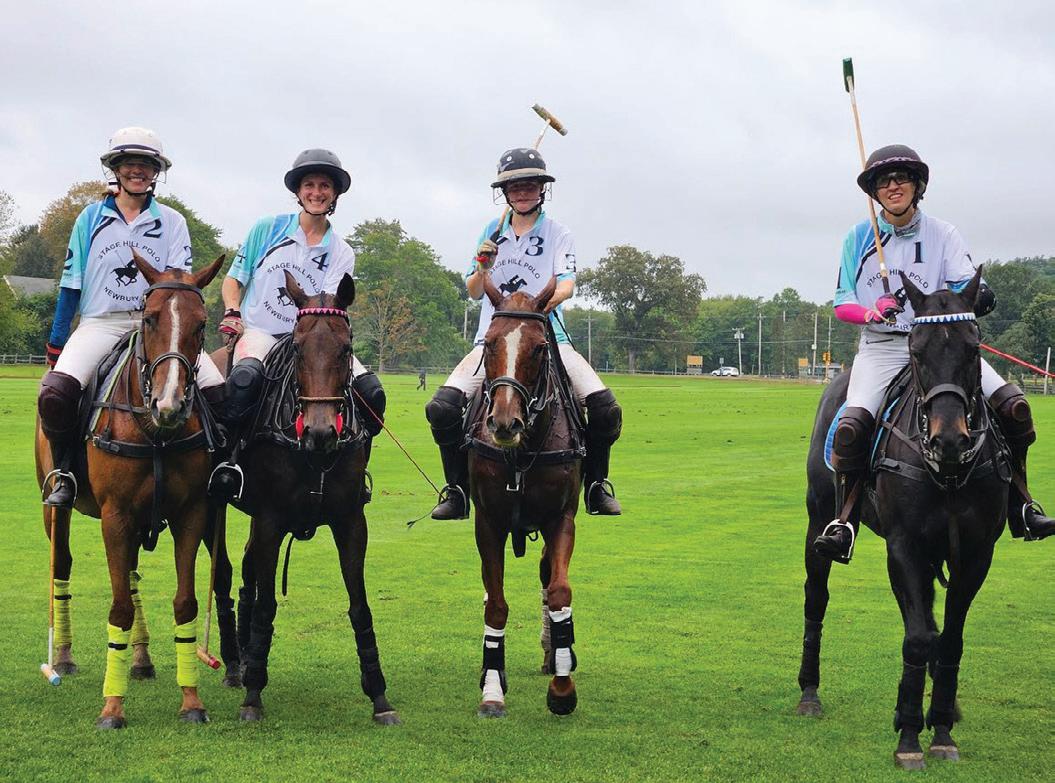
experience with beginners and the right horses, which are, at the end of the day, your legs,” says Puch. “Try to spend as much time riding as you can. This will make everything easier.
“The Myopia Coaching League runs from June to October, and it is super accessible to join,” he says. “The coaching league is a super welcoming program, where we have players of all ages working in their skills and, most importantly, having fun the whole summer.”
In addition to Stage Hill and Myopia, there are other options close by, including the Georgetown-based Boston Polo Club and Kingswood Polo in Kensington, NH. Still, as Poor, Milne and others readily acknowledge, the commitment needed to play polo is significant for newcomers to the sport.
“You need to have your own horse, or have a reliable, affordable way to access a horse,” says Milne. “Owning a horse is a big financial commitment. This is a big ‘ask’ if you haven’t ever played the sport and don’t even know if you’ll like it. Plus, polo is very time-consuming. Going to the barn, getting your horses ready to travel, transporting on a trailer, tacking, playing, cooling-off, and then heading back to the barn. Start to finish it’s a 4to 5-hour process to play for 30 to 40 minutes. You have to enjoy the process, or have someone who does that work for you.”
Myopia Polo member Terri Campbell was first introduced to polo while attending Cornell University, and learned to play polo at Stage Hill Polo. “It was an economical way to learn the sport because the horses are provided as part of the cost,” she says. “When you get to the point when you buy your own horse is when you really start to get committed.”
The key, say experienced players, is to saddle up as often as possible. The more you ride, and play, the better prepared you’ll be if and when you decide to purchase horses. And players will tell you the most rewarding aspect of polo is the relationships they develop with their ponies.
Top left, Francoise Martinolle, left, and Drew Carleton race for position at Gibney Field.
Top right, the Stage Hill Polo team – Amelia Caflish, Amanda (Poor) Roberts, Isabel Poniatowski, and Elizabeth “Liz” Sawicki – prepare for a match.
2024 myopia polo 41
Bottom, participants in the Stage Hill Polo program compete at Myopia’s Joseph Poor Memorial Arena.
TO POLO
INTRO
Photograph by Kim P Brynn
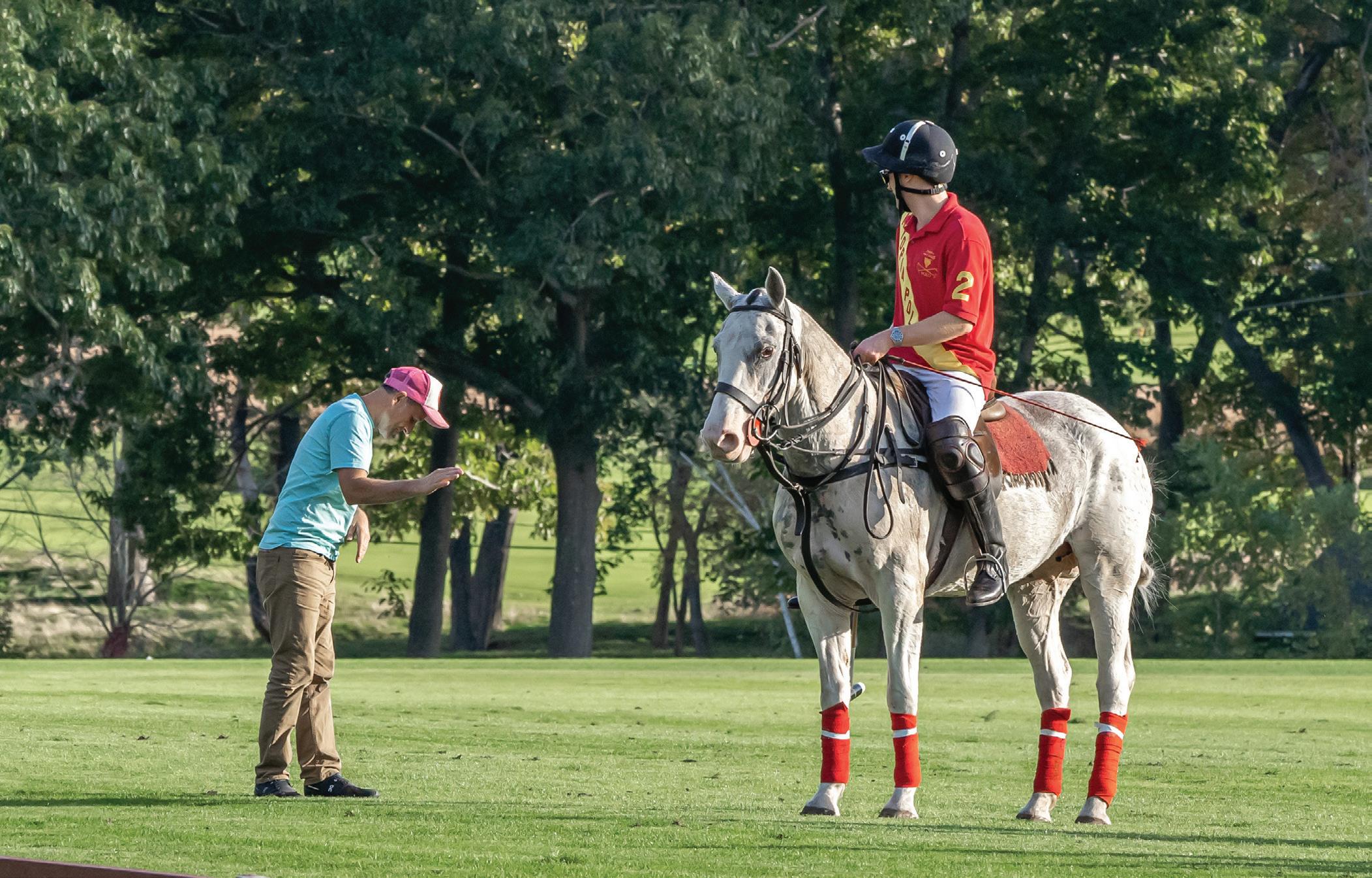
Coaching League manager Estanislao
“Estani”
Sr.,
“For someone considering getting into polo, I’d try to find a horse first that you’re comfortable riding and that matches the way you want to play in terms of speed, agility, stopping, size, etcetera,” says Myopia Polo member Stephen Burr, who lives in Boston. “I’d strongly recommend trying a horse out in a practice or, if possible, a match before making a purchase. This will give you the best idea of how the horse will perform.”
Still, there are a number of options to full ownership. Consider that two of Myopia Polo’s most respected members — Kurt Miller and Carl “CB” Scherer — began playing at the club, a half century apart, without owning their own ponies.
“I usually lease horses in the summer through different avenues,” says Scherer, who works and lives in Boston. “Having them on a temporary basis makes (playing polo) possible when you work a full-time job.”
Again, many instructional programs and coaching leagues provide ponies. Stage Hill offers partial ownership opportunities. Further, polo lessons and scrimmages are included for those members who board their ponies at Stage Hill. Ponies can also be leased, or rented.
Miller acknowledges that the game was much simpler, and less expensive, when he first started to play at Myopia in the late 1960s. Full “polo service,” which included pre-game preparation, delivery to and from the field, and post-game care of the horses and all their tack, cost only $2.50 per pony.
“Things have changed,” says Miller.
One thing, however, hasn’t changed, and that is the time obligation that the sport requires. That’s particularly true if you hope to play at higher levels of competition.
“One of the things about polo is, if you get into it, you really are committed,” says Miller. “And if you get one or two horses, then the family needs to be involved, because it’s all-consuming. Your wife has to be happy with it, with the money you’re spending, the time you’re spending. And you really can’t say, ‘You know what, I don’t think I’ll play for the month of July.’”
In the same vein, Campbell says, “The biggest challenge for everyone is to have the time and money to get involved in the sport to start, and then maintain that commitment.”
“Once you start buying horses, polo becomes a lifestyle choice and not just a sport,” she says. “You can’t decide to stop taking care of your horses when the weather turns cold and the summer season is over. It isn’t like having a boat that can go into storage.”
Like Miller, Campbell says anyone who has decided to play polo has to accept that “everyone in the family is involved, whether they play the sport or not.”
“If you’re married or in a committed relationship and you play polo, your partner is either supportive or you have to choose between the two,” she says. “It helps a lot if other family members enjoy horses and riding too, even if polo is not their sport.”
Last, but not least, longtime players emphasize the importance of having a mentor, an experienced player or coach who can help guide newcomers through the early stages of their polo-playing experience.
Kurt Miller credits some of Myopia’s most notable members, including Charles Coles, Donald V. Little Sr., Jim Mosely and Lester Crossman, with showing him the ropes at the beginning of what has become a 50plus year association with the sport and the club.
42 myopia polo 2024
Puch
left, instructs Tristan Hanley.
Scherer, one of Myopia’s rising stars at 34, points to the support of Crocker Snow Jr., David Strouss and the Colloredo-Mansfeld family for giving him the opportunity to play over the past decade, despite not owning horses. Even players like Puch, who grew up immersed in polo, have benefitted from having a close-knit circle of tutors and supporters.
“Having a mentor in any sport is very important, but in polo is crucial,” says Puch, who continues to give back in his role at the coaching league. “I was lucky to be born in a family where everybody played polo, so my first mentors were my father, Maximo, and older brother, Maximo Jr.
“Then, as I started playing all over, I had many people that mentored me,” he says.
“One in particular was Federico Cendoya, who used to play in the ‘80s at Myopia, a former 5-goal player and great guy.”
Grotnik, who first started playing polo in
1990 with Stage Hill Polo and continues to compete in tournament play at Myopia, still considers Poor a confidant after three decades.
“Without an experienced mentor, it would be hard to get far in any reasonable amount of time,” he says. “Peter Poor has a wealth of knowledge and history of the game. His experiences as a 3-goal pro, polo school owner, and USPA Governor have been what I tend to lean on when I have questions about polo.”
Grotnik’s reliance on Poor and his understanding of the game speaks to the greater polo community. And that community is always open to new members.
For details on these programs, visit the respective websites for Stage Hill Polo (stagehillpolo.com), Myopia Coaching League (myopiapolo.org), Boston Polo Club (bostonpolo.org) or Kingswood Polo (kingswoodpolo.com).
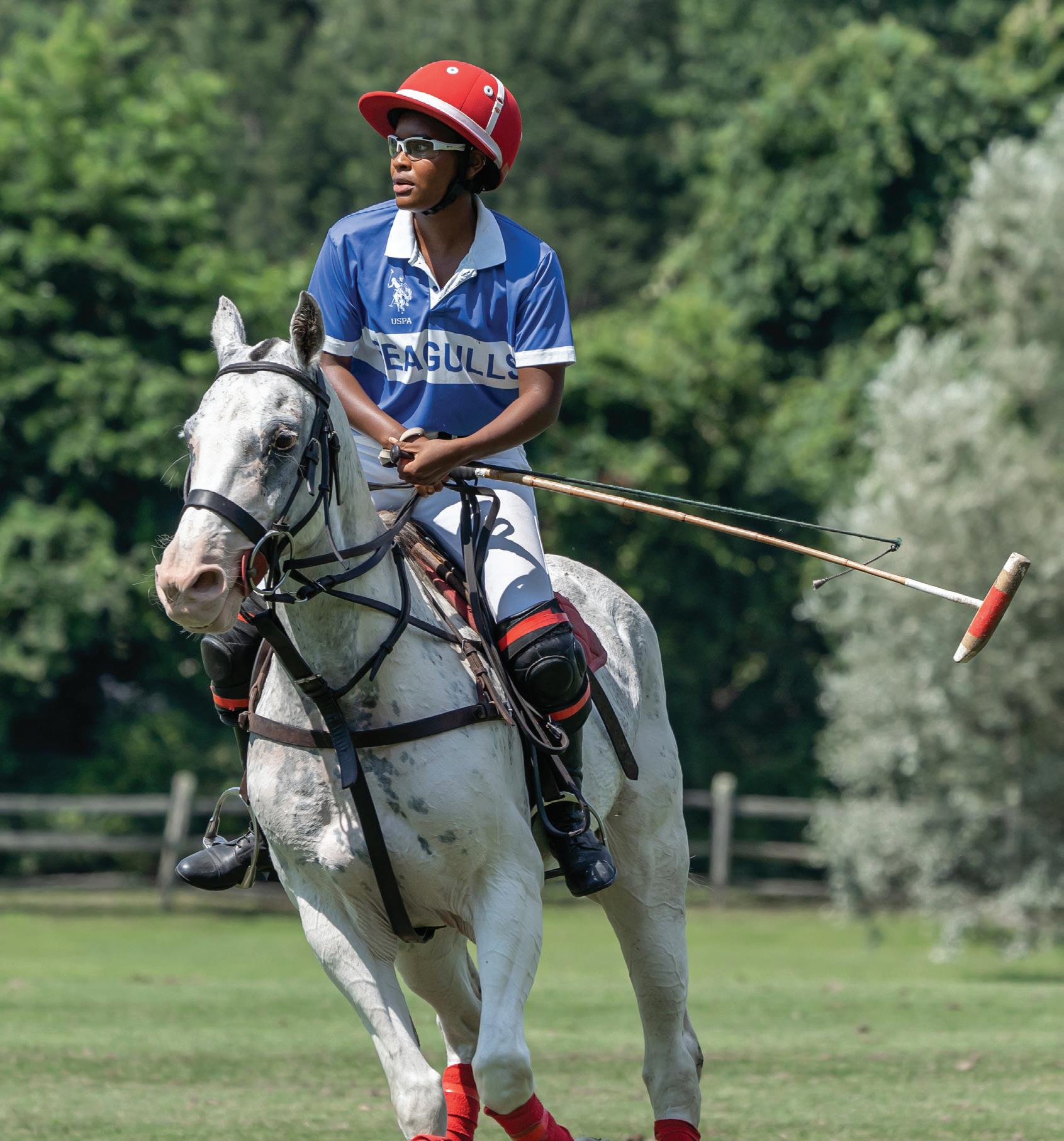
ESTANI’S STEPS FOR STARTING POLO
Estanislao “Estani” Puch, who runs the Myopia Coaching League, recommends the following steps to learn polo from scratch:
• Private or small group riding and technique lessons
• Baby chukkers, or a practice played at slower speeds to illustrate the basics of polo rules, positioning and game strategy
• Myopia Coaching League, with practices played at a faster pace but still controlled by professional coaches
• Myopia regular member practices
• 2- to 4-goals tournaments
• 8-goal tournaments
“This, of course, will be different for each player, depending on their riding experience,” says Puch. “And that can range from the non-rider to a competent jumper, dressage or Western rider that wants to try this great sport, and their natural skills, like hand/eye and ball coordination.”
43 2024 myopia polo
TO POLO
INTRO
Zoe Sims of the Myopia Coaching League sports the legendary Seagulls jersey.
A FAMILY AFFAIR

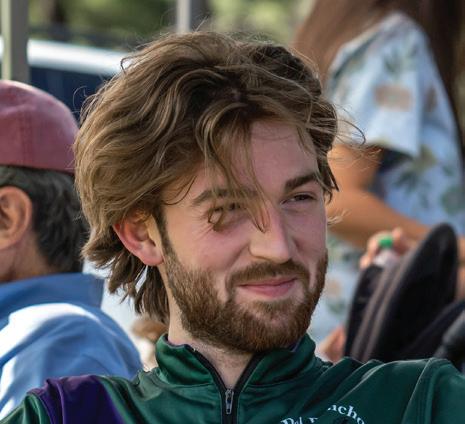
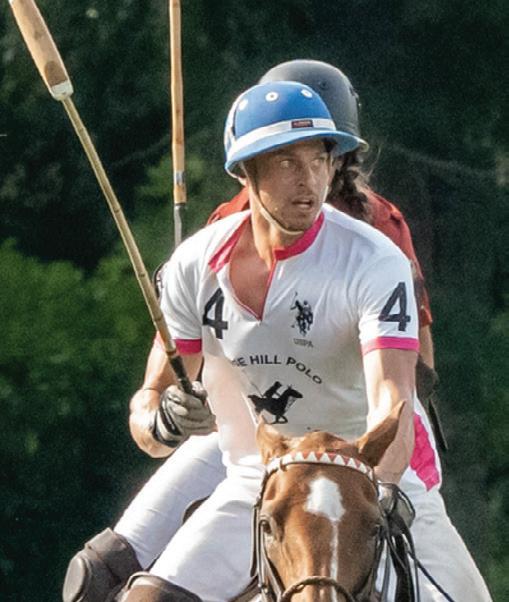
GENERATIONS OF POLO PLAYERS DEFINE MYOPIA
The concepts of “family” and “polo” are almost inseparable at the Myopia Hunt Club. After all, the club was founded as an escape for well-to-do families, first setting up in Winchester before moving to the Gibney Farm in Hamilton. Starting with Frederick O. Prince and his four sons, Myopia soon developed a reputation among local horsemen, a group that included some of the best-known families of the late 1800s — the Appletons, the Forbes, the Lodges, the Abbotts, the Seaburys, the Normans and the Gardners.

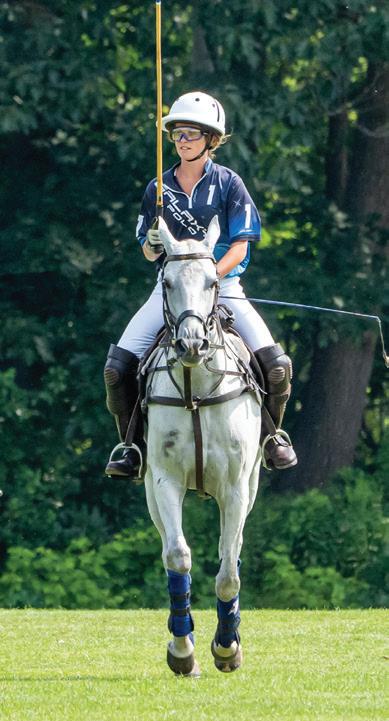

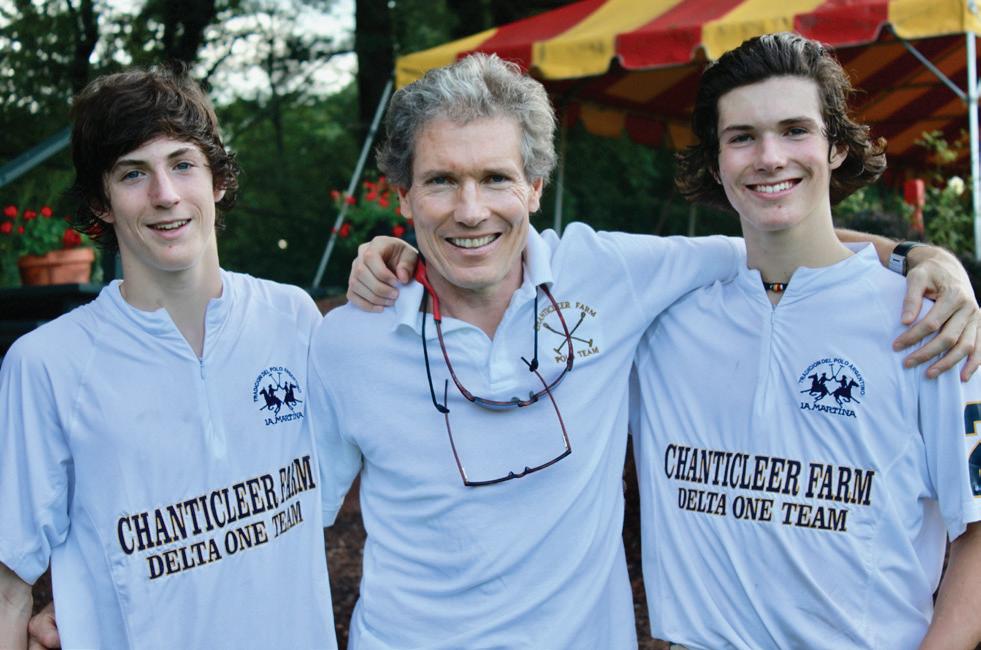
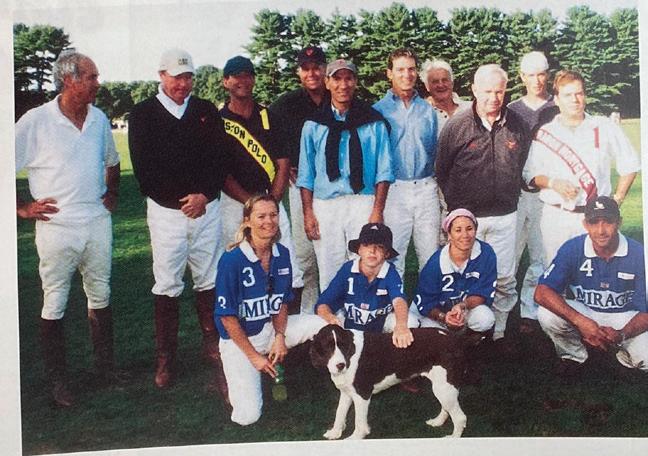
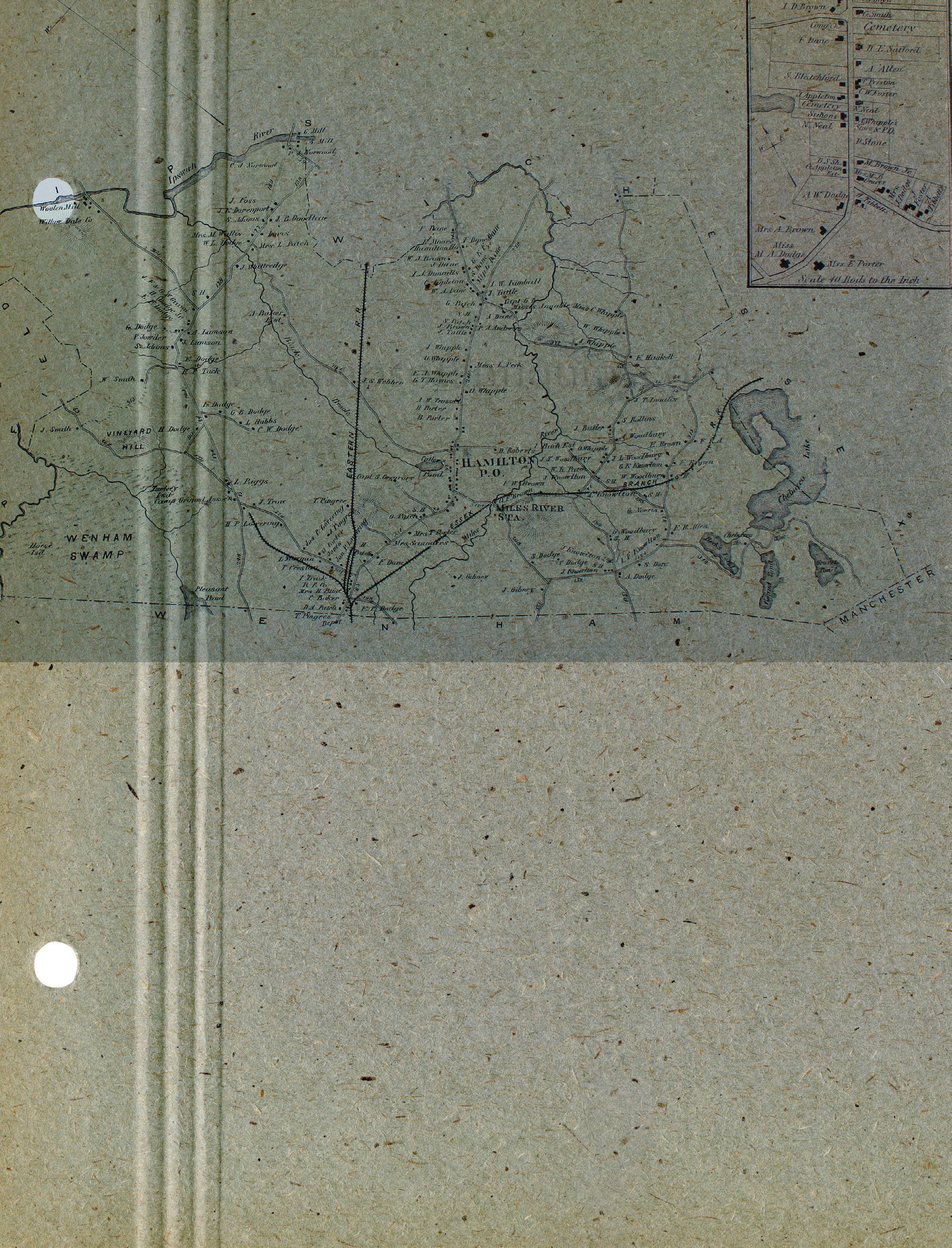
44
Left to right: Alex Ingram, Amanda Poor, Nick Riva, Alyson Poor, and Jennifer Poor (back row) Myopia Archives
Whitney Ellis
Back row, left to right: Ken Adams, Adam Snow, Crocker Snow, and Andrew Snow. Front row, left to right: Ed Miller, Adam Winthrop, Kurt Miller, and Keating Wilcox Myopia Archives
Barrett, Bill, and Hamilton
Coke Myopia Archives
Reed Miller
James and William Grayken
Bella Grayken
BY JACQUELINE MILLER AND THE
PHOTOGRAPHS
MYOPIA ARCHIVES
Includes: Crocker Snow, Peter Poor, Dave Strouss, Lyle Graham, Mike Bucci, Kurt Miller, Charlie Coles, Rick Hartnett, Phoebe Ingram and Alex Ingram Myopia Archives
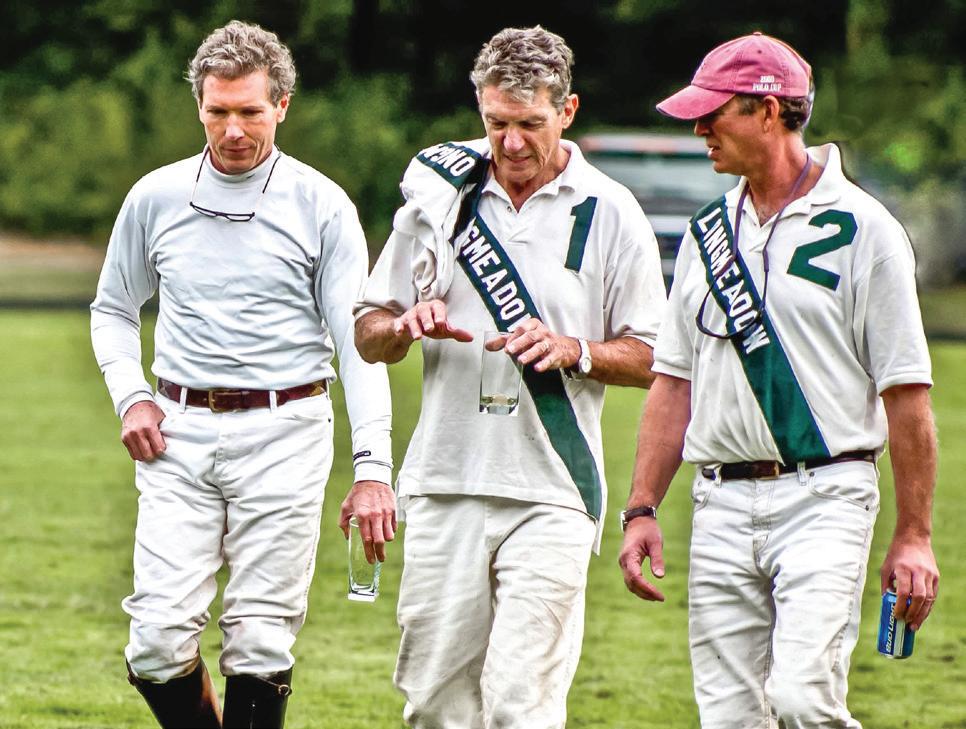 by Brion O’Connor
by Brion O’Connor

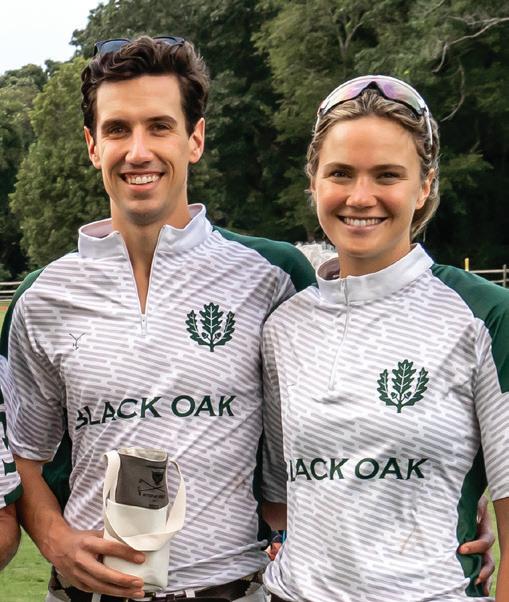
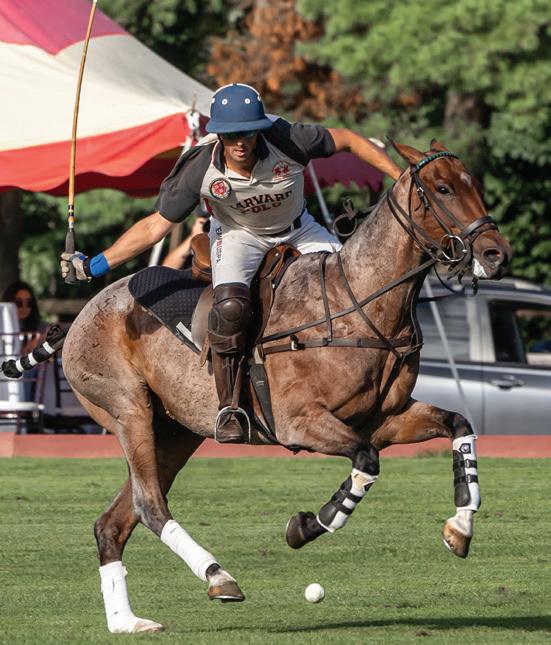
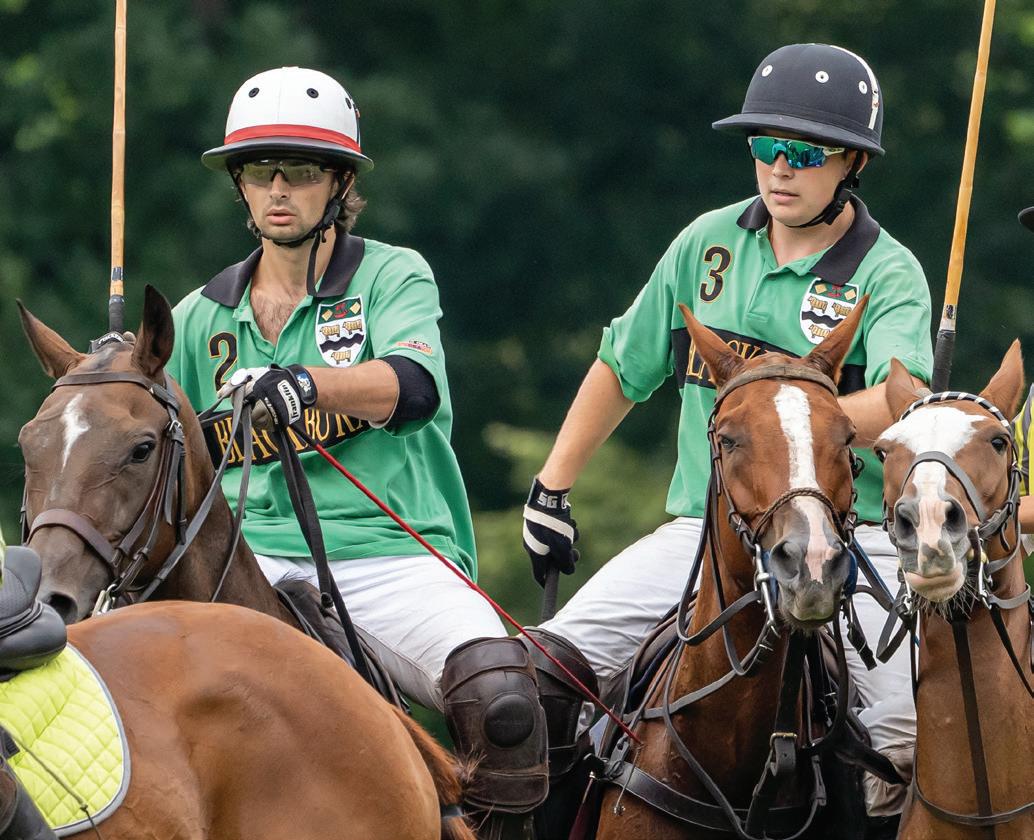

WWhen polo arrived at Myopia, the theme of participating families followed. The list of prominent families is too long to mention each individually, but their collective impact continues to nurture the game.
“Polo is a lot about families, especially at Myopia,” says David Strouss, the club’s current polo captain. “Since the first polo was played at Myopia in 1887, families have always been involved with polo here.”
“The club may have the greatest legacy of families in polo, led in recent years by the Snows, with Adam reaching the highest handicap at 10 goals, followed closely by brothers Andrew and Nick, and (father) Crocker Jr., who is still active as the coach of the Harvard Polo team,” says Strouss. “This legacy continues to this day, where there are 10 families with a son or daughter playing with a parent who either played at Myopia or still plays here.”
Neil St. John “Jed” Raymond Jr., son of former Myopia polo captain Neil St. John “Ted” Raymond Sr., says he enjoys seeing “fathers and mothers playing with their sons and daughters. It’s the foundation for the continued success of the program.”
“As long as everyone buys in, polo is a great fit for families,” says Jed Raymond, 48. “There’s a reason that the most successful players in the world are part of larger polo families. Whether it’s the Pieres family in Argentina or the Snow family in Ipswich, the sport is suited for families that invest in the game.”
One reason, say many Myopia members, is that polo lends itself to cross-generational collaboration.
“Name one other sport, other than perhaps competitive sailing, where you can play at the professional level with multiple family members across multiple generations. Polo is utterly unique in this respect,” says Raymond. “While my two younger brothers didn’t play as much as I did, they were strong riders and gifted with eerily good eye-hand coordination and a natural swing, so there were times where all four of us would play in practices or exhibition games together.
“But this was hardly a novelty,” he says. “Bob Daniels would put a team together with (sons) Kenny, Greg and Mark, and (Crocker) “Terry” Snow could put a team together with Adam,
2024 myopia polo 45
Simon, Johann, Franz, and Seppi Colloredo-Mansfeld Myopia Archives
Nick Snow
Bill Coke, Kurt Miller, and Dave Strouss
Benji and Landen Daniels
Seppi and Annie Colloredo-Mansfeld
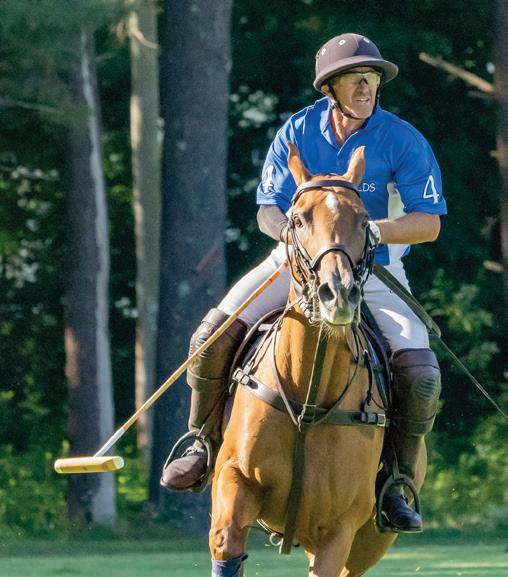
Andrew and Nick. And make no mistake, these were real teams that were competitive. At one point, the Snows could have put a 20-goal team together on their own.”
The Snow family legacy started with Crocker Snow Sr. and continues through Crocker “Terry” Snow and his sons. Following his retirement from high-goal competition, Adam now coaches at his farm in Aiken, South Carolina, and serves as an analyst for polo matches televised on ESPN, while Nick has played a major role in helping his father coach the Harvard Polo program.
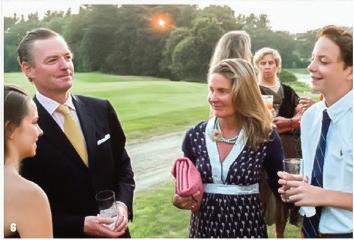

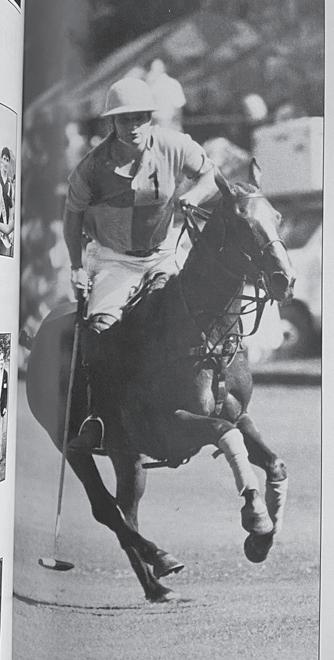
“My fondest polo memories invariably tie back to being on teams with family and close friends,” says Andrew Snow, now 57, a former 5-goal player. “There aren’t many team sports where family members and friends can compete together on the same field.”
ESTABLISHING AND MAINTAINING TRADITION
Following World War II, a handful of Myopia members drew on their family ties to bring polo back to prominence, with familiar names filling many leadership roles.
A sampling includes the Grahams, with father and past captain Lyle and son Jonathan joining forces on the family’s Winter Creek Polo team; the Raymonds, with father and past captain Neil “Ted” Raymond Sr. and son Jed hosting Myopia polo on their field in Ipswich and sponsoring high-goal polo on the family’s Maplecroft Farm team; the Littles, with Donald Sr., a former captain of Myopia Polo, and son Donald “Doo” Jr. founding Centennial Farms Racing stables; the Snows and their legendary Seagulls squad; the Poors, with son Peter taking up the reins after his father Joseph tragically died while playing, establishing Stage Hill Polo which he runs with his three daughters; the Mehms, with Robert and Ted introduced to polo by their father in 1979; the Fawcetts, with father and former captain Michael and son Courtney playing on the Cold Comfort team.
Neil Ayer, along with Joseph Poor and Donald Little Sr., was instrumental in cajoling a number of friends and Myopia members to try polo. Everett and Lester Crossman (namesake of the Crossman Cup) helped build the Joseph Poor Memorial Arena along-
side Myopia’s Schooling Field, purchasing an old Revere dance hall to provide the planking.
Crocker “Terry” Snow Jr., in his account for “Myopia: A Centennial Chronicle,” wrote that a typical summer game in the late 1960s might feature, in addition to legendary players like Ayer and Adam Winthrop, two Snows (and half-brother Donald Little Sr.), three Clarks (Tim Clark and his sons Russell and Bobby), two Crossmans, two Poors and two Rices.
“The club has a strong legacy and has always nurtured a strong local community of families, many where players have spanned multiple generations,” says Andrew Snow. “This is a unique feature of the club, and one of the primary reasons the club has continued to thrive for so many years.”
In the past four decades, the number of families that have taken up the mantle at Myopia can be seen in the names of captains, including Donald V. Little Sr. (196881, 1983-86), Neil St. John Raymond (1986-96), Michael Fawcett (1996-2000), Lyle Graham (2001-08), W. Albert Ellis (2009-11), and Franz Colloredo-Mansfeld (2011-2020), their children, and often their wives (see “Behind Every Captain,” page 51). There was also the Coles family and the Pond Hill Polo team, with father Charles playing over several decades well into his 80s, and son Carlos playing professionally. The Coke family, with Bill and sons Hamilton and Barrett, were known for their competitiveness, winning tournaments on the family’s Chanticleer Farm team.
“I was very fortunate to play polo at Myopia when our membership could support 12- to 20-goal polo,” says Lyle Graham. “To have families such as the Littles, Raymonds, Snows, Fawcetts, Danielses, Carpenters, Mehms, Rivas, with multiple highly rated playing members, was just an extraordinary circumstance. Today, I still get excited and appreciative just walking the pitch and viewing the new and young players entering the game.
“Polo is a great fit for families who embrace the sporting equestrian lifestyle,” says Graham. “From the barn chores, exercising and training ponies and competitions to the social events, there’s something for everyone. In our family, it was our primary hub of activity and, win or lose, it was a bonding experience.”
The late 1980s were heady times for Jed Raymond and his father’s Maplecroft team.
“Dad’s team had a fantastic run in the mid-late ’80s and early ’90s,” says Raymond. “He put the team together with a great friend from Argentina, Juan Lalor, who was part of a big polo family. For years they ran the table
46 myopia polo 2024
From left, Olivia, Robert, Courtney and Max Mehm
Adam Snow, Myopia’s most decorated player with a 10-goal handicap, is a thirdgeneration Myopia player. Photograph by Jacqueline Miller
Myopia Archives
Myopia Archives
Myopia Archives
Peter Poor
Courtney Fawcett

in the high-goal summer circuit of the Northeast and in Palm Beach in the winter. It was awesome.
“He and Juan brought about 40 horses up from Argentina as well as a few ringers, Piki Alberdi and Tino Bourdieu, when they were teenagers and totally underrated, then would round the team out with a local Myopia kid like Philip Lake or Ted Mehm and clean house,” he says. “I was spoiled rotten with all of this talent and horsepower all around me.”
Ted and Robert Mehm learned the sport from their father, Edward, who served as treasurer for Myopia Polo and sponsored the West Hill Farm team. While Ted moved on the become Master of the Hunt, Robert continues to play competitively from his base in Switzerland. Robert’s two children, Olivia and Maximilian, also play.
“Myopia Polo is a storied club and cultural phenomenon dating from 1886,” says Robert Mehm. “It has a great family dynamic, and the Sunday afternoon games and social events make for a great lifestyle.”
Courtney Fawcett, son of former polo captain Michael Fawcett, admits that his memories of growing up and playing at Myopia still pull at his heartstrings.
“Both my father and stepfather played polo,”
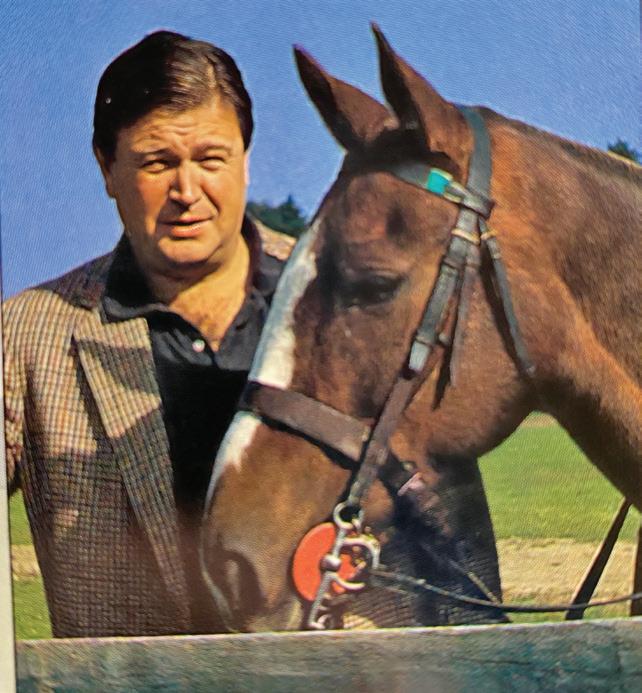

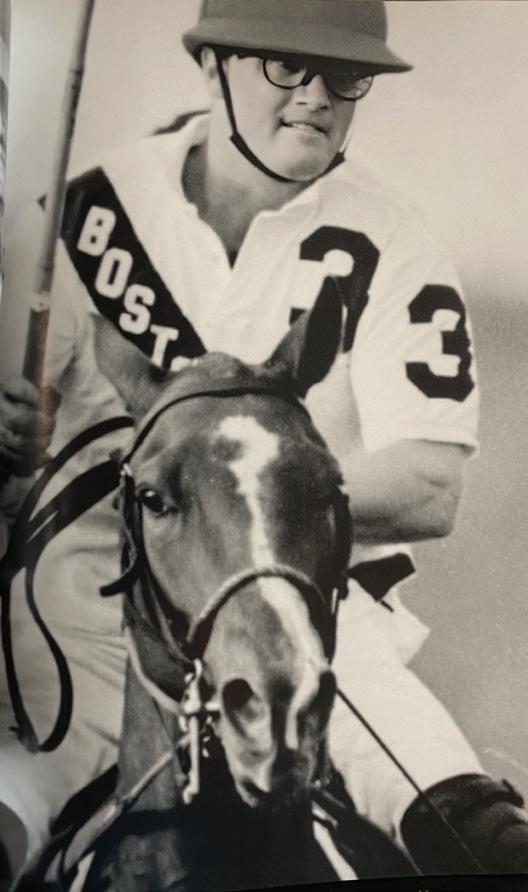
says Courtney Fawcett. “I attended Donald Little Jr.’s polo school at Myopia, as did many of my contemporaries in the polo world, and played frequently with the Snow family as a youngster.
“It’s an honor to be part of the rich history of polo at Myopia, and the many multi-generational families who called Myopia home. It was always a great place for budding young players with coaching and mentorship readily available,” he says. “I played with and against my father, my stepfather and my half-brother on numerous occasions, all of them sublimely memorable.”
Like many polo-playing offspring, Jed Raymond’s focus evolved over time. Initially, through his late teens and 20s, he viewed the sport in terms of his father’s team and the professional–patron relationship.
“Now I see the game as an entirely unique opportunity to play a physically demanding, exciting sport with your family at a very competitive level,” says Raymond. “For years, Dad and I played with Rick and Willie Hartnett in all of the club’s national 8-goal tournaments, and won out about half the time. There’s nothing like it. Now I see that same opportunity for the current crop of parents and kids getting involved, and I’m convinced it will be the lifeblood of the sport at Myopia.”
“My fondest polo memories invariably tie back to being on teams with family and close friends.”
Andrew Snow
A FAMILY AFFAIR 2024 myopia polo 47
Jed Raymond
Doo Little
Ted Raymond
Albert Ellis
Myopia Archives
A FAMILY AFFAIR
“Polo is a unique and demanding sport, and it certainly works best for families when all members of the family share the same passion.”
Franz ColloredoMansfeld
ANOTHER GENERATION COMES OF AGE
Current Myopia members, notably Jacek “Yaz” Grotnik and Estanislao “Estani” Puch Sr., have played a vital role in establishing and maintaining developmental programs for newcomers — youngsters and adults alike — that help ensure that succeeding generations can play. Grotnik, who oversees the Crimson Interscholastic program that has produced many talented young players, says competitive polo “requires an organization around you that is a support system.”
“Families that play together are a natural support system,” he says. “They help each other, they win and lose together, and get an understanding of what it takes to make a successful run at polo.”
Though Grotnik grew up around horses, the 55-year-old financier didn’t start playing polo until he was 22, at Peter Poor’s Stage Hill Polo in Newbury. Within a year, he had his own pony. Today, his two children — Grace and Augustus (“Augie”) — are accomplished players in their own right. However, Grotnik also acknowledges that the key to a successful polo “family” goes far beyond the field of play and the stables.
“Both my kids ride and play and have reached the top of their game in interscholastic, youth and intercollegiate polo,” says Grotnik. “My wife, however, doesn’t ride or play, but I’m confident we wouldn’t be as successful without her help and
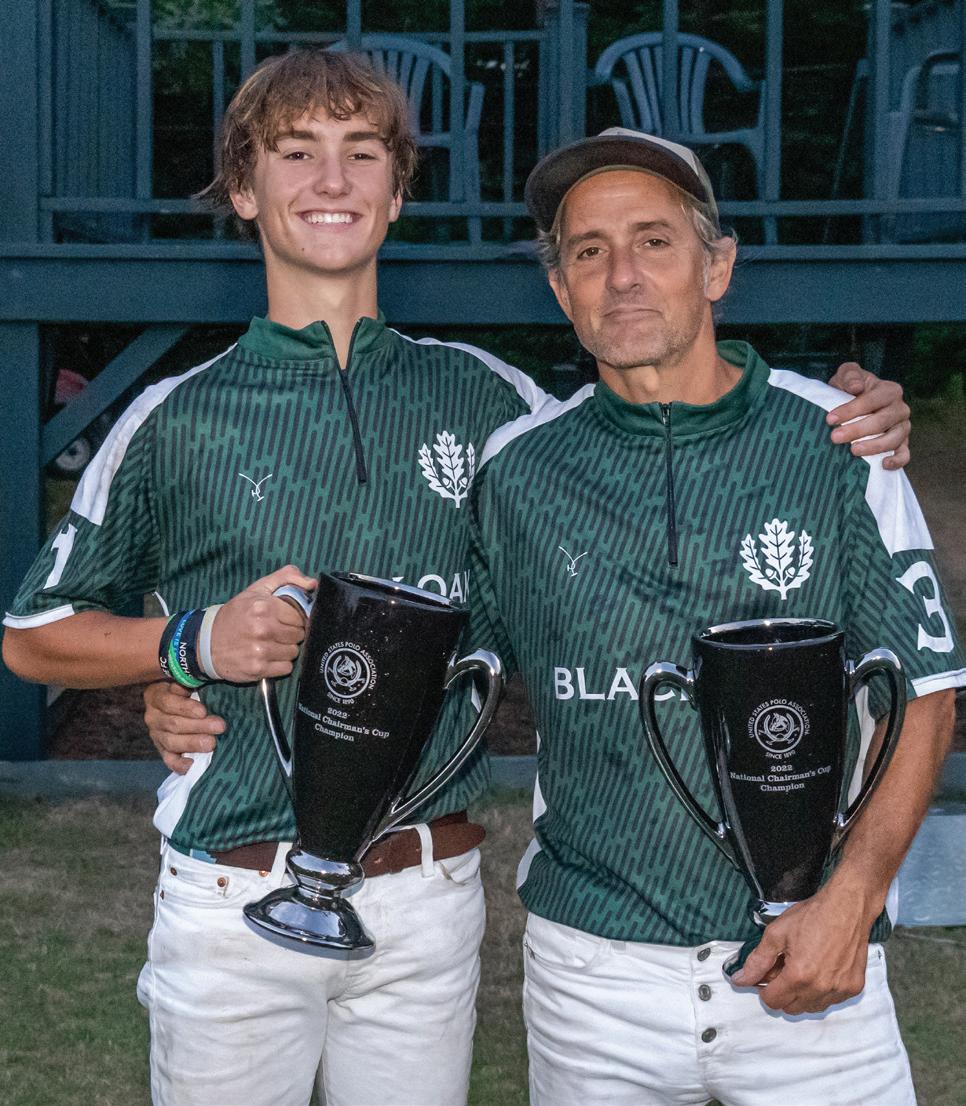
support. She’s our biggest fan.”
Another Myopia Polo member with strong ties to the instructional side of the sport is Puch, a native of Argentina, where he first learned to play. His son, Estani Robledo “EJ” Puch Jr., is 17, and just completing his junior year at Boston College High School.
“Polo is a celebration of family that’s is transmitted from generation to generation,” says the elder Puch, 49. “Playing with your kids is the ultimate goal for any polo player, and luckily, I made it happen.”
For his part, EJ Puch is fully aware not only of his good fortune to be raised in a polo family, but also of the life lessons that the game has taught him.
“I’ve been riding since I was able to sit on a horse, but I really started to play at around 11 years old when I joined the then Myopia Interscholastic Polo team,” he says. “Polo to me did not come very easy, but what makes me become better and better each day is my consistency. Practicing day in and day out and playing as much as I possibly can has drastically improved my game.”
The younger Puch also acknowledges that being the son of an accomplished player and instructor brings its own distinct pressures.
“When I first started playing, I was very scared,

48 myopia polo 2024
Estani “EJ” Puch Jr., left, and his father, Estanislao “Estani” Puch Sr., after winning the 2022 Chairman’s Cup
Jacek “Yaz” Grotnik, left, of the Husaria team with his children Augie, center, and Grace.
not only of the possibility of failure, but also not meeting my father’s expectation,” says EJ. “Consistency and practice made me greatly improve not only my playing ability, but also my confidence.”
Parental expectations aside, Puch notes that growing up in a polo family has allowed him access to a number of polo mentors, such as local professionals.
“I have been extremely blessed to be able to receive the help and mentorship of many great minds over my young polo career,” he says, adding that his father “has definitely had the greatest impact on me. He inspires me to work as hard as I can, not only in polo, but also in school and everything I do, and to take advantage of every opportunity I’m given.”

“Playing with my father is truly a blessing. It’s really surreal that we both can play together. We push each other constantly, and he’s always giving me things to correct and helpful tips, whereas I make him push himself more and more each day that I improve,” says EJ. “Because of all of the hours you need to put into polo to see improvement, you really grow bonds with the people you spend that time with. It really has brought me and my father a lot closer.”
Other Myopia families have enjoyed similar experiences. Amanda (Poor) Roberts, a thirdgeneration player, grew up with her two sisters immersed in the game at their father’s Stage Hill Polo in Newbury. The game, says Roberts, “has definitely kept my family very close.”
Myopia’s Eayer family is also well represented currently by Walter Eayer, son of the late Walter “Ted” Eayer, while the Daniels family, founders of Pony Express Polo, features Justin, Benji and Landon, the three sons of Robert Daniels and Anja Lucrezia Borgja Eckbo.
“To see your children find the same joy is challenging and petrifying in the same time, but in a different way,” says Eckbo, who also played. “The complexity of the sport creates many dynamics that can challenge the support of keeping everyone involved at the same time and over time.”
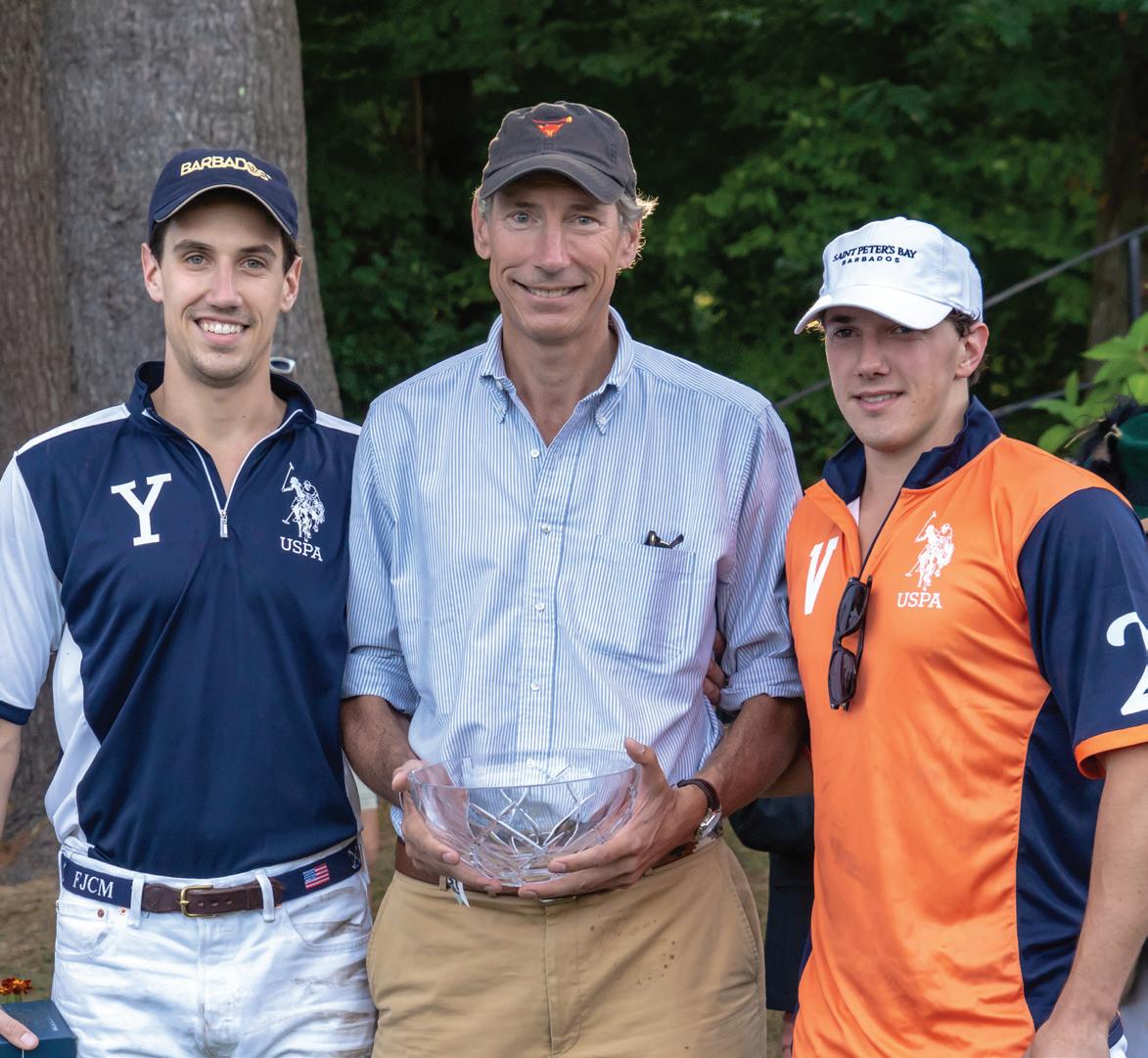
more casual practices and club polo.”
“The whole community knows each other very well, after many years of playing together, and that also creates a fun and friendly environment,” says Seppi, 33.
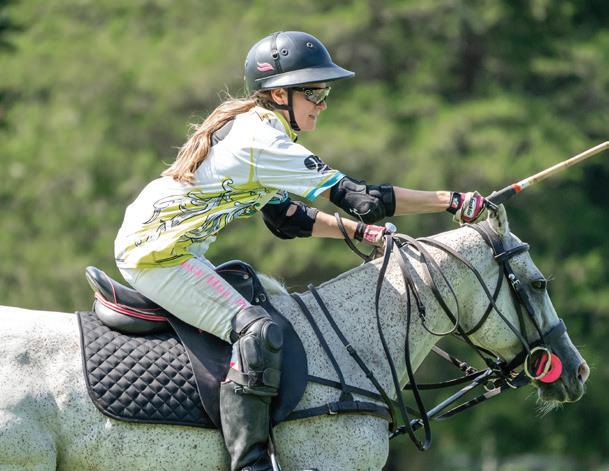
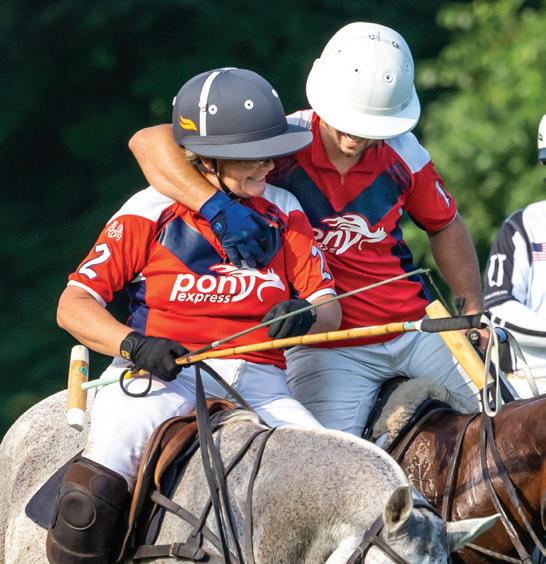
Polo, says Eckbo, is a fantastic outlet for “a family that likes to spend time together or with people that also like polo. It’s not enough to like polo; you have to love polo. The whole family has to love polo. That’s a tall order over time.”
At 62, Franz Colloredo-Mansfeld and his wife Anne have raised four accomplished polo players — Seppi, Simon, Johann and Annie. Myopia, says Seppi, “strikes a nice balance of fast, competitive play during the tournament season, and
“Playing with my father has been one of the best parts of my polo experience. He’s had a lifelong passion for horses, and being able to share that with him on the polo field is really special.”
Simon, now 28, says he “grew up at Myopia. For my whole life, it has been the place we go for sports or socializing with friends and family.”
“My father, three siblings and I really enjoyed taking the field together,” he says. “It was pretty exceptional that we all could compete and win together in a very demanding sport.”
Myopia Polo member Kurt Miller’s father played in Hamilton and Dedham in the 1930s, but retired before his son took up the sport due to injuries suffered in a car accident. Kurt Miller, who has been a staple at Myopia since the late 1960s, made sure to share the sport with his own son, Reed Parker Miller. Although Kurt Miller and his wife, Jacqueline, initially tried to steer their son toward other pursuits, such as tennis or golf, polo’s siren song proved too strong.
“My dad never got the chance to play on the field with his father. I had always watched him play, so I had no doubts I would be playing with him,” says Reed Miller. “He told me over his 50 years he can’t remember all the games he has won and lost, but has so many memories of the fun playing, the social community and the personal connection with our horses.”
2024 myopia polo 49
Franz Colloredo-Mansfeld, center, is flanked by two of his sons, Seppi, left, and Simon
Above: Kurt, left, and Reed Miller of the family’s Longmeadow team
Amanda (Poor) Roberts and her sisters are third generation Myopia players
Photographs by Jacqueline Miller
Anja Eckbo and her son, Justin E. Daniels, of the Pony Express squad
A FAMILY AFFAIR
THE NEXT WAVE SADDLES UP
John M. Ellis started playing polo at 12, but his participation in the sport was more sporadic than most. While his brother, W. Albert Ellis, became more involved, eventually becoming the captain of polo in 2009, John Ellis didn’t consider polo “a serious pursuit.”
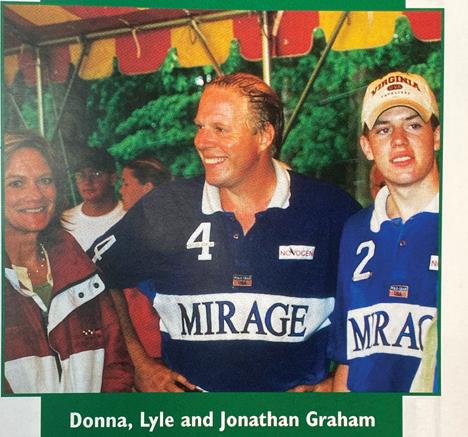
“In our family, it was our primary hub of activity and, win or lose, it was a bonding experience.”
Then his son Maverick expressed a curiosity about the game.
“Maverick also started when he was about 12, but he immediately took to it,” says Ellis, noting his son was already comfortable riding. “When he started playing polo, he loved the fact that he could follow the ball whatever direction it went. He started indoors with Interscholastic Polo and then followed up with the Myopia Coaching League.”
Maverick’s polo pursuits re-ignited Ellis’s interest in the game.
“I didn’t think I would play more polo, but then Maverick started playing,” he says. “I thought it would be fun to join him at the end of the season in 2022. It was September, and the footing was softer, the air a bit cooler, and everyone was more relaxed. September, after the tournaments are over, is really the best polo for family and friends at Myopia.”
Ellis’s anecdotes reflect polo’s generational appeal. It is a sport that, once experienced, has the potential of setting its hooks deep. Even Franz Colloredo-Mansfeld, Myopia’s polo captain from 2011-20, was drawn to polo by his children.
“I grew up riding in the countryside on the North Shore and fox hunting with Myopia,” he says. “I didn’t start playing polo until I was in my late 40s. My children started with the youth polo program at Myopia around 20 years ago, so I followed them into the sport. I loved sharing this activity with them. I began playing in Myopia in 2007, and by 2011, I was fully immersed.”
Myopia is also attracting new families. The Grayken siblings – Bella, James, and William –are among the club’s newest players, rising through the junior ranks on the family’s Galaxy Polo team. In the Carleton household, the inspiration to play polo came from the sons of Jennifer and Andrew Carleton. The Carletons live in Hamilton, near the Harvard Polo arena off Woodland Mead. Andrew was first introduced to polo by Jennifer, he says, adding he “never even conceived the thought that I might try the game.”
“Then last fall I was invited to the indoor arena at Harvard to play in a couple fun chukkers with the
Harvard Polo barn manager (Robin Reyes), his son (also Robin) and Estani (Puch), who kindly offered some tips,” says Andrew. “And now here I am.”
Andrew’s son Drew “was also playing and really seemed to enjoy the game, so I joined in when I could,” he says. “I found it quite challenging as a sport, with the combination of trying to control the horse as well as hit the ball.”
Unlike his father, 13-year-old Drew Carleton has taken to the sport quickly, and is already playing in the Crimson Interscholastic program and Myopia Coaching League. His mother, Jennifer, had played polo in the late 1990s, learning the game under the tutelage of Peter Poor and teaming up with Myopia’s Jacek Grotnik on occasion.
“What keeps me in the game and interested is just when I’m playing well and I just feel a ton of adrenaline,” says Drew, 13. “I can’t pinpoint exactly what it is, but it’s just something about being on the horse’s back and riding into other players trying to get the ball.”
Myopia, says Drew, “was very easy for me to get involved with and start playing, so I assume that it will be just as easy for other families to start to.” The bottom line for the Carletons, says Andrew, is easy access to a game that brings sheer joy of playing together with his sons.
Ellis says Myopia is a good fit for families because the club does an admirable job “balancing the opportunities for young and beginning players with the needs of the more competitive and seasoned players.”
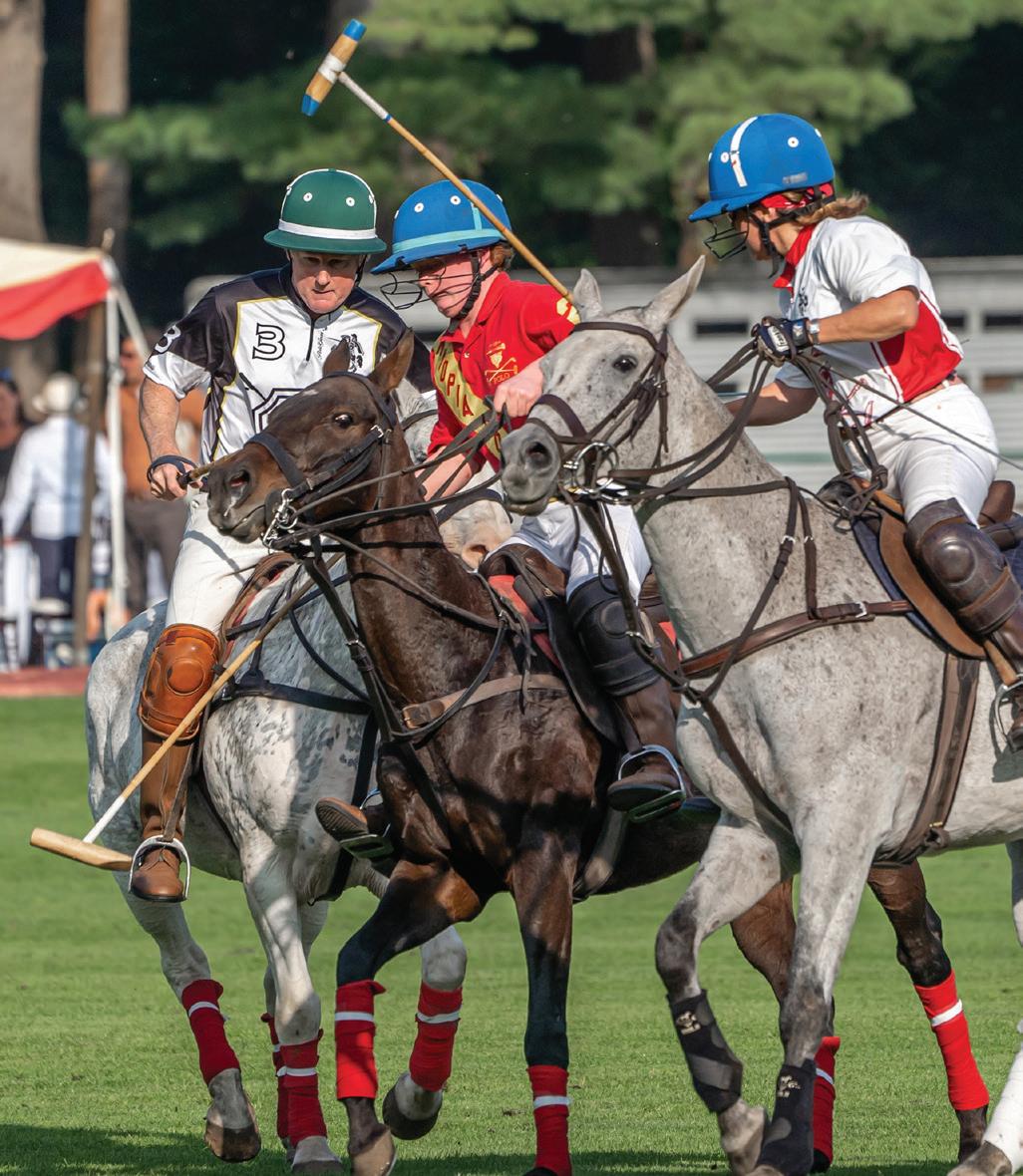
50 myopia polo 2024
John, left, and Maverick Ellis, center, vie for the ball as Terri Campbell moves in
Lyle Graham
Donna, Lyle and Jonathan Graham
Myopia Archives
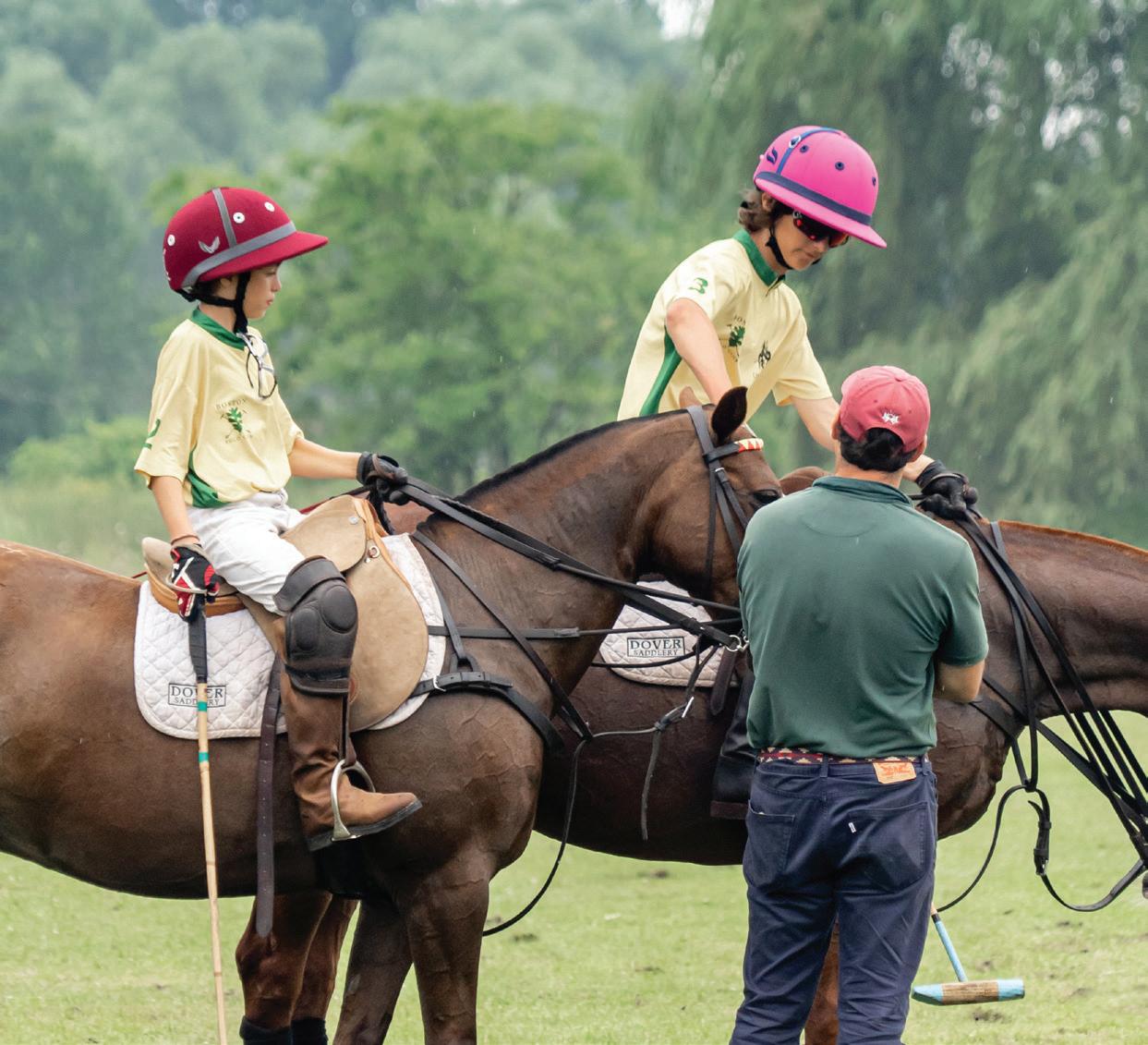
“The higher-goal players bring the professionals and the professionals bring lots of horses,” Ellis says. “My brother Albert has been more involved over the years, and I’m proud that someone in our family took a leadership role.”
“Because of the intermittent nature of my family’s polo playing, I haven’t had a lot of opportunities to play with my brother Albert and my nephew Whitney,” he says. “But I think it would be really fun if we could all play together someday.”
Though the sport has hurdles — notably the financial and time commitment — polo at Myopia flourishes in large part because the families involved support one another and the game itself. The key, says Franz Colloredo-Mansfeld, is for everyone to be invested.
“Polo is a unique and demanding sport, and it certainly works best for families when all members of the family share the same passion,” says Colloredo-Mansfeld. “I was fortunate my kids all loved horses and polo. They enjoyed playing at Myopia, and they especially enjoyed playing polo in college.
“It’s a sport with a global community and network — my children have had the opportunities to play in Europe, Argentina and Asia,” he says. “These were remarkable adventures that I hope can be passed on to my grandchildren.”
For Jed Raymond, Myopia is a singular place that continues to speak to him, conjuring priceless memories of not only his family but also the families he played with and against.
“To have been able to play at Myopia with my dad and other legends of the game is something I look back on with profound gratitude and pride,” says Raymond. “Every time I’m at Gibney, I love nothing more than taking my shoes off and walking barefoot over that field with a foot mallet, sitting on the boards with my kids, absorbing the sounds and smells of the game that were such a big part of my life for so many years.
“I know it’s cliché, but it’s like a second home to me,” he says. “And I’m grateful to those whose relentless efforts keep it alive.”
BEHIND EVERY CAPTAIN
Behind every Myopia Polo captain is a strong spouse, a co-captain and partner who works tirelessly to ensure the games and events happen seamlessly. We asked some of them to share their thoughts:
“As an equestrian, I’m thrilled to support David’s passion for polo. Playing polo at Myopia for over 30 years, he understands the complexities of the sport and it was only natural he evolved into the role as captain. What he has done for this club, and continues to do, is amazing. It’s a monumental voluntary undertaking to run this program and is not without numerous sacrifices. Together, we’ve managed to make it all work. I’d like to express my appreciation to all the incredible Myopia captains’ spouses for their tireless support exhibited with such eloquence, grace and style.”
— TRACY STROUSS, CO-CAPTAIN WITH DAVID STROUSS, 2021-PRESENT
“The challenges of a polo captain’s wife are many — non-existent summer vacations, family time interrupted by urgent phone calls relating to scheduling, weather, player gripes, field conditions and polo finances, and watching with dismay as personal discretionary spending goes towards travel, meals and wardrobe for horses and players. Yet there’s no activity that gives my family more joy. Polo brings us all together, not just as a family but with the broader community of local and international players and families we’ve come to know over the years at Gibney Field. The fun and friendships forged are the trophy.
— ANNE COLLOREDO-MANSFELD, CO-CAPTAIN WITH FRAZ COLLOREDOMANSFELD, 2011-20
“I recall Lyle having to juggle many things to get the job done. He needed to deal with such a wide range of issues, yet he seemingly managed such pressures with ease. I was so proud of the way he was a ‘hands-on’ captain with everyone, from the players to the grounds crew. I appreciated how grateful he was to the polo manager and the crew. He tried to encourage young people to get interested in polo and families to participate in the game together. It was a wonderful experience.”
— DONNA GRAHAM, CO-CAPTAIN WITH LYLE GRAHAM, 2001-08
“Polo wives are spokes in the wheel that make the game go round. We take pride in making sure our husbands are well prepared, well turned out, and ready to play the sport they love. Off the field, polo wives enjoy a special camaraderie with one another, hosting barbecues, decorating and organizing the seating for the annual Polo Ball and other fun activities. Our children become friends, we meet wonderful players along the way, but mostly we get to enjoy beautiful afternoons cheering on our No. 1 fellow. A polo wife leads an enchanting life.”
— POLLY FAWCETT, CO-CAPTAIN WITH MICHAEL FAWCETT, 1996-2000
“Mom was terrified watching us play the sport, but she knew how much we loved it and did her best to hide her anxiety. I know every time I or my dad fell, it hurt her more. While dad was captain during the ’80s and ’90s, polo at Myopia was a big social scene, but she couldn’t have cared less. She supported us in the sport like any mom would, but she eschewed the glitz and kept us grounded. For that we are all eternally grateful!”
— JED RAYMOND ON HIS MOTHER, ELIZABETH RAYMOND, CO-CAPTAIN WITH NEIL ST. JOHN RAYMOND, 1986-96
“Mom was instrumental in the success of the East Coast Open, because she was technically the social committee and the facility committee. She wanted to make it a memorable event. Everybody came from everywhere — from California, Florida, Argentina, England, Pakistan — because it was a great time. She thrived on it, and she was good at it. It came natural to her. Her generation was always very kind, gracious, outgoing, welcoming. She took it on as a job, but it was a mom thing, making sure everybody was happy.”
— DONALD V. “DOO” LITTLE JR. ON HIS MOTHER, JUDITH LITTLE, COCAPTAIN WITH DONALD V. LITTLE SR., 1968-81, 1983-86
51 2024 myopia polo
Photographs by Jacqueline Miller
Harvard Polo barn manager Robin Reyes, right, discusses technique with his son, also named Robin, left, and Drew Carleton, center.
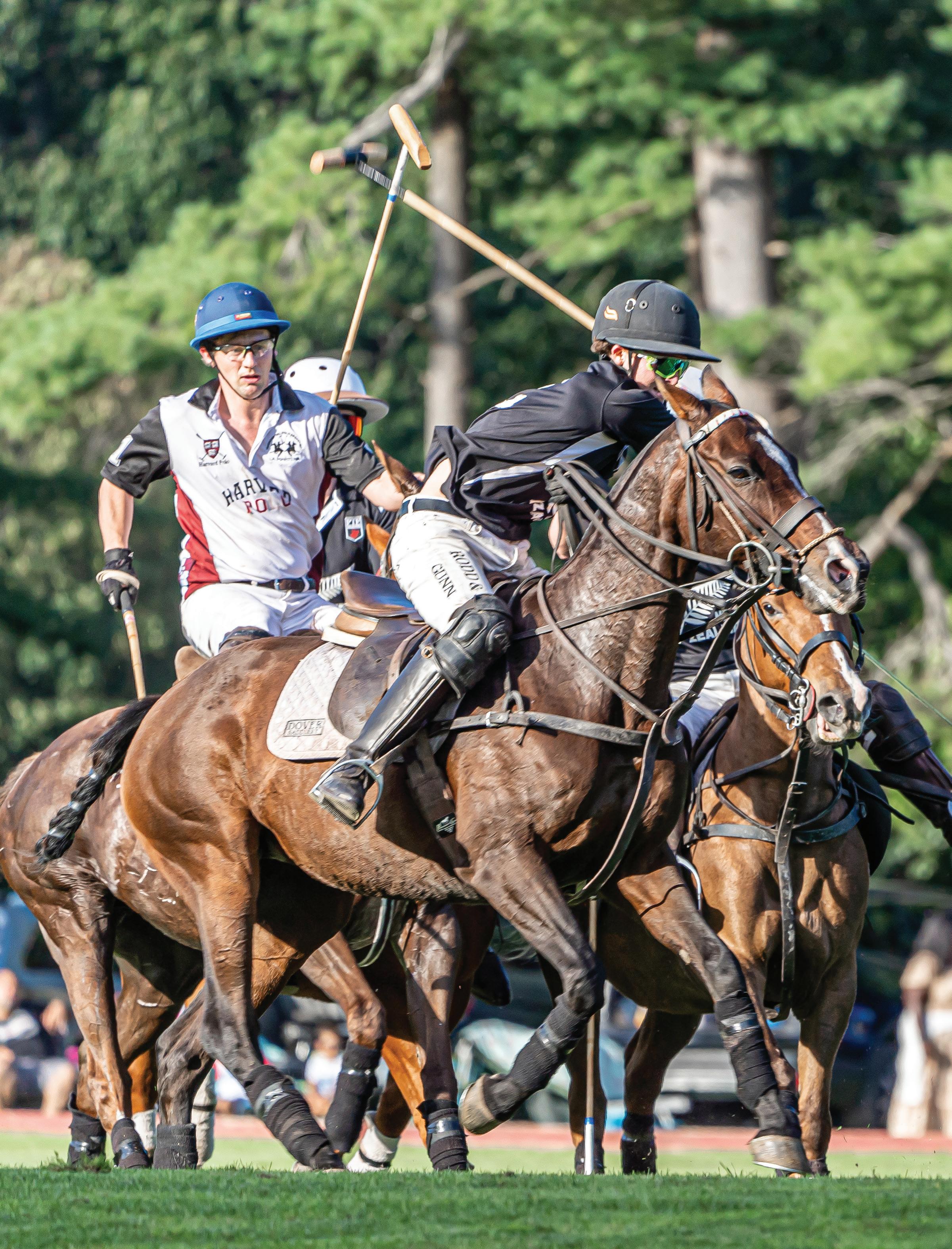

TOURNAMENT
 PHOTOGRAPHS BY JACQUELINE MILLER
PHOTOGRAPHS BY JACQUELINE MILLER
Combining full-blooded competition and a festive atmosphere, every polo match has the potential to be an entertaining experience.

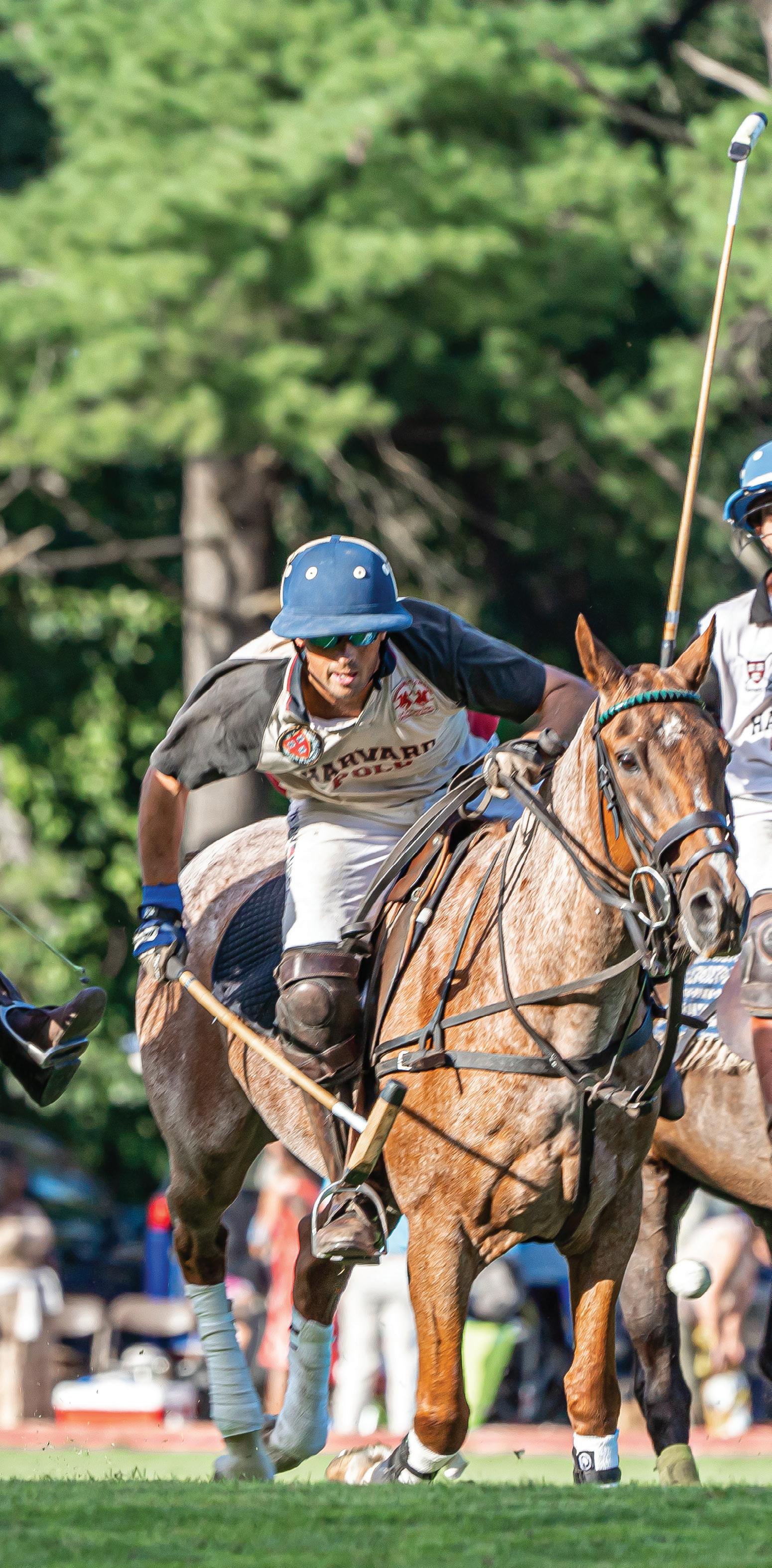 by Brion O’Connor
by Brion O’Connor
Some tournaments deserve special attention, and that holds true for Myopia Polo’s several USPA high-goal tournaments, in addition to the Tuckerman Cup 4-Goal, the Northeastern Women’s Challenge, and the Harvard Invitational.
These tournaments represent the zenith of Myopia’s summer and fall season. For proof, consider last year’s schedule, when half of the finals of the major tournaments were decided by two goals or fewer.
“Like any sport, tournaments are often the highlight of the season and involve the most competitive matches,” says Myopia Polo Captain David Strouss. “Everything is left on the field in the Sunday finals of the major tournaments at Myopia.”
“The five major tournaments at Myopia are the most exciting and offer the highest level of polo played at the club,” says Strouss. “By having these tournaments, we attract some of the best polo players to Myopia.”
In addition to the five major tournaments and Tuckerman 4-Goal, Strouss reserved singular praise for the inaugural Northeastern Women’s Challenge, which drew more than 20 top female players in its first year, and the Harvard Invitational match, an annual tradition held every September. In 2023, the Harvard Invitational featured a national team from New Zealand playing a strong Harvard team of current and alumni players, led by Nicholas “Nick” Snow.
2024 myopia polo 53
LEFT to Right: Albany Mullholland , Zach Keyte of NZ, Nick Snow
TUCKERMAN CUP 4 GOAL
FINAL: BLACKBURN FARMS 6, BLACK OAK/DEL RANCHO 4.5
WINNING TEAM: In a defensive match, Blackburn Farms (Mark Tashjian, Justin Daniels, Benji Daniels, Abby Kotwick, Walter Eayers) slipped past Black Oak/ Del Rancho (Aurelia Rus, Manuel Mazzocchi, Dave Strouss, Seppi Colloredo-Mansfeld, Annie Colloredo-Mansfeld), 6-4.5.
MOST VALUABLE PLAYER: Justin Daniels
BEST PLAYING PONY:
“Chapa Zagitariana,” owned by Justin Daniels
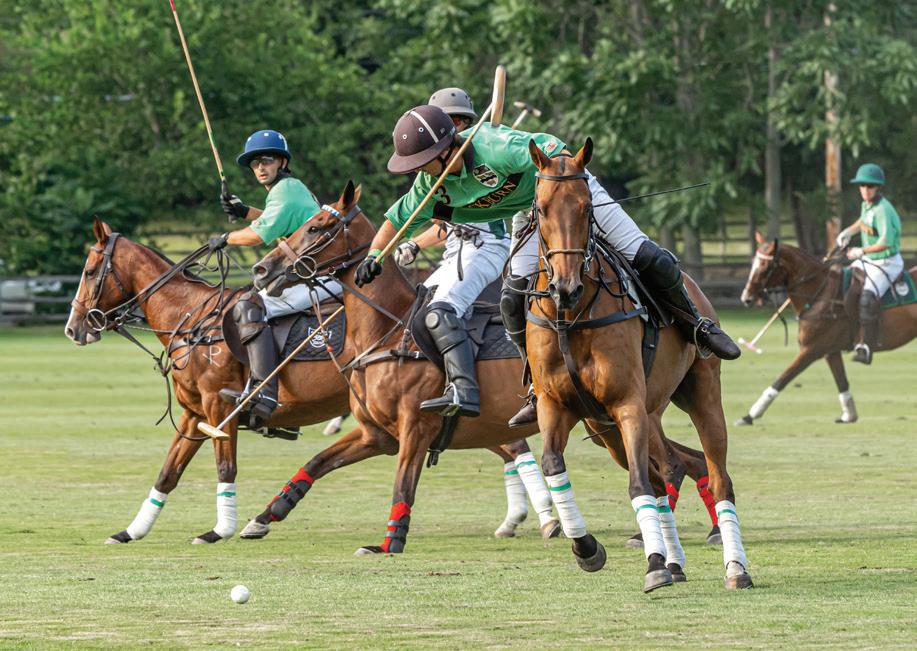
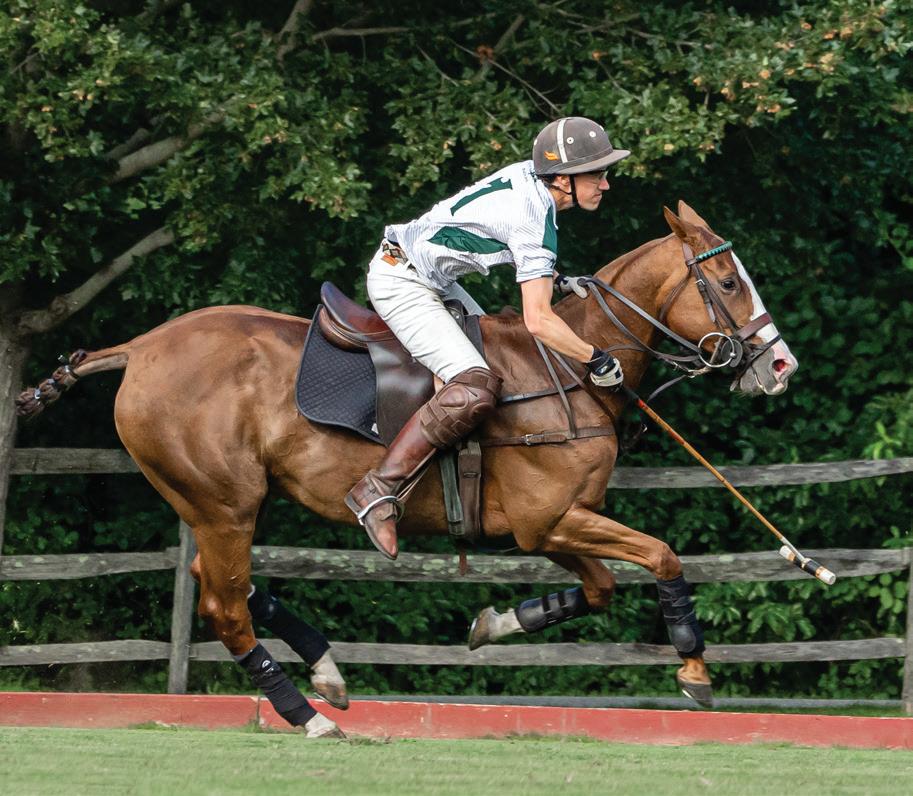
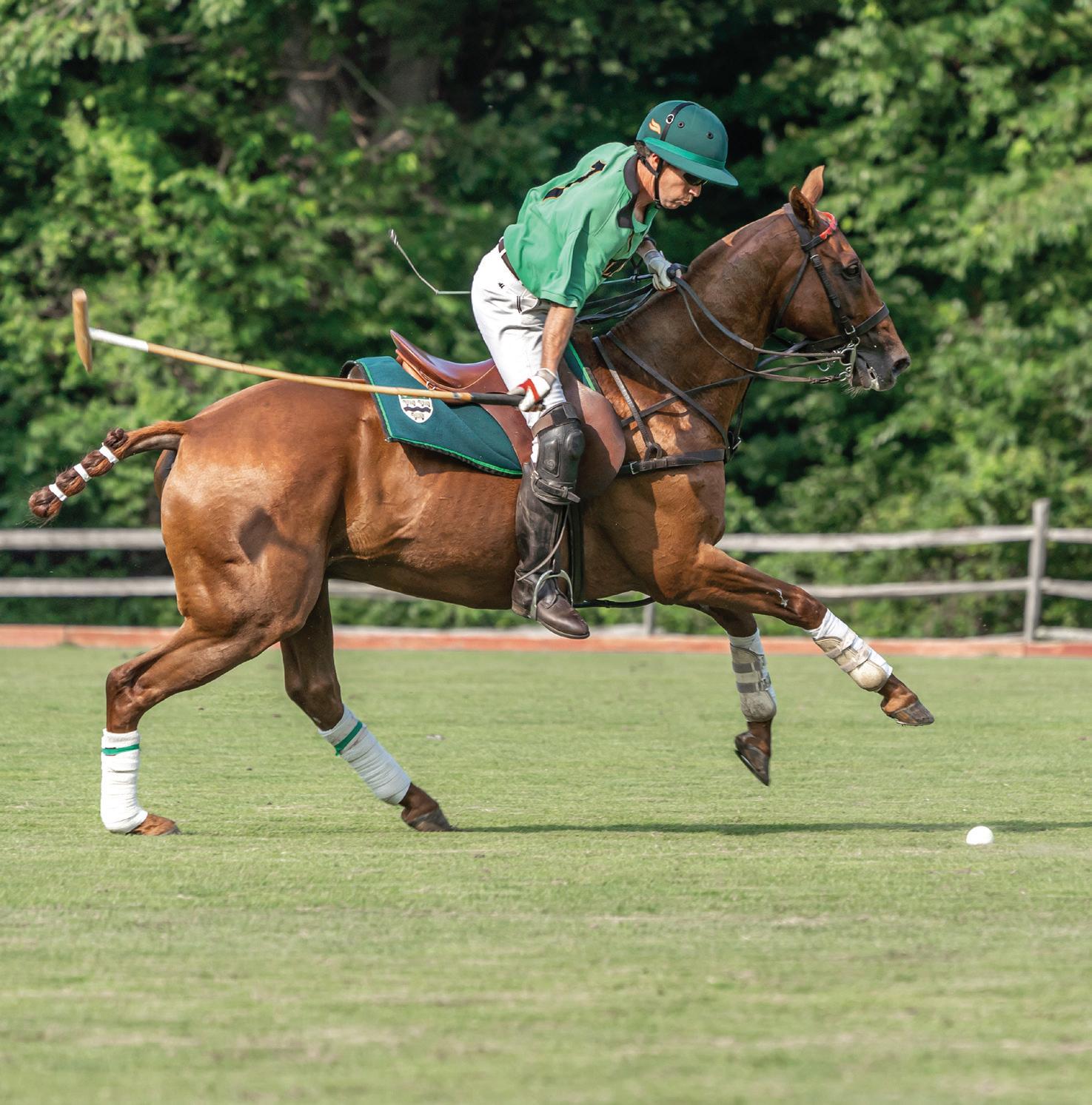
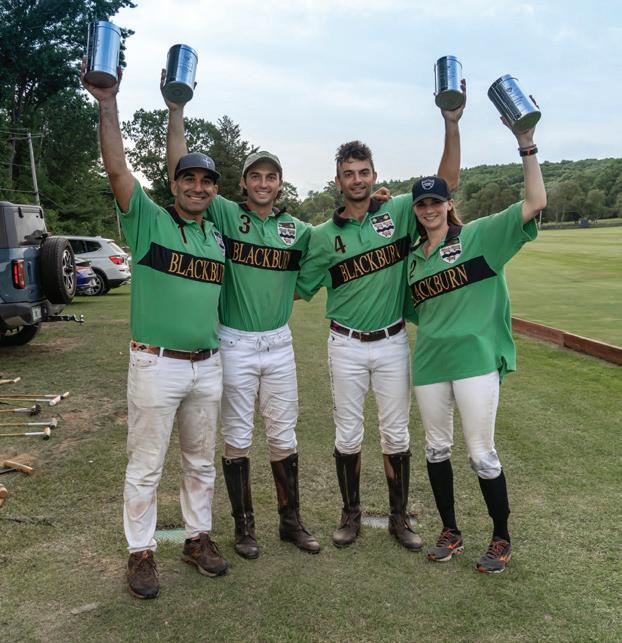
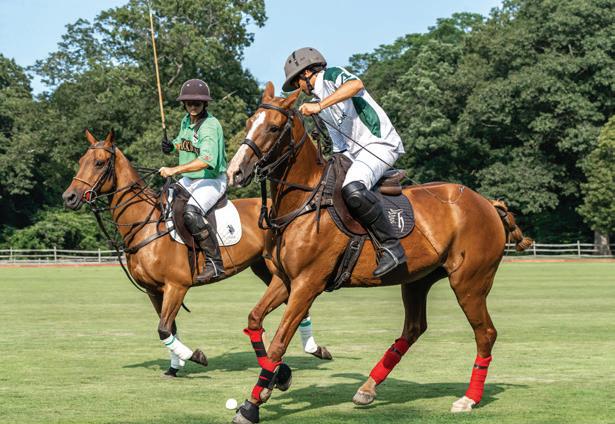
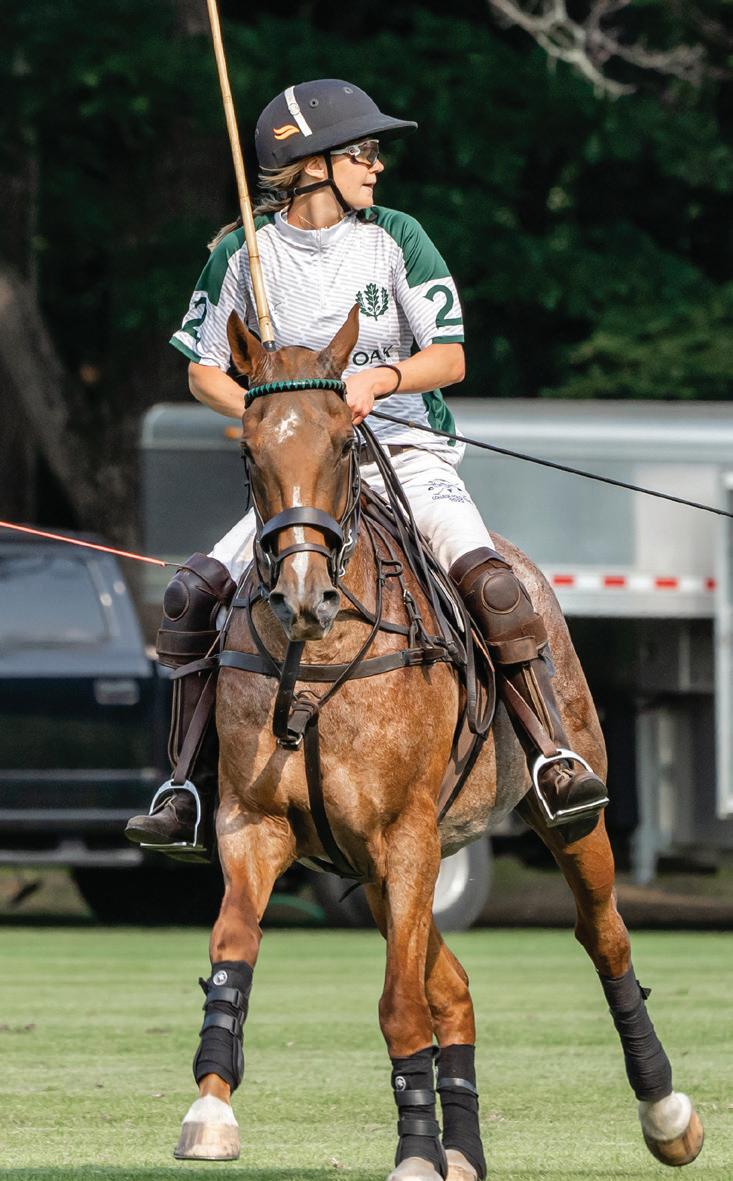
54 myopia polo 2024
SPOTLIGHT
Winning team Blackburn Farms (from left): Mark Tashjian, Justin Daniels, Benji Daniels, Abby Kotwick, Walter Eayers (not pictured)
TOURNAMENT
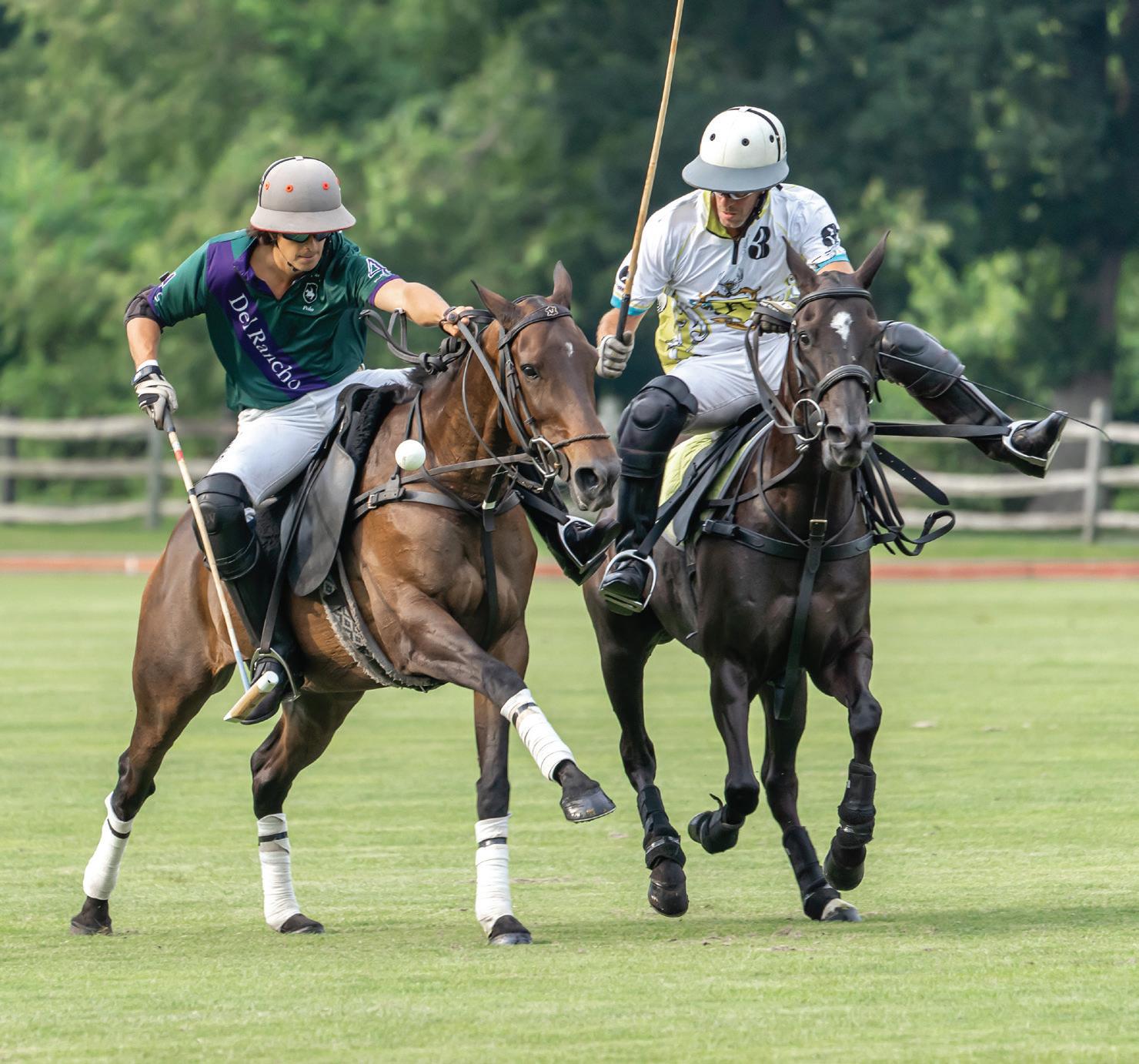
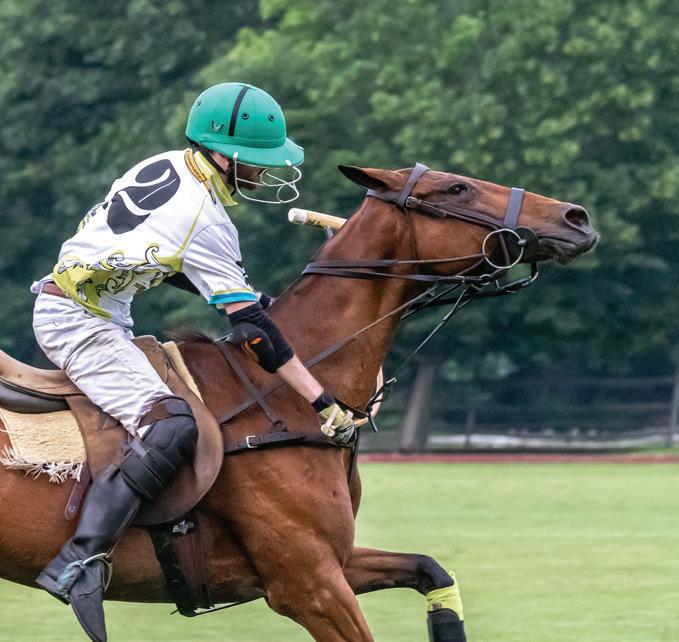
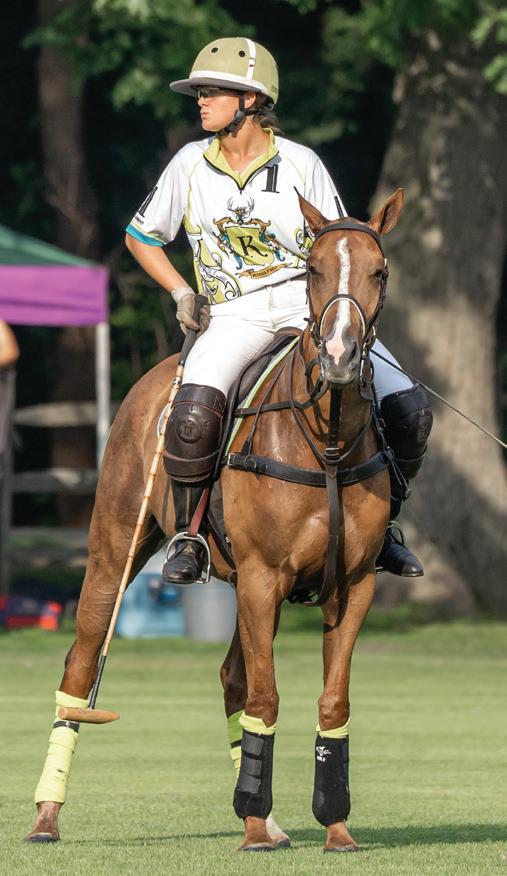
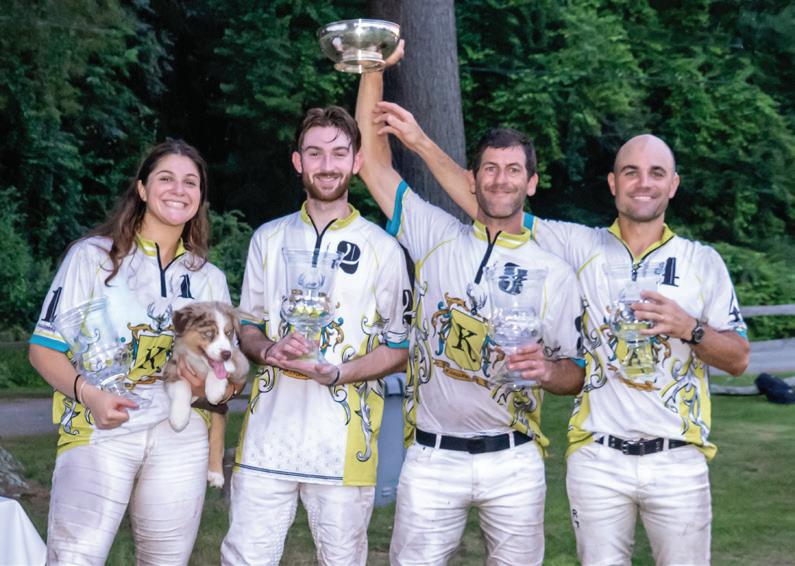

WINNING TEAM: Kingswood/ Longmeadow (Ari Dogani, Reed Miller, Federico Wulff, Rulo Trotz) went to overtime to outlast Del Rancho (Nachi Viana, CB Scherer, EJ Puch, Dave Strouss), 10-9.
MOST VALUABLE PLAYER: Ernesto “Rulo” Trotz
BEST PLAYING PONY: “Dolfina Galardonada,” owned by Nachi Viana


2024 myopia polo 55
TOURNAMENT
CYRIL HARRISON
Winning team Kingswood/Longmeadow (from left): Ari Dogani, Reed Miller, Federico Wulff, Ernesto “Rulo” Trotz
SPOTLIGHT
FINAL: KINGSWOOD/LONGMEADOW 10, DEL RANCHO 9
TOURNAMENT SPOTLIGHT
CHAIRMAN’S CUP
FINAL: DEL RANCHO/GLENN FARM 11, KINGSWOOD/LONGMEADOW 8
WINNING TEAM: Del Rancho/ Glenn Farm (Dave Strouss, Sam Clemens, CB Scherer, Nachi Viana) and Kingswood/Longmeadow (Ari Dogani, Reed Miller, Federico Wulff, Segundo Caimi, Rulo Trotz), 11-8.
MOST VALUABLE PLAYER: Segundo Caimi
BEST PLAYING PONY: Best Playing pony owned by Ernesto “Rulo” Trotz
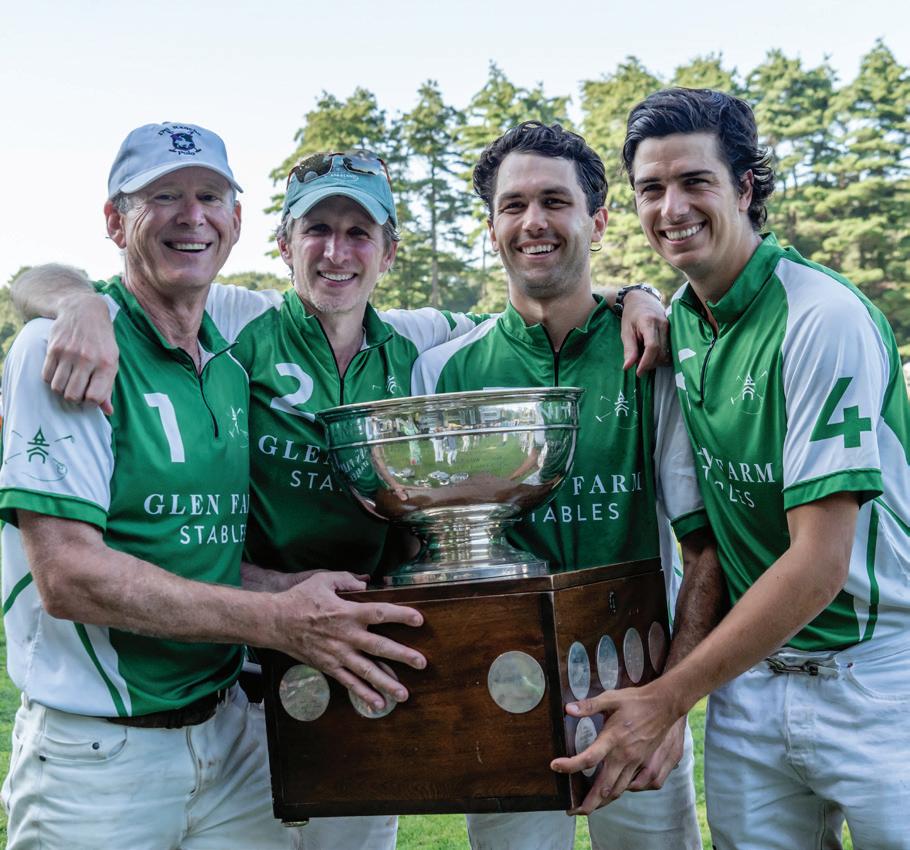
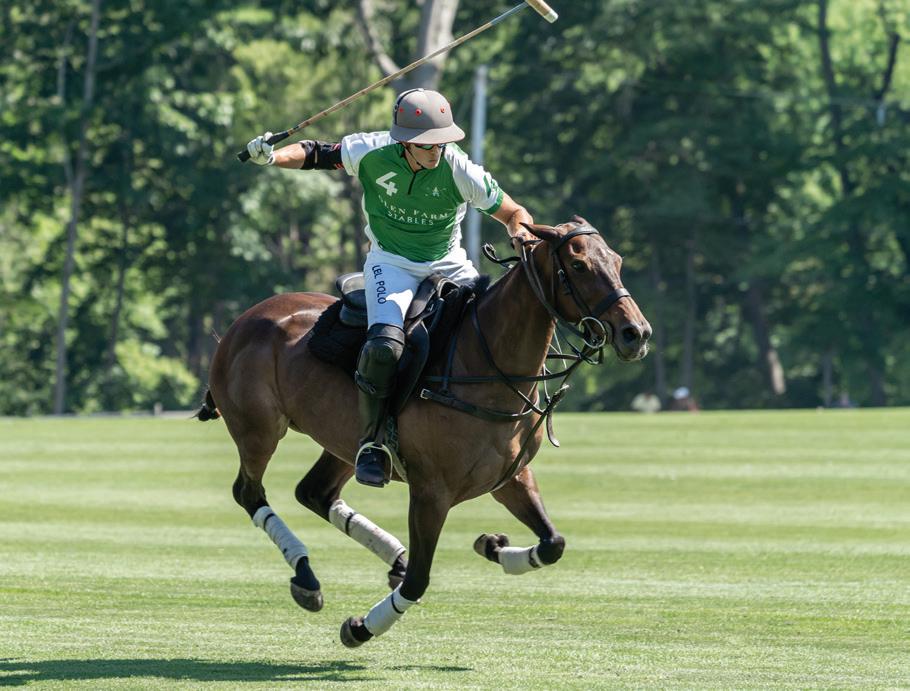
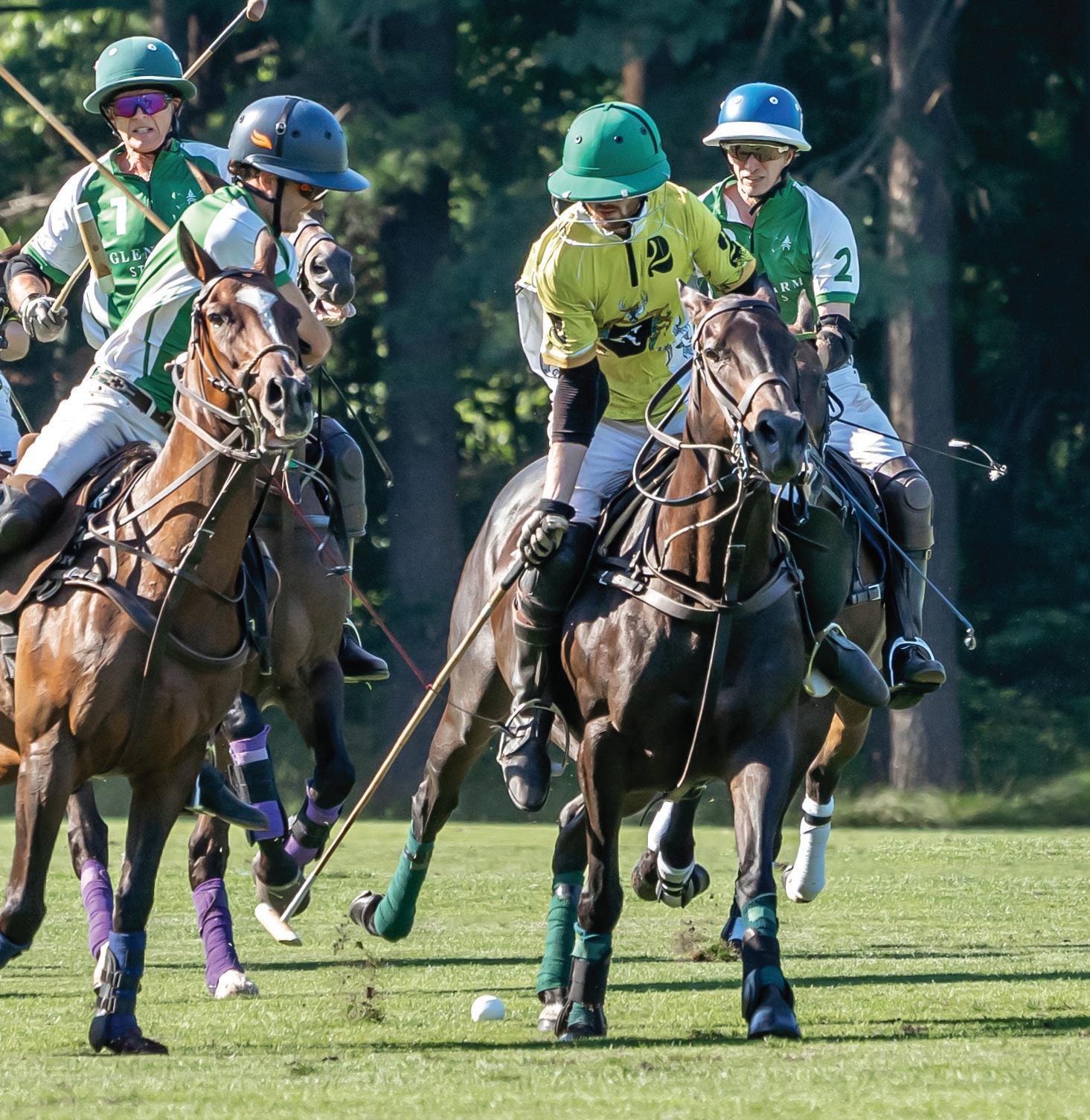
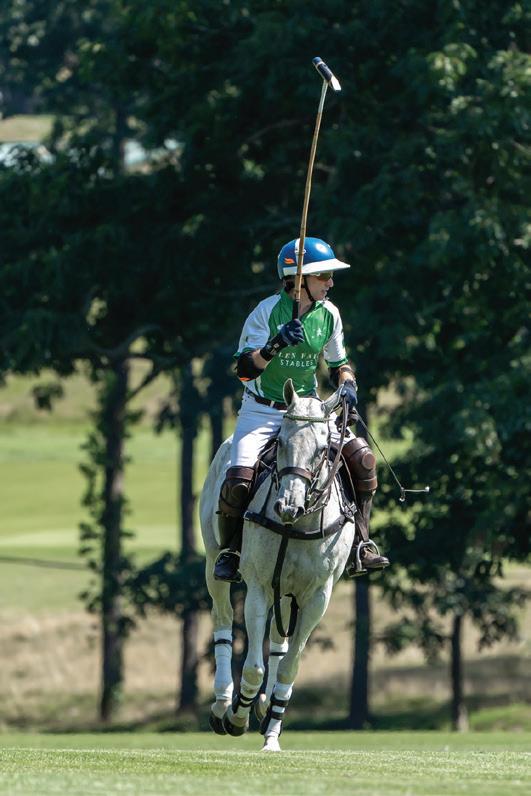
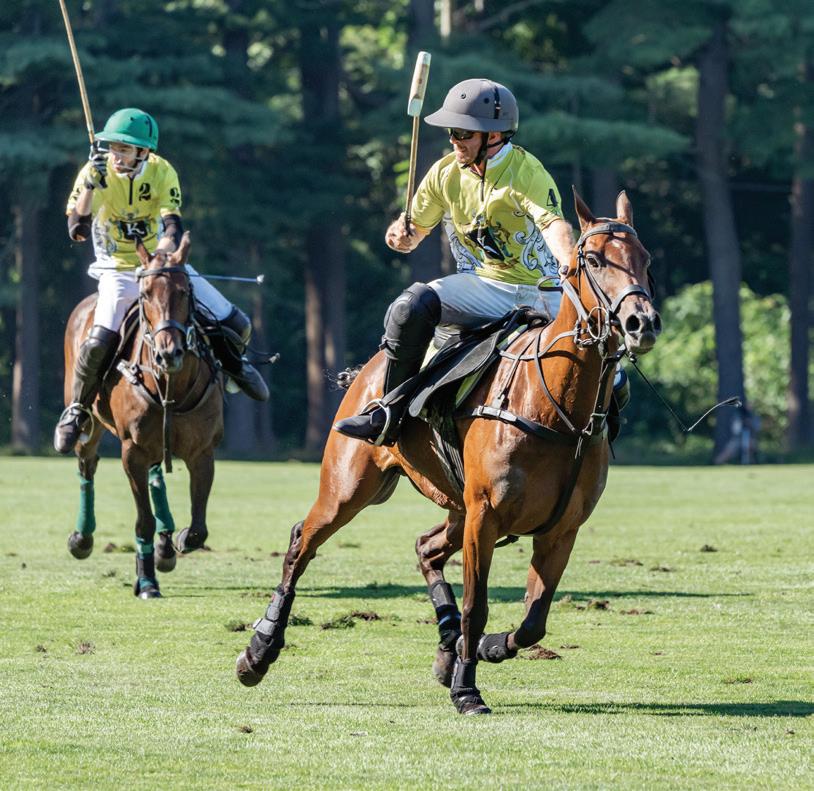
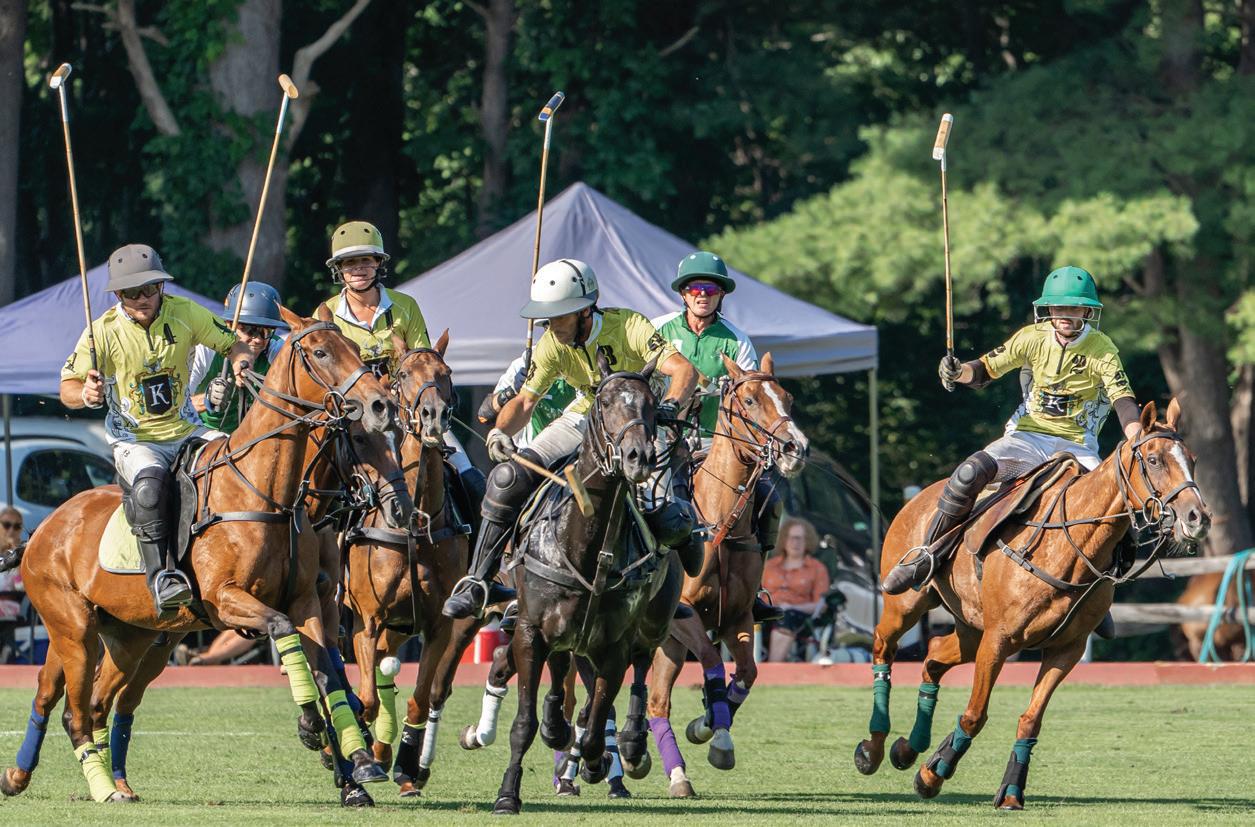
56 myopia polo 2024
Winning team Del Rancho/Glenn Farm (from left): Dave Strouss, Sam Clemens, CB Scherer, Nachi Viana
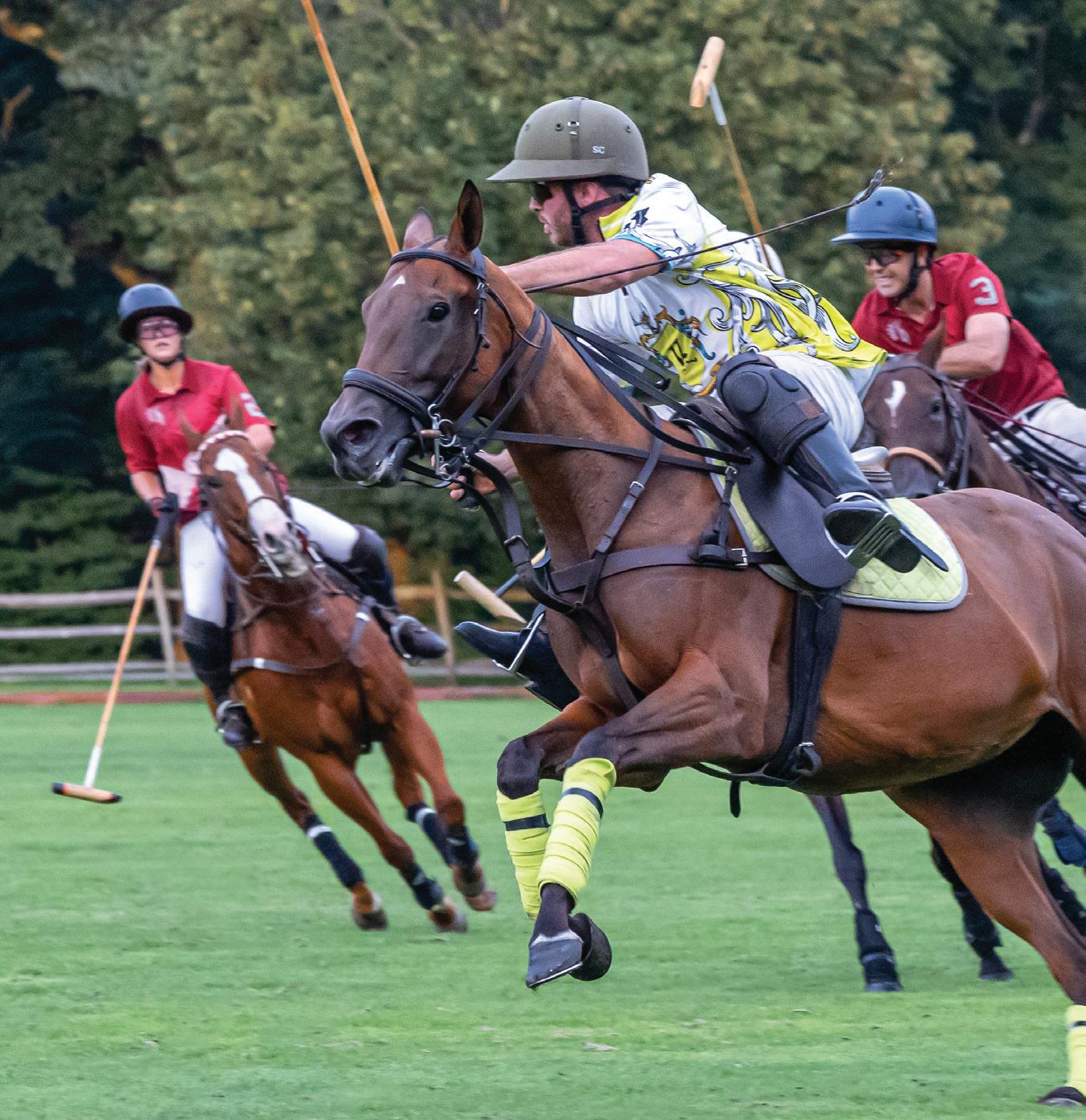
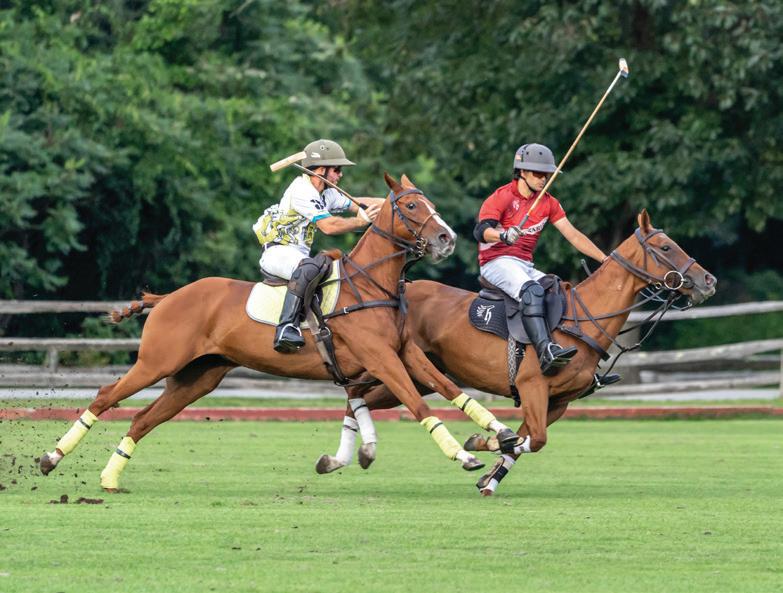
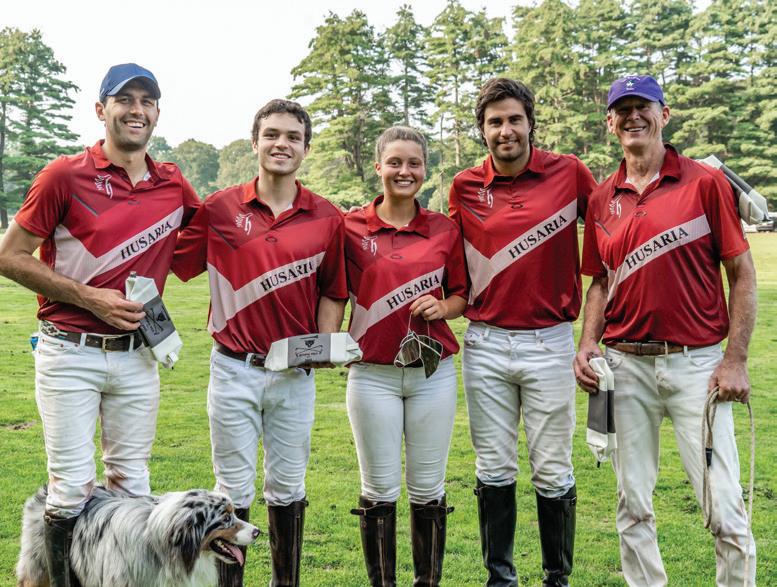
GEORGE S. PATTON JR. CUP
WINNING TEAM: Last year, the USPA Governor’s Cup was replaced by the George S. Patton Jr. Cup, named after one of Myopia’s most famous members, General George Patton Jr. In the finals, Del Rancho/Husaria (CB Scherer, Augie Grotnik, Grace Grotnik, Manuel Mazzocchi, Dave Strouss) edged Kingswood A (Ariadne Dogani, Amy Yancey, Segundo Caimi, Federico Wulff, Kathleen Reagan), 12-10.
MOST VALUABLE PLAYER: Manuel Mazzocchi
BEST PLAYING PONY: “Minima,” owned by Federico Wulff and played by Segundo Caimi


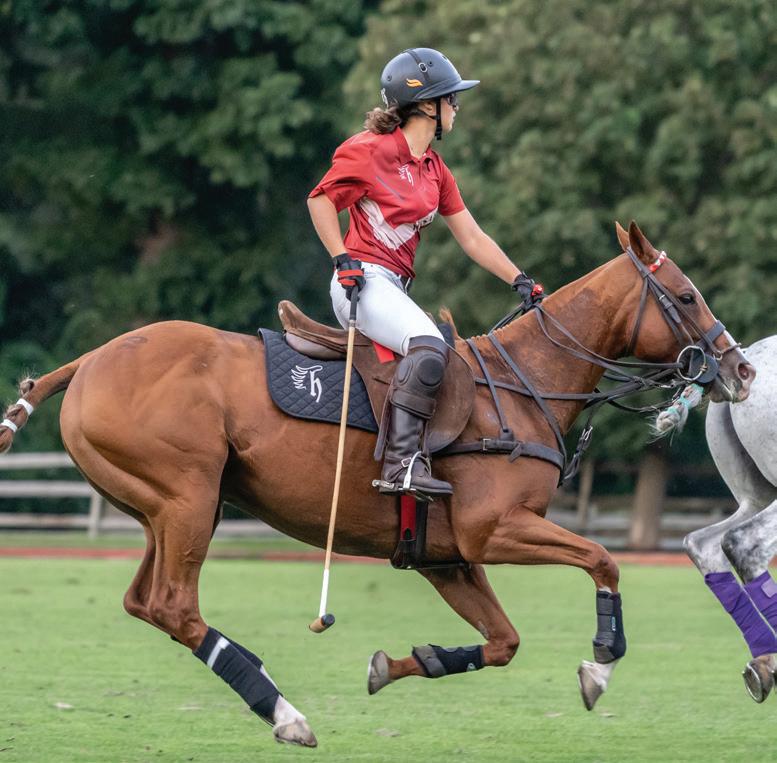
2024 myopia polo 57
TOURNAMENT SPOTLIGHT
Winning team Del Rancho/Husaria (from left): CB Scherer, Augie Grotnik, Grace Grotnik, Manuel Mazzocchi, Dave Strouss
FINAL: DEL RANCHO/HUSARIA 12, KINGSWOOD A 10
TOURNAMENT SPOTLIGHT
FORBE’S CUP
FINAL: KINGSWOOD 10, BLACKBURN FARMS/GALAXY 7
WINNING TEAM: Kingswood (Brynn Whitten, Emerson Bruce, Ariadne Dogani, Segundo Caimi, Federico Wulff) defeated Blackburn Farms/Galaxy (Walter Eayrs, James Grayken, Justin Daniels, Tommy Huber), 10-7.
MOST VALUABLE PLAYER: Segundo Caimi
BEST PLAYING PONY: “Easy Dance,” owned and played by Federico Wulff
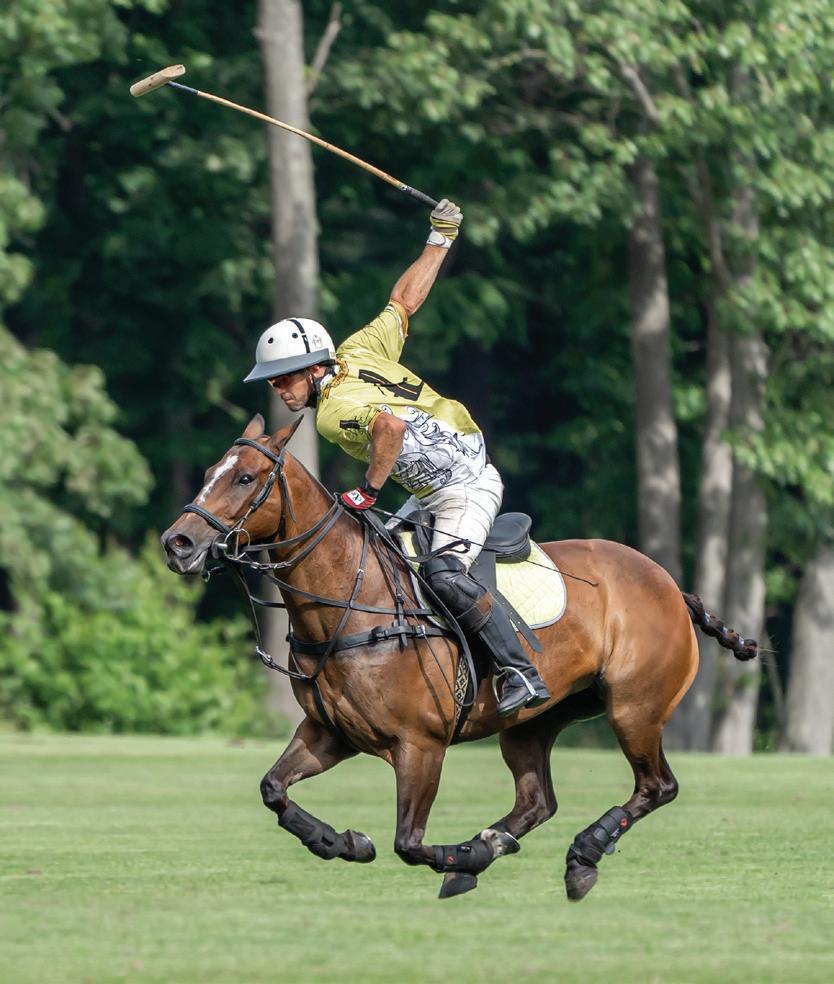
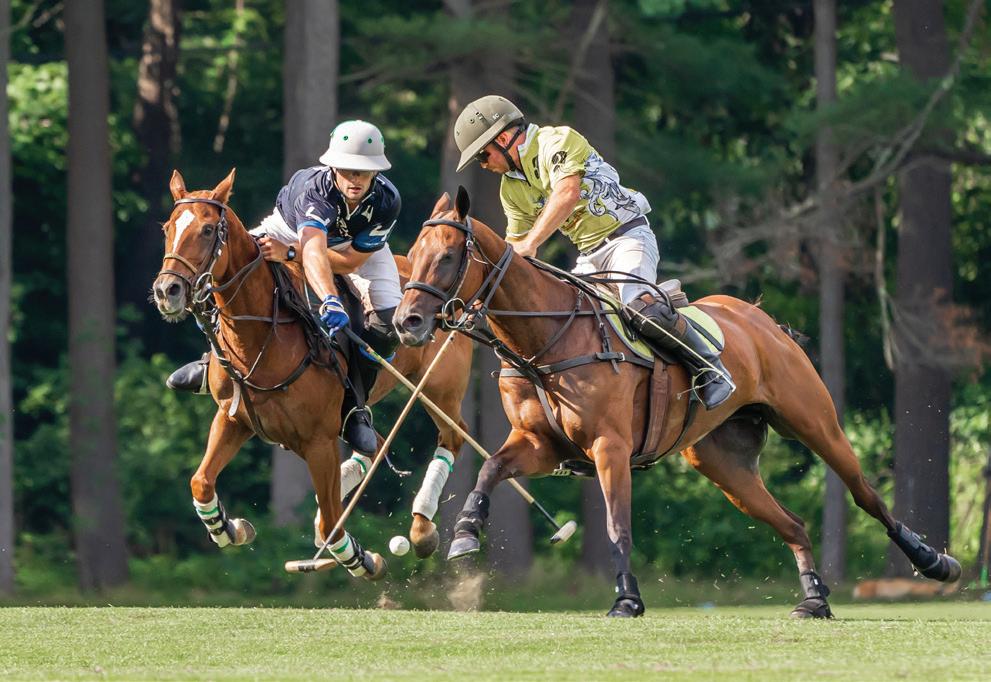
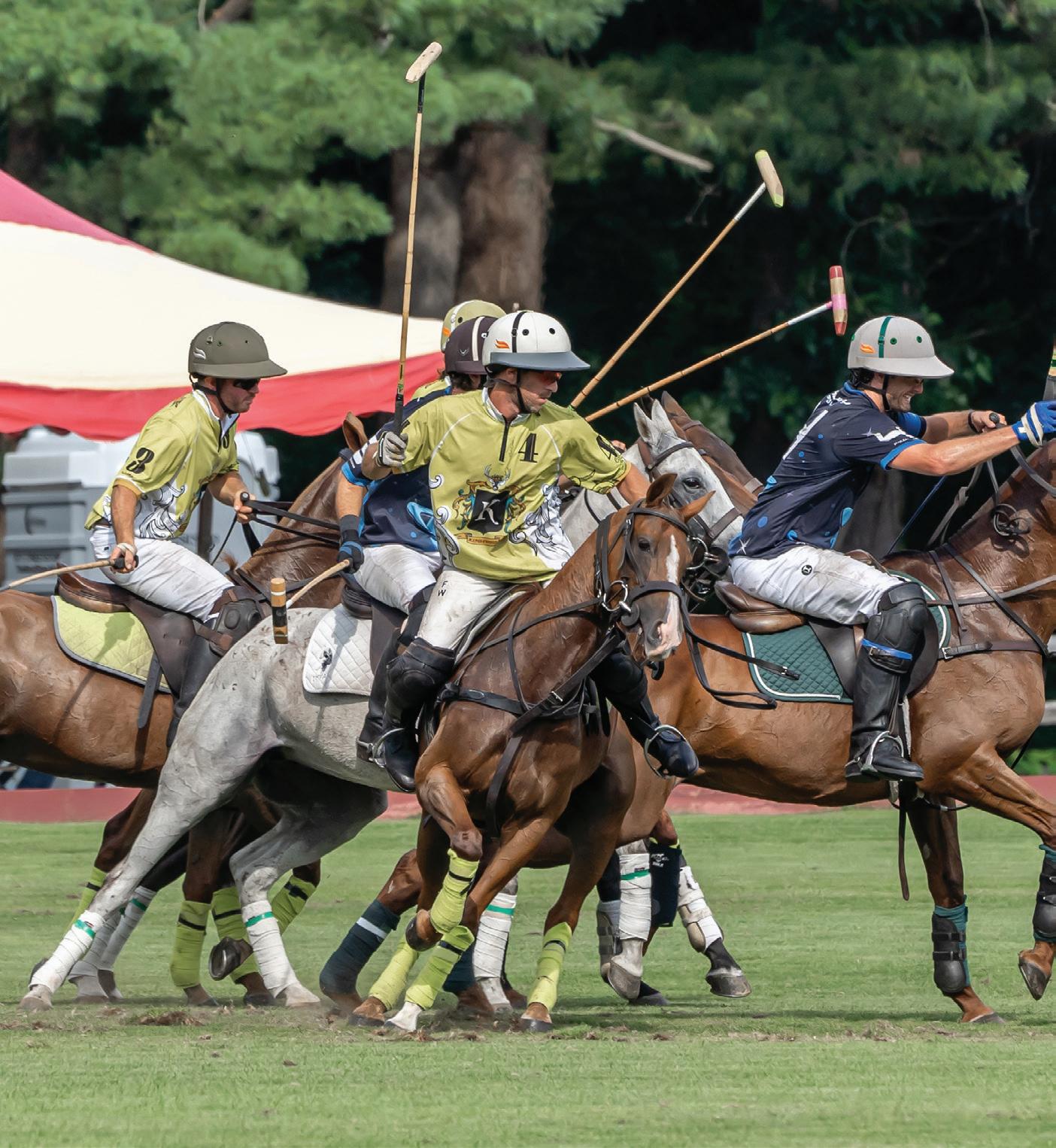
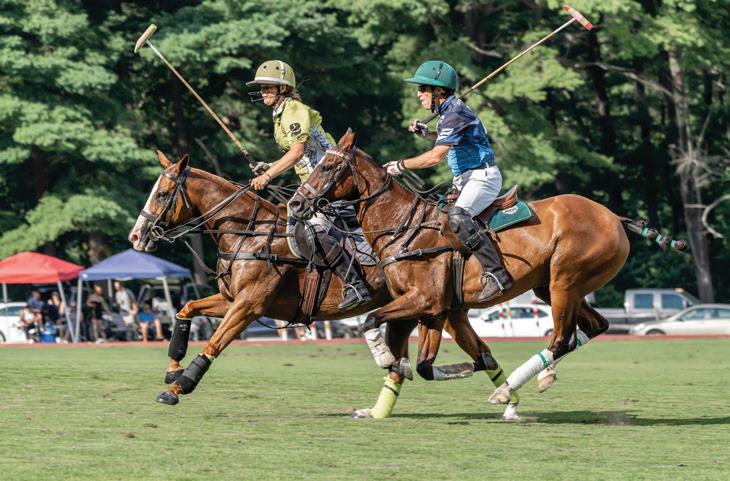
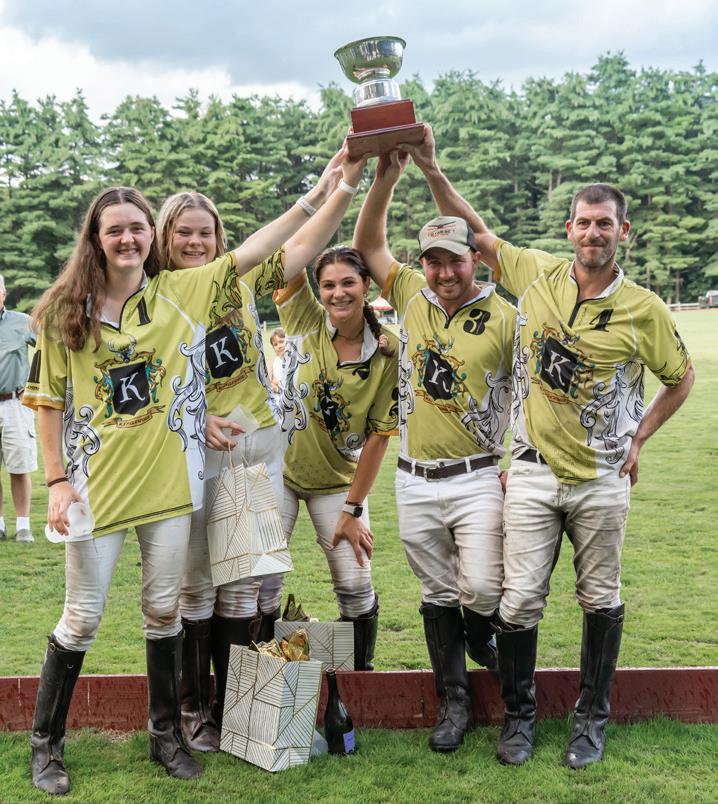
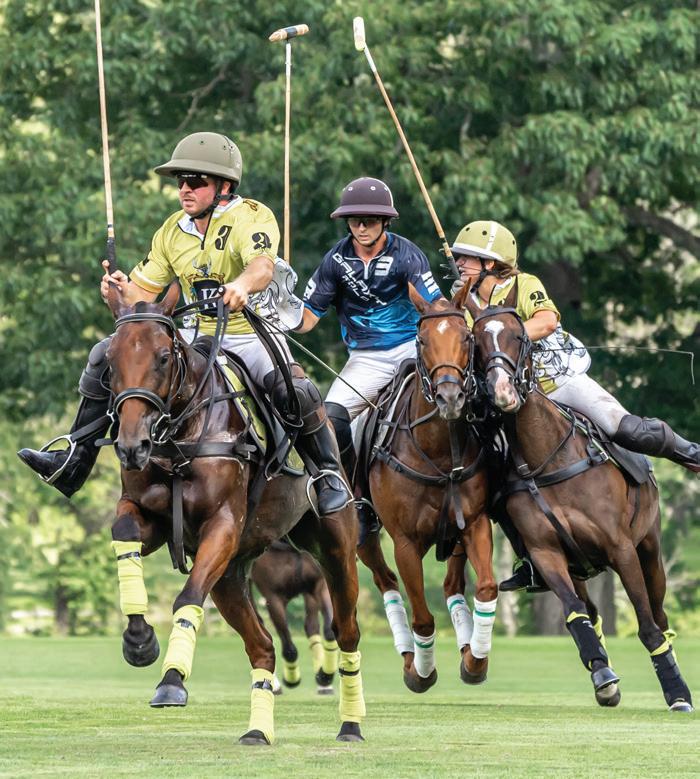
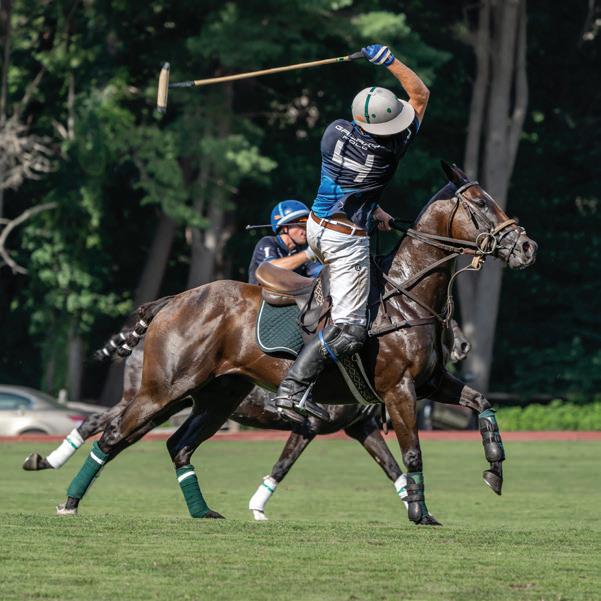
58 myopia polo 2024
Winning team Kingswood (from left): Brynn Whitten, Emerson Bruce, Ariadne Dogani, Segundo Caimi, Federico Wulff
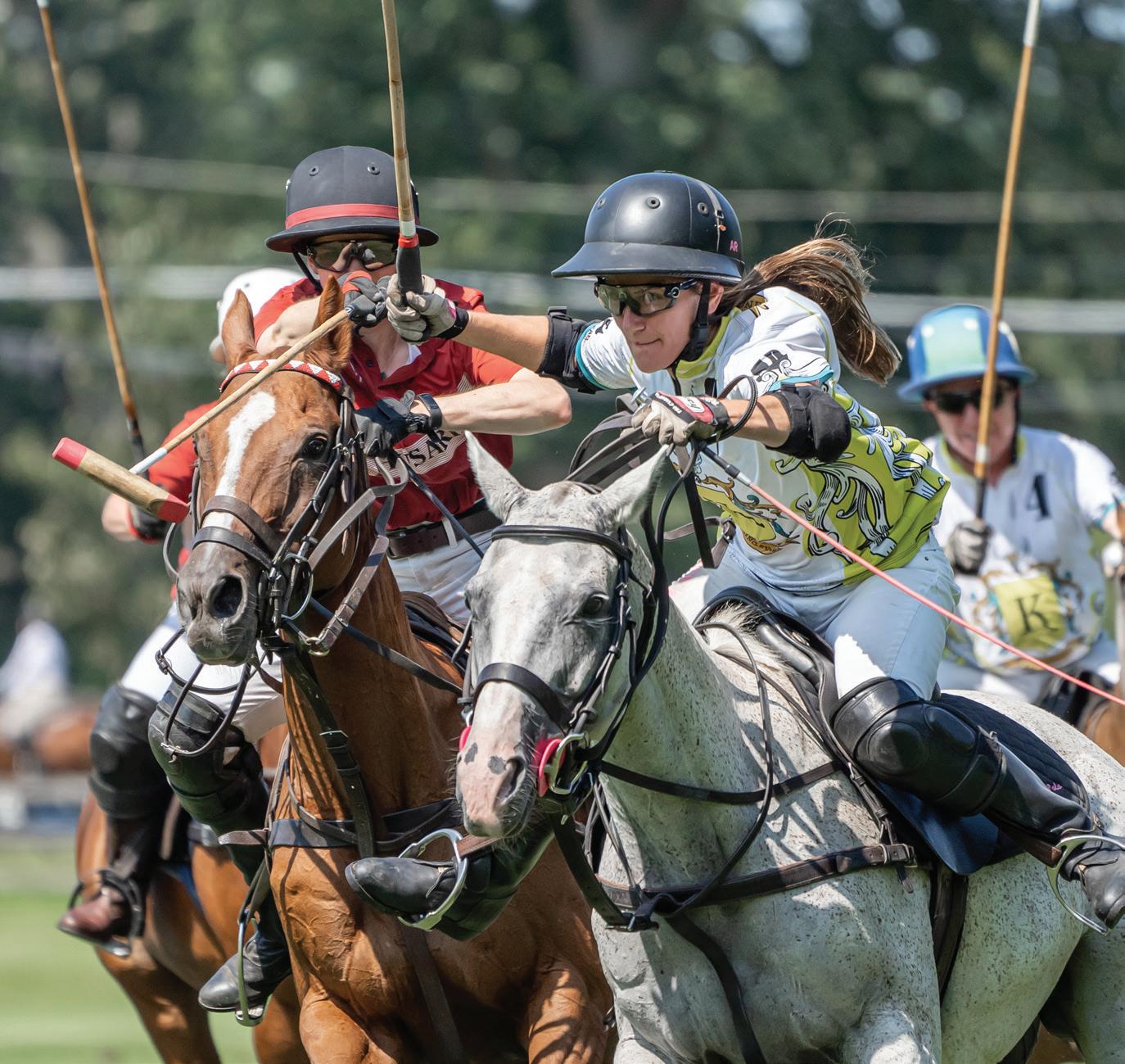
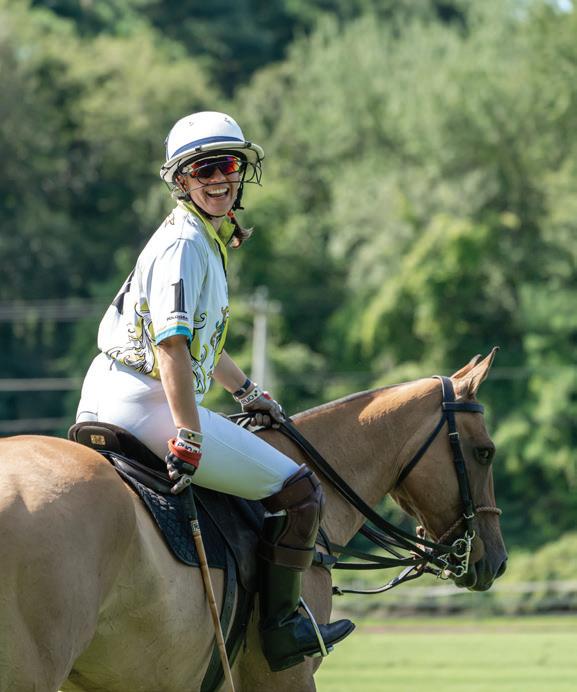
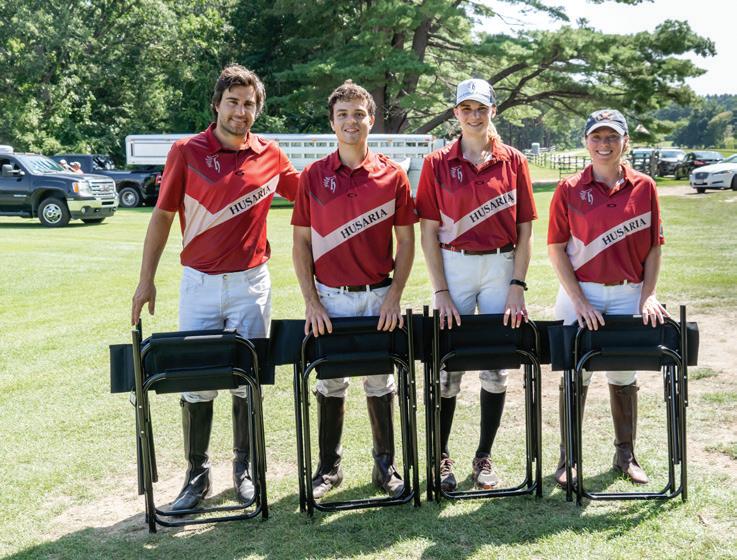
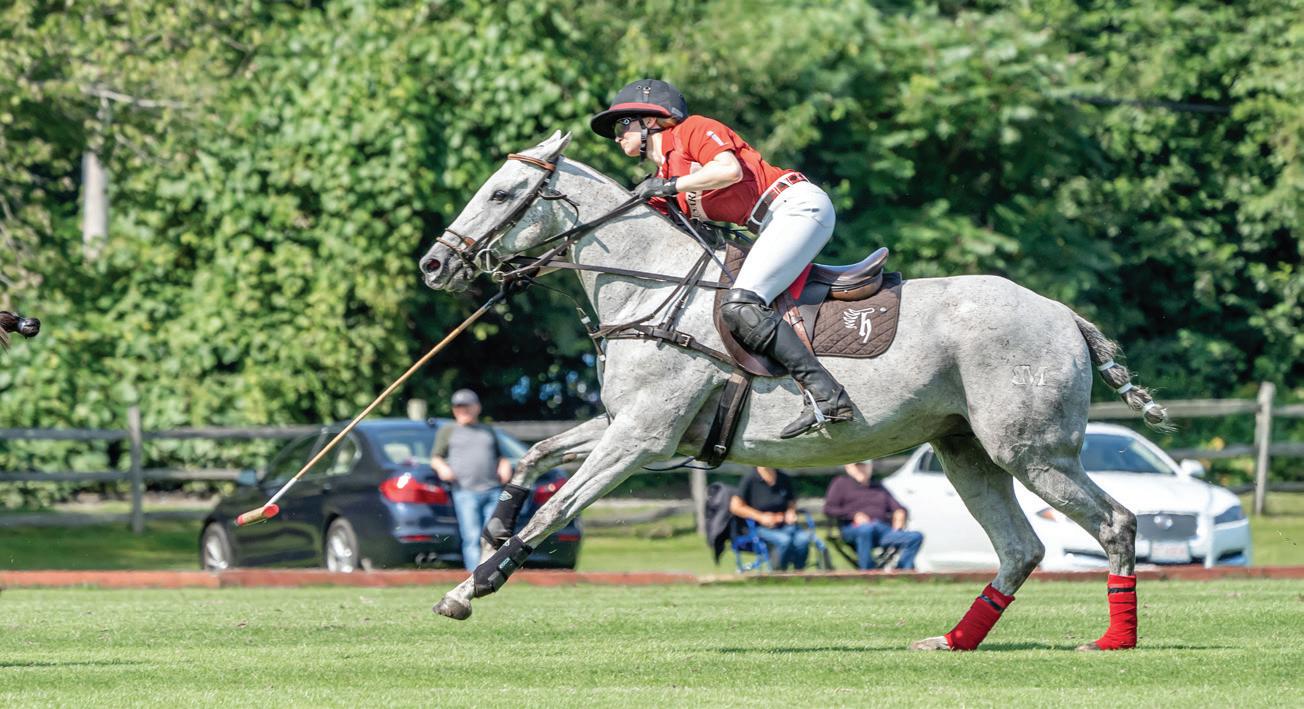
FINAL: HUSARIA 10, KINGSWOOD B/PONY UP 9
WINNING TEAM: Husaria (Manuel Mazzocchi, Augie Grotnik, Abby Kotwick, Kristin Costa) registered a nail-biting 10-9 victory over Kingswood B/Pony Up (Amelia Caflisch, Rick Salter, Amanda Poor Roberts, Rulo Trotz, Steve Rudolph).
MOST VALUABLE PLAYER: Augie Grotnik
BEST PLAYING PONY: “Mono,” owned by Ernesto Trotz
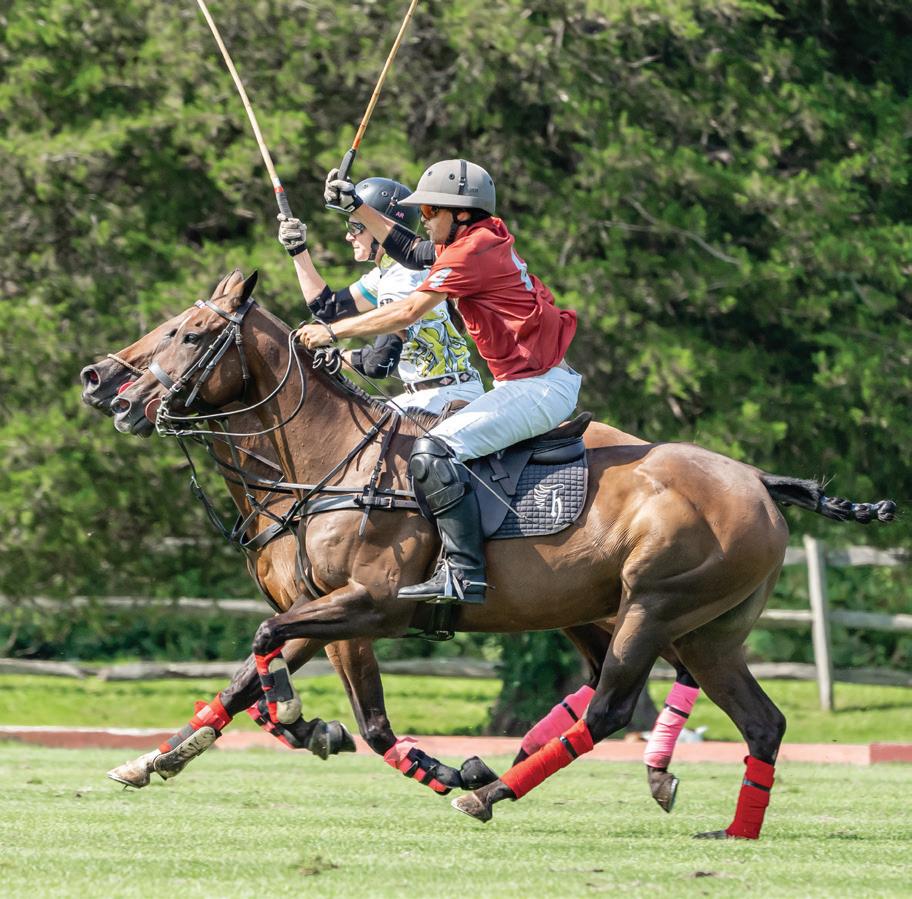
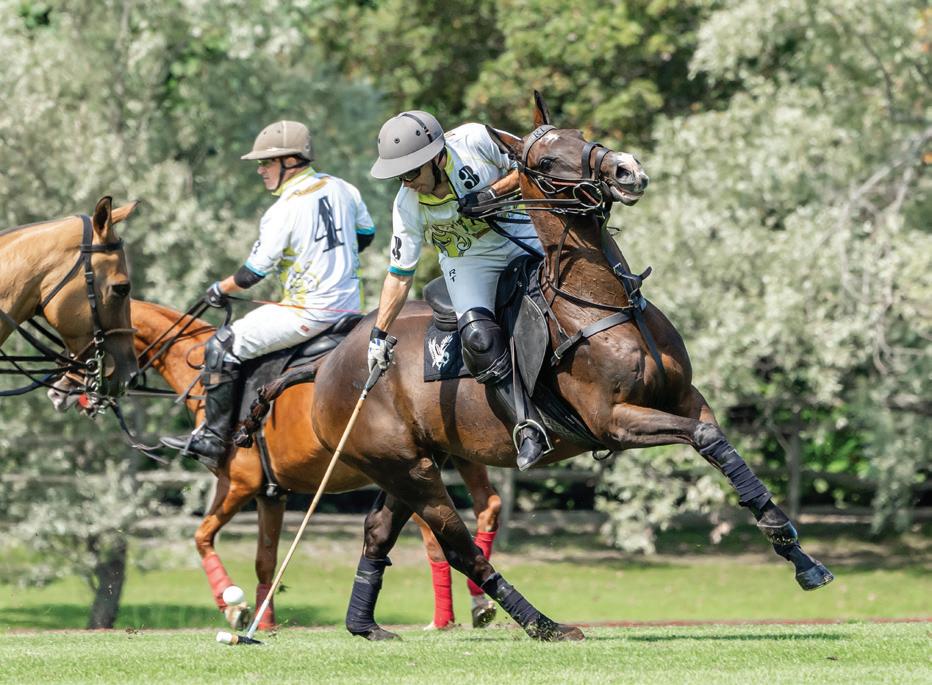
2024 myopia polo 59
Winning team Husaria (from left): Manuel Mazzocchi, Augie Grotnik, Abby Kotwick, Kristin Costa
TOURNAMENT SPOTLIGHT CROSSMAN CUP
NORTHEASTERN WOMEN’S CHALLENGE
FINAL:HUSARIA 8, NEWPORT 4
WINNING TEAM: Husaria (Aurelia Rus, Emerson Bruce, Abby Kotwik, Grace Grotnik) delivered a dominating performance, getting the better of Newport (Anna Dwyer, Rebecca Nordstrom, Megan Shulz, Jennifer Williams), 8-4.
MOST VALUABLE PLAYER: Emerson Bruce
BEST PLAYING PONY: “Prima,” owned by Grace Grotnik
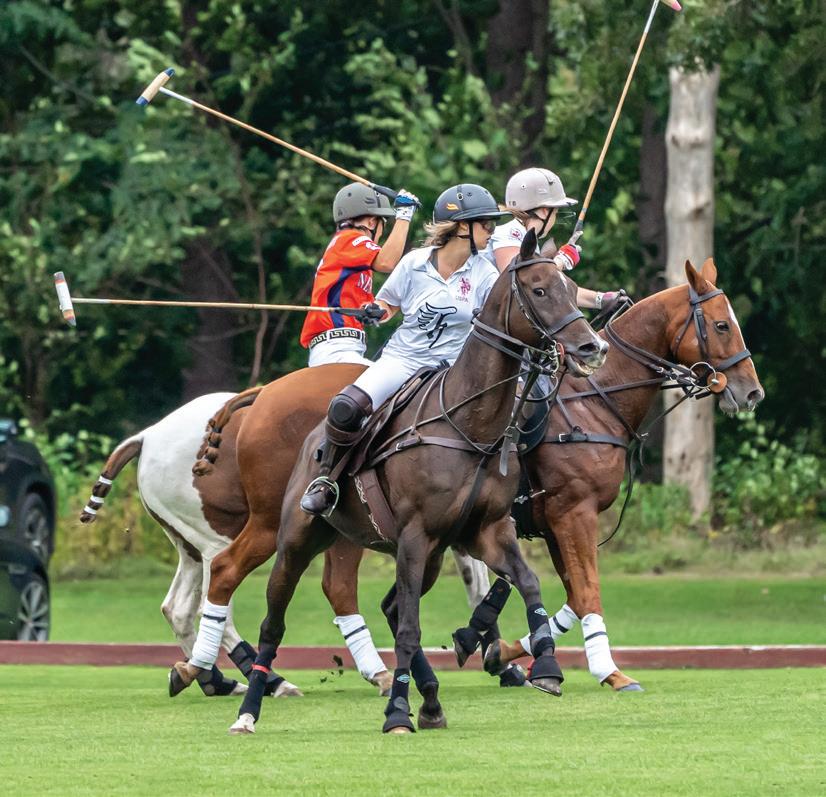
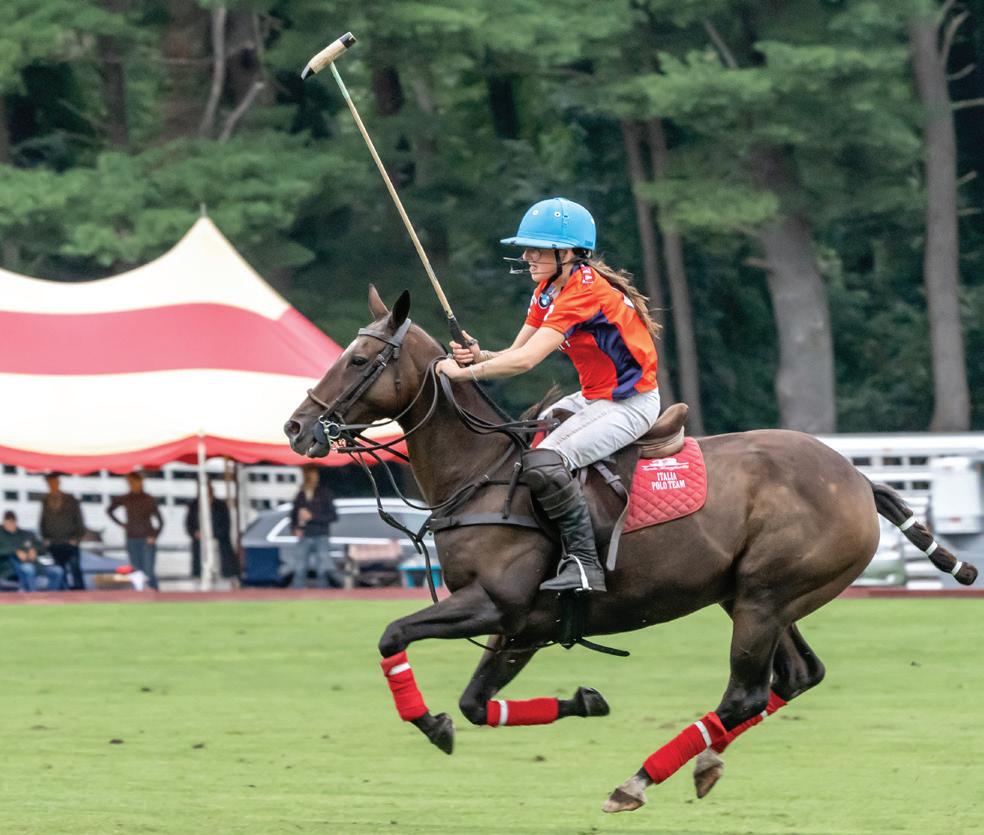
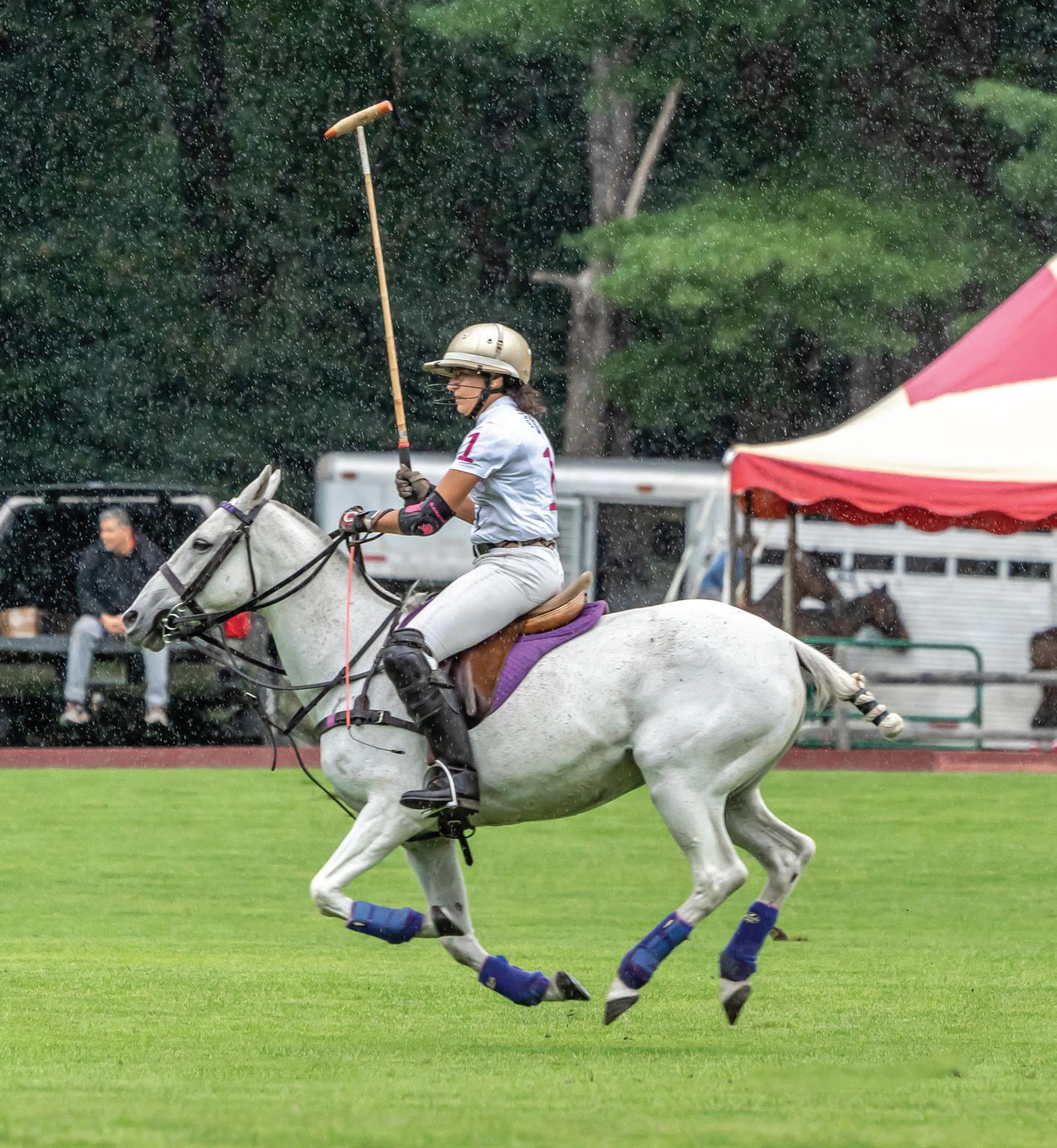

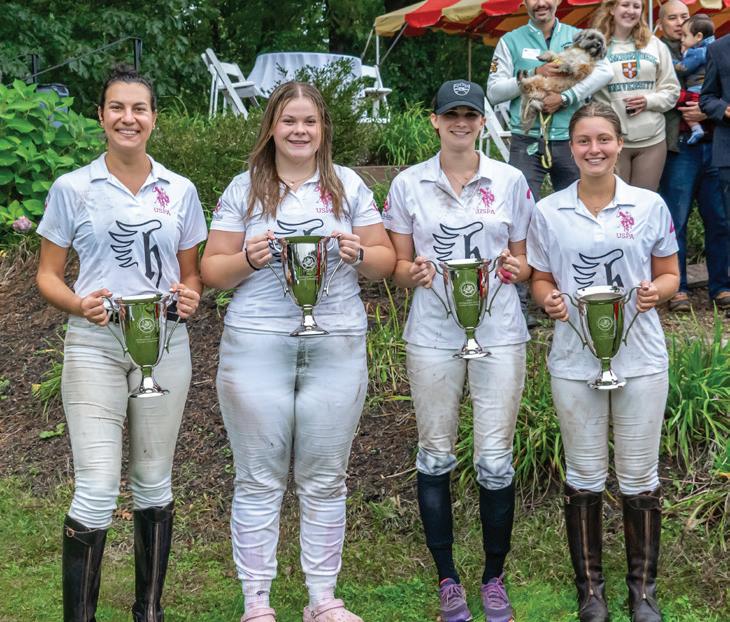

60 myopia polo 2024
TOURNAMENT SPOTLIGHT
Winning team Husaria (from left): Aurelia Rus, Emerson Bruce, Abby Kotwik, Grace Grotnik

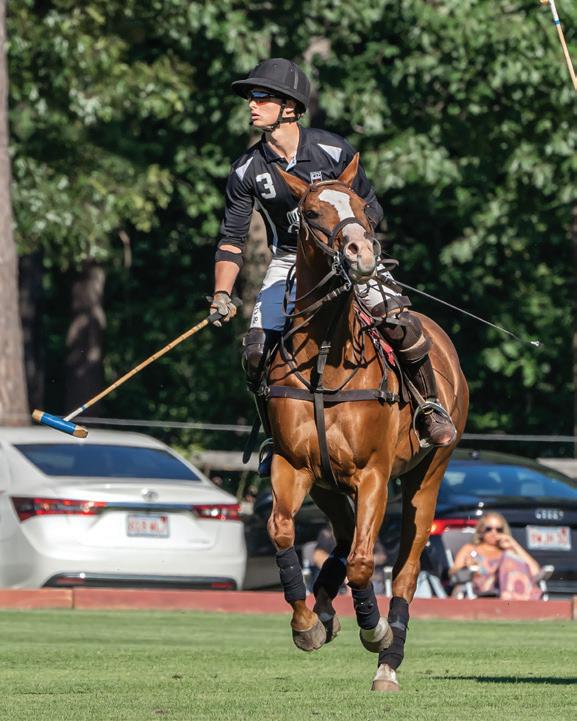



FINAL:HARVARD 8, NEW ZEALAND 3
WINNING TEAM: Harvard (Capt. Mia Colman, Jara Wilkenson, Cate Buchan, Luke Lawson, and alumni Nicholas Snow, Stephen Burr , W. Albany Mulholland) bested their opponents from below the equator, New Zealand (Herbie Coates, Zach Keyte, Jay Wilson, Max Dormer), 8-3.
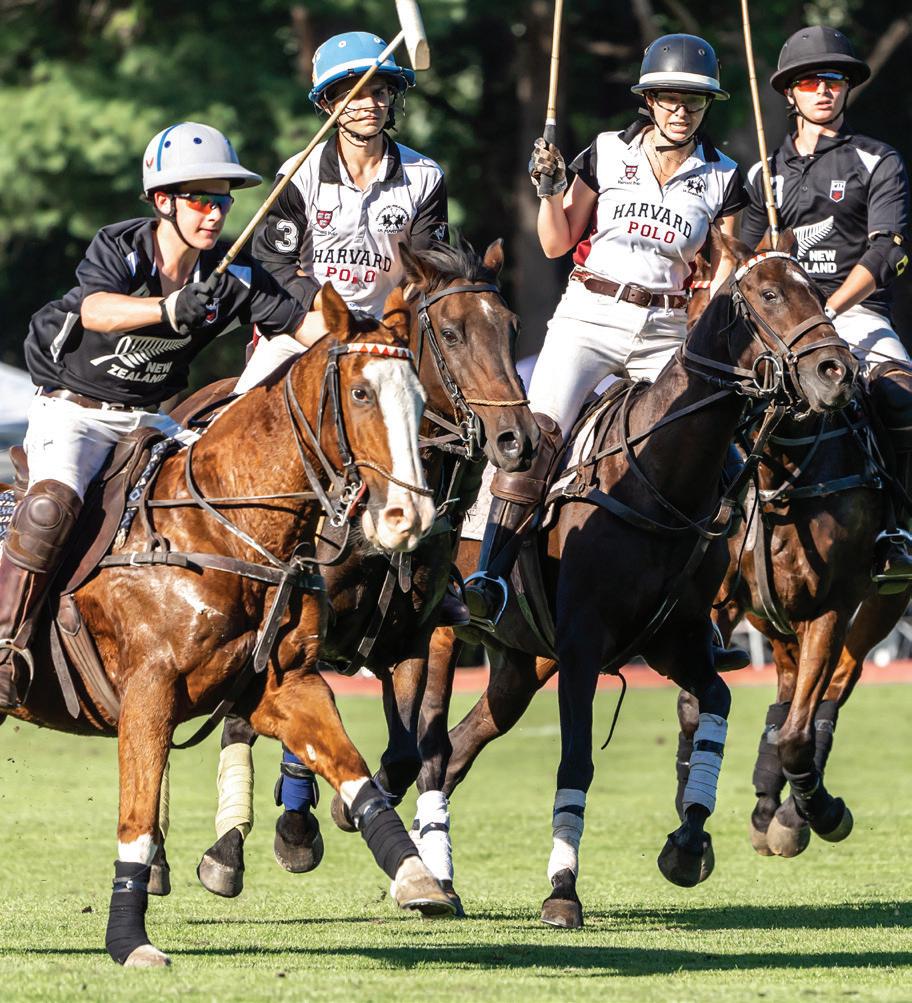
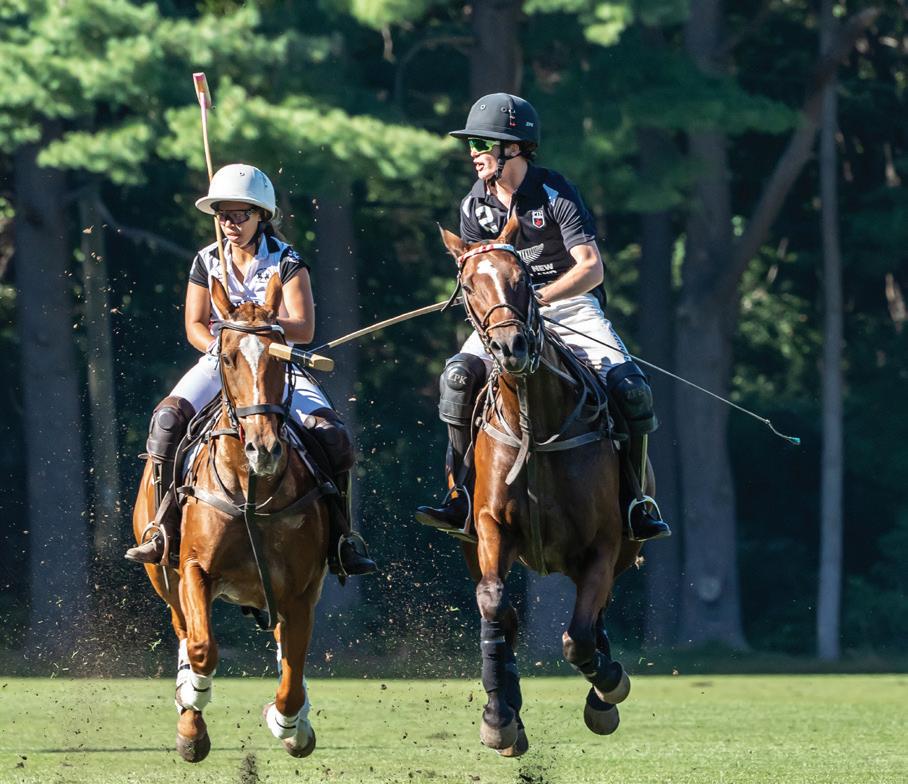
2024 myopia polo 61
TOURNAMENT SPOTLIGHT
HARVARD INVITATIONAL
Winning team Harvard (from left): Maria De Los Santos, W. Albany Mulholland, Stephen Burr.

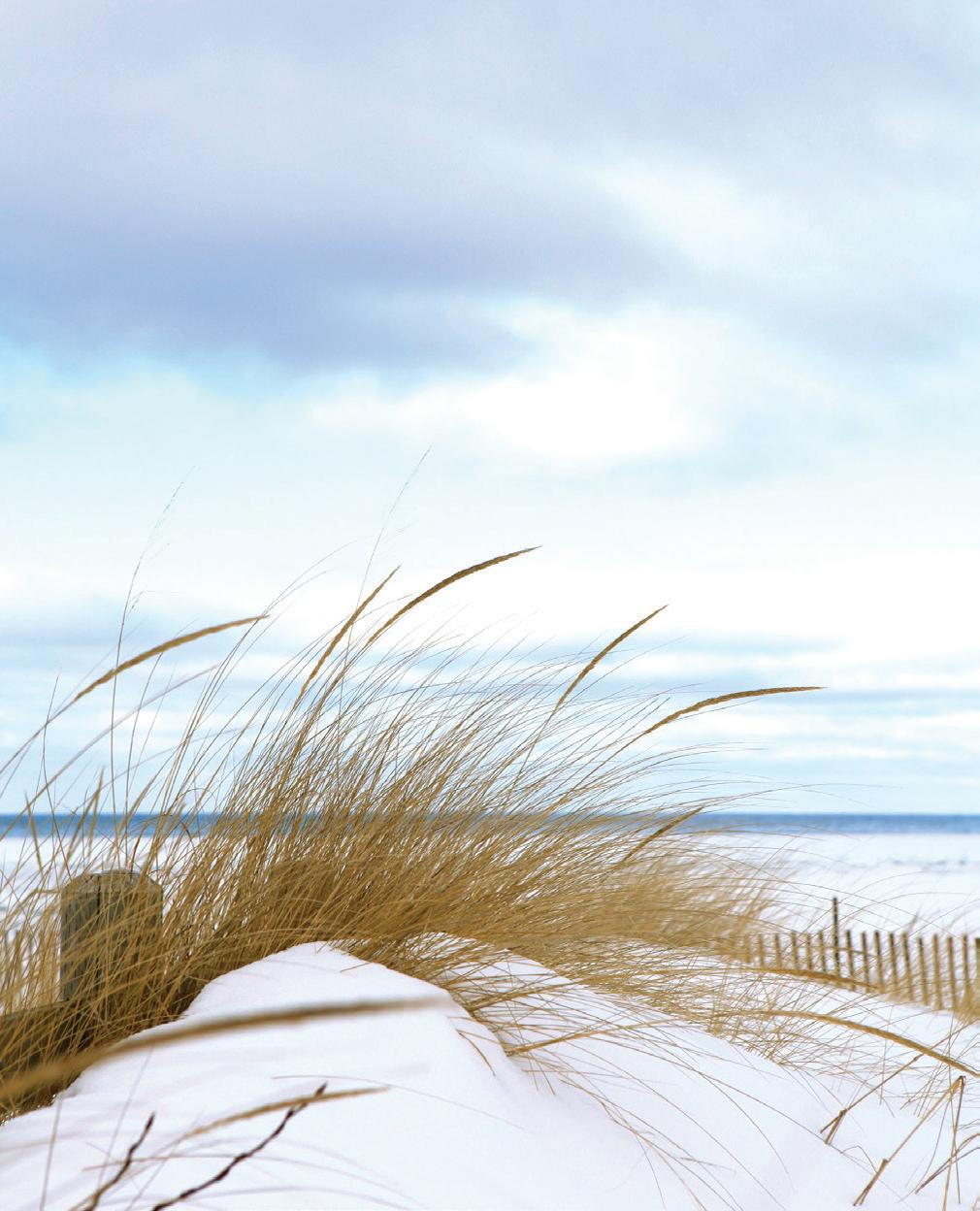
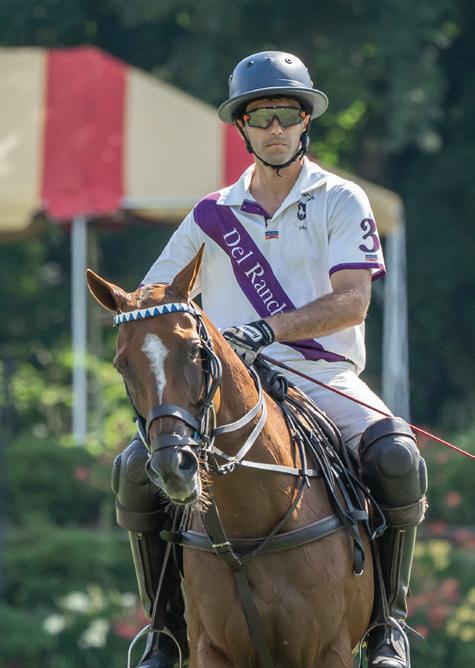
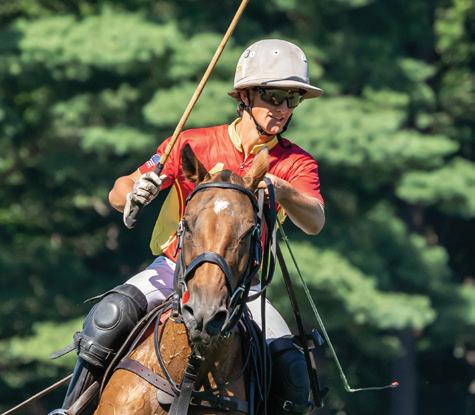
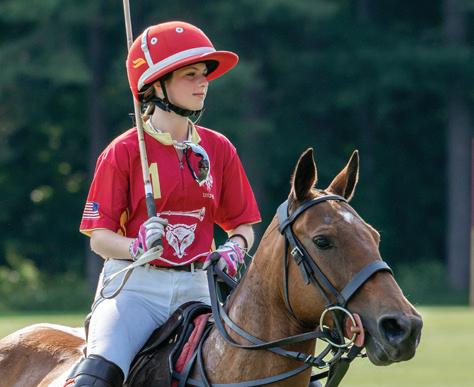
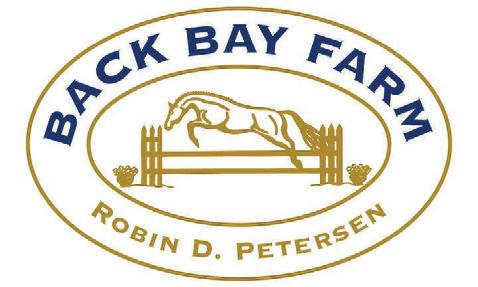
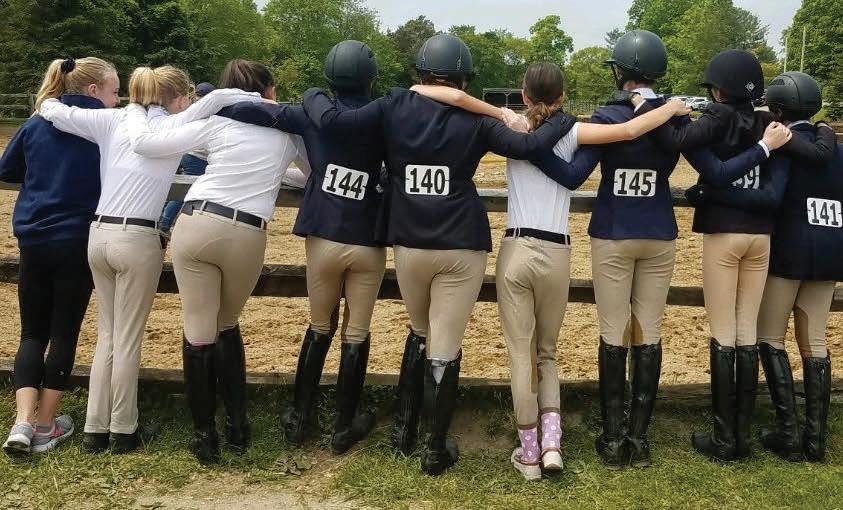
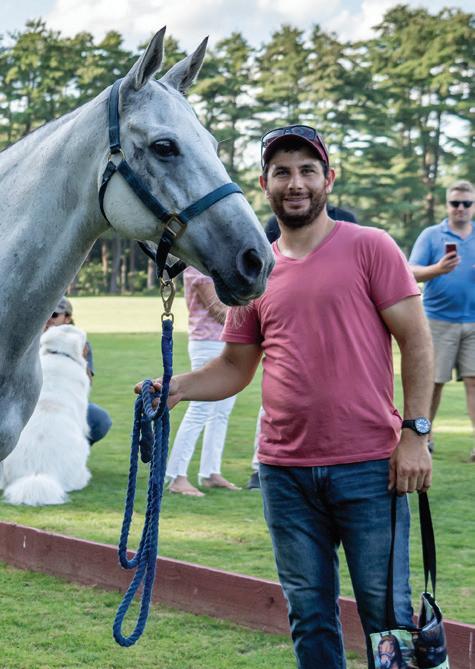
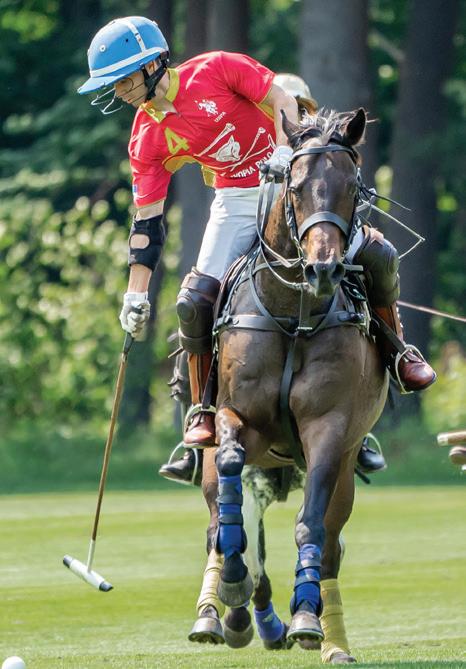
Congratulations to the following 2023 award recipients: Building & Preserving Wealth Since 1983 www.eCabot.com | 800-888-6468 | info@eCabot.com We believe financial success is achieved when your assets empower you to reach your goals. MHC NEHC HORSE SHOWS May 12 & August 15 50 CANDLEWOOD RD., IPSWICH, MA BACKBAYFARM.COM 978-356-0730 Instruction available for riders of all levels AWARDS CLINT
EXCELLENCE IN EQUINE WELFARE: CB
BILLY LINFOOT MOST IMPROVED: EJ
and
OWEN
CLUB
2023 USPA CLUB AWARDS SPORTSMANSHIP Patricia “Trish” Johnstone MOST IMPROVED EJ Puch & Ava Croce BEST GROOM Guillermo Giangrieco BEST STRING Ari Dogani 2023 MYOPIA POLO BALL AWARDS
NAGLE
Scherer
Puch
Ava Croce
O’HANLON BEST GROOM: Guillermo Giangrieco
POLO PONY OF THE YEAR: “Bebop,” owned by Stephen Burr
TRIBUTE
CB Scherer’s Long Road to Myopia
by Brion O’Connor
Myopia Polo member Nicholas “Nick” Snow was in a jam in the summer of 2014. His squad had a major tournament at Myopia looming, and one of his teammates was injured. Snow reached out to a young professional he knew, a Florida native who had won three national polo championships at the University of Virginia.
Carl “CB” Scherer had recently accepted a job with a real estate investment firm in Boston, but hadn’t yet relocated to the city.
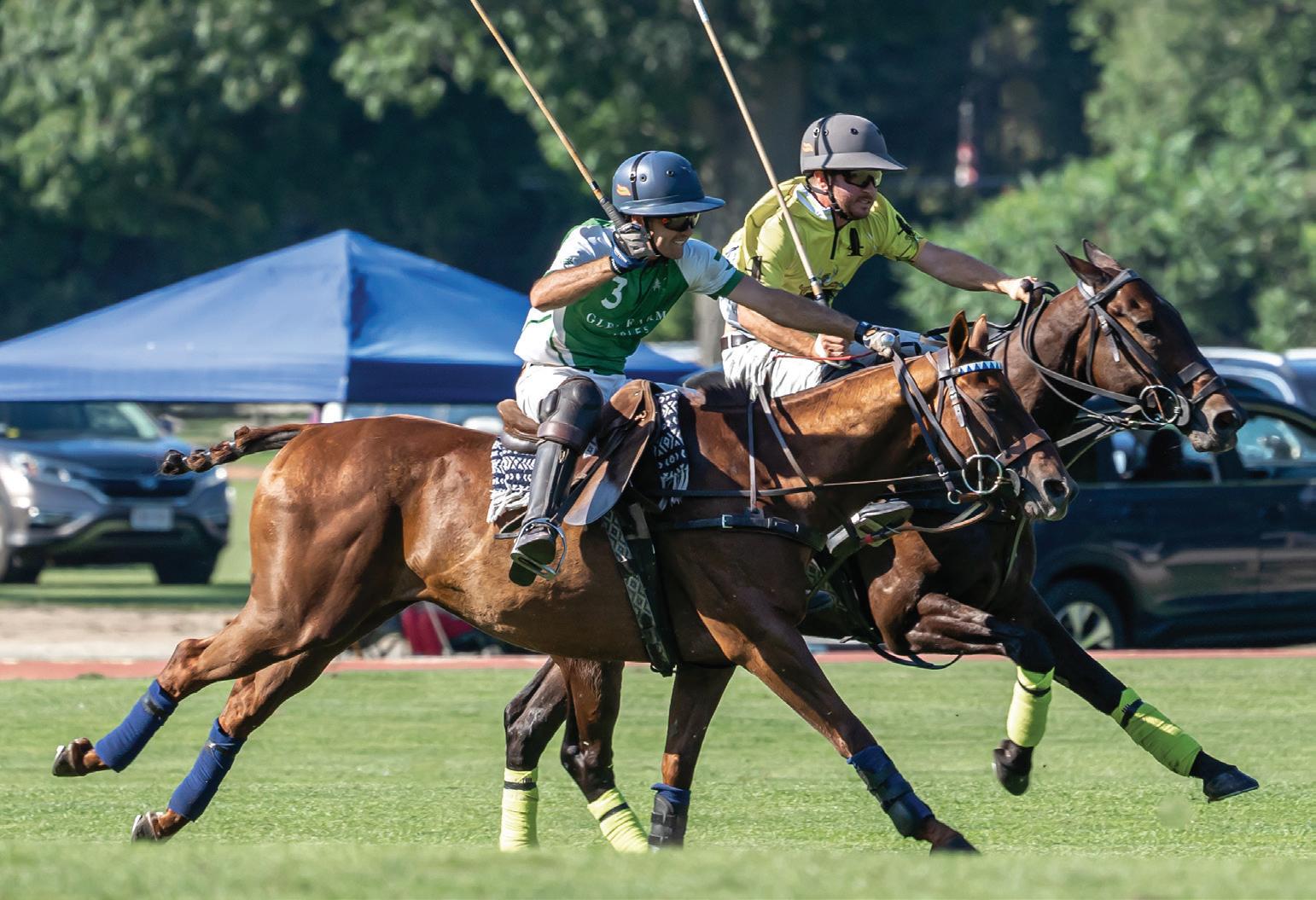
“Nick called me and said one of his teammates broke their arm and he needed someone of my handicap level to fill in, and would I be willing to take the train up and play the following day,” says Scherer, now 34. “I said, ‘Of course.’
“I did anything and everything to play polo,” he says. “So I rode the train, and Nick picked me up at South Station. I don’t know if we won or lost, but that was the first introduction I had to Myopia. I’d never been to Boston before.”
Scherer has now lived in Boston for the past decade, but Myopia has become a second home.
“A pretty amazing part of the city is, without traffic, you’re only 40 minutes
away from a really historic polo facility — Myopia — and people who are very passionate about fox hunting, jumping, polo,” he says. “It has really historic equestrian roots that go pretty deep.”
But the road that led Scherer to Boston’s North Shore has numerous twists and turns. He and his younger brother, August, grew up on a farm in Wellington, Florida, adjacent to the South Forty Polo Club. His father, Brad Scherer, raised horses and played polo, just like Scherer’s grandfather, Allan, did at nearby Almar Farm, which he owned with his wife, Margaret. Allan Scherer even played on the last all-amateur team to win the U.S. Open, and once competed at Myopia during the East
Coast Open. Allan and Margaret Scherer were also instrumental in bringing significant financial support to the sport, and specifically Palm Beach Polo. His uncle, Warren Scherer, also reached the U.S. Open.
“Every kid looks up to their father, their grandfather, and both of them were great,” says Scherer, noting his father still plays. “Both were great polo players.”
Scherer also developed an abiding respect for his family’s ponies. “They are incredibly special, loyal animals,” he says.
“Ultimately, when you win a tournament, both the human team and the horse team need to function at full capacity,” says Scherer. “It’s hard to even describe how special it is when you have a close relationship with your horses and they give you a good day.”
Both Brad and Bettina Scherer worked in Florida real estate, and instilled an appreciation for a lifestyle that revolved around horses, family and their careers.
“My parents put me on a horse before I could walk, and I just grew up in the barn,” says Scherer. “My passion for horses came from seeing my parents’ passion for horses.
“I woke up seeing the horses in the pasture, or my parents feeding them early in the morning before they went to their day jobs,” he says. “It was a really unique childhood that, in hindsight, I’m really fortunate to have gotten.”
Like their father, both CB and August attended Culver Academy in Indiana, a military school known for producing some of the country’s finest cavalry soldiers and polo players. Scherer then took his talents to the University of Virginia in 2008, and promptly won an intercollegiate polo championship his freshman year in the spring of 2009.
“We had a great team,” he says. “Felipe (Viana, of Uruguay), who has played the last few summers at Myopia, was my teammate and roommate. And my
2024 myopia polo 63
Photos by Jacquline Miller Photography
CB Scherer, foreground, playing for Del Rancho/Glenn Farm, competes against Segundo Caimi of Kingswood/Longmeadow during the Chairman’s Cup finals.
TRIBUTE
freshman roommate was Maurico Lopez from Colombia. Both of them were the stars of the show, but the three of us played together for a year, which was really cool.”
The Cavaliers were also intercollegiate champions in 2011 and repeated in 2012. “At UVA, I would ride before class, at lunch, after school,” he says. “I rode every single day, played a ton, and that was amazing.”
After graduating from the University of Virginia, Scherer moved to New York City to join Morgan Stanley. “Going to New York to work for an investment banking firm, that part of my life obviously took a backseat,” he says. “But I was really fortunate to have enough contacts in the polo world.”
One of those contacts was Sam Ramirez, Jr. an investment banker who founded Haviland Hollow Farm, a polo club in Patterson, N.Y.
“He’s an unbelievable guy,” says Scherer. “I’d take the train late on a Friday, or really late after work, and play some arena polo with him. He really let me participate in his program at no cost, or negligible cost. He was so welcoming to someone who just shared his passion for polo.”
CB Scherer
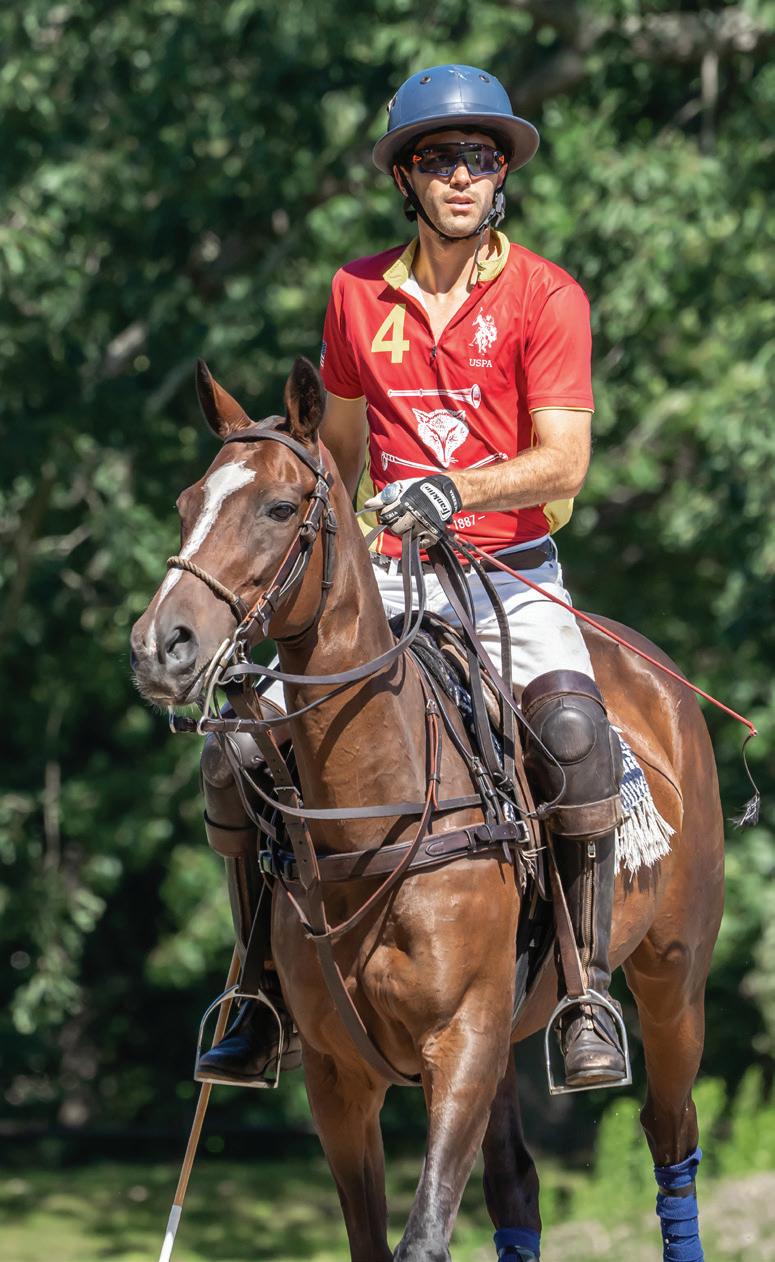
“CB impressed me from the outset not only for his skill as a polo player and his horsemanship but also for his sportsmanship.”
– Franz Colloredo-Mansfeld, former Myopia polo captain
Despite his time with Ramirez, Scherer felt the Big Apple had lost its luster. “New York just wasn’t for me,” he says. “I grew up on a farm. It obviously was very challenging to access horse country from New York, and there was a unique opportunity with this firm (in Boston).”
“I quickly realized that Boston is a lot smaller than New York,” says Scherer. “What became even more apparent was how close it is to horse country, which has become a really attractive part of living in Boston and playing at Myopia.”
Scherer also met his future wife, Alissa, in Boston, discovering the two had a common interest in horses. Meanwhile, Myopia’s Crocker Snow and the Harvard Polo program provided polo ponies so he could saddle up.
“The Snow family was instrumental in helping me get on the field by offering up the Harvard string,” he says. “I wouldn’t be having this conversation today if they didn’t help me get on my feet early on with horses.”
Nick Snow also arranged a dinner meeting for Scherer with Tracy and David Strouss, the current Myopia Polo captain. “I got to play in a tournament with Dave, and after that, it really
took off, thankfully,” Scherer says. “He’s been unbelievable in terms of helping me stay involved at the club for the past 10 years.”
Likewise, Strouss is an unabashed fan of Scherer.
“Great polo players do not need to be professionals — career salaried players playing year-round,” he says.
“CB exemplifies this, playing at Myopia in his spare time since he has a full-time professional career.”
Scherer says he’s keenly aware of the perception that polo is a game reserved for the rich, and is quick to dispel what he feels is a misconception.
“Polo’s considered a thing for the ultra wealthy, which I’m not,” says Scherer. “I try really hard to do it within my means. There are a lot of expensive sports. If you can allocate the time where you have the most passion, you can usually find a way to make it work.
“I’m a third-generation polo player,” he says. “Everyone in my family has been an amateur player who has pursued the game as a hobby. And they’ve done it in the most affordable way possible.”
Scherer has played most of his games with Strouss’s Del Rancho and the Colloredo-Mansfeld family’s Black Oak teams, though he’s also saddled up with numerous Myopia members, including Terri Campbell, Patricia Johnstone, and Kurt and Reed Miller.
According to Franz Colloredo-Mansfeld, a former Myopia polo captain, Scherer has been a welcomed addition to Myopia Polo, thanks to both his level of play and his style of play. Scherer also continues to give back, volunteering to serve on Myopia’s tournament committee and helping with junior polo programs.
“I’m continuing to focus on being an active participant in the big 8-goal tournaments,” he says. “Really pushing to be a successful member of the teams that I get to participate on in our tournament circuit is really important to me.
“The quality of the polo at Myopia is an incubator for a lot of the folks getting into the sport, plus maintaining a really solid quality polo tournament season at the highest level,” he says. “Anything I can do to help the club maintain that, I’d love to try.”
64 myopia polo 2024
photograph by jacqueline miller
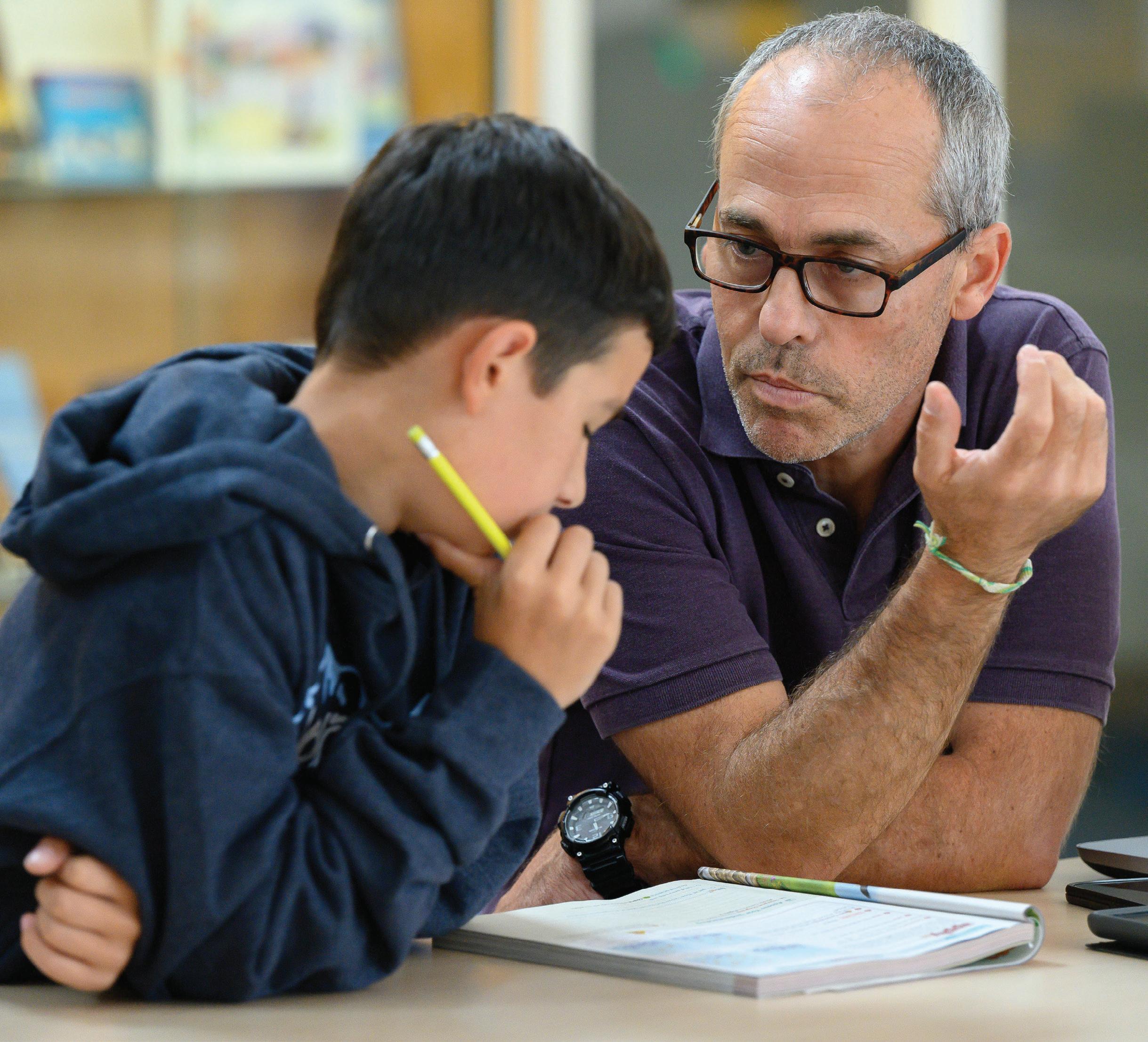

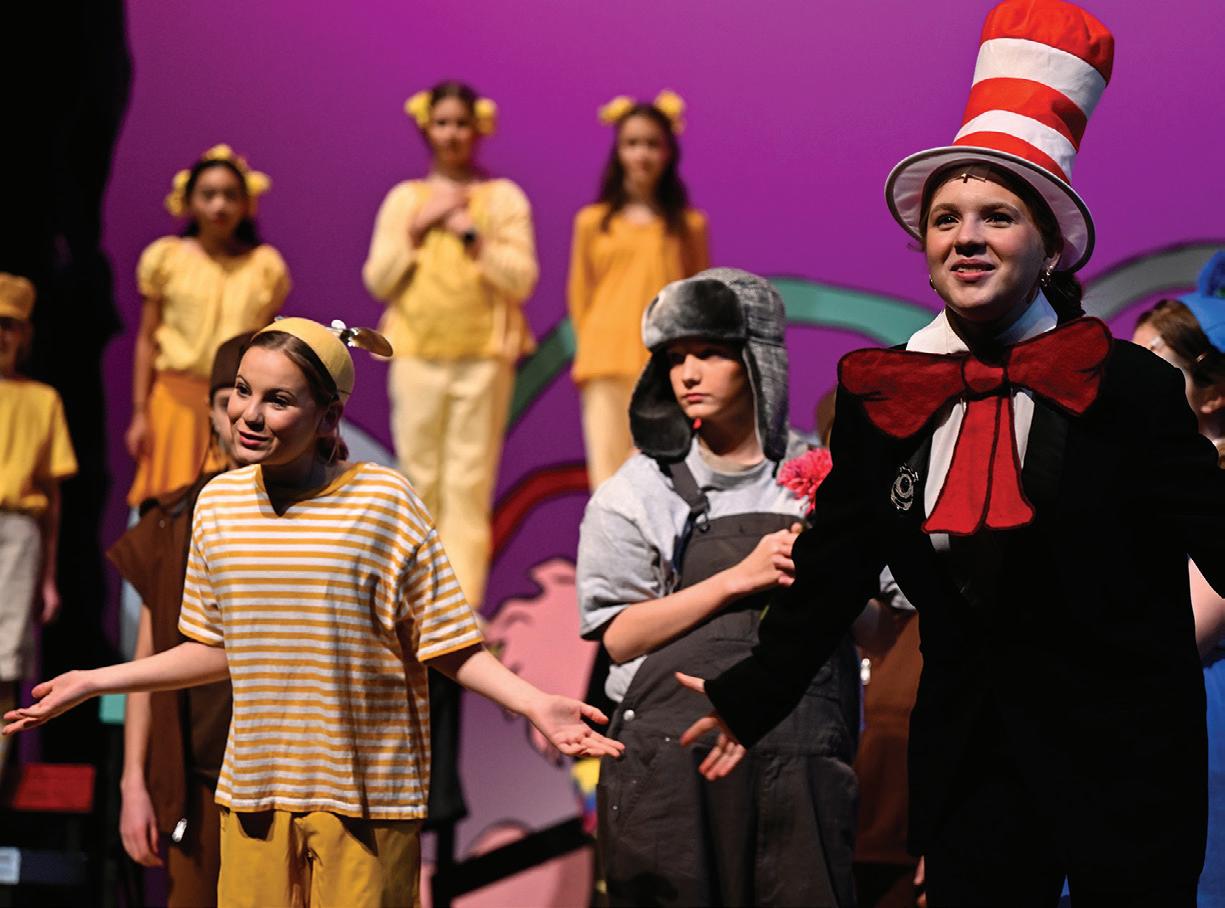
Pre-K – Grade 9 | Beverly, MA | (978) 927-1700 | www.ShoreSchool.org Bus routes from Andover, Gloucester, Lynnfield, Marblehead, Newburyport Where children are inspired for life. Pre-K – Grade 9 | Beverly, MA | (978) 927-1700 | www.ShoreSchool.org Bus routes from Andover, Gloucester, Lynnfield, Marblehead, Newburyport

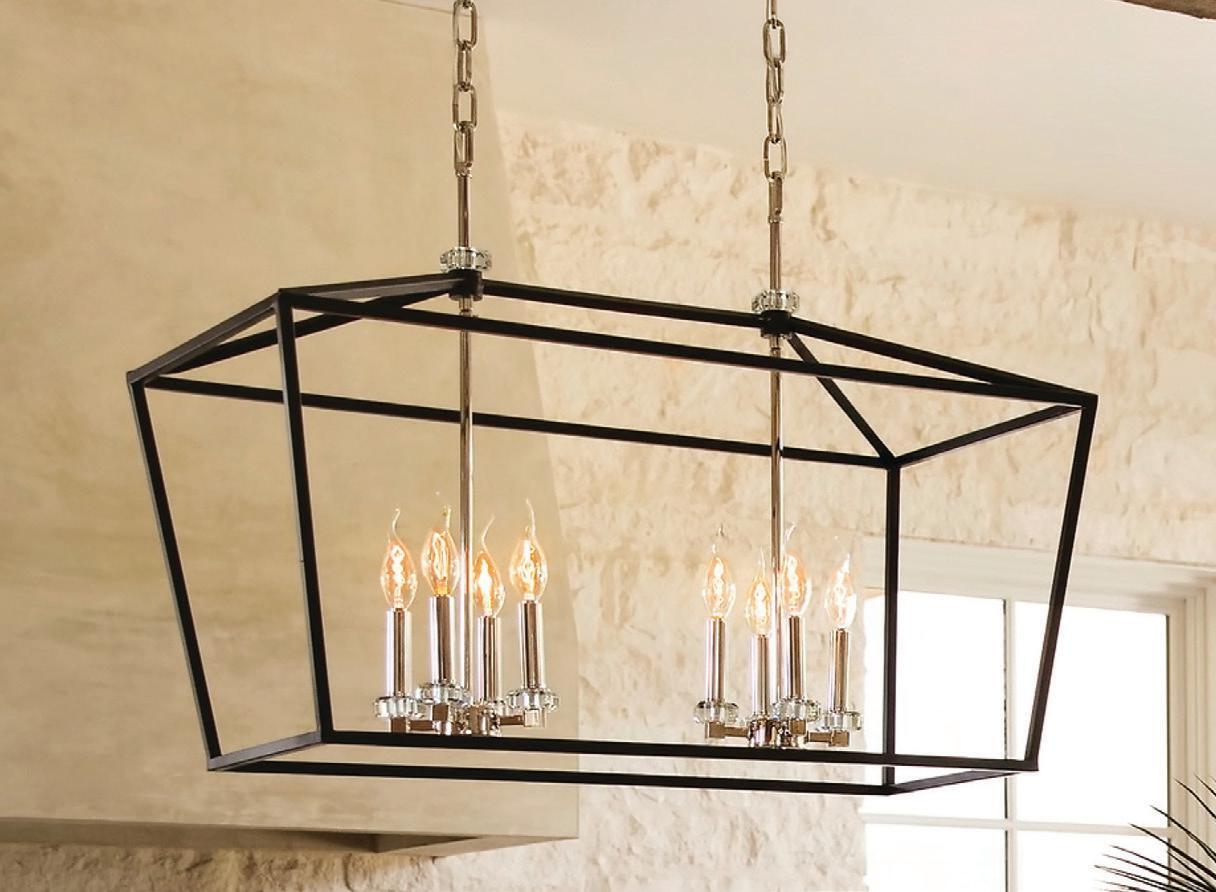

Everything you expect and so much more. sinkandspout.com 16 inspiring showrooms in New England. With thousands of products from Kohler, House of Rohl, BainUltra and many other world-class brands, our showroom associates will help you find the perfect selections for your home. Please visit our new showroom in Portsmouth, NH













































































































































































 by Brion O’Connor
by Brion O’Connor















 by Brion O’Connor
by Brion O’Connor
























 PHOTOGRAPHS BY JACQUELINE MILLER
PHOTOGRAPHS BY JACQUELINE MILLER

 by Brion O’Connor
by Brion O’Connor



































































